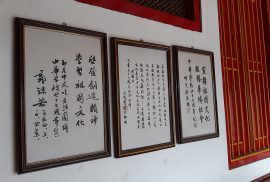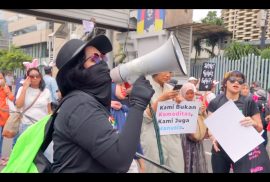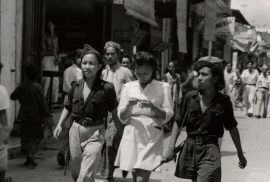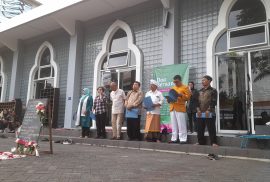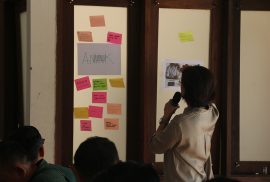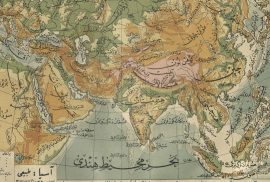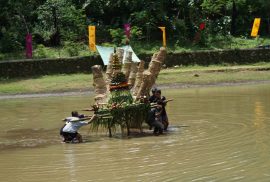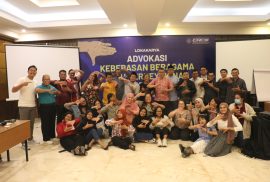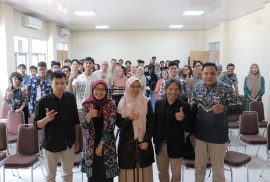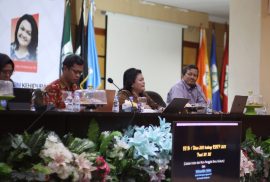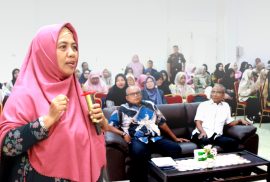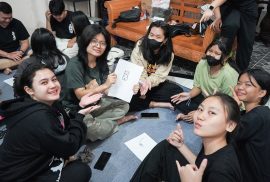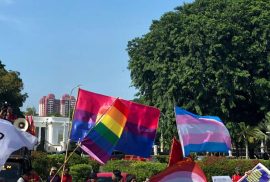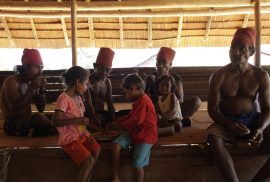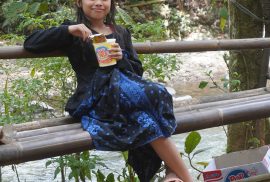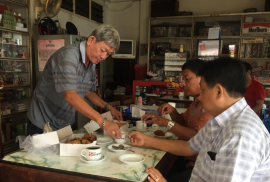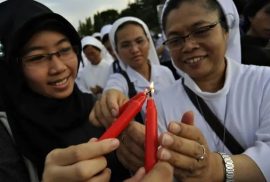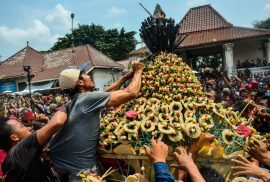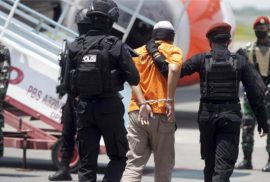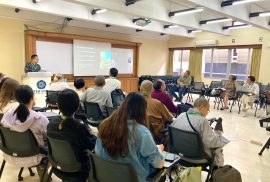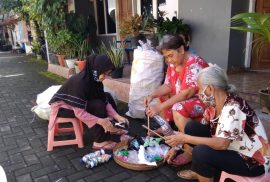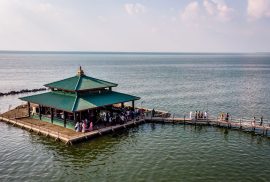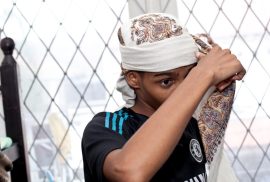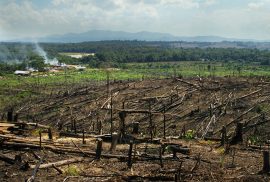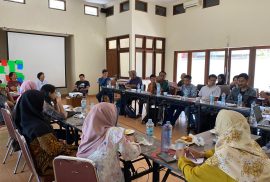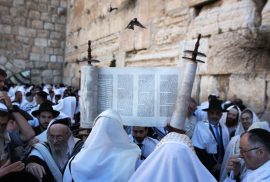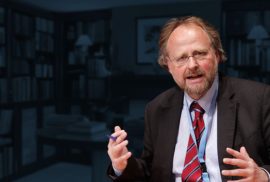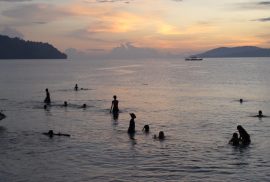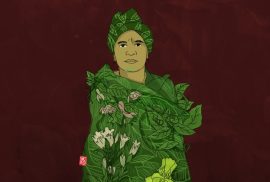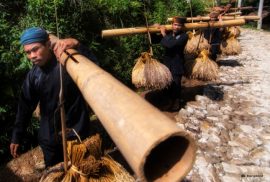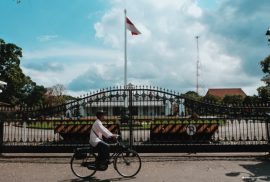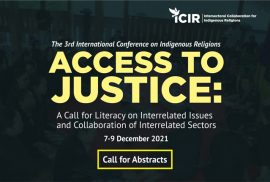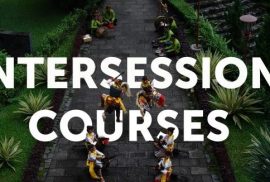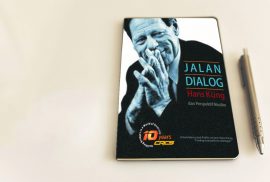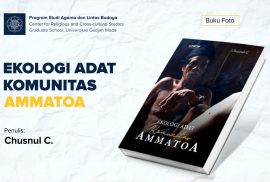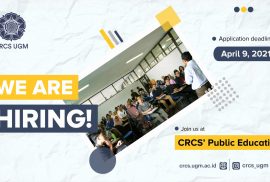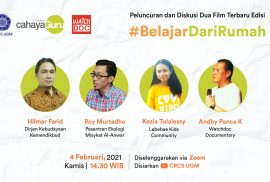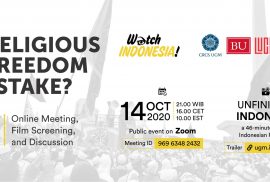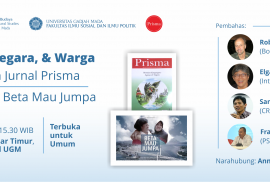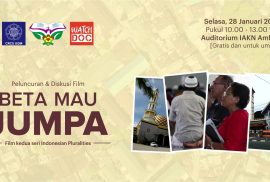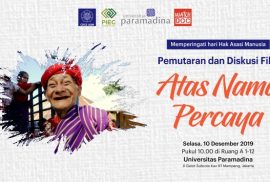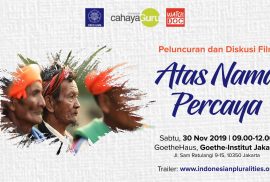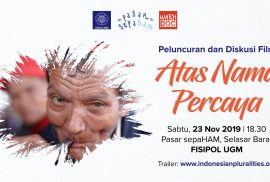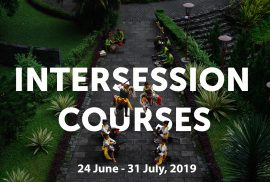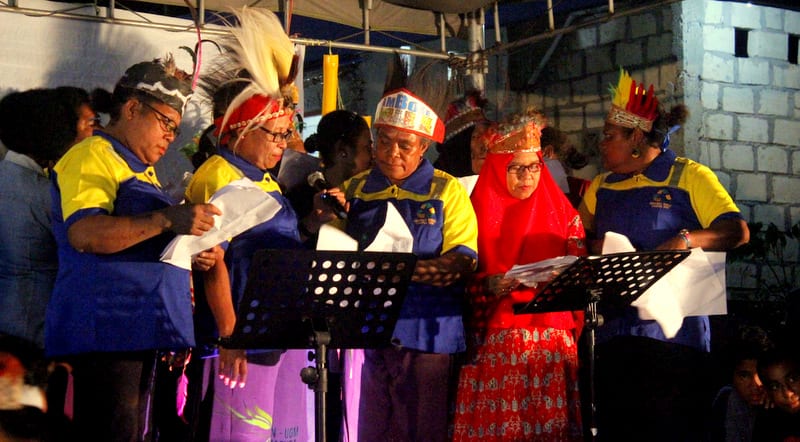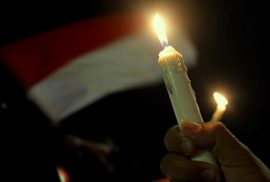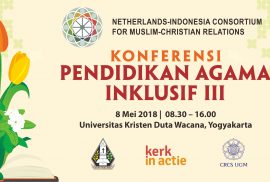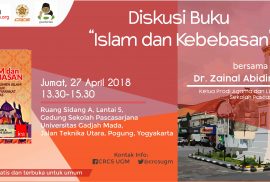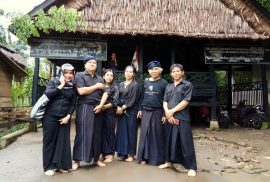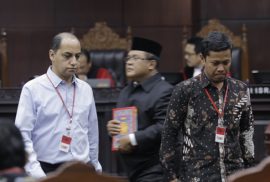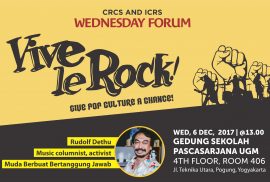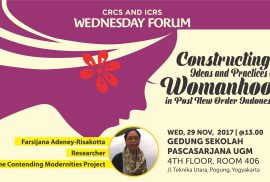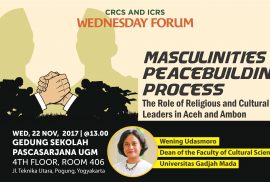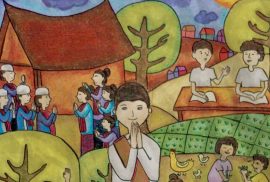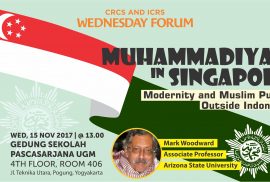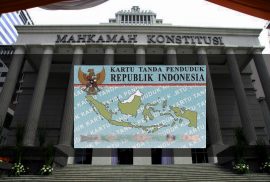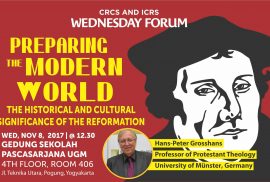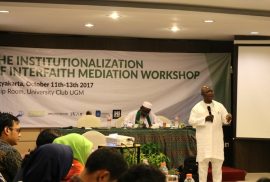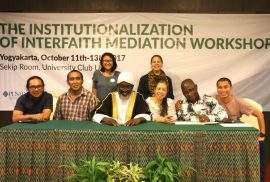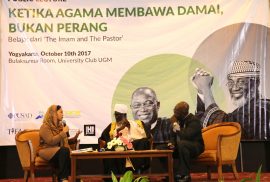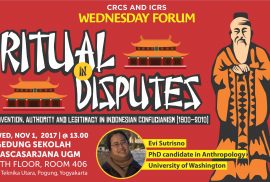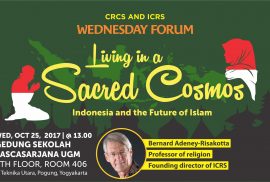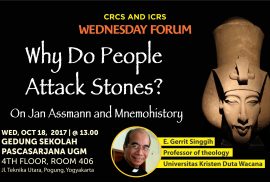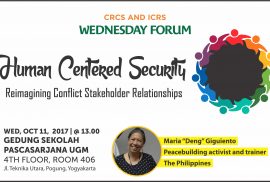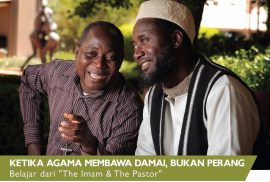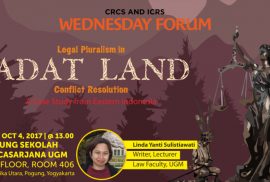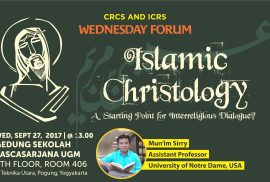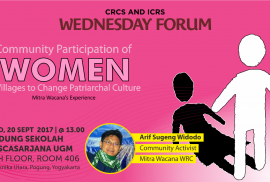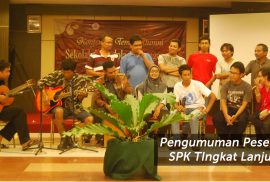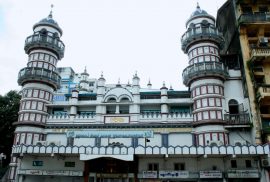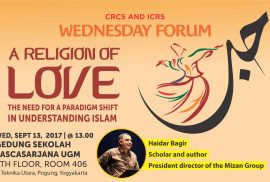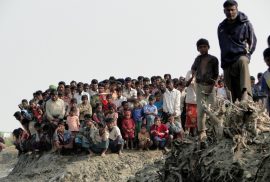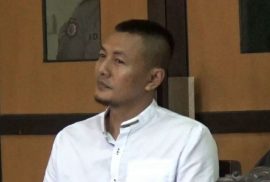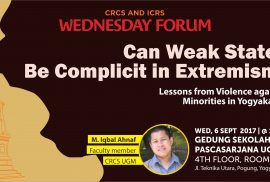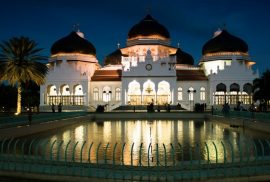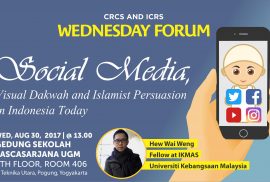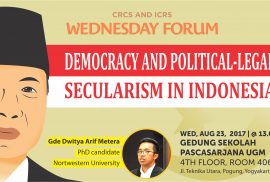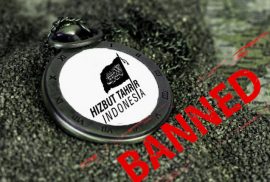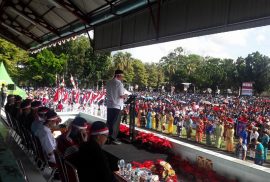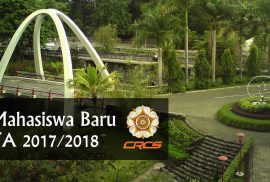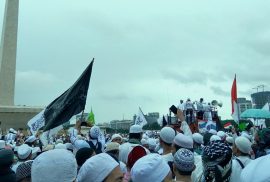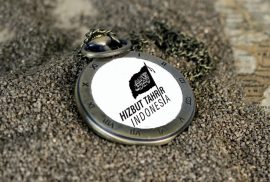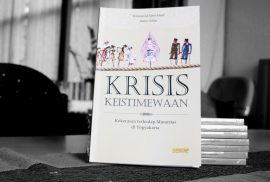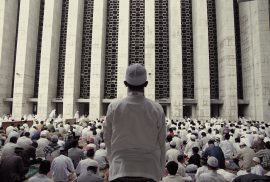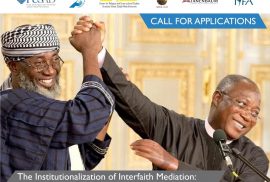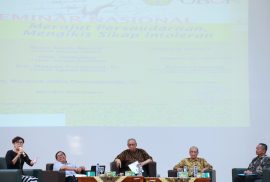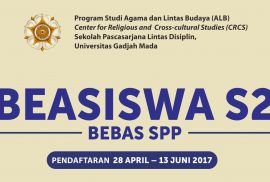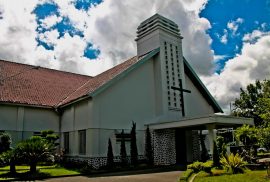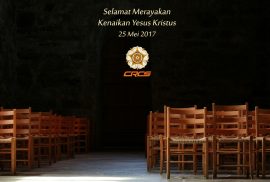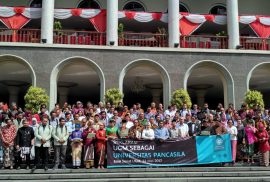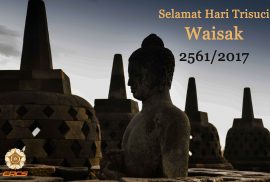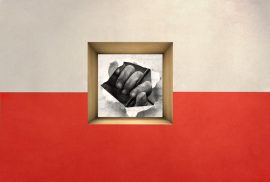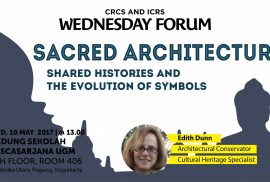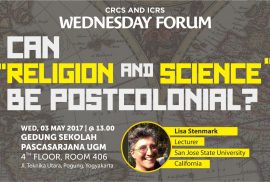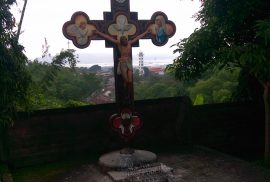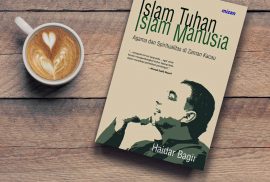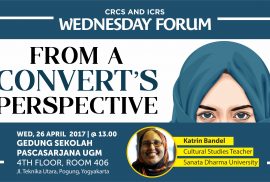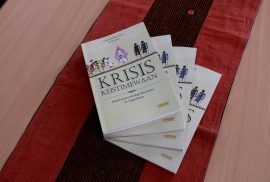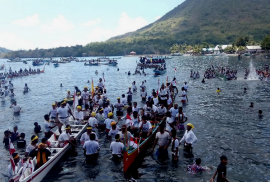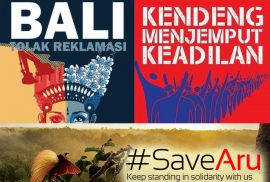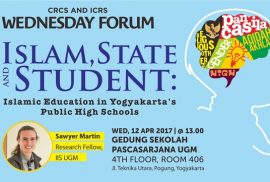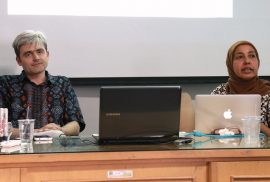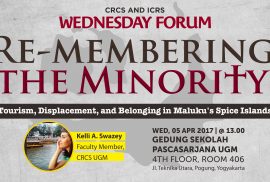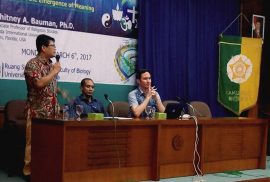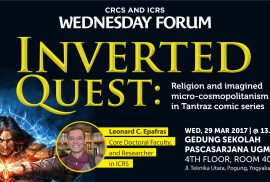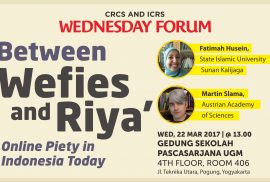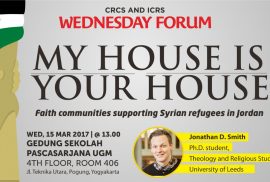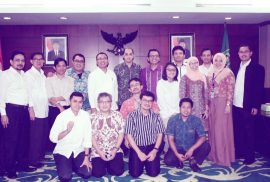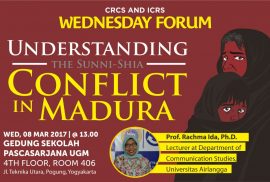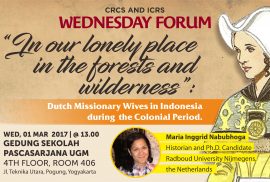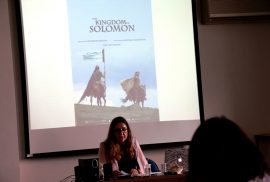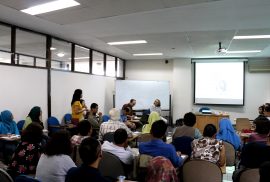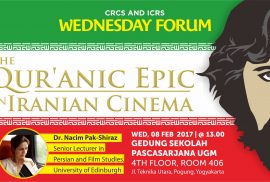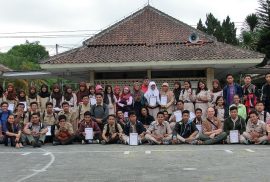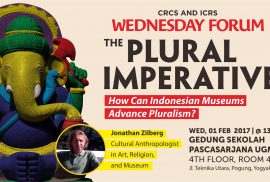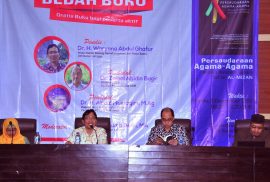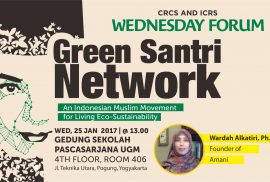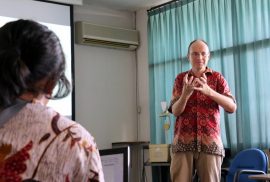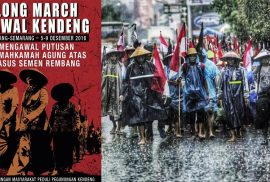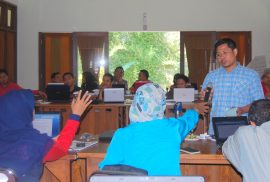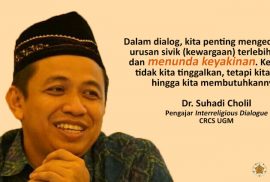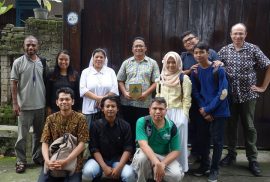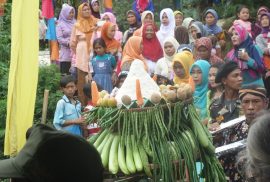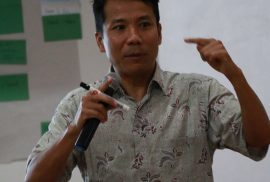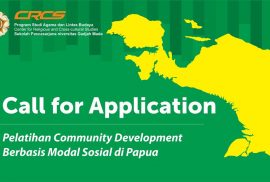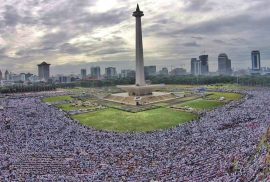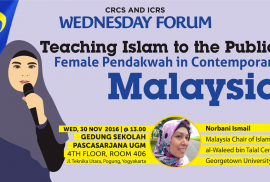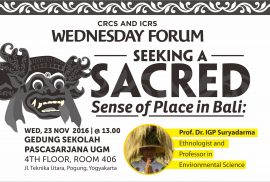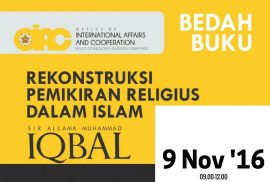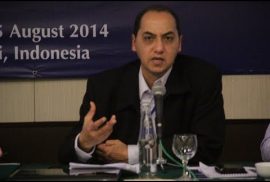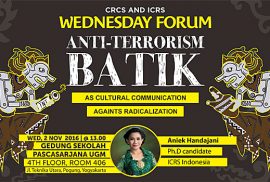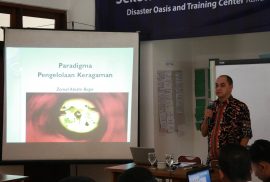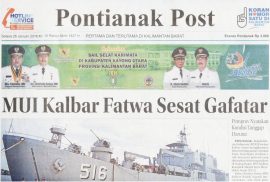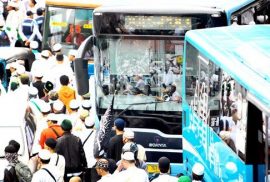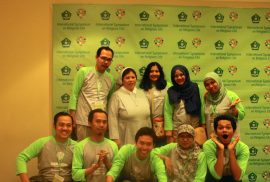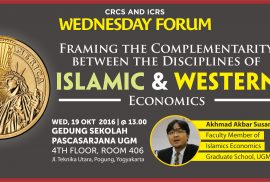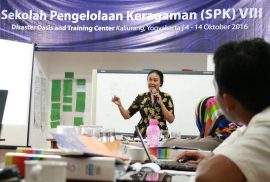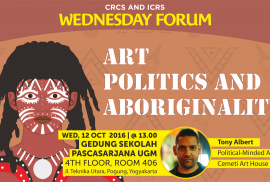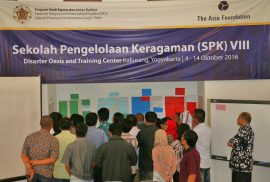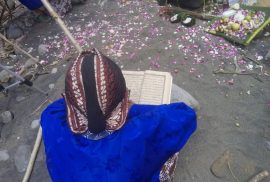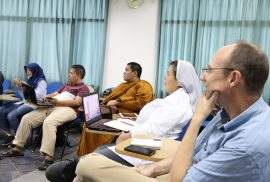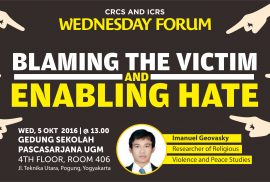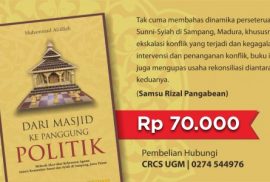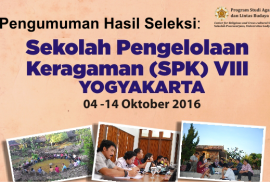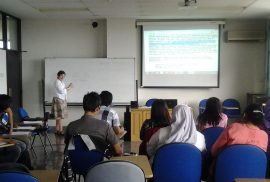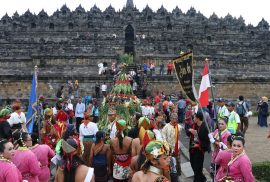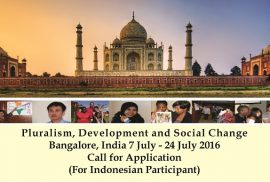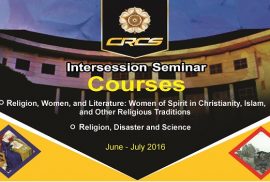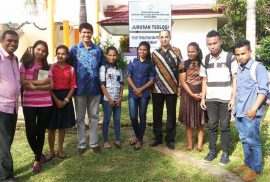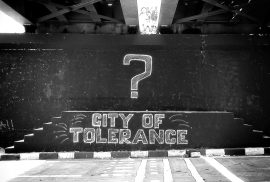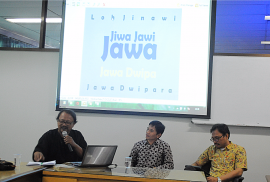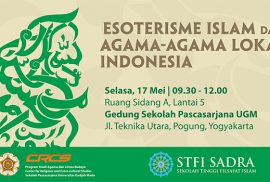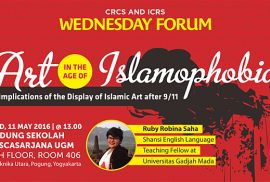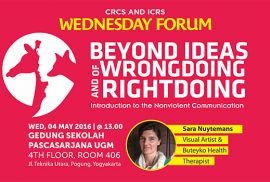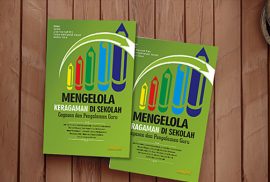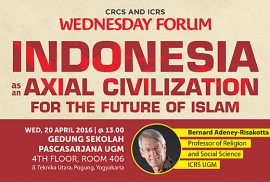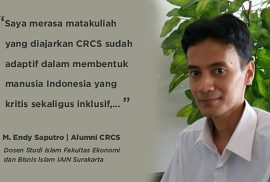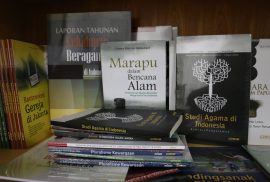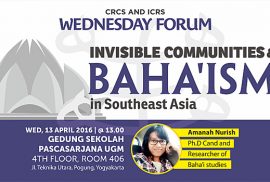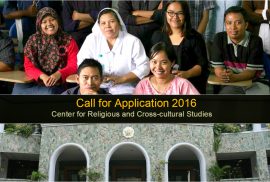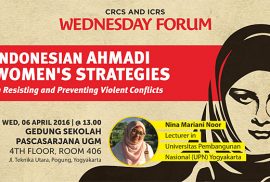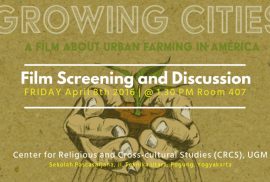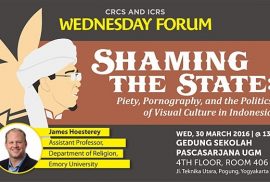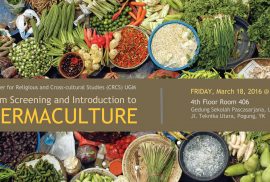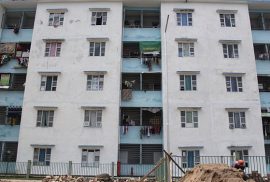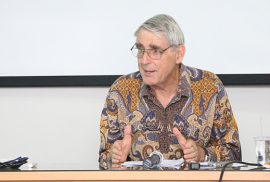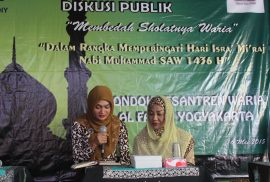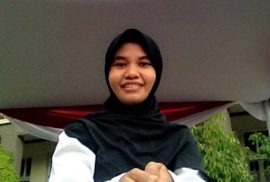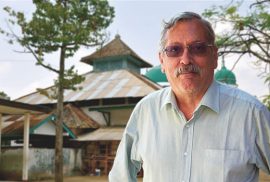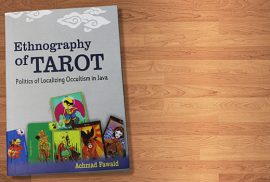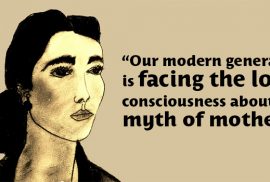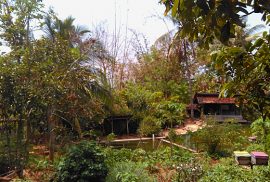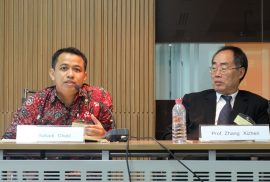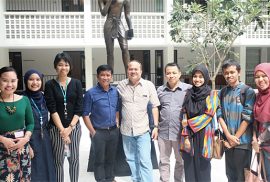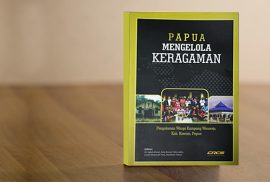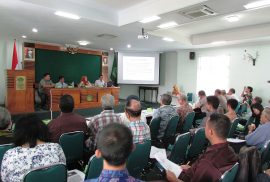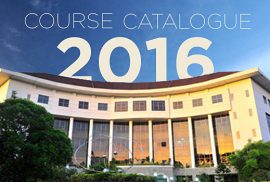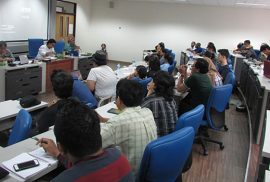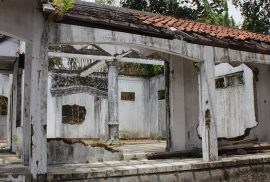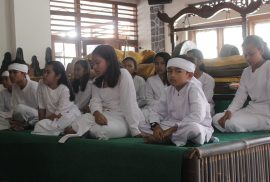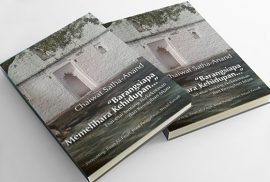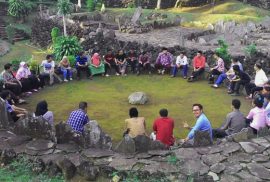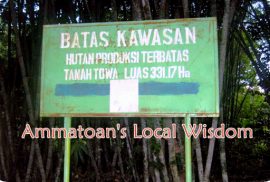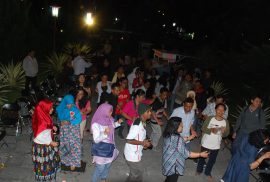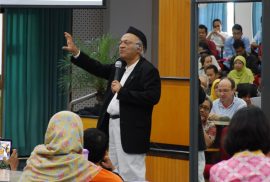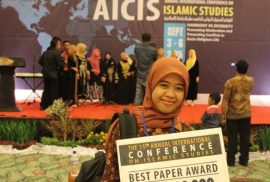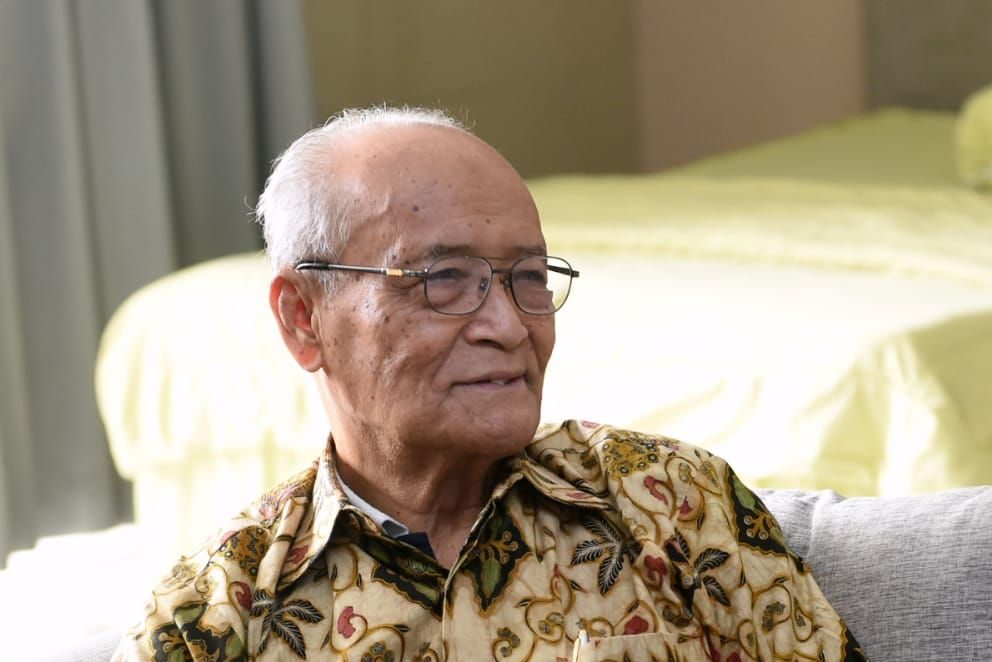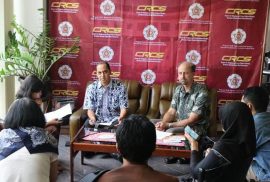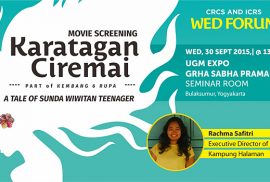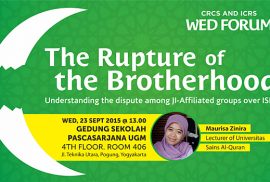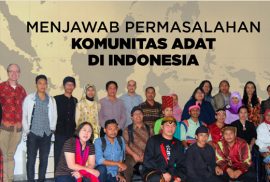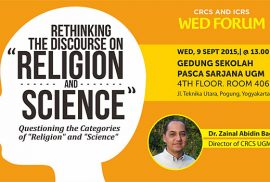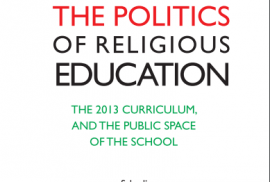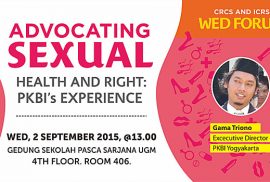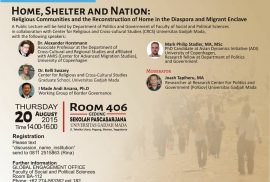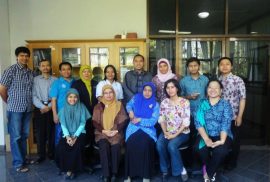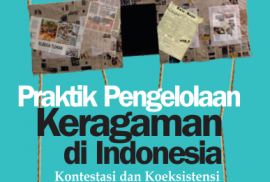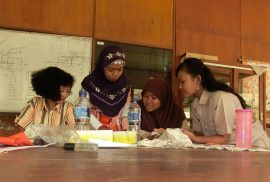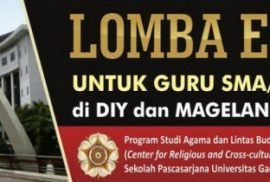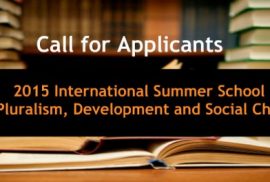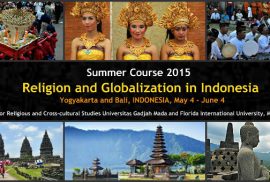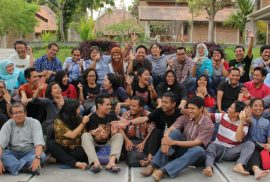Selama berabad-abad budaya dan masyarakat Tionghoa telah hadir, melebur, dan menjadi bagian tak terpisahkan dari sejarah peradaban Nusantara. Jejak-jejak dinamika tersebut tersimpan dalam berbagai arsip seperti koran, surat, dan buku. Upaya penyelamatan arsip berarti membuka kembali ruang bagi narasi kebangsaan yang lebih inklusif.
News
Perdebatan tentang sains, agama, dan tradisi merupakan pergulatan yang sangat panjang dalam sejarah peradaban manusia. Upaya merefleksikan dan memosisikan diri menjadi bagian penting dalam memahami makna dan hakikat pengetahuan bagi kehidupan manusia.
Kemunculan kredit pada film bukanlah sebuah akhir, melainkan sebuah ajakan bagi kita, yang ada di seberang layar, untuk menyambung apa yang film itu perjuangkan.
Narasi sejarah sering menghilangkan peran perempuan, kaum trans, dan masyarakat adat. Padahal, mereka berkontribusi besar dalam perjuangan sosial, budaya, dan kemanusiaan.
Industri, korporasi, bahkan lembaga negara berlomba-lomba membingkai diri sebagai bagian dari gerakan hijau. Seolah, dengan menyebut sesuatu yang hijau, seluruh proses di baliknya otomatis menjadi ekologis nan lestari.
Segregasi antara kerja akademik dan aktivisme seringkali digambarkan terpisah oleh garis batas yang saling mengelakkan. Kerja akademik dianggap harus objektif dan netral, sementara aktivisme bersifat subjektif dan politis. Karakteristik yang berlawanan itu membuat anggapan keduanya mesti dipisahkan dalam ruang lingkupnya masing-masing. Anggapan ini coba dikritisi oleh para alumni CRCS UGM berdasar kiprah mereka dalam dunia aktivisme dari berbagai latar belakang.
Program Studi Agama Lintas Budaya, Sekolah Pascasarjana, Universitas Gadjah Mada (UGM) menorehkan prestasi internasional dengan meraih akreditasi dari Foundation for International Business Administration Accreditation (FIBAA) pada level tertinggi: Premium Quality Seal.
Kendati berbeda cara, tiap doa dari masing-masing pemuka agama bertujuan sama: pemulihan bangsa Indonesia dari konflik berkepanjangan serta harapan akan kondisi yang lebih baik lagi. Selama prosesi tersebut, massa aksi duduk tenang seraya mengindahkan tiap untaian doa. Agama dengan caranya sendiri tengah mengadvokasi berbagai isu yang terjadi di masyarakat.
When faith meets extraction, what or whose priority comes first: communities, organizations, or the environment?
Fellowship KBB 2025 kali ini menghadirkan kelas Klinik dan Advokasi KBB sebagai bagian dari luaran yang tidak hanya menghasilkan gagasan tertulis, tetapi juga aksi nyata.
Melindungi KBB bukan hanya soal agama atau keyakinan, melainkan juga memastikan semua orang, terutama kelompok rentan, dapat hidup dan berkembang tanpa diskriminasi.
Jauh sebelum “religion” diperkenalkan kolonialis Eropa, masyarakat Nusantara telah memiliki pengertian “agama” dengan mengikuti konsep dīn.
Cara masyarakat Dondong menghidupi tradisi merefleksikan sebuah relasi yang erat antara manusia dan alam. Melalui pengetahuan lokal yang terwariskan secara temurun, semua entitas saling terhubung di dalam telaga dondong, mulai dari tanah, akar, air, manusia, hingga hewan. Masing-masing memiliki peran untuk saling bersinergi.
Selama ini KUHP 2023 yang akan efektif berlaku tahun depan ini jarang dibicarakan di akar rumput. Padahal, masyarakat awamlah—terutama dari kelompok rentan keagamaan—yang akan terpengaruh secara signifikan.
Karakter dari KUHP itu adalah membatasi hak. Yang menjadi perhatian ialah bagaimana pembatasan itu tidak melanggar hak warganegara, terutama dalam hal beragama atau berkeyakinan.
Meski diwanti-wanti sebagai kemajuan setengah jalan, KUHP 2023 menjanjikan terbuka luasnya ruang tafsir untuk melindungi hak beragama dan berkeyakinan.
Sebagai daerah khusus yang memiliki hukum tersendiri, integrasi KUHP 2023 dan qanun diperlukan untuk menjaga kebebasan beragama atau berkeyakinan (KBB) di Aceh.
Betapa pun berbeda pengalaman dan pandangan religius dengan generasi pendahulunya, anak muda Khonghucu tak akan pernah tercerabut dari “tulang” leluhurnya.
Transpuan dan Hak Demokrasi yang Terabaikan
Nita Amriani – 11 November 2024
Apakah seorang transpuan lahir hanya untuk mengecap pedihnya bayang-bayang persekusi dan menjadi pelengkap suara pemilu?
Diskriminasi dan stigma berlapis menyingkirkan kelompok transpuan dari hak-hak dasar sebagai warga negara. Banyak transpuan sulit mengakses pekerjaan dan hidup dalam ancaman persekusi. Di sisi lain, mereka juga tak lagi punya ruang aman di rumah karena keluarga mereka tidak lagi mau menerimanya. Bagi kelompok transpuan, konsep keadilan dalam sila ke-5 Pancasila masih jauh api dari panggang.
Suara Masyarakat Adat di Tengah Bayang-Bayang Demokrasi
Vikry Reinaldo Paais – 06 November 2024
Pembangunan nasional yang diklaim oleh pejabat pemerintahan sebagai sarana untuk meningkatkan kesejahteraan sosial justru merampas, mengkriminalisasi, serta mengeksklusi hak-hak hidup masyarakat adat dan penganut agama leluhur. Hutan dan tanah mereka dirampas oleh negara untuk dijadikan kawasan produksi maupun konservasi. Ketika masyarakat adat berjuang mempertahankan hak atas tanahnya, mereka justru dikriminalisasi oleh aparat negara. Dalam konteks sosio-religius, sebagian besar masyarakat maupun pemimpin agama menstigma masyarakat adat sebagai belum beradab, masih primitif, serta belum beragama sehingga harus dimodernkan dan diagamakan. Problematika ini adalah tantangan serius dalam konteks Indonesia yang mengumandangkan demokrasi sebagai sistem pemerintahan dan prinsip hidup berbangsa dan bernegara. Isu-isu krusial ini menjadi bahasan utama dalam perhelatan International Conference and Consolidation on Indigenous Religion (ICIR) ke-6 pada 22-25 Oktober 2024 di Ambon.
Transformasi Modernitas yang Berlantas di Kanekes
Afkar Aristoteles Mukhaer – 15 Oktober 2024
Modernitas membawa tantangan bagi masyarakat Urang Kanekes. Namun, mereka punya cara tersendiri dalam menghadapinya.
Masyarakat adat Urang Kanekes—atau yang lebih populer dengan nama Baduy—di Banten selalu menarik perhatian para peneliti. Setidaknya ada 95 dokumen karya ilmiah yang memuat kata kunci “Baduy” dan 23 dokumen karya ilmiah dengan kata kunci “Kanekes” di situs Scopus. Ketertarikan ini muncul, di antaranya, karena masyarakat adat Kanekes sangat melestarikan ajaran tradisi leluhur sampai hari ini kendati wilayah adat mereka tidak jauh dari Jakarta, kota metropolitan serba modern.
Kedai kopi yang dianggap sekadar tempat transaksi ekonomi, ternyata menjadi ruang penting terciptanya sebuah dinamika relasi lintas etnis dan agama yang sarat akan luka masa lalu.
Keberagaman di Tengah Keberagamaan
Yohanes Leonardus Krismawan Anugrah Putra – 30 September 2024
“…because we believe the Indonesian voices need to be projected and amplified not just in Indonesia, but beyond as well”
Demikian sepenggal sambutan Brett G. Scharfis, Direktur International Center for Law and Religion Studies (ICRLS) dari Univeritas Brigham Young, dalam study visit bertajuk “Promoting Freedom of Religion or Belief in Indonesia: Challenges and Opportunities” di auditorium Pascasarjana UGM. Kunjungan belajar ini bukan sekadar visitasi institusional, melainkan juga ruang untuk membicarakan berbagai peluang maupun tantangan dalam membangun kebebasan beragama atau berkeyakinan (KBB) di Indonesia.
Ambiguitas dan Toleransi dalam Tradisi Masyarakat Muslim
Afkar Aristoteles Mukhaer – 25 September 2024
Sepanjang sejarah peradaban Islam, perdebatan tafsir selalu hadir dengan saling menghargai perbedaan pendapat.
Realitas pemahaman dan praktik ajaran Islam sebagai aturan universal masih ambigu. Meski tuntunannya termaktub dalam pegangan dasar—Al-Qur’an dan hadis—interpretasinya selalu terbuka untuk dibahas dari perspektif dan ideologi tertentu. Cendekiawan dan ulama kerap berbeda paham atas interpretasi ajaran Islam sehingga mendorong terbentuknya ragam tafsir dan tarekat dalam Islam.
Dari Nurani Jadi Aksi
Afkar Aristoteles Mukhaer – 15 September 2024
Sebagian umat beragama menyadari gejala alam yang tidak menentu sebagai fenomena perubahan iklim. Lantas, sejauh mana pengetahuan agama mendorong umatnya melakukan kegiatan yang mendukung lingkungan?
“Agama memiliki efek ganda dalam membentuk perilaku ramah lingkungan,” jelas Iin Halimatusa’diyah, Direktur Riset Pusat Pengkajian Islam dan Masyarakat (PPIM) UIN Jakarta, lewat presentasinya bertajuk “From Belief to Action: Religious Values and Pro-Environmental Behavior in Indonesia” dalam Wednesday Forum (4/9).
Tanda-tanda kerusakan lingkungan ini sudah mulai terlihat. Erosi semakin sering terjadi, hasil panen menurun, dan banyak petani mulai bangkrut. Dalam situasi genting ini, alih-alih mengambil langkah konservasi lahan pertanian, para petani kentang terus memacu produksi kentang seolah tidak terjadi apa-apa. Masjid-masjid besar yang menjadi simbol kesejahteraan terus bermunculan, aktivitas keagamaan pun kian inten
berdasarkan data dari Institute for Policy Analysis of Conflict (IPAC), Bima merupakan daerah dengan rekam jejak aktivitas terorisme yang tinggi. Lantas, karakteristik keagamaan seperti apa yang tengah berkembang di antara masyarakat Bima? Sejauh mana karakteristik keagamaan itu mempengaruhi perkembangan terorisme di Bima?
Meneroka Diplomasi Buddhis dalam Sejarah Asia Modern
Yulianti – 20 Agustus 2024
Dalam sejarah kolonialisme di Asia modern, jejaring dan aliansi tidak hanya terjadi melalui jaringan negara kolonial, tetapi juga aliansi kelompok masyarakat yang ada di dalamnya. Salah satu bentuk aliansi yang berperan penting dalam geopolitik tersebut ialah diplomasi buddhis.
Dinamika tersebut menjadi bahasan utama dalam panel “Friends in Dharma: Buddhist Diplomacy and Transregional Connection in Modern Asia”. Panel ini merupakan bagian dari kluster tema Inter Area/Border Crossing pada “AAS in ASIA Conference”di Universitas Gadjah Mada, Yogyakarta, Indonesia pada 9–11 Juli 2024. Mengambil latar belakang sejarah Asia modern, panel Buddhist Diplomacy ini memfokuskan kajian pada kiprah komunitas agama yang berasal dari kalangan yang berbeda-beda dalam membentuk jaringan, aliansi, dan kerja sama di Asia pada pertengahan abad ke-20 sampai ke-21. Jaringan dan hubungan-hubungan kelompok inilah yang kemudian dimaknai sebagai buddhist diplomacy (diplomasi buddhis) yang melibatkan individu, kelompok, dan negara-negara buddhis di Asia. Keberadaan diplomasi buddhis ini mempengaruhi hubungan transregional dan pertukaran budaya dari abad ke-20 hingga abad ke-21 di Asia.
Hijrah Minim Sampah:
Sebuah Ekolinguistik Islam ala Ibu Rumah Tangga
Nanda Tsani – 29 Juli 2024
Isu lingkungan tidak melulu berkutat pada hal-hal gigantis seperti krisis iklim, efek rumah kaca, kenaikan suhu bumi, mencairnya es Antartika, atau kepunahan massal. Bagi June Cahyaningtyas, isu lingkungan ialah juga tentang hal-hal keseharian yang tampak di pelupuk mata dan jangkauan tangan: wastafel mengilap yang kembali dipenuhi piring kotor, ember kosong yang penuh pakaian apek, hingga timbunan sisa makanan di tempat sampah dapur. Berangkat dari minat keamanan nontradisional dalam kajian Hubungan Internasional (HI), dosen HI Universitas Pembangunan Nasional “Veteran” ini meneroka dimensi keagamaan dalam praktik lingkungan berkelanjutan melalui pengalaman perempuan urban di Jawa. Hasil kajiannya itu ia presentasikan dalam Wednesday Forum, 15 Mei 2024, bertajuk “Sustainable Living Practice Among Urban Women in Java”.
Beradaptasi lewat Agama di Tengah Abrasi Pantai Utara Jawa
Rezza Prasetyo Setiawan – 20 Juli 2024
Salah satu dampak nyata krisis iklim ialah kenaikan air laut dan abrasi yang menenggelamkan daerah-daerah di kawasan garis pantai. Sebagai negara dengan garis pantai terpanjang di dunia, Indonesia menjadi salah satu wilayah yang paling terdampak. Lantas, bagaimana masyarakat Indonesia yang tinggal di kawasan terdampak beradaptasi dengan hal ini? Sejauh mana pemahaman dan praktik keagamaan mereka berperan dalam proses adaptasi tersebut?
Pertanyaan itu menjadi salah satu titik tolak disertasi Aliyuna Prastiti yang ia presentasikan dalam Wednesday Forum bertajuk “Making Sense of Religion in Adaptation Processes”, 8 Mei 2024. Dosen program studi Hubungan Internasional, Universitas Padjadjaran, ini meneliti dua komunitas masyarakat yang tinggal pesisir utara Pulau Jawa, yaitu Bedono, Kabupaten Demak, Jawa Tengah dan Pantai Bahagia, Bekasi, Jawa Barat.
Mempertahankan Agama Seadanya–Sebisanya di Negara Transit
Nanda Tsani – 16 Mei 2024
Pernahkah Anda transit di suatu bandara luar negeri? Transit selama 2 atau 3 jam mungkin tidak begitu terasa sembari menikmati fasilitas yang ada, tetapi bagaimana jika harus transit hingga puluhan jam? Betapapun berbagai aktivitas membunuh waktu dilakukan, tetap saja jemu itu datang, bukan? Sementara, para pengungsi dan pencari suaka di Indonesia rerata menjalani waktu transit antara 5 sampai 10 tahun penuh kegetiran.
Berangkat dari situasi yang dialami para pencari suaka ini, Realisa D. Massardi, Dosen Antropologi UGM, melakukan penelitian etnografi guna memahami manuver dan dinamika para remaja pengungsi dan pencari suaka dalam menavigasikan identitas keagamaan mereka di tanah transit. Selama kurang lebih 14 bulan dalam kurun 2016–2017, Dosen Antropologi UGM ini melakukan penelitian di empat lokasi pengungsian. Realisa memaparkan hasil penelitiannya dalam Wednesday Forum edisi 24 April 2024 bertajuk “Religion in Transit: Young Refugees Navigating Religious Sphere in Indonesia”.
Kendati lebih dari 90% responden di Indonesia mengatakan bahwa agama merupakan faktor penting bagi kebahagiaan mereka, agama bukanlah jawaban utama ketika mereka mengalami gangguan kesehatan mental.
Ketika terdesak oleh bencana yang sudah lugas di depan mata, masihkah faktor identitas sosial, politik, dan keagamaan menjadi penting? Apakah pertanyaan itu tidak lagi penting karena perbedaan sudah dilebur demi alasan kemanusiaan dan penderitaan bersama? Jangan-jangan, hilangnya pertanyaan itu justru adalah tanda marginalisasi terselubung yang justru makin tajam karena desakan keterbatasan sumber daya?
Agama dan spiritualitas seolah menjadi dua entitas yang berbeda. Di tengah zaman yang kian berpacu dan berkelindan, dinamika interaksi keduanya menjadi kunci untuk memahami hubungan antaragama di masa depan.
Pengalaman transendental nun di atas langit seringkali tidak bisa kita gapai dengan intelektual. Di sinilah humor bekerja. Dengan humor, agama yang adiluhung nan surgawi bisa menjadi sangat manusiawi dan membumi.
Memulihkan Literasi Agama-Agama Tionghoa
Rezza Maulana – 12 Januari 2024
By breadth of reading and the ties of courtesy, a gentleman is kept, too, from false paths (Confucius)
Eksistensi dan kiprah masyarakat keturunan Tionghoa dalam derap sejarah Nusantara seakan tenggelam oleh stigma negatif yang menyelimutinya. Padahal, dinamika pemikiran dan pergulatan mereka ikut menyumbang batu bata dalam bangunan negeri yang bernama Indonesia ini. Salah satu penyebabnya ialah minimnya kajian yang bersumber dari sudut pandang masyarakat keturunan Tionghoa itu sendiri. Kebijakan asimilasi, represi, dan aksi amuk massa yang kerap menyasar komunitas keturunan Tionghoa ikut menyumbang hilangnya berbagai dokumen penting dan sumber sejarah. Untungnya, di samping koleksi pribadi atau perorangan, beberapa arsip sejarah yang tersimpan di klenteng atau rumah ibadah masih terselamatkan.
Menuntut Keadilan Lingkungan Antargenerasi Melalui Konstitusionalisme Iklim
Rezza P. Setiawan – 8 November 2023
Hak Asasi Manusia tidak hanya dimiliki oleh generasi manusia yang hidup di hari ini, tetapi juga generasi yang akan datang. Salah satunya akses terhadap lingkungan hidup yang baik dan sehat.
Istilah ‘konstitusionalisme iklim’ (Climate Constitutionalism) dibawa oleh Dr. Herlambang Perdana Wiratraman dalam diskusi pleno ketiga pada acara The 6th International Conference for Human Rights yang diadakan (26/10) di Fisipol UGM. Dalam presentasi berjudul “Climate Constitutionalism: A Search for Eco Social Justice in Indonesia’s Autocratic Legalism”, Dosen Hukum Tata Negara UGM ini menjabarkan konstitusionalisme iklim sebagai kerangka untuk memahami secara kritis hubungan tidak terpisahkan antara iklim dan hukum. Singkatnya, kerangka pikir ini menelisik apakah sistem hukum yang ada berpihak pada perusakan atau restorasi lingkungan. Konstitusionalisme iklim ini juga menjadi jembatan hukum untuk pemenuhan hak asasi manusia Indonesia, baik generasi saat ini maupun yang akan datang, atas lingkungan hidup. Lebih lanjut, Wiratraman juga menyoroti secara kritis narasi “politik hijau” yang ditawarkan kapitalisme global sebagai ancaman terhadap pemenuhan hak asasi antargenerasi.
Melawan Perdagangan Orang, Agama Bisa Apa?
Rezza P. Setiawan – 30 Oktober 2023
Realitas perbudakan nyatanya tidak pernah sungguh-sungguh kita tinggalkan. Pakaian, sepatu, laptop, ataupun gawai yang kita gunakan untuk membaca artikel ini boleh jadi hasil dari perbudakan yang tidak (ingin) kita sadari. Kerja paksa itu tidak hanya ada di zaman kolonial, tetapi juga di era milenial. Ia berganti rupa dalam bentuk perdagangan orang. Para sindikat perdagangan orang mencari korban di daerah asal dengan iming-iming gaji besar. Para korban kemudian dibawa ke negara lain dan diperkerjakan tanpa legalitas yang jelas. Akibatnya, mereka tidak bisa menuntut haknya sebagai manusia, apalagi sebagai pekerja. Tak jarang dari para korban itu pulang hanya tinggal nama dan jasadnya. Data BP2MI menunjukkan setidaknya ada 1.900 jenazah WNI yang dipulangkan sebagai korban Tindak Pindana Perdagangan Orang (TPPO).
Fellowship KBB 2023: Merajut Kolaborasi untuk Advokasi
Hanny Nadhirah – 30 Oktober 2023
“Kebebasan Beragama atau Berkeyakinan adalah ilmu (dan upaya) yang tiada habisnya. Harapannya, teman-teman bisa terlibat dalam gerakan ini,” ungkap Asfinawati, advokat hak asasi manusia dan pengajar di Sekolah Tinggi Hukum Indonesia Jentera yang menjadi fasilitator program Fellowship Kebebasan Beragama atau Berkeyakinan (KBB) 2023.
Sejak diinisiasi pada 2019, Fellowship KBB merupakan wadah bagi para dosen lintas studi untuk mengembangkan pengajaran dan penelitian mengenai KBB. Program kolaborasi CRCS UGM; Yayasan Lembaga Bantuan Hukum Indonesia; Centre for Human Rights, Multiculturalism and Migration, Universitas Jember; Serikat Pengajar Hak Asasi Manusia (Sepaham); dan Sekolah Tinggi Hukum Indonesia Jentera ini melibatkan para akademisi dan praktisi sebagai fasilitator. Dalam fellowship ini para peserta mengeksplorasi berbagai dimensi isu KBB melalui beragam studi kasus di Indonesia secara lintas disiplin.
Sehari bersama Ari Gordon: Mengenal Yahudi dan Yudaisme
Vikry Reinaldo Paais – 25 Mei 2023
Apa itu Yahudi (Jewish), apa itu Yudaisme (Judaism), apa itu Israel? Masih banyak orang awam, bahkan akademisi, yang salah kaprah terhadap istilah-istilah tersebut. Yahudi cenderung diasosiasikan dengan sebuah agama sekaligus suku bangsa, bahkan negara dalam konteks modern. Secara terminologi, ketiga istilah tersebut memiliki makna yang berbeda. Yahudi merujuk pada suku, etnis, atau kelompok masyarakat; sedangkan Yudaisme adalah nama agama yang dipeluk oleh mayoritas orang Yahudi. Sementara, Israel adalah nama negara di kawasan Timur Tengah yang mendeklarasikan kemerdekaannya pada 14 Mei 1949 dan memiliki penduduk dengan suku yang beragam (tidak hanya dari etnis Yahudi, tetapi juga Arab, Druze, hingga suku-suku dari Afrika) dan agama yang bermacam pula (Yudaisme 73,6%, Islam 18,1%, Kristen 1,9%, dll.).
Salah satu isu mendasar yang penting untuk diklarifikasi mengenai KBB adalah bahwa yang dilindungi oleh KBB adalah manusia sebagai subjek hak, bukan agama.
Sasi Haruku: Ruang Sanding dan Tanding Antara Adat dan Gereja
Haris Fatwa Dinal Maula – 14 Juni 2022
Pengetahuan adat sering kali disisihkan ketika berhadapan dengan isu-isu kontemporer. Stigma primitif, tertinggal, dan animis menjadi tembok besar sehingga pengetahuan adat seakan-akan tidak relevan dan terpinggirkan. Namun, tesis itu tidak sepenuhnya benar. Masyarakat Negeri Haruku, Kepulauan Lease, Maluku Tengah telah membuktikannya. Berkat praktik sasi yang telah turun-temurun mereka lakukan, masyarakat Haruku mendapat penghargaan nasional Kalpataru kategori penyelamat lingkungan pada 1985.
Salah satu kunci penting dalam mencegah kerusakan alam dan mewujudkan keadilan sosial justru bertumpu pada sosok yang paling kerap disisihkan: perempuan adat.
Di tengah kondisi bumi yang darurat ini, pengetahuan adat bisa menjadi antitesis dari agrikultur modern yang bersifat merusak. Agama leluhur memainkan peran sentral di dalamnya.
The course will combine lectures from multidisciplinary professors of Universitas Gadjah Mada, cultural practices and exchanges between Japanese and Indonesian university students using both English and Japanese. The short course is a collaboration between Tsukuba University, CRCS, Graduate School-UGM, and the Faculty of Cultural Science, UGM.
This 3rd conference invites researchers, academics, CSO activists, practitioners, and community members to share ideas, insights, knowledge, experience, and wisdom on issues relative to access to justice.
Meskipun kunjungan lapangan (fieldtrip) ke berbagai tempat dan komunitas yang multikultur dari waktu ke waktu semakin populer dipakai di kelas-kelas pendidikan formal di kampus, sayangnya belum ada panduan akademik yang memadai. Panduan ini berusaha mengisi kekosongan itu.
Dibandingkan disiplin keilmuan lain, studi agama memang datang agak “terlambat“ dalam menanggapi isu lingkungan. Di sisi lain, para sarjana studi agama seringkali berfokus pada hubungan interpersonal seperti hubungan antara umat Islam dan Kristen, ekstremisme dan fundamentalisme, dan sebagainya. Perspektif hubungan harmonis antara kita dan alam seolah-olah terpinggirkan. Lantas, seberapa penting agama dan ekologi untuk dikaji dalam studi agama?
Peluncuran Buku Varieties of Religion and Ecology in Indonesia
Wacana mengenai agama dan ekologi/lingkungan dewasa ini makin berkembang pesat di dunia, termasuk di Program Studi Agama dan Lintas Budaya (CRCS) UGM. Selain menawarkan mata kuliah Religion and Ecology selama beberapa tahun terakhir, tidak sedikit mahasiswa CRCS UGM menulis tesisnya dalam bidang ini. Beberapa ringkasan tesis yang terbit dalam beberapa tahun terakhir kini diterbitkan dalam buku Varieties of Religion and Ecology: Dispatches from Indonesia. Buku tersebut disunting oleh Zainal A. Bagir, Michael S. Northcott, dan Frans Wijsen.
Program Studi Agama dan Lintas Budaya (CRCS), Sekolah Pascasarjana Universitas Gadjah Mada; Yayasan Lembaga Bantuan Hukum Indonesia; Centre for Human Rights, Multiculturalism and Migration—Universitas Jember, dan Serikat Pengajar Hak Asasi Manusia (Sepaham) menyelenggarakan Program Fellowship Kebebasan Beragama atau Berkeyakinan (KBB) untuk Angkatan Ketiga pada tahun 2021.
Program ini bermisi membangun basis pengetahuan akademik bagi KBB dan memberikan landasan yang lebih kokoh untuk advokasi KBB. Tujuan utama program ini adalah meningkatkan riset-riset multidisiplin mengenai KBB, dan diadakannya pengajaran mengenai KBB (baik sebagai mata kuliah tersendiri atau bagian dari mata kuliah) di perguruan tinggi, dalam disiplin hukum, syariah, filsafat, studi agama, dan ilmu-ilmu sosial dan politik.
CRCS’ Admission 2021 Extended
Admission to the Center for Religious and Cross-Cultural Studies (CRCS) in the 2021/2022 academic year has been extended until 6 July. CRCS’ tuition-free scholarship is still available!
For more information click Admission 2021 and for scholarship
CRCS welcomes graduate students and the public to enroll in the three intersession courses on religious and cross-cultural studies for credit or as auditors.
Dialog sebagai modus perjumpaan antargama dan etika global sebagai tanggung jawab agama-agama dalam merambah masalah sosial, ekonomi, dan politik inilah dua dari sekian buah pikiran yang ditinggalkan Hans Küng.
Buku ini menghimpun esai-esai foto yang memotret praktik ekologi adat komunitas Ammatoa yang mengejawantah dalam kehidupan sehari-hari termasuk berbagai ritual, seni dan tradisi, serta berbagai aturan adat.
An open recruitment for Public Education division at CRCS UGM
Kamis, 4 Februari 20212. DIselenggarakan atas kerja sama Indonesian Pluralities (CRCS UGM, Pardee School of Global Studies - Boston University, dan Watchdoc) dan Yayasan Cahaya Guru.
Online screening and discussion of the third film of the Indonesian Pluralities series, Oct 14, 2020
Acara hari Kamis 12 Maret di Fisipol UGM. Terbuka untuk umum dan gratis.
Peluncuran film kedua seri Indonesian Pluralities di IAIN Ambon, Rabu, 29 Jan 2020, bekerja sama dengan Ambon Reconciliation & Mediation Center (ARMC).
Peluncuran "Beta Mau Jumpa", film kedua seri Indonesian Pluralities, di IAKN Ambon, Selasa, 28 Januari 2020, bekerja sama dengan Pusat Studi antar-Budaya dan Agama (PSaBA), IAKN Ambon.
Selasa, 10 Desember 2019, di Universitas Paramadina. Memperingati hari Hak Asasi Manusia.
Peluncuran dan diskusi film pertama dari seri Indonesian Pluralities, di Goethe-Institut, Jakarta, 30 Nov 2019.
Peluncuran dan diskusi film pertama dari seri Indonesian Pluralities, di Pasar sepaHAM, Fisipol UGM, 23 Nov 2019.
Intersession courses: Religion and Human Rights; and Comparative Mysticism: Judaism, Christianity, and Islam.
Foto-foto dari Pekan Budaya Tionghoa Yogyakarta (PBTY) di kampung pecinan Ketandan, pada 13-19 Februari 2019.
Pemutaran dan Diskusi Film "Our Land is the Sea", 10 Oktober 2018.
Liputan dari kegiatan KKN PPM UGM dan CaRED UGM di Organda, Jayapura.
CRCS welcomes graduate students and the public to enroll in our 2018 intersession courses.
A prayer recited in conclusion of UGM's "Act of Concern Confronting Terrorism" event held at Balairung UGM on 14 May 2018.
Konferensi Pendidikan Agama Inklusif III di Universitas Kristen Duta Wacana, Yogyakarta, pada 8 Mei 2018.
Diskusi buku "Islam dan Kebebasan", bersama Kaprodi CRCS Dr Zainal Abidin Bagir, pada Jumat, 27 April 2018.
CRCS UGM menyelenggarakan lokakarya tentang masyarakat sadar ekowisata bersama masyarakat adat Ammaota serta Dispar dan DLHK Kabupaten Bulukumba, Sulawesi Selatan.
In commemoration of the World Water Day 2018, CRCS UGM presents these free, open-to-the-public events.
Dosen dan alumnus CRCS UGM menjadi saksi ahli dalam uji materi UU Penodaan Agama di Mahkamah Konstitusi, 20 Februari 2018.
Wednesday Forum, December 6, 2017. Speaker: Rudolf Dethu, founder of Muda Berbuat Bertanggung Jawab.
Wednesday Forum, 29 Nov 2017. Speaker: Farsijana Adeney-Risakotta, grantee of the Contending Modernities project.
Wednesday Forum, 22 November 2017. Speaker: Wening Udasmoro, the dean of the Faculty of Cultural Sciences, UGM.
CRCS, Kampung Halaman dan Satunama menyelenggarakan pemutaran film dan diskusi buku pada Kamis, 16 Nov 2017, pukul 13.00.
Wednesday Forum, 15 November 2017. Speaker: Mark Woodward, Associate Professor at Arizona State University.
Mahkamah Konstitusi: Pengosongan Kolom Agama bagi Penghayat Kepercayaan Bertentangan dengan UUD 1945
MK mengabulkan permohonan uji materi terkait aturan pengosongan kolom agama bagi penghayat kepercayaan di KK dan KTP.
Wednesday Forum, 8 November, 2017. Speaker: Prof. Dr. Hans-Peter Grosshans from Germany.
A report of the first day of the workshop on the institutionalization of interfaith mediation with Imam Ashafa and Pastor Wuye at UGM.
Liputan dari hari ketiga bersama Jacky Manuputty dalam rangkaian kuliah umum "Imam & Pastor" dan lokakarya Pelembagaan Mediasi Antariman.
Liputan acara kuliah umum bersama Imam Ashafa dan Pastor Wuye dari Nigeria di Gadjah Mada University Club, 10 Oktober 2017.
Wednesday Forum, Nov 1, 2017. Speaker: Evi Sutrisno, PhD candidate in Anthropology at the University of Washington.
Wednesday Forum report of the presentation by Maria "Deng" Giguiento, a peacebuilding activist and trainer at Mindanao Peacebuilding Institute.
Wednesday Forum, October 25, 2017. Speaker: Prof. Bernard Adeney-Risakotta, the founding director of ICRS, Yogyakarta.
Wednesday Forum, October 18, 2017. Speaker: Prof. Gerrit Singgih from Duta Wacana Christian University, Yogyakarta.
A report of Mun'im Sirry's presentation on Islamic christology at the CRCS-ICRS Wednesday Forum on September 27, 2017.
Wednesday Forum, Oct 11, 2017, with Maria (Deng) Gigiento from the Philippines.
Kuliah umum bersama Imam Muhammad Ashafa dan Pastor James Wuye di Gadjah Mada University Club, 10 Oktober 2017, pukul 18.30-21.00 WIB.
Wednesday Forum, October 4, 2017, with Linda Yanti Sulistiawati from the Faculty of Law, UGM.
A student's reflection on the Talentime movie watched in the CRCS's Religion and Film course.
CRCS-ICRS Wednesday Forum, Sept 27, 2017, with Dr Mun'im Sirry of the University of Notre Dame in Indiana.
A report on Dr Hew Wai Weng's presentation at the CRCS-ICRS Wednesday Forum, August 30, on the dakwah style of Chinese-Indonesia Felix Siauw.
Mengkaji agama-agama secara interreligius tidak bertujuan untuk mencari persamaan esensial dari semua agama, tetapi untuk memahami suatu agama dari perspektif agama itu sendiri.
Wednesday Forum, September 20, learning experiences of Mitra Wacana. Speaker: Arif Sugeng Widodo.
Pengumumaan 15 peserta SPK Tingkat Lanjut di Yogyakarta 2-8 Oktober 2017.
Tentang macam-macam kelompok Muslim di Myanmar, isu kewarganegaraan, konflik etnoreligius, dan munculnya gerakan ekstrem yang makin menajamkan perseteruan Buddhis-Muslim. Bacaan pengantar dari Prof. Imtiyaz Yusuf.
This presentation will argue for the need for a paradigm shift in the understanding of Islam from a religion oriented to law (nomos) to one oriented to love (eros), from prioritizing orthodoxy to orthopraxy.
Bagaimana hubungan agama dan kekerasan dalam tragedi Rohingya? Refleksi mahasiswa dari matakuliah Religion, Violence and Peacebuiliding di CRCS.
Setelah kasus "penodaan agama" mantan gubernur Jakarta, persekusi banyak terjadi di daerah. Tulisan ini membahas kasus dokter Otto Rajasa di Balikpapan.
CRCS-ICRS Wednesday Forum, Sept 6, 2017. Speaker: Dr. Mohammad Iqbal Ahnaf.
"Pelaksanaan syariat Islam" mendapat payung dari undang-undang, yang memanifes dalam qanun-qanun, dan telah menjadi wacana hegemonik di Aceh. Bagaimana advokasi toleransi beragama dapat dilakukan dalam konteks demikian?
CRCS-ICRS Wednesday Forum, August 30, 2017, at the Graduate School, Universitas Gadjah Mada, on the dakwah method of a young Hizbut Tahrir-affiliated preacher.
Berbagai kebijakan mengenai masyarakat, sejak masa kolonial hingga kini, telah kerap berubah. Namun pertanyaan utamanya tetap sama: sudahkah masyarakat adat berdaulat?
Wednesday Forum on August 23, 2017, discussing the relationship between Indonesia's New Order government and Muslim groups. The speaker: Gde Dwitya Arief Metera from Northwestern University.
After being dissolved, members of Hizbut Tahrir Indonesia have choices to be ideologically consistent or to make compromise. Each has its own consequences.

The fraught election of a new leader for Jakarta has triggered reactions from regions across Indonesia and influenced the dynamics of local identity politics. As will be discussed in this essay, adat organizations promoting local identity as grounded in ethnic customs, in Minahasa, a Christian majority region of North Sulawesi, have gained momentum from controversies in Jakarta to reassert their existence by protesting against organizations they identify as intolerant towards Indonesian pluralism. Specifically, they have turned their attention to those groups pushing the position that, as a Christian, former Jakarta governor Basuki Tjahaha Purnama (known as Ahok), was not permitted (according to one reading of the Quran) to serve as the governor of a majority Muslim province.
Setelah dibubarkan, anggota Hizbut Tahrir Indonesia memiliki dua pilihan: tetap bersikukuh dengan prinsip ideologinya atau berkompromi dengan realitas politik. Masing-masing punya konsekuensi.
Selamat kepada mahasiswa baru CRCS UGM TA 2017/2018.
The overly optimistic view regarding the prospects for Indonesia's religious democracy needs to be qualified.
Empat tautan bacaan tentang HTI, Pancasila, dan isu terkait di situsweb CRCS.
Review buku Krisis Keistimewaan: Kekerasan terhadap Minoritas di Yogyakarta (CRCS 2017)
Konservatisme tak perlu menjadi sumber kecemasan. Isu yang lebih penting bersifat sangat praktis: bagaimana negara, khususnya aparat penegak hukum, mampu menjaga ruang deliberasi yang aman.
CALL FOR APPLICATIONS. The Institutionalization of Interfaith Mediation: A Workshop with Imam Muhammad Ashafa & Pastor James Wuye. Deadline: July 15, 2017.

Hadirnya kelompok-kelompok radikal-intoleran yang kerap melakukan kekerasan atas nama agama adalah suatu tantangan iman. Dalam menghadapi kelompok ini, umat beriman semestinya tidak membalasnya dengan kekerasan yang serupa, tetapi harus dengan cara-cara yang selayaknya dilakukan orang beriman, yakni cara yang penuh kasih dan kelembutan.
Itulah di antara yang diungkapkan Kardinal Julius Darmaatmadja, SJ, dalam seminar nasional bertajuk Merajut Persaudaraan, Mengikis Sikap Intoleran yang dihelat di Fakultas Teologi Universitas Sanata Dharma pada 16 Mei 2017. “Yang paling membuat tantangan iman semakin besar di dalam diri kita adalah kalau yang menjadi marah besar itu kita sendiri. Itu tantangan iman untuk diri kita sendiri,” ungkapnya
The secularists must learn to accommodate religion in the public sphere while the religious leaders must help balance the public role of religion with spirituality.
Beasiswa bebas SPP di CRCS untuk alumni perguruan tinggi non-Islam.
“Gereja-gereja memahami perdamaian secara sempit, sekadar sebagai negative peace. Perdamaian dianggap tercapai apabila tidak ada konflik.”
Sebagai salah satu pusat iman Kekristenan, Kenaikan Yesus selaiknya menjadi momen refleksi. Salah satunya tentang pesan Yesus sebelum naik meninggalkan para murid-Nya.
Pada hari Senin, 22 Mei 2017, Universitas Gadjah Mada (UGM) mengumandangkan deklarasi meneguhkan kembali Pancasila. Termasuk dalam rangkaian acara adalah sarasehan dan FGD bersama akademisi dan budayawan.
The government’s reason in its move to disband Hizbut Tahir Indonesia, claimed to have an ideology that contradicts Pancasila, should remind us of the “Pancasila as the sole foundation” politics of the authoritarian New Order regime.
Pilkada Jakarta berimbas pada dinamika politik lokal berbasis identitas dari ormas-ormas adat-Kristen di Tanah Minahasa.

Perayaan Waisak adalah salah satu hari besar umat Buddha untuk memperingati tiga peristiwa: hari lahir Sidharta Gotama (calon Buddha Gautama), momen Sidharta mendapatkan pencerahan ilmu, dan hari mangkatnya Buddha. Ketiga peristiwa ini terjadi pada bulan Waisak saat purnama.
Waisak dirayakan dalam berbagai bentuk dengan skala yang beragam. Denyut perayaan Waisak tidak hanya terasa di negara-negara berpenduduk mayoritas Buddha seperti Sri Lanka, Thailand, Myanmar, atau wilayah mainland Asia Tenggara lain. Negara-negara di mana agama Buddha tidak dipeluk mayoritas penduduknya seperti Indonesia pun menggemakan Waisak melalui acara-acara besar.
Sharing her experience as a German woman converting to Islam, Dr Katrin Bandel gave a presentation at the Wednesday Forum.
Anna M. Maćkowiak, a doctoral student from Jagiellonian University presented her research in Wednesday Forum about how Islam has been perceived in her home country, Poland.

Abstract
The architectural form is one indicator that reflects religious practices evolve over long periods of time. There are scholars who do not accept that religions and religious architecture have a history. These scholars prefer to believe that religious practices emerge fully formed and that they are static (i.e. they do not change). Most scholars, however, view the practice of religion as an evolving phenomenon based upon cultural symbolism. Furthermore, religious practices can be influenced by contact with external groups and often reflect shared histories between different religions. This is an idea that is frequently in conflict with political sensitivities, but may also offer opportunities for inter-faith dialogue.

At the CRCS-ICRS Wednesday Forum on April 12th, 2107, Sawyer Martin French, a research fellow at the Institute for International Studies at the Faculty of Social and Political Sciences at Universitas Gadjah Mada, gave presentation on the government-mandated curricula of Islamic education in public high schools. He took several public high schools (Sekolah Menengah Atas, SMA) in the province of Yogyakarta, with the method of classroom observation, interviews with teachers, and student focus group discussions in a few schools. More importantly, he also presented his research on Islamic textbooks used in those high schools which he observed have undergone content changes.
In his presentation, French showed that each political period has a difference in the emphasis of the contents of the Islamic textbooks used in SMA. There are three political periods where curricula for Islamic education in SMA have evolved, from the 1994 curriculum, which was formed under the Suharto New Order’s regime; then replaced by the 2006 curriculum under the post-reformation period; and the latest, 2013 curriculum. French shows the content of the Islamic curricula has undergone several changes, three main of which are that related to tolerance, democracy and gender issues.

Dalam aturan perundang-undangan, para penghayat kepercayaan atau penduduk yang agamanya “belum diakui” diminta untuk tidak mengisi kolom agama dalam Kartu Tanda Penduduk (KTP), “tetapi tetap dilayani dan dicatat dalam database kependudukan”.
Namun pada kenyataannya di lapangan, para penghayat kepercayaan yang mengosongkan kolom agama di KTP tidak mendapatkaan pelayanan yang setara sebagaimana warga negara pada umumnya, bahkan mengalami diskriminasi.

Last week Ian Wilson wrote in a New Mandala article—subsequently republished at the Jakarta Post and a number of other English Language publications, as well as being translated into Bahasa Indonesia by Tirto—about issues of inequality and poverty that didn’t feature prominently in discourses surrounding Jakarta’s gubernatorial election, either in local or international mainstream media.
The critical content of Wilson’s article was largely aimed at the campaigns of both sides in the second round of the election. I agree with the main goal of the article, namely to oppose the dominant narratives in the Jakarta election, which have been framed in binary terms (‘diversity vs. sectarian populism’), and express the issues of inequality and poverty that are of paramount importance and therefore ought to be a priority of political programs. But my agreement is accompanied by two corrections and one additional note.
Allow me to quote one sentence that summarises the article’s content and forms its main thesis. Wilson says:
While the campaigns present, at one level of analysis, a stark contrast between ‘diversity’ on the one hand and sectarian populism on the other, a shared point of commonality is the respective silence regarding a significant shaping force in Jakarta, and arguably the election: rising levels of economic inequality.

Abstract
In the late-15th to mid-16th century, Europe experienced three revolutions: a geographical revolution (“voyages of discovery” and colonial expansion); a religious revolution (the Protestant Reformation) and a Scientific Revolution. Within the religion and science discourse, the relationship between two of these revolutions—the Protestant Reformation and the Scientific Revolution—has been much studied, while the third revolution has been ignored. As a result, the ghosts of colonialism still haunt us. This presentation will explore the ways considerations of the third revolution—and postcolonial perspectives—broaden out understanding and expand the discourse, with special attention to the contributions of postcolonial Science Fictions.

A tourist is half a pilgrim, if a pilgrim is half a tourist. (Turner and Turner, 1978:20)
There is an old man who is preoccupied with his rosary, praying devoutly in silence. There is also a family putting flowers on the altar and picking up holy water after doing a particular ritual. The shady trees, and the warm, soft sunlight pass through the leaves. There is silence in the air, people with calm expressions. All of these components give space for a peaceful and serene feeling, filling up the atmosphere around the place. On the other side of the park, a devout middle-aged couple is praying in small voices in front of the big cross with the high tower of a mosque visible in the background creates a unique religious nuance. This was the scene we encountered at Gua Maria at Ambarawa on our field visit to observe the intersection of religion and tourism.

“Tidak banyak orang yang berpikir bahwa ada ‘Islam Tuhan’ dan ada ‘Islam manusia’. Kebanyakan orang selama ini berpikir bahwa Islam itu, ya, hanya Islamnya Tuhan.” Demikian ungkap Dr. Haidar Bagir di awal peluncuran buku terbarunya yang berjudul Islam Tuhan Islam Manusia: Agama dan Spiritualitas di Zaman Kacau (Mizan, 2017) pada Jumat, 7 April 2017. Acara bedah buku ini diadakan oleh Laboratorium Studi al-Quran dan Hadis (LSQH) di Convention Hall UIN Sunan Kalijaga

“Terpujilah Engkau, Tuhanku, karena Saudari kami, Ibu Pertiwi, yang menyuapi dan mengasuh kami, dan menumbuhkan aneka ragam buah-buahan, beserta bunga warna-warni dan rumput-rumputan. Saudari ini sekarang menjerit karena kerusakan yang telah kita timpakan kepadanya, karena tanpa tanggung jawab kita menggunakan dan menyalahgunakan kekayaan yang telah diletakkan Allah di dalamnya.”
Begitulah Paus Fransiskus memulai bait-bait awal ensiklik keduanya. Didahului dengan ucapan “Laudato Si’, mi’ Signore,” “Terpujilah Engkau, Tuhanku,” yang ia kutip dari ucapan Santo Fransiskus dari Asisi, pendahulunya ratusan tahun lalu, Paus Fransiskus memulai penegasan sikapnya yang lahir dari refleksi keimanan atas realitas dunia yang hadir saat ini. Dua ratus empat puluh enam paragraf dari keseluruhan ensiklik ini berbicara soal bagaimana seharusnya manusia beragama dan beriman bersikap atas alam dan lingkungannya.

Abstract
Positionality is an important issue in the humanities and social sciences today. What is the relationship of the researcher to the topic she/he is discussing? From what position does she/he speak? To me personally as European living and working in Indonesia, this has always been challenging question. It has become even more complex and challenging since I converted to Islam. Only one essay in my newest book (2016) is explicitly about this, but basically the book is written from the perspective of someone in the process of crossing over (converting) and reflects on the ambivalence of this process.

Yogyakarta telah lama menjadi rumah yang aman bagi berbagai tradisi, keyakinan, dan paham pemikiran yang beragam. Tetapi Daerah Istimewa ini belakangan disorot karena banyaknya aksi vigilantisme yang dilakukan sejumlah kelompok massa baik yang berlatar belakang agama atau politik. Aksi-aksi vigilantisme yang menyasar kelompok-kelompok sosial dan keagamaan minoritas menimbulkan pertanyaan apakah Yogyakarta, yang dikenal sebagai kota pendidikan dan pusat kebudayaan Jawa yang menekankan pada harmoni sosial, sudah berubah menjadi daerah yang intoleran? Laporan ini menunjukkan bahwa vigilantisme terhadap minoritas tidak cukup secara sederhana dipahami sebagai ekspresi konservatisme keagamaan dan intoleransi para pelaku terhadap minoritas, tetapi juga merupakan bagian dari proses perubahan sosial dan struktural yang diantaranya dipengaruhi oleh dinamika seputar status keistimewaan Yogyakarta. Tidak bisa dipungkiri, sektarianisme yang menguat belakangan ikut berpengaruh, tetapi seringkali kekerasan terhadap minoritas lebih tampak sebagai alat mobilisasi kelompok-kelompok kepentingan tertentu untuk mempertahankan basis sosial-politik yang menentukan kendali mereka atas ruang dan sumber daya.
_________________________

Abstract
The EU countries have been inefficiently managing the latest European migrant crisis, among them Poland was particularly unsuccessful. Contemporary discourse on refugees from the Middle East in Poland revolves around the following issues: the danger of altering Polish culture, the increase of the likelihood of terrorism, and the postulate of empathy towards people threatened by war. The religious factor plays a significant role in this discourse, since refugees who come from predominantly Muslim countries from a group of special interest in this Catholic-majority state. Halina Grzymała-Moszczyńska, Adam Anczyk, and Anna M. Maćkowiak have examined, qualitatively, how Poles perceive Islam, and how this image may be associated with attitudes towards refugees. The aim of this study was to analyze narratives about Islam and the religious Other, emerging from partially structured interviews. The questionnaire, containing citations from the Bible, the Quran, and the Bhagavad Gita served as the trigger for interviews conducted after filling it out.

In Indonesia, people can be called by their homeland’s name, such as orang Batak, orang Sunda, orang Manado and so on. The Indonesian concepts that are tied tightly to ideas of land, community, and cosmology referred to as adat have a dynamic and complex relationship to people’s religious identification and how they understand their identities. People can be emplaced or displaced in regard to how their religious identity relates to their cultural identification with particular places. While emplacement is the process by which people identify themselves with a place, displacement is a dislocation, removal, expropriation, takeover, or ideological process to refute claims of rights over land, the use of cultural symbols, or the ability of people and groups to self-identify.

Indonesia is home to many environmental movements, either led by established environmental activists or by groups of indigenous people. The reclamation project in Benoa Bay, cement mining in Kendeng area, Central Java, and the Save Aru movement are just a few recent examples. Does religion play a role in these movements? Are these local movements related to the growing global environmental movement?
The local and global is a crucial element of environmental movements, because environmental problems defy boundaries. Our rapidly-changing climate poses an urgent challenge that is both global and local. As national governments slowly acknowledge their role in reducing carbon emissions (with some exceptions), local communities in Indonesia are living with the problems of rising temperatures and sea levels, increases in natural disasters, and increasing pollution of our air and water.
Local-global connections in religious environmental movements
In 2016 at the climate summit in Morocco, governments met to affirm their adoption of the 2015 Paris Climate Agreement. Signed by 111 countries (as of November 2016), the agreement commits to reducing carbon emissions and recognizes the human impact on climate change. At the same climate summit in Marrakech, hundreds of religious leaders and environmental activists launched the Interfaith Climate Statement.
The Interfaith Climate Statement included these words:
Throughout history, our religious traditions have provided support and inspiration during times of great challenge or transformation. We must commit to new ways of living that honor the dynamic relationships between all forms of life to deepen awareness and the spiritual dimension of our lives. We must draw on courage, hope, wisdom and spiritual reflection to enable our young and future generations to inherit a more caring and sustainable world.

Abstract
One of the most significant ways the Indonesian state plays an active role in the country’s religious life is through education: Muslim students at all levels are required to take Islamic education classes, for which the government writes curricula and employs teachers. Therefore, the state—from the center at the Ministry of Religious Affairs to the periphery at individual teacher at public schools—has considerable power to shape religious perspectives of each new generation. His ongoing research is an ethnographic study of Islamic education in public high schools (Sekolah Menengah Atas Negeri) in the province of Yogyakarta, carried out through classroom observation, teacher interviews, and student focus groups. He will present the characteristics and effects of Islamic education in three fields: (a) perspective of religious diversity within Islam; (b) the valorization of the democratic nation-state as Islamic; and (c) the gender ideologies promoted as normatively Islamic. It is also noted how these phenomena vary in and among schools, noting the influence of socio-economic class, education, gender and religious background.

As a product of the globalized world, social media have created a virtual space of communication and interaction. Many people use it with enthusiasm as it helps humans build communication and connectivity much faster than ever before. On the other hand, many consider this phenomenon a challenge for living ethically and productively.
Dealing with this topic, Wednesday Forum on February 9th 2017 held a discussion on “wefies” (group self-portraits posted on social media) in relation to the Islamic concept of riya’ (showing off piety). The two speakers, Fatimah Husein, currently teaching at CRCS/ICRS as well as UIN Sunan Kalijaga, and Martin Slama of the Institute for Social Anthropology at the Austrian Academy of Sciences, presented the emerging phenomenon of online piety in Indonesia, especially on how Muslims rethink riya’ in today’s popular “wefie” culture. The presentation was based on Husein’s article titled “The Revival of Riya’: Displaying Muslim Piety Online in Indonesia” which has been submitted for a virtual issue of American Ethnologist and Slama’s research project on “Islamic (Inter)Faces of the Internet: Emerging Socialities and Forms of Piety in Indonesia” funded by the Austrian Science Fund.
Fatimah Husein and Martin Slama observed that media are central to the articulation of Indonesian Muslims’ pious life. They further gave examples of online communities such as ODOJ (One Day One Juz) and wefies practices among Muslims during religious rituals, traveling, or pengajian (religious gathering). This phenomenon, they argued, requires Muslims to deal with the riya’ question, because during the last two decades showing off one’s Islamic piety mediated by smartphones and the Internet has become widespread.
The United States and Indonesia are both plural societies that struggle to understand how to live together in diversity and with the meaning of pluralism itself. From its beginnings seventeen years ago, CRCS has had strong ties with American academia. Pioneers in inter-religious studies from the U.S., including John Raines, Mahmud Ayoub and Paul Knitter, were present at our founding and have been followed by a number of visiting lecturers who have stayed for a few weeks, months, or years, and by generations of English teachers. In addition, more than thirty CRCS alumni/ae have continued their studies for MA and PhD degrees in American universities. As we followed the news of the U.S. election within the context of the anti-pluralist turns across Asia and Europe, we wanted to know what our American friends are thinking and so we invited them to contribute their reflections to this page. This article, written by Laine Berman, is the second of the Voices from America series. To read the Indonesian translation of this article, click here

Abstract
In post-conflict Maluku, there has been renewed interest in redeveloping the Banda Islands as a major tourist attraction for the region, and as a world heritage site. As practices of tourism represent culture for diverse audiences, they also inform how local inhabitants conceptualize their identities, as well as influence the processes of collective memory. The Indonesian concepts of culture draw on relationships to land, community and cosmology referred to as adat that have a dynamic and complex relationship to people’s religious identifications. In this talk, I’ll explore how Christians displaced from the Banda islands during the conflict are being “re-membered” as outsiders in the process of reconstructing culture for the consumption of tourists, and consider how representations of culture for the tourism industry can potentially strengthen exclusive versions of local identity.

Universitas Gadjah Mada’s Faculty of Biology invited Whitney Bauman to present his on-going project at the Biology Hall on Monday, March 6th, 2017. Students and lecturers from various faculties came to hear his lecture. His specialization on the discourse of religion, science, and nature reflects his capacity as an associate professor at the Department of Religious Studies, Florida International University, as well as author of works including Theology, Creation, and Environmental Ethics (Routledge 2009) and Religion and Ecology: Developing a Planetary Ethics (2014). A longtime friend of CRCS who has taught intersession courses more than once, he is currently working to finish his third, single-authored book with a tentative title Truth, Beauty and Goodness: Ernst Haeckel and Religious Naturalism.

Abstract
As suggested by Ben Anderson, media is a powerful means in creating imagined community and accordingly in establishing a sense of cosmopolitanism. Taking this insight, the presentation will explore the rethoric represented in the series of comic under the title Baladeva, published by Tantraz Comiks (/Comics) Bali, Denpasar. The comic will be framed within the notion of micro-cosmopolitanism—a cosmopolitanism from below (Cronin, 2006)—through which the pressing questions of imagination of nationalism and cosmopolitanism, counter-transnational religious discourse, and religious minority are played out. Contemplating the present day contestation between nationalism and transnationalism discourse, understanding contemporary comics to a degree might illuminate the shift in the present Indonesia, notably from the perspective of popular culture.
The United States and Indonesia are both plural societies that struggle to understand how to live together in diversity and with the meaning of pluralism itself. From its beginnings seventeen years ago, CRCS has had strong ties with American academia. Pioneers in inter-religious studies from the U.S., including John Raines, Mahmud Ayoub and Paul Knitter, were present at our founding and have been followed by a number of visiting lecturers who have stayed for a few weeks, months, or years, and by generations of English teachers. In addition, more than thirty CRCS alumni/ae have continued their studies for MA and PhD degrees in American universities. As we followed the news of the U.S. election within the context of the anti-pluralist turns across Asia and Europe, we wanted to know what our American friends are thinking and so we invited them to contribute their reflections to this page. This is the first of the Voices from America series. To read the Indonesian translation of this article, click here

Abstract
The presenters examine popular forms of online piety in Indonesia. They are particularly concerned how Indonesian Muslims try to cope with the ambivalences that their social media practices inevitably generate. These practices range from taking wefies (selfies of a group of people) at religious events that are posted on social media platforms, participating in online Quran reading groups, various form of online da’wah (proselytization) to documenting one’s pilgrimages and meetings with Islamic figures online. Given the importance of visibility that these social media practices entail, the presentation has a special focus on the concept of riya’ (showing off one’s piety) reminding Muslims to avoid that behavior. Arguing that discussions about riya’ have experienced a kind of revival in today’s social media age, the presenters attempt to point out that online piety is inherently ambiguous eliciting a dynamic of discourses and practices that considerably informs the current field of Islam in Indonesia today.

Abstract
Since 2011, 5 million Syrians have fled civil war in their country. Most of these refugees live in local communities in neighboring countries. Local faith communities and global humanitarian actors regularly work together to provide assistance for Syrian refugees. This talk presents research about Arab and Western Christians providing support for Syrian refugees living in Jordan, based on fieldwork conducted in 2015-16. The talk addresses three questions raised in literature about faith-based organizations working in humanitarian and development projects: 1) Do religious groups approach aid differently from non-religious (secular) organizations?; 2) What is the role of local faith communities in providing humanitarian aid?; 3) How do religious groups providing aid manage religious difference and deal with challenges of proselytization?

Agar tak salah arah, kebijakan seharusnya berdasar pada riset. Kesenjangan antara kebijakan dengan pengetahuan acapkali berujung pada kebijakan yang tak menyelesaikan masalah. Termasuk di sini kebijakan yang berkenaan dengan umat beragama.
Untuk menjembatani pemerintah dengan akademisi, pada 14 Februari 2017 Balitbang Kementerian Agama bekerja sama dengan Pusat Studi Agama dan Demokrasi (PUSAD) Paramadina mengadakan diskusi dengan topik mengenai definisi agama dan penodaan agama sebagai rangkaian dari serial diskusi “Analisis Kebijakan: Riset dan Kebijakan Terkait Kehidupan Beragama di Indonesia”. Serial diskusi ini direncanakan akan menghasilkan buku terkait tema-tema seperti intoleransi, konflik agama, kebebasan beragama dan berkeyakinan, dan kerukunan antarumat beragama. Forum diskusi itu dihadiri berbagai kalangan dari pihak Kemenag, termasuk Menteri Agama Lukman H. Saifuddin, para akademisi dan aktivis. Dua dosen Program Studi Agama dan Lintas Budaya (CRCS), Dr Samsul Maarif dan Dr Zainal Abidin Bagir, menjadi pembicara dalam forum itu.

Abstract
Conflict between Sunni and Shia Muslims has taken place in Madura, particularly in Sampang, for many years, triggered typically not in relation to different interpretations of the Islamic faith but rather by clashes between the various personal and political interests of the local religious elites. This study examines the opinions, beliefs, and experiences of the communities of Sunni and Shia adherents in Madura using a communication-cultural studies perspective in order to explore the contestation of meanings of local religious and ethnic identities. This perspective can provide an alternative for unpacking the everyday lives of the Sunni and Shiites and understanding the conflict through their local cultural backgrounds and religious experiences.
Sebanyak 16 peserta, yakni 8 orang dari Jayapura dan 8 orang dari Merauke, mengikuti pelatihan yang diadakan CRCS dan Ilalang Institute.

Abstract
Until 1935, the Dutch Protestant mission (zending) in Indonesia was officially run by male missionaries. Women were considered to be supplementary rather than essential actors. Despite the fact that there is only limited information available about them, women were involved in the Dutch Protestant mission from the early nineteenth century. This talk presents a study about the experience and role of Dutch women in the Protestant mission, with particular reference to the existing letters written between 1855 and 1931 by four missionary wives who lived in Sulawesi and North Sumatra. The letters of the four women reveal their domestic and social activities, as well as their perceptions of their role in the mission and the society in which they lived. This talk explores gendered notions in missionary practices and points out the lack of attention to the study of women in Christian missions within the broader framework of Indonesian colonial history.
Speaker
Maria Ingrid Nabubhoga is now a Ph.D. candidate at the Faculty of Philosophy, Theology and Religious Studies at Radboud University Nijmegen, the Netherlands, in the project ‘Indonesia Mirrors’, jointly organized by Radboud University Nijmegen, The Nijmegen Institute for Mission Studies Radboud University and Duta Wacana Christian University (UKDW). Her Ph.D. project explores the perception of contemporary Indonesian immigrants on religion and modernity in the Netherlands, in continuity with the Dutch colonial past in Indonesia.

Going to the cinema is a new social practice in modern society. To some extent it can also be perceived as a spiritual practice. Dr Nacim Pak-Shiraz, the Head of Persian Studies and a Senior Lecturer in Persian and Film Studies at the University of Edinburgh and guest speaker at the Wednesday Forum on February 9th, studies this paradox in the dynamics of Iranian cinema. She began by noting that there has been only a little academic attention to the movies based on Quranic epics, in contrast to what has happened with Biblical epics from Hollywood.
For a long time, the study of the Quran has been focused on the text and its interpretation. Pak-Shiraz explained that movies lead us to cultural contexts and deeper understanding of Islamic arts. Therefore, more attention should be given to the dynamics of Quran and its representation in the creative industry.

Jonathan Zilberg, a cultural anthropologist whose research and advocacy focuses on museum ethnography, argued that Indonesian museums face such problems as performance, transparency and accountability, but they have the potential power to promote pluralism to the public. In his February 1st Wednesday forum presentation, he raised questions as to how Indonesian museums can be a strong bond to serve Indonesia’s diversity.
Based on his research in National Museum of Indonesia in Central Jakarta, Zilberg argued that museums are an extension of culture and identity. He conducted his research by closely examining the activities of visitors of National Museum. He took photos from different angles and then reflected on how visitors interact with the objects on display. He stressed that a museum that functions well should be a place to learn and display democracy. Different people come to the museum with various interests. These differences can lead them to learn about pluralism in comfortable ways.

Abstract:
Urban people are always exposed to soundscape, to sounds and noises in their everyday life. With the aid of technology, the soundscape of Yogyakarta has dramatically changed in the last 30-40 years. The sounds which once gave certain characteristics to the city have changed both quantitatively and qualitatively. For most people it does not bother them if they do not pay attention to them. However, people accept certain sounds as acceptable sounds while some other may reject them as disturbing noises. The result of such perceptions create spsychologically different responses, either positively or negatively. Therefore, exploring how people in the City of Tolerance responding to the religious soundscape of the place where they live is an effort to see an interfaith relationship from a different perspective, the auditory angle.
Speaker:
Jeanny Dhewayani, Ph.D. is the Associate Director of Indonesian Consortium for Religious Studies (ICRS) Yogyakarta.She got her Master degree from University of New Mexico and Ph.D. from Australian National University, both in Anthropology. Now, She is also a professor of anthropology at Duta Wacana Christian University.

Issues of environmental damage are becoming more pervasive recently. It was just a few months ago we hear the voices of Samin community, indigenous people in the slopes of Mount Kendheng advocating environmental justice against industrialization attack surrounding the mountain, the issue of which inspired Dian Adi M.R., one of CRCS students, to compose instrumental music and conceptualize arts performance at the event called “Sounds of The Indigenous”.
Through his experience in music performance, Dian initiated the event and collaborated with various musicians, environmental activists, and academia of religious and cultural studies. This innovative way of giving collaborative performance is purposively to raise an awareness among various professions to work together on preserving nature.

Agama dan negara memiliki relasi yang erat dalam kehidupan bernegara di Indonesia. Pembukaan Undang-Undang Dasar 1945 alinea ketiga menyatakan kemerdekaan Indonesia adalah “atas berkat rahmat Allah Yang Maha Kuasa.” Kalimat dalam alinea ketiga Pembukaan UUD 1945 itu adalah salah satu representasi pengakuan negara terhadap eksistensi agama, meskipun Indonesia menyatakan dirinya sebagai negara kesatuan yang mengakui keragaman melalui semboyan bhinneka tunggal ika. Indonesia merupakan suatu bangsa yang multietnis dan multireligius, dan rakyatnya memiliki multiidentitas.

Abstract
Iranian cinema is one of the very few in the Muslim world to have employed this new medium in imagining and narrating stories of religious figures. The representation of religious figures in Islam has become particularly controversial in recent years. Therefore, it turned into a highly sensitive undertaking. In this talk I examine the complex socio-political context of Iran to study late emergence of the epic genre in Iranian cinema. In doing so I study the recent creation and development of ‘Qur’anic Films’ within Iranian cinema with specific reference to Kingdom of Solomon (Mulk-i Sulayman-i Nabi, Shahriar Bahrani, 2010), which I argue is the first Qur’anic epic in Iranian cinema if not in the Muslim world.
Speaker
Dr Nacim Pak-Shiraz is the Head of Persian Studies and Senior Lecturer in Persian and Film Studies at the University of Edinburgh. She is the author of Shi’i Islam in Iranian Cinema: Religion and Spirituality in Film (London, 2011) and a number of articles and chapters in the field of Iranian Film Studies. Dr. Pak-Shiraz also regularly collaborates with a number of film festivals, including the Edinburgh International Film Festival and The Edinburgh Iranian Festival.

Bertebarannya hoax, provokasi, dan ujaran kebencian berbasis agama akhir-akhir ini merupakan fenomena yang sangat memprihatinkan. Untuk mengatasi hal ini, dengan tujuan yang berjangka panjang, pendidikan adalah hal yang tak bisa diabaikan.
Menyoroti hal itu, pada pertengahan Januari 2017, Jokowi memanggil Menag, Mendikbud, dan Menristekdikti. Sebagaimana diberitakan kemudian, menurut keterangan Menteri Agama Lukman Hakim Saifuddin, Presiden Jokowi antara lain memberikan pesan tentang pentingnya pengembangan pendidikan karakter bangsa terutama melalui pendidikan agama. Dengan bahasa lugas, Presiden berharap tiga menteri tersebut memberikan perhatian pada pengembangan pendidikan agama yang tidak konfrontatif, tapi “promotif”, yakni pendidikan yang mempromosikan religiositas dan sekaligus menghargai kebinekaan.
Dua aspek dari bangsa Indonesia menjadi pertimbangan dari upaya itu: di satu sisi, masyarakat Indonesia adalah masyarakat yang religius, atau setidaknya memiliki identitas keagamaan yang kuat; dan di sisi lain Indonesia memiliki kemajemukan agama yang sangat tinggi baik antaragama maupun intraagama. Kuatnya identitas agama di Indonesia itu diperkuat oleh hasil survei Pew Research Institute 2015 yang menyebutkan 95% orang Indonesia menyatakan agama penting bagi kehidupan mereka.
Temuan Penelitian
Penelitian tentang peran agama dan/atau pendidikan agama di sekolah dan pembentukan karakter siswa telah banyak dilakukan. CRCS UGM sendiri setidaknya telah mempublikasikan dua buku hasil penelitian dalam bidang ini.
Pertama, penelitian dengan judul Politik Ruang Publik Sekolah: Negosiasi dan Resistensi di SMUN di Yogyakarta (Hairus Salim HS, dkk, 2011). Buku ini menyajikan etnografi tiga sekolah negeri, dari yang toleran, “biasa”, dan kurang toleran terhadap kemajemukan. Penelitian ini tidak secara khusus mengkaji pendidikan agama dalam ruang kelas, tetapi tentang proses pembentukan ruang publik sekolah dan pengaruhnya terhadap relasi antar siswa.
Kedua, penelitian dengan judul Politik Pendidikan Agama: Kurikulum 2013 dan Ruang Publik Sekolah (Suhadi, dkk, 2014). Terbitan penelitian ini membahas genealogi atau asal usul pendidikan agama dalam sistem pendidikan nasional di Indonesia serta aspek politik pendidikannya dari satu rezim ke rezim lain setelah Indonesia merdeka. Penelitian ini juga mengkaji persoalan “kompetensi spiritual” dalam Kurikulum 2013.
Penelitian lain tentang pendidikan agama terkini juga telah dilakukan oleh Pusat Pengkajian Islam dan Masyarakat (PPIM) UIN Syarif Hidayatullah yang fokus pada content analysis buku-buku teks ajar Pendidikan Agama Islam (PAI) dari SD sampai SMA yang diterbitkan oleh Kementerian Pendidikan dan Kebudayaan (Kemendikbud). Policy brief dari riset ini diterbitkan pada September 2016 dengan judul Tanggung Jawab Negara terhadap Pendidikan Agama Islam.
Latar dari penelitian tersebut adalah fenomena protes dari masyarakat di beberapa daerah yang menemukan pernyataan intoleransi dan kekerasan dalam buku-buku dan Lembar Kerja Siswa (LKS) PAI. Salah satu dari pernyataan itu, misalnya, dapat ditemukan dalam sebuah LKS PAI Kelas XI SMA di beberapa daerah sekaligus (Jombang, Depok, Jakarta, Bandung) yang memuat kalimat “yang boleh dan harus disembah hanyalah Allah SWT, dan orang yang menyembah selain Allah, telah menjadi musyrik dan boleh dibunuh.” Meskipun pernyataan itu tak mengacu secara khusus ke suatu agama, tim PPIM mengkhawatirkan pernyataan itu dalam konteks Indonesia dapat disalahpahami merujuk pada pemeluk agama tertentu di luar Islam (PPIM 2016:4)
Sebagaimana disebutkan dalam policy brief PPIM itu, setelah ditelusuri LKS tersebut ternyata menyalin secara utuh buku Pendidikan Agama Islam dan Budi Pekerti Kelas XI SMA yang dipublikasikan oleh Kemendikbud (Mustahdi dan Mustakim 2014; PPIM 2016: 4). Walhasil, sinyalemen bahwa ada potensi intoleransi dan kekerasan dalam buku teks PAI bukanlah mengada-mengada.
Ketika diwawancarai tim peneliti PPIM, pejabat Kemendikbud menyebutkan mengapa hal tersebut bisa terjadi. Menurutnya, proses penyusunan dan penerbitan buku-buku tersebut bersifat kejar tayang atau terpepet dari sisi waktu, sehingga hasilnya tidak maksimal. Namun peneliti PPIM memandang buku-buku PAI bisa dimasuki pernyataan seperti di atas karena pemerintah tidak memiliki visi menjadikan PAI sebagai bagian dari politik kebudayaan nasional atau bagian dari upaya memperkuat Islam rahmatan lil’alamin (PPIM 2016: 6).
Berpikir Lebih Mendasar
Banyak pihak telah lama menyarankan pemerintah secara serius memikirkan dan mengupayakan perbaikan PAI yang kontekstual dengan keindonesiaan dengan ragam agama, paham kegamaan, dan etniknya. Persoalan memperbaiki kurikulum PAI tidaklah semudah membalikkan tangan. Untuk hasil yang lebih maksimal ada perlu perubahan pola pikir dalam memandang pendidikan agama yang lebih mendasar.
Pertama, Pendidikan Agama (PA) secara umum, tidak terkecuali PAI, dalam sejarahnya memuat beban ideologis. Sebelum tahun 1966, Pendidikan Agama (PA) bukan mata pelajaran wajib, tetapi pilihan. Namun instruksi TAP MPRS No. XXVII/MPRS/1966 tentang Agama, Pendidikan dan Kebudayaan kemudian menetapkan PA sebagai mata pelajaran wajib bagi semua siswa. Pewajiban tersebut, pada waktu itu, berkaitan dan berhubungan dengan bias anti-komunisme. Artinya, ada aspek semangat penegasian sang liyan. Karena sentimen anti-komunisme ini dan agama yang diakui oleh perundang-undangan saat itu (masih berlaku hingga saat ini) hanya enam agama, maka pendidian agama di luar enam agama tersebut tidak pernah ditawarkan sepanjang sejarah.
Untuk konteks saat ini, hal yang penting adalah bagaimana menggeser paradigma tersebut ke arah yang lebih positif. Saya tidak sedang ingin mengusulkan kembali PA menjadi tidak wajib lagi, tetapi bagaimana keberadaannya yang wajib kini lebih memiliki semangat positif. PAI harus keluar dari perspektif negatif menuju perspektif yang lebih positif dalam melihat perbedaan agama dan paham. Tanpa perubahan paradigma yang mendasar, harapan terhadap PAI, bahkan juga pendidikan agama lain, untuk menjadi “promotif” dan tidak konfrontatif akan sulit tercapai.
Kedua, kurikulum terbaru yang berlaku saat ini, yakni Kurikulum 2013 (selanjutnya disingkat K-13), tidak lagi menjadikan Pendidikan Agama sebagai satu-satunya ruang untuk menanamkan nilai-nilai keagamaan/spiritualitas. K-13 memperkenalkan konsep Kompetensi Inti (KI) dan Kompetensi Dasar (KD). KI kemudian diturunkan ke dalam empat kompetensi: kompetensi spiritual (KI-1), kompetensi sosial (KI-2), kompetensi pengetahuan (KI-3) dan kompetensi keterampilan (KI-4). Oleh karena itu kompetensi agama/spiritual tidak lagi hanya menjadi tanggung-jawab PA, tapi semua mata pelajaran. Artinya, agenda perbaikan terhadap kurikulum dan buku teks PAI tidak niscaya menyelesaikan masalah yang diprihatinkan di atas. Maka kita sekaligus juga harus memeriksa rumusan KI-1 yang tersebar di semua mata pelajaran.
Ketiga, banyak di antara pemerhati dan praktisi pendidikan sering terjebak menyederhakan tujuan pendidikan dalam kaitannya dengan tanggung jawab mata pelajaran tertentu. Misalnya, ketika dalam UU No. 20 tahun 2003 tentang Sisdiknas disebutkan bahwa tujuan pendidikan adalah mendorong peserta didik agar menjadi “manusia yang beriman dan bertakwa kepada Tuhan Yang Maha Esa”, tujuan itu dianggap menjadi tanggung jawab mata pelajaran PA. Sementara itu tujuan pendidikan untuk mendorong “menjadi warga negara yang demokratis serta bertanggung jawab” seringkali dianggap menjadi beban Pendidikan Pancasila dan Kewarganegaraan (PPKn). Paradigma semacam ini mengakibatkan adanya ambiguitas, yaitu PPKn mengajarkan keterbukaan sosial kebangsaan, sementara PA mengajarkan ketertutupan sosial kebangsaan.
Pemahaman ambigu tersebut seharusnya diakhiri. Mendorong lahirnya generasi bangsa yang “demokratis”, “bertanggung jawab”, “mandiri”, dan seterusnya, juga merupakan tanggung jawab pendidikan agama. Oleh karena itu, kurikulum PA seharusnya tidak saja berkutat pada keimanan dan ketakwaan, tapi juga hal-hal yang menyangkut sosial dan kebangsaan.
Perbaikan kurikulum terhadap buku teks yang konfrontatif memang menjadi agenda mendesak yang perlu segera dilakukan. Lebih dari itu, kita perlu memperbaiki hal-hal mendasar yang menyangkut paradigma dan pola pikir kita tentang pendidikan agama apabila mengharapkan pendidikan agama menjadi mata pelajaran yang lebih promotif terhadap nilai-nilai kebinekaan bangsa Indonesia.
*Penulis, Suhadi, adalah dosen Program Pascasarjana UIN Sunan Kalijaga dan associate researcher di Center for Religious and Cross-cultural Studies (CRCS), Sekolah Pascasarjana UGM.

Abstract:
In this discussion, Jonathan Zilberg will discuss problems fracing Indonesian museum in terms of performance, accountability and transparency. He will discuss the Goverment of Indonesia’s 2010-2014 museum revitalization program, the transformations that have been taking place in Indonesia museum over the last decade and the challenges posed for the future. He will look at museums as democracy machines and as postcolonial centers for advacing the ideology of pluralism in civil society. In particular he will address the integrated importance of museums, adchives and libraris for advacing the state of education at all levels including for countinuing adult education.
Speaker:
Jonathan Zilberg is a cultural anthropologist specializing in art and religion and in museum ethnography. He has been studying Indonesian museums for a decade and is particularly interested in museums as democracy machines and as post-colonial centers for advancing the ideology of pluralism in civil society. His immediate interests focus on Hindu-Buddhist heritage including the function of archaeological sites as open air museums as well as of museum collections and government depositories in terms of being under-utilized academic resources. For comparative purposes, he has studied museums in Aceh, Jambi, Jakarta and to a lesser extent observed select museums elsewhere in Indonesia. Currently he is CRCS UGM Visiting Scholar.

Secara historis dan genealogis, Yahudi, Kristen, dan Islam mengklaim memiliki hulu yang sama, yakni dari Ibrahim atau Abraham. Ketiga agama ini kerap mendaku dirinya masing-masing sebagai agama penerus dari tradisi Ibrahimiah, Abrahamic religion, atau millah Ibrahim. Karenanya, tak heran jika sampai saat ini, ketiga agama ini kerap bersaing dalam klaim kebenaran sebagai yang paling Abrahamic, atau sebagai pewaris paling sah atas millah Ibrahim yang mendakwahkan monoteisme sebagai inti ajarannya.

Abstract:
The Green Santri Network aims to be a socio-ecological movement by Indonesian Muslim groups, using Muslims’ own sensibility and ‘thought language’ to effectively disseminate messages about Islamic ecological values for survival and sustainability and to advance the idea of relocalization, or returning to a smaller scale, as self-reliant communities with simpler ways of living and with self-local governance. It comes out of my research into how Indonesian Muslim groups, including both the large-scale Muhammadiyah and Nahdlatul Ulama and two examples of green intentional communities, Hidayatullah and An-Nadzir, can contribute toliving knowledge transmission or murabbias a way to make sustainability education relevant in the Islamic symbolic universe in the Indonesian context,based on the understanding that more than intellectual ability is needed to comprehend this knowledge; it must be made personal by living it.
Speaker:
Wardah Alkitiri earned her Ph.D. in Sociology at the University of Canterbury, New Zealand, in 2016. Her dissertation was entitled “Muhammad’s Nation is called “The Potential for Endogenous Relocalisation in Muslim Communities in Indonesia”. She is founder of AMANI, a not-for-profit organization that aims to promote ecological sustainability through entrepreneurial creativity in Jabodetabek and Central Java.

Al Makin, a lecturer from ICRS and Ushuluddin Faculty in UIN Sunan Kalijaga, gave a fascinating presentation about his newest book Challenging Islamic Orthodoxy (Springer, 2016). He began his presentation by commenting that his research on prophethood in Indonesia may not be very new to the ICRS and CRCS community, but discussion of the polemics of prophethood is interesting as Indonesia is home for both the largest Muslim population of any country in the world and to many movements led by self-proclaimed prophets after the Prophet Muhammad. In Al Makin’s perspective, we should see this phenomenon from a different perspective, as part of the creativity of Indonesian Muslim society.
In 1993, the Ministry of Religious Affairs issued a selection of characters of what constitutes religion, include the definition of the prophet, a requirement of recognized religions. According to the Ministry of Religious Affair, prophets are those who receive revelation from God and are acknowledged by the scripture. However, following Islamic teaching, Muhamad is the seal. God no longer directly communicates with humankind. In Al Makin’s definition, prophets are those who, first, have received God’s voice and, second, establish a community and attract followers. He also reported that the Indonesian government has listed 600 banned prophets that fit these criteria. Interestingly, Indonesian prophets tend to come from “modernist” backgrounds connected to Muhammadiyah, which rejects other kinds of traditional and prophetic religious leadership, like wali and kyai.

After two years of trying, Al Makin gained complete trust from one well-known prophet in Jakarta, Lia Eden, and her community of followers. The wife of a university professor, Lia Eden was famous as a flower arranger and close to members of President Suharto’s circle. She quit her career when she was visited by bright light she later identified as Habibul Huda, the archangel Gibril. After that, she became prolific in her prophecies. She found many skills that she had not had before, like healing therapy. Her circle become a movement called Salamullah, meaning “peace from God” but also referring to salam or bay leaves, used in her healing treatment.
In orthodox Islam, there are no women prophets and no prophets after the Prophet himself. The ulama declared her and her followers heretics. Lia Eden returned the criticism, accusing the ulama of being conservative and criticizing Islam as an institution, especially how the ulama council uses its political power and authority.
Al Makin closed his presentation by showing the way public has responded to Lia Eden. This movement can be considered a New Religious Movement sparks controversy because of how they attract followers. In Indonesia it is more about theology than political or economic interest like it is elsewhere. Ultimately, Al Makin argues that Indonesia’s prophets should be recognized as unstoppable—they usually become more active when in prison—but should be seen as part of the wealth of Indonesia pluralism.
Al Makin responded to a question from Mark Woodward about why Lia Eden’s community with only 30 members would become such a big problem for the government by citing Arjun Appadurai, who has argued that a small number becomes a threat to the majority in terms of its purity. It is true that she has a very small number of followers but she is also very bold and outspoken in deliver her messages constantly sending letters to many political leaders, including the ambassadors from other countries and issuing very public condemnations. Greg, another lecturer from CRCS, also asked why she is called bunda and whether she is making a gender-based critique. Al Makin answered that there have been a few other women prophets besides Lia Eden in Indonesia and that Lia Eden’s closest associates are women.
 One of the exciting courses at CRCS is “Religion and Globalization”. Dr. Gregory Vanderbilt, the lecturer, has approached the study in an active and critical manner involving all the students in class activities. According to him, throughout the class students are expected to increase their capability to raise questions concerning the relation between religion and globalization as he himself prefer framing the class in series of discussions with world-wide ranges of topic.
One of the exciting courses at CRCS is “Religion and Globalization”. Dr. Gregory Vanderbilt, the lecturer, has approached the study in an active and critical manner involving all the students in class activities. According to him, throughout the class students are expected to increase their capability to raise questions concerning the relation between religion and globalization as he himself prefer framing the class in series of discussions with world-wide ranges of topic.As an American lecturer who has been working with CRCS since 2014 through Eastern Mennonite University, Virginia, he is a very well-experienced educator as he previously spent some years teaching in Japan. Moreover, his interest in following up the up-dated global issues including religious nuances, made him familiar with framing the methods of studying religion and globalization.
Global ethics is one of the topics we discussed in the class, the last material before the end of the class. Previously, we talked a lot about globalization as a phenomenon affecting religions as well as several religious responses toward globalization. Despite the supporters of globalization, many religions seem to fearfully reject it, some even proclaiming their resistance and becoming more radical.
 Given the case of the famous forgery the Protocols of the Elders of Zion, an issue which is widely spread even in Japan (as well as Indonesia) is that Jews are the scary ghost behind a world conspiracy that can eventually make Japan as its next target. At least, this is what had affected Aum Shinrikyo, a radical religious sect, to declare war on Jews conspiracy and blaming them for brain-washing Japanese people. In 1995, this sect even became more radical and went wild killing tens of people in the Tokyo subway by poisoning them with deadly gas and injuring thousands of victims. Their resistance is, in fact, affected by global issues brought by high velocity of information through media and technology which successfully landed in the minds of traditional society. In this case, Aum Shinrikyo shows the same fundamentality as that of the terrible bombing of 9/11 in New York City by international terrorist network, Osama Bin Laden. In Rethinking Fundamentalism, a book we discussed in the class, we could see the influences of globalization toward religious community attitudes caused apparently by their fear, and their will for religious purification from distortion they see as brought by globalization.
Given the case of the famous forgery the Protocols of the Elders of Zion, an issue which is widely spread even in Japan (as well as Indonesia) is that Jews are the scary ghost behind a world conspiracy that can eventually make Japan as its next target. At least, this is what had affected Aum Shinrikyo, a radical religious sect, to declare war on Jews conspiracy and blaming them for brain-washing Japanese people. In 1995, this sect even became more radical and went wild killing tens of people in the Tokyo subway by poisoning them with deadly gas and injuring thousands of victims. Their resistance is, in fact, affected by global issues brought by high velocity of information through media and technology which successfully landed in the minds of traditional society. In this case, Aum Shinrikyo shows the same fundamentality as that of the terrible bombing of 9/11 in New York City by international terrorist network, Osama Bin Laden. In Rethinking Fundamentalism, a book we discussed in the class, we could see the influences of globalization toward religious community attitudes caused apparently by their fear, and their will for religious purification from distortion they see as brought by globalization.Therefore, to foster the stabilization of the world order from war and disputes, it is necessary to rethink globalization in ways that are more ethical and friendly to the world. On the topic discussion of global ethics, we learned about attempts by world organizations like the United Nations in generating international agreements including the UN Declaration on Human Rights. Besides, other agreements such as the Cairo and Bangkok Declarations represent local voices which to some points define human rights differently.
The difference in worldviews among international actors is interesting because each organization tries to define a global value within their own relativities. Moreover, some theories think that UN Declaration on Human Right is a Western domination over other cultures without considering cultural relativities, including religions, each of which inherits different theological and structures while at the same time sharing common values like peace, humanity, equality, and justice.
World issues indeed became valuable perspective in this class. Students are meant to not only understand theories but also keep updating their knowledge on what is happening in the recent international world. While negative influences of globalization such as war, religious radicalization, and other world disputes were discussed in the class, there is also a hope for a global agreement and bright future by sharing noble values like cooperation, justice, human dignity, and peace on global scale. The existence of world organizations and religious representatives in fostering global ethics proves the progress made towards creating world peace. The duty of students, in this case, is to contribute academically to spreading such values without neglecting the variety of cultural and religious perspectives.
*The writer is CRCS’s student of the 2016 batch.
Ibu Bumi wis maringi (Ibu Bumi sudah memberi)
Ibu Bumi dilarani (Ibu Bumi disakiti)
Ibu Bumi kang ngadili (Ibu Bumi yang mengadili)
La ilaha illallah, Muhammadun rasulullah (3x)
Pada 20 Mei 2016, “Doa Nusantara” ini dilantunkan oleh ribuan warga Pati sebelum dan saat melakukan aksi jalan kaki (long march) sepanjang 20 kilometer dari Petilasan Nyai Ageng Ngerang di Kecamatan Tambakromo menuju alun-alun Kota Pati untuk mengajak semua pihak melestarikan pegunungan Kendeng. Lantunan doa itu kembali menggema pada aksi long march berikutnya yang menempuh 150 kilometer dari Rembang ke Semarang pada 5-8 Desember 2016.
Mereka datang menuntut Gubernur Jawa Tengah Ganjar Pranowo untuk mematuhi putusan Mahkamah Agung yang pada 5 Oktober 2016 telah mengabulkan Peninjuan Kembali (PK) gugatan mereka atas izin lingkungan kepada PT Semen Gresik (kemudian menjadi PT Semen Indonesia). Doa itu terlantun kembali oleh Gunretno, koordinator Jaringan Masyarakat Peduli Pegunungan Kendeng (JMPPK), pada acara MetroTV, “Mata Najwa: Bergerak Demi Hak”, 21 Desember 2016. Sebelumnya, pada 11-13 April 2016, sembilan “Kartini Kendeng” menyemen kakinya di depan Istana Negara.
Rangkaian unjuk rasa yang tidak biasa itu adalah bukti bahwa para petani sungguh merasa terancam oleh pembangunan pabrik semen di wilayah tempat mereka tinggal di sekitar pergunungan Kendeng—dan mereka sudah menolak pembangunan pabrik semen sejak 2006. Kesungguhan itu lahir dari tradisi yang mengakar di masyarakat lokal, yang di dunia akademik biasa disebut “ekologi adat”.
Praktik Ekologi Adat Kendeng
Ekologi adat adalah rangkaian praktik dan pengetahuan adat yang menekankan kesatuan dan kesaling-tergantungan manusia dan lingkungan, yang mencakup berbagai wujud seperti tanah, hutan, batu, air, gunung, binatang, dan lain-lain. Dalam ekologi adat, eksistensi dan jati diri manusia bergantung dan hanya dapat dipahami dalam konteks relasinya dengan lingkungannya. Keberlanjutan hidup manusia identik dengan kelestarian lingkungan, dan kerusakan lingkungan adalah kehancuran manusia.
Ekologi adat adalah penyesuaian dengan istilah-istilah yang sudah berkembang dalam literatur akademis, seperti indigenous ecology, local ecology, traditional ecology, dan seterusnya. Salah satu inti dari bangunan pengetahuan tersebut adalah bahwa ekologi bukan hanya rangkaian pengetahuan (body of knowledge), melainkan juga cara hidup (way of life) (McGregor 2004). Wajar saja jika Komisi Dunia untuk Lingkungan dan Pembangunan (World Commission on Environment and Development/WCED) sejak 30 tahun lalu menegaskan pentingnya masyarakat modern belajar dari pengetahuan dan pengalaman masyarakat lokal/adat terkait pengelolaan lingkungan (WCED 1987).

Konsep ekologi di atas kental dalam logika adat dan religiositas masyarakat Kendeng. Ketika Program Studi Agama dan Lintas Budaya atau Center for Religious and Cross-Cultural Studies (CRCS) UGM berkunjung ke komunitas Kendeng di Pati pada 24-25 November 2016 lalu, selain diskusi, kami diajak menyaksikan bentuk perawatan lingkungan seperti mata air, goa, sungai bawah tanah, area terlarang, dan pertanian.
Hingga pada tanggal kunjungan kami, masyarakat Kendeng telah mengidentifikasi 500-an mata air untuk dirawat. Setiap mata air didokumentasikan melalui satu kendi (dokumentasi alat adat Kendeng), yang kemudian dijejer rapi di Omah Kendeng, basecamp JMPPK. Demikian cara mereka mengenali dan menghargai lingkungannya. Beberapa di antara mata air yang teridentifikasi telah dirawat, dikelola dan menjadi tempat wisata. Perawatan dan pengelolaannya didasarkan pada konsep pelestarian, sehingga kepariwisataan harus dipastikan tidak mengarah pada eksploitasi yang merusak ekosistem lingkungan.
Area terlarang, yang di dalamnya terletak makam tokoh leluhur, memiliki luas beberapa hektar. Pohon-pohon tua, besar, dan tinggi menjulang terjaga dan terpelihara baik di area tersebut. Jangankan mengganggu pohon-pohon tersebut, menebang satu pohon kecil saja tabu. Bagi komunitas Kendeng, area itu adalah penyangga kawasan sekitarnya, yang umumnya untuk lahan pertanian.
Cerita tentang beberapa area yang disebutkan tidak hanya terkait tentang perawatan secara fisik. Deretan “mitos” menempel dalam cerita tersebut. Mitos di sini tidak dipahami sebagai cerita khayalan, tetapi narasi budaya yang berdasarkan pada pengalaman dan logika adat komunitas. Ia adalah ajaran yang mengandung norma dan menuntun perilaku. Mitos menjadikan area-area tersebut menjadi “sakral”, berbeda dari area-area lainnya, dan menegaskan perilaku dan model relasi dengan segala konsekuensinya antara manusia dan lingkungannya. Mitos-mitos itu adalah tentang kesatuan manusia dan alam.
Doa yang dikutip di awal tulisan ini, dalam penjelasan Gunretno, menegaskan bahwa Ibu Bumi (tanah yang dipersepsikan sebagai “ibu”) sudah memberi banyak untuk kebutuhan manusia. Namun yang terjadi ia justru disakiti. Doa tersebut adalah “teriakan” kepada siapapun, utamanya pemerintah dan para pemodal, untuk berhenti menyakiti Ibu Bumi dan berlaku adil padanya.
Gunretno memaparkan bahwa petani terikat dengan lahan, yang bisa produktif jika ditanami dan hanya jika memiliki perairan. Di area pertanian itu, pegunungan Kendeng memainkan peran sangat vital, yakni sebagai sumber perairan.
Bagi Gunretno, pertanian adalah tradisi turun temurun dan menjadi pilihan hidupnya dan masyarakatnya. Pengalamannya menyadarkan bahwa hidup mereka bergantung pada lahan, air, dan Gunung Kendeng. Kesadaran tersebut adalah warisan yang wajib diwariskan ke generasi selanjutnya. Karena itu, segera setelah mereka mengetahui rencana pembangunan pabrik semen sepuluh tahun lalu (2006), mereka tanpa tedeng aling-aling menolaknya atas nama adat, atas nama leluhur, atas nama pertanian, dan atas nama generasi pelanjut.

Seturut Gunretno, Sutinah menegaskan Ibu Bumi ibarat ibu sendiri yang melahirkannya. Jika seorang perempuan melahirkan anak, Ibu Bumi melahirkan air dan tanaman. Ibu Bumi melahirkan yang dibutuhkan umat manusia. Bagi Sutina, manusia lahir untuk memelihara dan merawat kelestarian Ibu Bumi, dan tidak untuk merusak demi kebutuhan “perut” sendiri. Ulah pemenuhan kebutuhan perut sendiri, dengan dominan mempertimbangkan faktor ekonomi dalam pembangunan, akan mengundang murka dan amarah Ibu Bumi: gempa bumi, tanah longsor, kekeringan atau kekurangan air, dan lain-lain.
Pemahaman di atas adalah dasar perjuangan Gunretno, Sutina, dan anggota JMPPK lainnya. Bagi mereka, Ibu Bumi, petani, masyarakat Kendeng yang saling bergantung dalam kesatuan telah terbelenggu oleh semen dan perlu diselamatkan. Demonstrasi yang dilakukan hanya secuil dari upaya penyelamatan Ibu Bumi, petanian, dan masyarakat Kendeng. Bagi JMPPK, model-model demonstrasi yang tampak ekstrem belum sebanding dengan pemberian Ibu Bumi. Praktik inilah yang di awal disebut sebagai bagian dari “ekologi adat”.
Ekologi Adat Indonesia
Ekologi adat Kendeng tentu saja tidak unik. Ekologi adat adalah lazim di Indonesia, khususnya bagi masyarakat adat. Konsep ekologi serupa dapat ditemukan di komunitas Sunda Wiwitan Paseban, Kuningan, Jawa Barat. Uraian ekologi adat Sunda Wiwitan tersaji kental mendasari keterlibatan mereka dalam perjuangan bersama kelompok gerakan lainnya menggagalkan rencana PT Chevron mengeksploitasi Gunung Ciremai untuk proyek eksplorasi geotermal.
Ekologi adat juga merupakan cara hidup komunitas adat Mollo, Timor Tengah Selatan, Nusa Tenggara Timur. Bersama tokoh perempuannya, Mama Aleta Baun, yang dikenal dunia karena Goldman Environmental Prize 2013 yang diterimanya sebagai pejuang lingkungan dan Yap Thiam Hien 2016 sebagai pejuang HAM, komunitas Mollo berhasil menolak tambang di daerahnya setelah mereka dintimidasi, dipukul, dipenjara, dan diancam dibunuh. Uraian ekologi adat Mollo dapat dilihat di berbagai media, termasuk salah satunya dari pidato Mama Aleta Baun yang menggetarkan Forum Kebudayaan Sedunia (World Culture Forum) dengan peserta 1800 mewakili 65 negara pada Oktober 2016 di Bali. Dalam pidatonya, Mama Aleta Baun menegaskan bahwa alam seperti tubuh manusia dan harus diperlakukan layaknya tubuh manusia. Identitas marga Mollo diambil dari gunung keramat yang dibongkar oleh perusahaan tambang marmer. Alam dan manusia, bagi komunitas adat Mollo, adalah satu kesatuan. Mereka karenanya bergerak melawan pemerintah dan perusahaan untuk menyelamatkan tubuh mereka, tubuh alam, adat mereka, dan generasi mereka, yang kesemuanya terkait dalam kesatuan.
Satu lagi yang layak disebutkan adalah Komunitas Ammatoa Kajang, Sulawesi Selatan. Dengan ekologi adatnya, mereka berhasil mempertahankan hutan adatnya. Setelah melintasi berbagai tantangan dan risiko dalam mempertahankan hutan adatnya, mereka akhirnya mendapatkan penghargaan “Wahana Lestari” dari Kementrian Lingkungan Hidup dan Kehutanan pada Agustus 2016. Bagi komunitas Ammatoa, hutan adatnya adalah bagian identitasnya yang juga telah berjasa pada kehidupan manusia dari generasi ke generasi. Dengan segala risiko, mereka memilih untuk membalas jasa hutan dengan melestarikannya.
Bersama sembilan komunitas adat lainnya yang memilih mengambil segala risiko perjuangan, komunitas adat Ammatoa dianugerahi SK Kementerian Lingkungan Hidup dan Kehutanan tentang penetapan hutan adat oleh Presiden Joko Widodo pada tanggal 30 Desember 2016. Bagi komunitas-komunitas adat, juga para aktivis dan pemerhati ekologi adat, SK yang merupakan wujud awal pelaksanaan Putusan MK 35/2012 tentang hutan adat bukan hutan negara adalah “hadiah akhir tahun 2016” yang menggembirakan. Sekalipun disadari bahwa masih banyak masalah terkait pengakuan ekologi adat, termasuk yang dialami oleh komunitas Kendeng, SK tersebut menunjukkan komitmen baru dan awal dari pemerintah akan pentingnya penjagaan lingkungan dalam pembangunan dan pengakuan hutan adat, sebagaimana ditegaskan presiden dalam pidato penyerahaan SK.
Prospek Ekologi Adat Kendeng
Apa yang diperjuangkan oleh komunitas Kendeng sesungguhnya tak berbeda dengan upaya-upaya mereka yang telah dianugerahi penghargaan. Namun pengakuan dan penghargaan seperti itu di Kendeng tampak masih harus menempuh jalan panjang.
Mereka semua memperjuangkan kesatuan manusia dan alam, “praktik ekologi adat”. Ratifikasi “Persetujuan Paris” yang berwujud UU No. 16/2016 tentang Perubahan Iklim diharapkan menjadi instrumen lain untuk memahami masyarakat Kendeng dan masyarakat adat lainnya sebagai kontributor utama dalam merespons perubahan iklim. Lebih jauh, dalam konteks pemanasan global, wacana keadilan ekologi sedang berkembang. Dalam wacana tersebut, para pelaku ekologi adat selayaknya diberikan reward karena mereka bukan hanya telah berjasa menjaga kelestarian lingkungan, melainkan juga mempertaruhkan segala risiko melawan perusakan lingkungan—dan bukan justru distigmakan sebagai pembangkang.
*Penulis, Dr. Samsul Maarif, adalah pengajar di Program Studi Agama dan Lintas Budaya (CRCS), UGM.

Salah satu mata kuliah yang diajarkan di CRCS adalah Religion, Violence, and Peace Building (Agama, Kekerasan, dan Perdamaian). Tiga kata kunci ini menjadi variabel dan titik tolak diskusi tentang hubungan agama dan konflik sosial dan bagaimana upaya untuk membangun perdamaian.
Diampu oleh Dr. Iqbal Ahnaf, mata kuliah ini membahas, antara lain, persoalan relasi antara agama dan konflik. Ini dibahas di pertemuan pertama untuk membuka wawasan tentang perdebatan yang terjadi mengenai hubungan kausalitas antara agama dan kekerasan.
Pada pertemuan ini, satu dari dua bacaan yang dipakai sebagai bahan readings adalah artikel dari Andreas Hasenclever dan Volker Rittberger, Does Religion Make a Difference?: Theoretical Approaches to the Impact of Faith on Political Conflict (Journal of International Studies, 2000).
Dalam artikel itu, Hasenclever dan Rittberger memaparkan tiga mazhab dalam dunia akademik dalam membaca hubungan agama dan konflik, yaitu (1) primordialis, (2) instrumentalis, dan (3) konstruktivis.
Kaum primordialis berpandangan bahwa agama dalam dirinya sendiri memiliki unsur inheren yang dapat menyebabkan konflik. Ketika terjadi “konflik agama”, agama dibaca oleh kaum primordialis sebagai variabel yang independen, unsur yang tidak bergantung pada aspek-aspek lain, dan perbedaan identitas keagamaan itu sendiri bisa cukup sebagai penyebab konflik.

Kaum instrumentalis melihat peran agama dalam “konflik agama” sebagai instrumen saja, dan tidak memiliki peran objektif dalam dirinya sendiri. Menurut kaum instrumentalis, penyebab utama konflik adalah kepentingan politik dan ekonomi. Bagi kaum instrumentalis, agama hanya berperan dalam retorika saja, dan relasinya dengan konflik bersifat semu belaka.
Kaum konstruktivis tampak berada di tengah-tengah antara kedua kelompok di atas. Konstruktivis bersetuju dengan instrumentalis dalam hal bahwa penyebab fundamental konflik bukanlah agama, melainkan kepentingan politik dan ekonomi. Namun konstruktivis juga bersepakat dengan primordialis dalam hal bahwa agama memiliki peran nyata objektif, namun bukan sebagai penyebab utama, melainkan eskalator konflik. Agama, ketika terlibat dalam konflik, dapat membuat konflik semakin mematikan, deadly. Juga, berbeda dari primordialis yang berpandangan bahwa agama menjadi variabel independen dalam konflik, bagi kaum konstruktivis agama berperan secara dependen, tergantung pada faktor-faktor ekonomi dan politik lain yang melingkupi konflik tersebut; seberapa besar peran agama mengeskalasi konflik tergantung pada seberapa akut benturan antar kepentingan politik dan ekonomi dalam konflik itu.
Ketiga cara pandang di atas tidak bisa diperlakukan secara universal. Tapi ketiganya bisa dijadikan lensa analitis dan ditempatkan dalam suatu spektrum. Bagaimana menentukan peran agama dalam suatu konflik mestilah dimulai dari detil kasus konfliknya, lalu naik melihat lensa-lensa analitis yang ada, kemudian menentukan di antara yang tersedia manakah penjelasan yang lebih tepat.
Dalam “kasus Sunni-Syiah” Sampang, misalnya, dimensi konflik yang terjadi bukan hanya karena faktor perbedaan ideologis semata, namun juga karena adanya instrumentalisasi agama oleh elite politik, karena konflik ternyata bereskalasi pada masa perebutan kekuasaan menjelang pemilu daerah, sehingga narasi-narasi agama di legitimasi sedemikian rupa untuk suatu tujuan politik. Dalam melihat hal ini, kita tak bisa berhenti pada pandangan kaum primordialis—inilah pandangan yang diadopsi oleh mereka yang memercayai bahwa konflik Sampang itu adalah konflik Sunni-Syiah. Dimensi sosial politik dalam konflik itu wajib dihitung, mulai dari yang kecil seperti persengkataan internal keluarga, perebutan umat, hingga yang lebih makro seperti instrumentalisasi konflik untuk mendulang dukungan dalam pemilu.
Dalam perspektif konstruktivis, intervensi terhadap konflik dengan menyuarakan nilai-nilai kebajikan agama, kearifan lokal, dan slogan-slogan orang Madura Sampang sangat membantu upaya rekonsiliasi konflik, yakni untuk melakukan deskalasi terhadap konflik itu dengan mengajukan narasi tandingan primordialis. Penelitian Dr. Iqbal Ahnaf beserta peneliti yang lain dalam serial laporan CRCS tentang kehidupan beragama di Indonesia yang bertajuk Politik Lokal dan Konflik Keagamaan menunjukkan instrumentalisasi agama oleh elit politik di Sampang menjelang pilkada. Tesis S2 terkait kasus Sampang ini juga ditulis oleh mahasiswa CRCS angkatan 2010 Muhammad Afdillah yang kini telah dijadikan buku dengan judul Dari Masjid ke Panggung Politik.
Kasus Sampang merupakan contoh yang bagus untuk membaca seberapa besar peran agama dalam konflik, dan ini membutuhkan data dan analisis yang cermat. Contoh-contoh lain dari yang terjadi di Indonesia yang bisa diambil ialah kasus Ambon dan Poso, atau yang belum lama ini terjadi seperti di Tolikara, Tanjungbalai, atau bahkan kasus dugaan “penodaan agama” dalam pilkada Jakarta.
*Penulis adalah mahasiswa CRCS angkatan 2016

Dialog antaragama sebagai upaya penyelesaian konflik bukan hal yang mudah dilakukan. Tidak jarang terjadi, dialog yang dimaksudkan untuk menjembatani perbedaan dan meminimalisasi konflik tidak berjalan sesuai tujuan awal, atau bahkan kontraproduktif dan menimbulkan masalah baru.
Dalam diskusi Forum Umar Kayam, Pusat Kebudayaan Koesnadi Hardjosoemantri (PKKH) UGM, pada Senin 25 Juli 2016, dosen CRCS Dr. Suhadi Cholil membahas persoalan ini. Dalam diskusi bertajuk “Menunda Keyakinan: Refleksi Membangun Pluralisme dari Bawah” itu, pengajar matakuliah Interreligious Dialogue di CRCS ini memberikan identifikasi-identifikasi penyebab dialog gagal mencapai tujuannya.
Pertama, kurangnya pemahaman substantif tentang fungsi dan metode dialog antaragama yang menyaratkan, antara lain, adanya saling percaya. Adanya praduga-praduga negatif terhadap mitra dialog dapat menimbulkan tiadanya saling percaya itu, dan pada gilirannya menjadi hambatan utama bagi efektivitas proses dialog.

“Jesus as an infant fled with his family into exile. During his public life, he went about doing good and healing the sick, with nowhere to lay his head”.
We were finally in the next to last meeting of Religion and Globalization class. Having studied religion and globalization through the whole sessions, we have come to understand a lot about what role of religions play in accord to globalization and how globalization affects the way religions are concerned with humanitarian issues.

The kyai switched to English for just one sentence as he joined other village leaders in welcoming CRCS’s Eighth Diversity Management School or Sekolah Pengelolaan Keragaman (SPK) to the village of Mangundadi, 23 km west of Magelang, at the foot of Mt. Sumbing. Perhaps his choice was to honor the diversity present in this group—or that the chasm from ivory tower to mountain village had been bridged for an afternoon—as we tried to absorb the dance performance based on the carved reliefs of Borobudur we had just experienced. Though the village is 24km away from the 10th-century sacred site, and Muslim, it and its arts are part of the Ruwat-Rawat Festival movement that seeks to re-sacralize the great Buddhist monument from the disenchantment of the tourism industry and the weight of the busloads that climb it each day to snap selfies and admire in passing the craftsmanship of a millenium ago.

Pada hari keempat Sekolah Pengelolaan Keragamaan (SPK) angkatan ke-VIII tahun 2016 ini, tampak para peserta mulai dapat melihat muara dari upaya pendidikan yang dilakukan dalam SPK ini. Setelah beberapa hari bergaul dengan materi-materi yang menjadi landasan pembangunan kesadaran akan keberagaman dan penghargaan subjektifitas semua entitas dalam keberagaman, seperti teori identitas, reifikasi agama di Indonesia, dan lain sebagainya, para peserta dibawa ke ranah upaya mempraktikkan apa yang telah dipelajari.
Hal ini terwujud dalam topik “Advokasi Berbasis Riset” yang disampaikan oleh Kharisma Nugroho, seorang peneliti dan konsultan kebijakan-kebijakan publik dari KSI (Knowledge Sector Initiative) sebuah lembaga riset kerjasama Indonesia dan Australia yang bergerak dalam upaya mengangkat pengetahuan atau kearifan lokal dalam pembuatan kebijakan-kebijakan di tingkat daerah maupun nasional.
Dalam sesi ini disampaikan, semua peserta SPK perlu sampai pada titik di mana mereka terpanggil untuk melalukan sebuah upaya advokasi, yang secara sederhana dapat diartikan sebagai upaya memperjuangkan nilai-nilai atau ideal-ideal yang diyakini kebenarannya, misalnya mengadvokasi hak-hak masyarakat adat terhadap tanah adat mereka yang ingin dicaplok oleh perusahaan multinasional.
Namun fasilitator menekankan bahwa kerja advokasi bukanlah kerja otot (kerja keras) semata, sehingga basisnya bukan hanya emosi dan pemaksaan kehendak. Lebih dari itu, kerja advokasi adalah kerja otak (kerja cerdas), yang berarti bahwa orang-orang yang mengadvokasi harus tahu benar apa yang ia bela dan bagaimana cara membuat pembelaan dan perjuangannya itu berhasil.
Untuk itu, fasilitator menjelaskan ada tiga pengetahuan penting yang harus dimiliki oleh setiap peserta SPK, yakni: pertama, scientific knowledge, yaitu pengetahuan atau riset yang berbasis teori sebagaimana yang dapat diperoleh dalam kehidupan akademik di kampus; kedua, financial knowledge, yaitu pengetahuan atau riset yang didorong oleh lembaga-lembaga donor tertentu yang menghendaki adanya kajian tentang sebuah topik atau kejadian sebelum mereka memberikan bantuan, dll; dan yang ketiga, bureaucratic knowledge, yaitu pengetahuan terkait pemahaman pemerintah atas sebuah hal atau peristiwa yang ingin diadvokasi oleh satu lembaga swadaya masyarakat tertentu. Ini karena pemerintah mempunyai logikanya tersendiri terkait sebuah kebijakan yang akan diambil yang membuat mereka tidak hanya perlu fokus pada satu hal yang diadvokasi oleh satu LSM atau lembaga riset, tetapi juga melihat urgensi dan keberlangsungan pelaksanaan kebijakan yang akan dibuat nantinya.
Dalam SPK ini dijelaskan pula bahwa para advokator perlu menjaga kredibilitas, dengan menjaga kualitas riset. Fasilitator mengingatkan bahwa advokasi berbasis riset atau penelitian harus benar-benar teliti dan mencari terus hal-hal yang ada di balik fenomena, dan bukan hanya melihat kulit luarnya saja.
Fasilitator memberikan contoh, ada sebuah penelitian tentang program BPJS di tahun 2015 yang menyatakan bahwa pelaksanaan BPJS buruk, terjadi antrian panjang, masyarakat bingung dan kebutuhan perempuan kurang diperhatikan. Informasi ini jelas baik, namun tidak menjawab pertanyaan “apa yang menyebabkannya fenomena tersebut terjadi?” Secara sederhana, fasilitator kemudian membuat penelitian dengan memperhatikan data-data bidang kesehatan sepuluh tahun terakhir. Dari data yang dimiliki, fasilitator menemukan bahwa dalam sebuah penelitian dengan metode wawancara ditemukan bahwa masyarakat yang merasa sakit selama satu bulan hanya sekitar 25%, namun setelah adanya BPJS masyarakat menjadi lebih mudah mengakses layanan kesehatan, sehingga permintaan layanan kesehatan naik hingga 60%.
Sebelum adanya BPJS mungkin masyarakat tidak terlalu banyak mengakses layanan kesehatan dikarenakan biaya yang mahal, namun setelah ada BPJS permintaan layanan kesehatan naik hampir 100% sementara jumlah fasilitas kesehatan dan tenaga medis tidak bertambah secara signifikan. Dari hasi penelitian ini penting sekali untuk menemukan akar dari sebuah persoalan, sehingga saat dilakukan upaya advokasi isu yang dibahas adalah isu yang esensial dan dapat menjadi landasan bagi pengambilan kebijakan.
Hal lain yang juga sangat penting dari sebuah upaya advokasi adalah perubahan paradigma dari para pelaku advokasi. Advokasi tidak selalu soal mengubah undang-undang atau sebuah kebijakan. Lebih dari itu, bukti dari perubahan itu tidak pula selalu soal pendirian lembaga tingkat nasional sampai daerah yang dimaksudkan untuk menangani satu isu tertentu, sebab belum tentu perubahan undang-undang dan pendirian lembaga itu merupakan jaminan terjadinya perubahan. Bisa jadi ini justru adalah jebakan baru (institutional trap) yang menjadikan perubahan semakin lambat terjadi. Oleh karena itu, fasilitator mengingatkan ada beberapa aspek yang menandai terjadinya perubahan setelah upaya advokasi yaitu:

Akhmad Akbar Susamto, active lecturer in in the Graduate School of Universitas Gadjah Mada (UGM) started his presentation in Wednesday Forum about Islamic and Western economics by explaining the background behind the academic discipline of Islamic economics. Islamic economics has been developed based on a belief that Islam’s worldview differs from that of Western capitalism. Islamic economics has its own perspectives and values related to how decisions are made. According to Susanto, the boundaries of Islamic economics as a social science or a discipline are closer to economics than to theology or to fiqh.

The national news was shocked by a presence of nine middle-aged women pouring cement on their feet. It was on 13th April 2016, and the ‘Nine Kartini’ had made a long march from their villages in central Java to Jakarta to protest in front of Presidential Palace against a plan to build a cement company in Kendheng Mountain near Rembang, Pati, Grobogan.
Wanting to know more and study the problems faced by those women as well as the Samin indigenous culture, CRCS and ICRS students and lecturers traveled to Kendheng on Thursday-Friday, 24-25 November. This trip was aimed to give students an understanding of the real problems faced by the minority in preserving their lands and the place of religion and spirituality in their struggles.
Samin people have been famous recently for their resistance to cement production in Kendheng. Naming their community after their charismatic leader of the past, Samin Surosentiko, they have adopted his values of non-violence, reverence for life, resistance to injustice, bravery, and honesty.
In this trip, we were going to reflect what we had studied in the class involving subjects like religion and ecology, academic study of religion, and religion and conflict. Accompanied by Dewi Candraningrum, a feminist scholar and guest lecturer in our religion and ecology class, we were guided to reach their place in Sukolilo, Pati.
It took a five-hour journey by car to get there. As we arrived at Omah Kendheng, the place where Samin people gather, we were welcomed with warm hospitality. In the house with a wall made of woods and decorated with jugs attached around the wall, we catch an impression of a traditional Javanese nuance. There was also a gamelan in the right corner of the hall used by Samin people to preserve Javanese music and educate teenagers of their inheritance. Pak Gunretno, the leader, greeted us and served us lunch before we had discussion as planned.
Soon after that, we introduced ourselves and began the discussion. Started from Pak Gunretno, some important figures shared their explanation that the resistance to the cement company was because they want to preserve Kendheng Mountain. They proclaimed that it was their duty to preserve what they inherit from their ancestors. For them, nature is like a mother because it gives birth to natural resources for humans to consume. Therefore, exploiting it will only make the nature imbalanced and suffering from severe damage. Moreover, they argued that Central Java is supposed to be the source of rice fields and not exploited for underground materials.

Moreover, they explained about their refusal to receive a formal education. For them, the goal of education is to teach how to behave in a good way and live with wisdom. They are also famous for not taking any profession or occupation besides farming because they believe that the farm itself is enough to give them life. Other questions about their resistance and history were also asked by the students. Finally, the discussion ended in the early evening and we continued watching movie made by them as their resistance to the cement company. The next day, we visited some places like the forest where the source of water used for the field irrigation and we ended up in the sacred tomb of spiritual figure. The forest has been preserved and it is forbidden for anyone, including locals, to exploit it. The sacred tomb is the place where people sometimes gather to pray and have rituals.
Finally, before we had to go back to Jogjakarta, we discussed with the lecturers about what we had learned from this community. Zainal Abidin Bagir, the head of CRCS and the lecturer of Religion, Science, and Ecology, argued that the mountain is their identity and they cannot live without it. That is why they struggle so hard for preserving the mountain from mining production. They were really dependent on water and land. Moreover, he said that we can also articulate the interdependency of knowledge and authority. In this case, Samin people has been much influenced by their charismatic leader, Pak Gunretno, who leads the movement. However, this kind of knowledge-authority relationship is also there within academic life like the production of science that inevitably has to bow to certain authority.
Nevertheless, this trip opened our minds to the problems of minorities and modern life. It is interesting how indigenous religion has to struggle for preserving the mountain but, on the other hand, modern world demands more natural resources for consumption. In religion and conflict perspectives, for instance, we can observe this soft resistance of Samin people and what possible ways there are to reach for a solution. Many perspectives and experiences are as well needed to contribute and get involved in the academic study of religion.

The aim of this research is to examine the background of the rumors spread in Sumba especially in relation to “foreign intruders”. For Kabova, Sumbanese rumors in general are an effort to define themselves in opposition to outside forces and also a tool for maintaining the norms within the society. Rumors according to Kabova are uncertain knowledge that spread rapidly. She added also that rumors are stories which are believed by the community and transmitted to them because they resonate with their life circumstances and address their social and/or moral concerns. Rumors also are not something that needs to be proved or disproved.
In Sumba, Kabova focused her research in Waikabubak the west part of Sumba island. In her previous research, Kabova tried to find some pattern and relation in the motivation and imagination of the incoming tourists. In this project, she did some structured interview with local people as well as participant observation. In her efforts to gather information, Kabova also tried to gather some informal narratives to her time spent with the local people of Sumba.
One of the myths perceived by the Sumbanese is the myth about sacrifices for bridge construction. Resurfacing from time to time, these rumors say that victims’ heads and other parts of the body are used to help the building construction. They use the terms penyamun and djawa toris to refer to anyone trying to kidnap local people, especially children, and take their body parts. One of the participants told her: “In the past we recognized djawa toris immediately, because a djawa, unlike us, would wear long trousers.” Djawa in the Lali dialect is anyone whose immediate ancestry is not from Sumba; djawa toris are those looking for body parts.
Following that, another idea about djawa toris or penyamun also talk about suspiciousness. “Maybe during the day he is good, but inside he is rotten. He is alone, he has a machete and in the night we will slit our children’s throat”. (Sumbanese woman talking about an Australian tourist). Due to this suspiciousness, tourists who do something outside the norm are considered djawa toris. Some places that tourist normally don’t go to will invite suspicion for the locals; tourists should stay in the cities and villages, should not go to the forest. If they go somewhere outside the norm, they should explain where they are going, what they are going to do, how long, and why.
Another aspect of the rumors is the prominence of electricity. Kabova told her stories about how the old people are usually afraid of the electricity because they think it consists of human fresh blood. Blood in Sumbanese narrative is a symbol of power. In the context of Sumba, blood has duality. The cold blood and the hot blood. Hot blood is the blood where people die in a harmful way, like in violence. This hot blood believed to has ability to speak. By her explanation, the roots of the rumors could be traced back to the era of slave trade past centuries ago. The cultural memories remain in people’s remembrance through the narratives that have been told times to times. For example, she quoted Needham (one of the researchers in Sumba): “When I lived in Kodi , in the mid-fifties, the appearance of a strange vessel out at sea, or just a rumor of one, would provoke all the signs of a general panic; men look fiercely serious, and screaming women dashed to pick up their children.”
The scenario of the rumors happened in this way. The victims are the Sumbanese, Lolinese, Kabihu members, uma members. The offenders are outsiders: missionaries, colonizers, Indonesian incomers, tourists, and state agents. Rumors can also be understood as a form of protest against the loss of political autonomy. The last point Kabova made about the circulation of the rumors as the mechanism of social control. It is a way of the local people to maintain norms. Deviation is punished by with accusations and then ostracism. For example, a man (former prisoner) accused of being a penyamun was completely ostracized by the community and those around. Mentally ill people are also often accused of being penyamun. The other way this rumors also have been used perpetually by the thieves who want to steal the animals in their neighborhood.
Some fascinating questions came up in the Q and A session. One of them is the role of religious leaders in the rumors spreading and why people still believe it up to now? Kabova told that the reactions toward the rumors are different between people in the village and in town. People keep using the story for some reason like to educate their children even though they do not believe in it. Also, the social gap between the old and younger generation shows different reaction. Subandri also came up with the story that almost in every place of Indonesia we can find narratives of head hunters. And children are always the target. Kabova thinks it is because the children are the weakest among the society because they need protection from others.

Komunitas tangguh adalah prasyarat utama bagi pembangunan sosial ekonomi yang berkeadilan. Bangunan komunitas tangguh selalu dilandasi dengan pondasi modal sosial yang kuat. Indonesia, termasuk Papua diketahui memiliki ragam modal sosial atau sering disebut dengan kearifan lokal yang diwariskan leluhur. Modal sosial/kearifan tersebut tidak hanya menguatkan ikatan komunitas, tetapi juga antar komunitas. Hanya saja, modal sosial warisan leluhur sering dianggap sudah kurang efektif karena kuatnya tantangan globalisasi. Di tengah kompleksitas fenomena globalisasi, modal sosial/kearifan lokal kembali dilirik dan dipercayai memiliki potensi dan efektivitas untuk kembali membangun komunitas yang tangguh. Ia bahkan dipercayai sebagai cara utama untuk menjamin pembangunan sosial, budaya, ekonomi yang berkeadilan: pembangunan berbasis komunitas.
Pelatihan ini bertujuan untuk memperkuat jejaring kader/fasilitator dalam membangun komunitas tangguh dengan merevitalisasi atau mereproduksi modal-modal sosial/kearifan lokal “hidup bersama” melalui program-program pengembangan komunitas di Papua, khususnya Jayapura dan Merauke.
Pelatihan ini diselenggarakan oleh Program Studi Agama dan Lintas Budaya (CRCS) UGM, Yogyakarta bekerjasama dengan Ilalang Institut, Jayapura. Pelatihan akan berlangsung selama 5 hari, pada:
Tanggal : 20 – 24 Februari 2017
Tempat : Kota Jayapura
Persyaratan:
Namun demikian, bagi peserta aksi, tujuan mereka bukan sekadar membuktikan bahwa Aksi Bela Islam adalah gerakan damai. Ratusan ribu atau bahkan lebih dari sejuta orang bersusah payah mendatangi Jakarta dalam aksi 212. Sebagian bahkan rela jalan kaki berhari-hari demi “membela Islam”, dengan tuntutan memenjarakan Ahok. Menariknya, meskipun Ahok tidak ditahan, para peserta aksi 212 tampak pulang dengan perasaan menang.
Sampai esai ini ditulis, perayaan kemenangan masih berlanjut. Linimasa masih dibanjiri konten dan unggahan yang menunjukkan kedahsyatan momen setengah hari di bawah Monas itu. Sebagian bahkan menawarkan cenderamata dan kaos untuk mengenang momen kemenangan.
Lantas pertanyaannya: apa yang sebenarnya telah dimenangkan?
Perang Posisi, Bukan Perang Manuver
Bagi banyak orang, partisipasi dalam aksi 212 bisa menjadi bagian dari momen langka yang tidak terlupakan. Berada di tengah lautan manusia untuk “membela Islam” merupakan kepuasan spiritual. Aksi yang begitu besar, yang dilakukan dengan tertib dan tanpa menyisakan sampah, adalah sebuah kemenangan dalam melawan wacana atau tuduhan tentang ancaman kekerasan dan makar.
Tapi aksi 212 adalah sebuah gerakan sosial, bukan forum pengajian atau ajang pengadilan. Gerakan sosial meniscayakan agenda perubahan sosial politik yang menjadi kesadaran bersama. Jika tujuannya adalah memenjarakan Ahok, tujuan itu belum tercapai, meski ada kemajuan dalam bentuk percepatan proses hukum. Peradilan akan berlangsung lama dan belum tentu akan memutuskan Ahok bersalah.
Mempertimbangkan fakta ini, jelas tuntutan agar Ahok yang dituduh “penista agama” dihukum terlalu kecil.
Dalam literatur gerakan sosial, ilmuwan sekaligus ideolog gerakan kiri dari Italia, Antonio Gramsci, membedakan antara strategi “war of position” dan “war of maneuver.” Perang manuver adalah gerakan yang bertujuan untuk secara langsung dan cepat mengubah sebuah tatanan atau kebijakan. Perang manuver hanya melihat keberhasilan ketika sistem, rezim, atau sebuah kebijakan yang dianggap tidak adil tumbang.
Meta Ose Ginting | CRCS | Wednesday Forum Report
 “Like the study of feminism, masculinity can be an important approach in religious studies. The study of masculinity emphasizes how man superiority has been graded or perceived from time to time that in turn it becomes a norm for society.”
“Like the study of feminism, masculinity can be an important approach in religious studies. The study of masculinity emphasizes how man superiority has been graded or perceived from time to time that in turn it becomes a norm for society.”
Rachmat Hidayat, a Project Director in Kalijaga Institute for Justice, State Islamic University Sunan Kalijaga, who shared his research in the weekly CRCS-ICRS Wednesday Forum, September 14, 2016, is and experiences about Muslim men from three Southeast Asia countries—Indonesia, Singapore, and Malaysia—living for years in Australia. His research questions are grounded in the problem of masculinity in Islamic studies.
In Muslim majority society, the figure of man is portrayed as the “imam” or, in a very general sense, the leader of the family. In the Muslim based society, the doctrine that male is the leader is embodied in the daily practices. The role as man in Muslim families anchors their responsibility in leading the household but, in contrast to the men living the non-Muslim society, the meanings and understandings change.
Building a framework that can help masculinity to be accepted in Islamic studies, Hidayat argued that just like the study of feminism, masculinity can be an important approach in religious studies. In general, the study of masculinity emphasizes how man superiority has been graded or perceived from time to time that in turn it becomes a norm for society.
The problem of masculinity in Muslim men living in Australia is in the sense of manhood within the family structure. In such context, the challenges are coming from the liberal and secular societies. Before explaining more about that problem, Hidayat described masculinity and how it works in the society. Masculinity is taking man as a gendered subject and perceiving men’s identity as related to but different to women. Men’s identity was constructed within certain historical, cultural, and social process. But this construction and the identity itself changes from time to time.
Furthermore, Hidayat asserted that gender construction and the meaning of the self is something that people define and negotiate every day because the discourse of the self is related to other. There are valves imply in Men’s identity. The gender construction adding the values such as bravery, toughness, rationality, to men’s identity and make people unconsciously define men in those values. In doing so, in Muslim community, being a man means being religious and strong at the same time. The practices of being a man in Muslim based society are included the practice of competition, dominance, and fathering. It shows that performance as a man cannot be separated to the relation with woman and kids.
Masculinity only can be defined and identified in the relationship therefore to study about masculinity in Islamic Studies, the approach must be done by examining men also as religious gender actors. In the context of secular of Australian society, the Muslim men identify challenges by some unfamiliar condition. Muslim men need to negotiate their position under the relation that lies between the Muslim women-Muslim brotherhood-the divine and the society itself.
With their various background, the 25 Muslim men in Australia whom he interviewed compromise and negotiate their position as Imam in their daily basis which relates to the men’s role as bread-winner in family. Facing the adversity and limitation, the Muslim men build their survival mechanism. In that survival mechanism, men need to share the authority, responsibility, and power to their partner who have more opportunity to get the money. Hence, some Muslim women replace the role of Men as bread-winner.
Responding to those facts, Samsul Maarif from CRCS asked whether women might also have masculinity and thus the term masculinity is not exclusive for men. “Masculinity, like feminine, is construction and it shows particular quality rather than embedded on sex,” said Hidayat. Within this framework, Muslim Southeast Asian women in Australia who perform their role as bread-winner also have masculine quality. However, as Hidayat underlined, men’s role as Imam is a non-negotiable status for men. Thus, responding to the challenges in every day live in Australia, Muslim men adopt some norm and apply it to the family as an act of negotiation. For example, the practice of partnership and individual freedom equality. Even when the wife becomes the bread-winner, the husband still has authority to manage the family. Furthermore, by giving permission to the wife for working, a husband serves their role as humble and just Imam because he aware of its limitation and humbly accept it. Hence, now Muslim men understand the role of Imam differently: as an act to love, to sacrifice, to share, and not being selfish with their family member.

Abstract:
During the past two decades, Malaysian Muslim female preachers have gained access to opportunities and spaces to preach Islam to the public. Their preaching activism, both through the mass media and from public pulpits, is seemingly an indication of a shift in religious authority in contemporary Islamic discourse in Malaysia. They have gained trust from the public and become authoritative voices of Islam through acquiring knowledge of the fundamental texts of Islam as well as required skills such as Arabic language, memorization of religious texts and public speaking. Just like the male preachers, they have dedicated themselves to creating a sound moral and ethical society based on Islamic framework. They preach to the public on various issues, including moral-spiritual endeavors, socio-religious advice and practices, and marital and family relations. One vents based on the Islamic calendar. Nevertheless, the female preachers have to navigate their activism within the confines of social norms and of the highly-bureaucratized religious authority and administration. By adhering to social expectations and religious orthodoxy, the female preachers are able to continue preaching to the public, as well as to build trust with both the established religious authorities and the public.
Speaker:
Norbani Ismail is the Malaysia Chair of Islam in Southeast Asia at Georgetown University’s Prince al-Waleed bin Talal Center for Muslim-Christian Understanding, School of Foreign Service. She has a PhD in Islamic Studies from the International Islamic University Malaysia and is currently working on a book monograph that explores twentieth-century interpretations of the Qur’an in Indonesia and Egypt. Her research interests include Muslim women’s religious activism in Malaysia and trends in Islamic reform in contemporary Malaysia.

Abstract:
Every tradition in the world employs symbolism, but symbolism reaches acme in Hinduism. However, modern communities seem to be missing the meaning of symbolism. Most of Indonesian ethnicities, especially the Balinese, hold certain views about reality of the world, including the interconnection between the reality of the world and metaphysical world, setting aside days and ceremonies to honor plants, animals, and even inanimate objects have extrinsic and intrinsic value of sacredness. Balinese Hindus are very practical in their religion, striving for the realization of God in daily life, creating oneness and unity with all life on our physical plane and seeking to become sources of light and ambasador of peace.
Speaker:
Prof. Dr. I Gusti Putu Suryadarma is an ethnologist and professor in environmental sciences. He earned his PhD at Bogor Agricultural University on Natural Resources Management. Currently he teaches at Faculty of Mathematics and Natural Science, Yogyakarta State University.
 “Laporan ini menunjukkan bahwa dalam banyak kasus, Pilkada turut berperan dalam terciptanya struktur kesempatan politik yang memungkinkan mobilisasi dan peran kekuatan-kekuatan sosial yang mengusung ideologi intoleran.”
“Laporan ini menunjukkan bahwa dalam banyak kasus, Pilkada turut berperan dalam terciptanya struktur kesempatan politik yang memungkinkan mobilisasi dan peran kekuatan-kekuatan sosial yang mengusung ideologi intoleran.”
Laporan Kehidupan Beragama di Indonesia ini mengkaji peran pilkada sebagai struktur kesempatan politik bagi menguatnya konflik atau kekerasan keagamaan. Tanpa bermaksud mendelegitimasi Pilkada langsung, Laporan ini mengulas tiga kasus kekerasan terkait hubungan antar dan intra-agama. Ketiga kasus ini dihadirkan untuk memberi ilustrasi pentingnya mengantisipasi efek samping dari Pilkada terhadap situasi keragaman agama di Indonesia.
Ketiga Kasus tersebut adalah kekerasan terhadap Masjid Ahmadiyah dan beberapa gereja di Bekasi (Jawa Barat), kekerasan terhadap penganut Syiah di Sampang (Jawa Timur), dan sengketa pembangunan Masjid Nur Musafir di Kelurahan Batuplat, Kota Kupang (Nusa Tenggara Timur). Ketiga kasus ini dipilih untuk memberikan ilustrasi tentang pentingnya memperhatikan Pilkada sebagai masa kritis yang bisa menentukan pola hubungan antar-agama.
Dengan demikian, bertujuan untuk memberikan pemahaman mengenai peta permasalahan terkait kehidupan beragama, beberapa karakternya, dan peluang-peluang atau cara-cara konstruktif untuk menanggapinya. Hasil pemetaan menunjukkan bahwa sesungguhnya selama 15 tahun terakhir ini, ada beberapa jenis isu utama yang muncul secara konsisten. Misalnya, sementara kekerasan komunal berskala besar cenderung menurun secara tajam, namun kekerasankekerasan sporadis yang terkait dengan “penodaan agama” atau isu pembangunan rumah ibadah tampak makin intens; isu lain yang kerap muncul sebagai akibat demokratisasi adalah menguatnya wacana pro-kontra terkait pembuatan kebijakankebijakan publik, baik pada tingkat nasional maupun lokal.
Laporan ini bisa diunduh: http://wp.me/P5Fa8A-4P

In a world so full of complexity, how does intimacy work? To Dian Arymami, it is very significant and important to revisit the understanding of intimacy because she observes the transformation of intimacy is connected to the transformation of society. The practice, the understanding of intimacy have been reconstructed from time to time. Usually people would think about intimacy as an act of loving, but up to now there are many cases show that intimacy could be something out of love, outside of committed relationship and, to be more precise, outside of marriage. Moreover personal needs and desires are also part of our religiosity. Religiosity and intimacy are not totally opposed to each other.
Dian Arymami’s ongoing research on new kinds of intimacy in the phenomenon of extradyadic or non-monogamous relationships that have quickly become widespread in urban areas of Indonesia is not advocacy on behalf of a group of people but she insists that she is studying the voices of the voiceless. Their emergence can be seen on a practical level as a rebellion against the structure and social fabric of Indonesian society but at the same time as part of an ongoing shift of ideological values and norms. Those who practice extradyadic relationships are a voice that could not be heard by the society because people would always claim that the problem is in person not society. We must think about this kind of intimacy as a social phenomenon and not a personal disease or failing.
Therefore, Dian came up with the signs of embodied practice of intimacy in the schizophrenic society. It related to something that material not representation. It is social not familial and she continue by saying that it multiplicity not personal. Many things transform relationships. According to the cases that Dian come up with, the social media is one of the biggest influence in transforming relationship in society. The discourse about intimacy embodied in the way people perceive things like divorce, sexuality, dating style, poly-amor trend and many others to follow. To define schizophrenic society, she refers to the theory of Gilles Delueze and Felix Guattari about the process of schizophrenia. Unlike Freud’s understanding about paranoia, the schizophrenic term in Delueze shows a condition of an experienced of being isolated, disconnected which fail to link up with a coherent sequence. She than continues that no one is born schizophrenic. Instead, schizophrenia is a process of being. In the schizophrenic society, everyone experiences diverse meanings in relation to other objects, and, in the other times or places, no meaning at all. In other words, meanings are based on the schizophrenic’s object experiences, but it is society itself that must be understood as schizophrenic.
By highlighting her respondents’ experiences, Dian shows that there are many consequences of the practice of intimacy or intimate relationships in (as) the schizophrenic society including “value crash,” double life, “time and place crash” and many others. In extradyadic relationship people become a substitution for something that they cannot fill.
In the question and answer session, there were many fascinating questions about this topic. Zoyer, a researcher concerned with on-line dating in Yogyakarta, offered the idea that the complexity of intimate relationships in urban areas in Indonesia is affected by the cultural expectation that young people marry by certain ages. That is why people are trying to free themselves by “jumping into the extraordinary.” The other question brings us to a reflection about what are the practitioners of these extradyadic relationships are becoming in society. Dian answered by changing the question: instead of questioning a person’s behavior, we must question society. Dian closed her remarkable presentation by stating that the idea of love is not exclusive and absolute.
 Elizabeth Inandiak began her presentation in Wednesday Forum with the familiar fairy tale opening “once upon a time.” A distinguished French writer who has lived in Yogyakarta since 1989, she herself is a story teller. In her newest book Babad Ngalor Ngidul (Gramedia, 2016), she tells how she came to write her children’s book The White Banyan published in 1998, just at the end of the New Order. She explained that the book grew out of the tale of the “elephant tree” tale that she created herself after she “bumped” into a banyan tree while she was wandering in her afternoon walk back in 1991. Her story became reality when shemet Mbah Maridjan, the Guardian of Mt. Merapi, and was shown a sacred site at Kaliadem on the slopes of Mt. Merapi, a white banyan tree. Her new book about the conversation between the North and South areas of Yogyakarta takes its name from Babad (usually a royal chronicle, but here of two villages) and the phrase Ngalor-Ngidul, which in common Javanese means to speak nonsense but for her is about the lost primal conversation between Mount Merapi as the North and the sea as the South.
Elizabeth Inandiak began her presentation in Wednesday Forum with the familiar fairy tale opening “once upon a time.” A distinguished French writer who has lived in Yogyakarta since 1989, she herself is a story teller. In her newest book Babad Ngalor Ngidul (Gramedia, 2016), she tells how she came to write her children’s book The White Banyan published in 1998, just at the end of the New Order. She explained that the book grew out of the tale of the “elephant tree” tale that she created herself after she “bumped” into a banyan tree while she was wandering in her afternoon walk back in 1991. Her story became reality when shemet Mbah Maridjan, the Guardian of Mt. Merapi, and was shown a sacred site at Kaliadem on the slopes of Mt. Merapi, a white banyan tree. Her new book about the conversation between the North and South areas of Yogyakarta takes its name from Babad (usually a royal chronicle, but here of two villages) and the phrase Ngalor-Ngidul, which in common Javanese means to speak nonsense but for her is about the lost primal conversation between Mount Merapi as the North and the sea as the South.Quoting the great French novelist Victor Hugo’s remark that “Life is a compilation of stories written by God” Inandiak highlighted how meaning is found in stories which come before larger systems like religion. In her book and her talk, she told stories from her experiences with the victims of natural disasters in two communities, one, Kinahrejo, in the North and one, Bebekan,in the South. Inandiak explained that the process of recovery after a natural disaster is a process with and within the nature. It is about the reconciliation between human communities and nature. In natural disasters people mostly lose their belongings such houses, money, clothes and domesticated animals, but, she said, the most important thing is not to lose their identity. Houses can be rebuilt, but once people lose identity they don’t know how to rebuild anything else. Inandiak spoke about the disaster as a conversation between the North and the South. This is also a kind of stories that helps people deal with their situation, by accepting that disaster are part of natural cycles.
Inandiak also spoke about rituals. First there were the rituals enacted by Mbah Maridjan and Ibu Pojo, the shamaness who was his unacknowledged partner, to connect human communities and nature. The offering ritual they made to Merapi included three important layers that describes their own identities: ancestors, Hinduism and Buddhism, and Islam especially Sufism. Despite all the issues that Mbah Marijan and Ibu Pojo faced before they died in the 2010 eruption, they insisted what they were doing is an act of communicating with the nature that was their home. Second, in order to overcome the difficulties after a disaster, stories and ritual mean a lot for reestablishing the victims’ identity. By doing rituals like dancing or singing, they connect to the wishes that become true. The wishes that they made bring such a different in their perspectives in continuing life. Through ritual people want to get connected with nature and Inandiak told how she helped these villages rebuild their identities.
In the question and answer session, we were moved by many fascinating question about the relation of nature and person. One of them is how the three layers in Javanese ritual—reverence for ancestors, Hinduism and Buddhism, and Islam, particularly Sufism—deal with the interference of world religion. Inandiak responded that there must be many changes brings by the world religion, especially in Kinahrejo, where Mbah Maridjan faced pressure from fundamentalists. The way villagers perceive myth changes from time to time. Their Muslim-Javanese identity is something they need to maintain in negotiation. In answering the issues about participants in the rituals wearing hijab, Inandiak argued that these layers should be clearer. They are not rooted in one story. But to maintain the customs is also important.
Inandiak closed her presentation with a remarkable message that disasters come from the interaction of people and nature but no one should feel guilty or think that any disaster is the result of sin or human mistakes. The most important things are not to give up and to work to rebuild identity.
Sir Allama Muhammad Iqbal adalah salah satu pemikir Islam papan atas abad 20. Rekontruksi adalah buku filsafat Iqbal yang paling penting. Dia memaparkan serangkaian refleksi mendalam tentang persinggungan antara sains, agama dan filsafat. Iqbal menjadi jembatan timur dan barat, antara Islam dan agama-agama lain. Antara tradisi dan modernitas, wahyu dan akal, spiritualitas dan intelektualitas. Antar seni, ilmu pengetahuan, dan agama.
Penerbit : Mizan 2016
Tempat : Auditorium Fakultas Filsafat UGM, Gedung C lantai 3
Waktu : Rabu, 9 November 2016, Jam 09.00-12.00 wib,
Pembicara : Dr Haidar Bagir, Dr. Mukhtasar Syamsudin, Ammar Fauzi Ph.D
Panitia : Riset STFI Sadra dan Fakultas Filsafat UGM


Tak sedikit tokoh, pejabat, politisi bahkan polisi yang memuji gelombang aksi protes terhadap ucapan Gubernur DKI Basuki Tjahaja Purnama (Ahok) yang kontroversial itu. Pujian-pujian itu beralasan, karena meskipun kelompok yang memobilisasi atau mendukung demo tampaknya berasal dari spektrum yang amat luas, mulai dari yang sangat moderat hingga yang disebut garis keras, tuntutan akhir mereka sama, yaitu menuntut agar Ahok diproses di jalur hukum, secara adil dan berkeadilan.
Supremasi hukum demi tegaknya keadilan tentu adalah jalan beradab, demokratis dan moderat. Tapi benarkah demikian? Saya khawatir, imajinasi tentang keadaban dan sikap moderat seperti ini terlalu cetek. Tentu tidak keliru, tapi tidak cukup. Penyelesaian masalah melalui jalur hukum harus dipuji, jika alternatifnya adalah respon kekerasan. Namun, khususnya dalam kasus “penistaan agama”, ada banyak alasan untuk meragukan bahwa seruan itu adalah jalan terbaik untuk memecahkan masalah, dan mungkin justru tak menjanjikan keadilan.
Sebab utamanya adalah bahwa peristiwa ini (ucapan Ahok dan pembingkaian atas peristiwa itu sebagai “penistaan agama”), jika masuk pengadilan, kemungkinan besar merujuk merujuk pada Pasal 156A KUHP, yang tidak memiliki karir gemilang dalam sejarah Indonesia. Ini adalah bagian dari pasal-pasal karet “kejahatan terhadap ketertiban umum” dalam KUHP. Pasal yang ditambahkan pada tahun 1969 atas perintah UU 1/PNPS/1965 ini memiliki nilai politis yang amat kuat. Target awalnya adalah untuk membatasi aliran-aliran kebatinan/kepercayaan yang terutama bersaing dengan kekuatan politik Islam pada tahun 1950 dan 1960an.
Setelah tahun 1998, target itu bergeser. Target lama tetap ada, meskipun bukan mengenai aliran-aliran kebatinan lama, tapi gerakan-gerakan baru seperti Salamullah yang dipimpin Lia Eden, atau Millah Abraham. Tak ada isu politik penting dalam mengejar kelompok-kelompok itu, namun alasan utamanya adalah “pemurnian” Islam (dan mungkin alasan soisal-ekonomi-politik lain). Selain itu, tujuan baru penggunaan pasal ini adalah sebagai upaya peminggiran intraagama, yaitu kelompok-kelompok dalam komunitas Muslim sendiri, seperti Ahmadiyah dan Syiah, yang sebetulnya sudah eksis di Indonesia sejak jauh sebelumnya. Dalam Kristen, ada beberapa kasus serupa. Pasal penodaan agama jarang digunakan sebagai ekspresi perselisihan antaragama, kecuali dalam beberapa kasus.
Melihat rentang wilayah penggunaan pasal KUHP itu, kita bisa segera mencurigai efektifitasnya. Bagaimana mungkin keyakinan (misalnya bahwa Nabi Muhammad adalah Rasul terakhir dalam Islam) dijaga dengan pasal yang sama yang memenjarakan orang selama 5 bulan karena memprotes speaker masjid yang terlalu keras (seperti di Lombok pada 2010; seorang perempuan Kristen yang mengomentari sesajen Hindu (seperti di Bali pada 2013); atau seorang “Presiden” Negara Islam Indonesia yang mengubah arah kiblat dan syahadat Islam, namun kemudian pada 2012 hakim memberi hukuman setahun, untuk dirawat di Rumah Sakit Jiwa. Itu hanyalah beberapa contoh yang bisa diperbanyak dengan mudah.
Selain rentang implementasi yang demikian luas, persoalan lain adalah amat kaburnya standar pembuktian kasus-kasus semacam itu. Kasus-kasus yang diadili dengan Pasal 156A tersebut biasanya menggunakan cara pembuktian serampangan, dengan pemilihan saksi ahli yang tak jelas standarnya pula (dalam satu kasus pada tahun 2012, seorang yang diajukan sebagai saksi ahli agama bahkan tidak lulus sekolah). Penistaan atau penodaan bukan sekadar pernyataan yang berbeda, tapi—seperti dinyatakan Pasal 156A itu—mesti bersifat permusuhan, penyalahgunaan atau penodaan, bahkan mesti ada maksud supaya orang tidak menganut agama apapun. Apakah Ahok, yang membutuhkan suara mayoritas Muslim Jakarta, berpikir untuk memusuhi mereka?
Selain itu, apakah ia dianggap menghina Islam, atau ulama? Yang dikritiknya adalah Muslim yang disebutnya membohongi pemilih DKI dengan menggunakan ayat 51 surat Al-Maidah. Apakah muslim seperti itu identik dengan Islam, sementara banyak ulama dan terjemahan Al-Qur’an memberikan tafsir berbeda?
Dalam kenyataannya, jika kasus ini masuk ke pengadilan, seperti dapat dilihat dalam banyak kasus, pertanyaan-pertanyaan tentang standar pembuktian kerap diabaikan. Yang menjadi pertimbangan yang tak kalah penting adalah “ketertiban umum” (yang menjadi judul Bab KUHP yang mengandung pasal tersebut). Persoalannya, ancaman terhadap “ketidaktertiban umum” itu lebih sering dipicu oleh pemrotes yang merasa tersinggung, dan bukan pelaku itu sendiri. Karena itulah, demonstrasi besar jilid satu dan dua pada 4 November nanti—dan bukan ucapan Ahok itu sendiri—menjadi penting sebagai dasar untuk menggelar pengadilan atas Ahok.
Pemurnian sebagai politik
Penting dilihat bahwa dalam kenyataannya, Pasal 156A dipakai hanya selama sekitar 10 kali sejak tahun 1965 hingga 2000, dan tiba-tiba dalam 15 tahun terakhir demikian populer, telah digunakan sekitar 50 kali! Apakah setelah Reformasi ada makin banyak para penoda agama atau orang-orang yang sesat? Atau ada penjelasan lain dengan melihat transisi politik pada 1998?
Seperti halnya pasal-pasal kriminal serupa di banyak negara lain tentang “penodaan”, “penistaan”, atau “blasphemy”, upaya seperti ini biasanya memang menggabungkan dua tujuan sekaligus: tujuan penjagaan “kemurnian agama” (tentu dalam versi kelompok yang memiliki kuasa untuk mendiktekannya) dan tujuan politik. Pasal ini menjadi instrumen efektif untuk menjalankan politik “pemurnian” agama, yaitu penegasan kuasa politik suatu kelompok keagamaan.
Pada tahun 2010, UU ini dan Pasal 156A diajukan ke Mahkamah Konstitusi. Benar MK mempertahankan pasal ini, namun perlu dilihat juga catatan panjang yang diberikan para hakim MK tentang kelemahan-kelemahannya, dan saran agar pasal ini direvisi supaya tidak diskriminatif serta mendukung pluralisme Indonesia. Bahwa ada unsur politik, bukan semata-mata pidana, dalam pasal ini, tampak dalam pertimbangan MK yang panjang, hingga mengelaborasi persoalan filosofis mengenai hubungan agama dan negara, dan sejarah Indonesia sebagai negara berketuhanan.
Bagaimana mengatasi Ahok: Imajinasi yang lebih kaya
Maka kita bisa bertanya, apa sebetulnya tujuan dari keinginan besar untuk mengadili Ahok sebagai penista agama? Soalnya mungkin bukan tentang umat Islam yang sudah seharusnya tersinggung atas upaya penistaan agamanya. Pertama, ketersinggungan itu mungkin dirasakan setelah pernyataan Ahok itu dibingkai orang dan kelompok tertentu, yang lalu memobilisasi massa. (Sekali lagi, ini mirip dengan kasus “penodaan” lain, seperti kasus kartun Denmark.)
Selain itu, jika tak ada alasan politik praktis menjelang pilgub DKI atau yang lain, tapi ini soal menjaga kemurnian agama, benarkah kita mau menggantungkan kemuliaan agama pada satu pasal karet yang sama yang telah digunakan untuk mengadili orang dengan gangguan kejiwaan, pencabut speaker masjid, seorang ibu rumah tangga yang mengomentari sesajen Hindu, atau banyak kasus-kasus lainnya?
Baca lagi –> https://islamindonesia.id/
_________
Penulis adalah seorang Dosen Center for Religious and Cross-cultural Studies – Universitas Gadjah Mada, Yogyakarta.

Abstract
Acknowledged by UNESCO in 2009 as a Masterpiece of Oral and Intangible Cultural Heritage of Humanity, batik is produced through an introspective creative process in which the artist uncovers a truth and presents local wisdom and beauty. In this way, it can be an effective means to communicate symbols, ideas and messages about peace, respect and interreligious tolerance in order to counter the growing radicalism in Indonesian society. Aniek Handajani will present her new book Batik Antiterorisme Sebagai Media Komunikasi Upaya Kontra – Radikalisasi Melalui Pendidikan dan Budaya (co-written with Eri Ratmanto and published by UGM Press, 2016) as well as several works of batik she has commissioned in order to encourage public discussion about terrorism and peace.
Speaker
Aniek Handajani is a staff at the East Java provincial office of the Ministry of Education and an English lecturer at the Faculty of Education, Islamic University, Lamongan. She earned her Masters in Education at Flinders University in Australia and is an educator and activist for inter-religious peace. Currently, she is a Ph.D. candidate at Inter-Religious Studies (ICRS), UGM, researching terrorism and deradicalization.

In 2014, the President of Indonesia, Susilo Bambang Yudhoyono, released a policy addressing the “revitalization” including potential reclamation and economic development, of Benoa Bay at the southern tip of Bali. In the months that followed, there was public debate about the economic and environmental consequences of the proposal involving many sectors of Balinese and Indonesian society. Since Bali is well-known as the one majority-Hindu part of Indonesia, it was to be expected that religious identities and value also would have a significant role in the controversy. Daud Partigor’s thesis “Significances of Theological Argumentation in Rejecting the Proposed Reclamation of Benoa Bay” focuses of religious elements of the debate, including the role of religious institutions and of religious language and ideology as the legitimation for arguments opposing the reclamation of the bay. His research also shows that the debates on rejecting the proposed reclamation of Benoa Bay are part of a complicated process merging ideas of religiosity, the environment, economic interests, culture, politics and humanity in one pot. But, here also, the author tries to emphasize how religious ideas could be implemented at other levels, such as in governmental regulations to advocate the existence of Benoa Bay area.
In this case, the key theological element being promoted and argued is the concept of sacred places. Local people around the Benoa Bay consider the bay itself as a sacred space. Toward the sacred space, Balinese Hindus have their certain understanding that leads them to behave also in a certain way.
The discourse of Benoa Bay’s sacredness based on the teachings of Hindu-Bali traditions became public in early 2015. The ideas about the sacredness came from by analyzing how exclusively religiously-based arguments become explicitly used in the public discussion, the thesis offers insight into thethe revival of religion in public in a different context than Islam-focussed studies have offered.
The discourse of Benoa Bay as a sacred place is used by some organizations to advocate and protect Benoa bay from the reclamation. This study case is important because it shows how the policies made by both state and religion are influence each other. In the Bali context, the key actor is the Hindu Supreme Council or Parisada. Partigor explains how Parisada is divided between local branches and the central office in Jakarta which makes regulation and decisions for all the members of Parisada locally and nationally. In early 2016, the national board of Parisada issued a formal statement declaring the sacredness around the Benoa site and rejected the reclamation. Coming from the highest level of Hindu council in Indonesia, Parisada’s statement had political influences at the national level. that claim has a because it claimed to represent the whole Hindu community in Indonesia.
Parisada became the pioneer in reconstructed again the understanding of sacred place and other theological conceptions that used by other movements to reject the reclamation. Beginning of 2013, Parisada developed a theological argument about the reclamation of Benoa Bay based on principles found in Tri Hita Karana and Sad Kertih. The central text for the Hindu-Bali communities, Tri Hita Karana talks about living in perfect harmony the three elements of human life: God, then other human beings and the environment. Another theological conception that has been used by the Parisada to reject the reclamation, Sad Kertih also talks about living in harmony with the universe. Sad Kertih specifically mentions the ocean, the forests, the lakes and also other human. While the Tri Hita Karana coming from general Hindu concepts found in the Vedas, Sad Kertih draws on the tradition of local Hindu-Bali traditions. Veda They have been used previously to support other political interests, including supporting the 1969 Rencana Pembangunan Lima Tahun (five-year development plan).
Even though Hindus are the majority in Bali, especially in Benoa Bay area, Bali is not homogeneous. There are some other communities that aren’t Hindu. Therefore, according to the author, the claimed of sacredness in Benoa Bay should not be the ultimate reason to reject the reclamation but the society need their own logic and perspectives to perceive this problem.
There are some characteristics of religion revival in the case of Teluk Benoa Bay if we compare to Thoft’s characteristics of religion revival. First, it refer to the participation of religious communities, which is this case are represent by the Parisada and other religious communities that live around Benoa Bay. Second, crisis on understanding religion from the secular world. In Indonesia’s context this process happened after the fall of new order, while religion and state being separated and even there was intervention to the religious related things. The third characteristic is the freedom of religious expression which is also begin after the fall of new order. And the last one is the influence of globalization, democracy and modernization.
Partigor argues that the discourse using a theological perspectives in order to reject the proposed reclamation could be an evaluation of John Rawls’s theory about public logic. Rawls argued that any decision made in public should be based in inclusive ideas that canbe accepted by everyone from various backgrounds. In the debates of Benoa Bay reclamation, an exclusive idea was used in public by a religious actor and the public accepted it.
Title: Significances of Theological Argumentation in Rejecting the Proposed Reclamation of Benoa Bay | Author: Partigor Daud Sihombing (CRCS, 2016)
 “Kita tidak akan mencoba mengurangi keragaman karena itu sia-sia, dalam konteks negara demokratis, semua punya hak dan kewajiban yang sama”.
“Kita tidak akan mencoba mengurangi keragaman karena itu sia-sia, dalam konteks negara demokratis, semua punya hak dan kewajiban yang sama”.Uraian Zainal Abidin Bagir, fasilitator SPK dari CRCS UGM, itu menjadi titik tolak diskusi para pertemuan SPK hari ketiga pada Kamis 6 agustus 2016. Bertempat di Disaster Oasis Kaliurang Yogyakarta, Bagir mengawali diskusi dengan memperkenalkan beberapa pendekatan terkini dari berbagai mahzab pengelolaan keragaman seperti seperti John Rawls (nalar publik), Abdullahi An-Naim (nalar kewargaan), Bikhu Parekh, Tariq Modood (kewarganegaraan multikultural), maupun Chantal Mouffe (“pluralisme agonistik”). Berbagai pendekatan ini memberikan gambaran bahwa metode pengelolaan keragaman pun tidak tunggal. Ide pluralisme kewarganegaraan ditawarkan sebagai pisau analisis dan perumusan model pengelolaan keragaman yang mampu menjawab tantangan Indonesia saat ini. Lantas fasilitator yang akrab dipangggil Pak Zain ini mengajak semua peserta memikirkan kembali paradigma pengelolaan keragaman yang tidak hanya mewadahi kerukunan tetapi juga mendorong ke arah keadilan sosial. “Isu pluralisme tidak semata-mata sebagai isu koeksistensi, yaitu kerukunan dan perdamaian tapi juga keadilan sosial” ujar Pak Zain.
Pada sesi berikutnya, Trisno Susanto memfokuskan bahasan pada politik keragaman di Indonesia dengan mendalami masalah-masalah hukum terkait dengan RUU Kerukunan Umat Beragama (KUB) dan RUU Perlindungan Umat Beragama (PUB) . Menurutnya, Indonesia menganut prinsip governed religion yaitu agama sebagai sesuatu yang dikendalikan oleh pemerintah. Namun, pada pelaksanaanya hal ini menjadi sangat problematis. Posisi penghayat, misalnya, tidak mendapat jaminan hukum di hadapan RUU PUB. Ini berbeda dengan pemeluk enam agama yang diakui di Indonesia. Padahal pengakuan terhadap legalitas identitas ini menjadi penting ketika berhadapan dengan kebijakan publik.
Yang unikmenarik, pada sesi diskusi bertema“ Konseptualisasi Pengelolaan Keragaman” ini para peserta tak hanya mendengarkan suara sumbang terhadap kebijakan pemerintah, tetapi juga upaya- upaya pemerintah yang sebenarnya sudah sejalan dengan kepentingan keragaman, “Pemerintah sebenarnya sudah mengutamakan pranata adat untuk penyelesaian masalah di wilayahnya sendiri,” cetus Fahdli, salah satu peserta SPK. Menurutnya, masalah yang kerap terjadi adalah tidak tersampaikannya aspirasi karena distorsi berbagai kepentingan. Untuk itu, advokasi harus dikawal dari bawah hingga ke atas, bahkan sampai pada implementasinya.
Antusiasme peserta semakin terlihat ketika mereka menjabarkan berbagai perspektif mulai dari peran pemerintah, diskriminasi yang terjadi, hingga berbagai pengalaman mereka di daerah. “Penghayat di Brebes itu gak bisa dimakamkan di pemakaman Muslim,” sebut Wijanarto, peserta dari Dinas Pariwisata, Pemuda dan Olahraga, Kabupaten Brebes. Tak dapat dipungkiri memang, diskriminasi terhadap identitas minoritas masih menjadi pertanyaan yang terus mencari jawaban penyelesaian. Materi pengelolaan keragaman ini tak hanya berusaha membantu khazanah teoritis para peserta sebagai aktivis dan pegiat kemanusiaan dalam advokasi mereka tetapi juga menjadi langkah awal dalam memahami tantangan pengelolaan keragaman yang makin kompleks di Indonesia.
[perfectpullquote align=”full” cite=”” link=”” color=”” class=”” size=”12″]”Sebagai tanggapan atas fenomena Gerakan Fajar Nusantara (Gafatar) yang isunya memanas dan menjadi perbincangan populer di awal tahun ini dan masih berlangsung hingga hari ini, Program Studi Agama dan Lintas Budaya (CRCS), Universitas Gadjah Mada (UGM), menyelenggarakan diskusi terbatas bertajuk “Negara dan Penanganan Konflik Sosial: Kasus Gafatar/Millah Abraham” pada Jumat, 23 September 2016. Bertempat di gedung Sekolah Pascasarjana UGM, diskusi yang dipandu Dr. Zainal Abidin Bagir (Dosen CRCS UGM) tersebut menghadirkan tiga pembicara, yakni Hadi Suparyono (perwakilan dari eks-Gafatar), Tantowi Anwari (dari Serikat Jurnalis untuk Keragaman [SEJUK]), Dr. Mohammad Iqbal Ahnaf (Peneliti dan Dosen CRCS UGM), dan sekitar 40 orang sivitas akademika UGM maupun dari kalangan yang lebih luas. Tulisan ini didasarkan pada percakapan pada diskusi tersebut dan beberapa sumber lain, yang ditulis oleh Azis Anwar Fachrudin dan dilengkapi oleh Zainal Abidin Bagir.”[/perfectpullquote]
Bagaimana memahami fenomena Gerakan Fajar Nusantara (Gafatar) yang isunya memanas di awal tahun 2016 ini? Pembahasan tentang pertanyaan ini penting sebab dampak yang timbul dari gerakan yang merupakan kelanjutan dari gerakan Millah Abraham ini tidaklah sepele. Upaya menyelesaikan masalah tersebut harus dimulai dengan pemahaman yang tepat mengenai fakta dan juga narasi yang dibangun. Narasi itulah yang mendasari kebijakan pemerintah, di bawah banyak kementerian, bahkan juga tampaknya aspek penegakan hukumnya, termasuk pengadilan pidana.

Pada Januari-Februari 2016, terjadi aksi pembakaran terhadap perumahan dan properti yang disusul dengan pengusiran 2.422 keluarga yang berisi 7.916 orang eks-Gafatar dari Kalimantan Barat dan Kalimantan Timur; mayoritasnya berasal dari dua desa di Kabupaten Mempawah, Kalimantan Barat. Pada awal Februari, lebih dari 6000 orang telah dipaksa menjadi ‘pengungsi’, ditampung di enam tempat penampungan di Jakarta, Yogyakarta, Jawa Barat, dan Jawa Timur. Tak berhenti di sana, banyak dari mereka yang kembali dari Kalimantan itu mendapat stigma negatif dan diskriminasi ketika kembali ke kampung asalnya. Ada yang mengalami kesulitan untuk bekerja kembali karena stigma itu, sebagian bahkan mendapat kesulitan ketika mengurus Surat Keterangan Catatan Kepolisian (SKCK), yang menyebutkan “catatan kriminal” mereka, yaitu pernah menjadi anggota Gafatar. Selain itu, ada pula upaya kriminalisasi dengan dakwaan utama terlibat aliran menyimpang yang menodai agama atau upaya makar. Tiga orang pemimpin Gafatar/Millah Abraham dituduh melakukan penodaan agama, dan pada saat artikel ini ditulis berkas mereka telah dilimpahkan ke Kejaksaan oleh polisi. Jumlah orang sebanyak ini menjadikan peristiwa ini termasuk yang terbesar di antara banyak konflik bernuansa sektarian lain setelah Reformasi, khususnya sejauh menyangkut tuduhan “penodaan agama”.
Apakah Gafatar/Millah Abraham? Beragam Narasi
Pelbagai narasi untuk menggambarakan peristiwa di Mempawah muncul, mulai dari penculikan orang, upaya cuci otak (brainwashing), penodaan agama, makar, penyerangan properti, dan pemindahan paksa. Pemerintah (dari beberapa kementerian dan polisi), akademisi, maupun tokoh keagamaan mengajukan beragam narasi untuk memahami peristiwa itu. Setiap narasi membawa penekanan atau bias tertentu. Dan yang lebih penting, masing-masing narasi membawa konsekuensi berbeda.
Untuk itu Zainal Abidin Bagir (CRCS UGM) mengajukan beberapa pertanyaan krusial terkait identifikasi, baik peristiwanya maupun entitas Gafatar itu sendiri, dan akibat kongkretnya. Menurutnya, setidaknya ada tiga narasi yang berkembang. Pertama, Gafatar sebagai gerakan politik, persisnya gerakan makar yang diduga kuat punya agenda tersembunyi mendirikan negara dalam negara. Jika dianggap bertujuan makar, Gafatar adalah pelanggar hukum serius yang layak dikriminalisasi.
Kedua, gerakan sosial-ekonomi, yaitu gerakan yang—sebagaimana dinyatakan oleh beberapa petinggi eks-Gafatar sendiri—memiliki program unggulan dan perhatian utama pada pertanian untuk “ketahanan dan kemandirian pangan.” Sebagai gerakan sosial-ekonomi, Gafatar adalah organisasi yang selayaknya didukung pemerintah. Dan, benar, orgnisasi ini memang didukung banyak lembaga resmi negara, sebelum ia akhirnya ditolak di beberapa tempat dan lalu diramaikan media karena dikaitkan dengan kasus penculikan.
Narasi ketiga mengidentifikasi Gafatar sebagai gerakan keagamaan, dengan beberapa variasi. Pertama, dalam bahasa UU No.1/PNPS/1965 tentang pencegahan penodaan agama, Gafatar dianggap sebagai sebagai aliran menyimpang atau sesat, karena, sesuai bunyi UU itu, memberikan tafsir yang menyimpang dari pokok-pokok agama atau menyerupai suatu agama di Indonesia.
Perlu dicatat bahwa dalam 15 tahun terakhir, bahasa “penodaan agama” tampak makin populer, ditandai dengan semakin sering dipakainya UU tersebut dan Pasal 156 A KUHP yang terkait dengan UU itu. Beberapa penelitian mencatat bahwa dari tahun 1965 hingga tahun 2000, Pasal 156A KUHP itu hanya dipakai sekitar 10 kali; namun sejak tahun 2000 sudah ada sekitar 50 kasus. Ini mungkin tampak sebagai paradoks demokratisasi, namun bisa juga dilihat sebagai konsekuensi demokratisasi sendiri.
Narasi “penodaan agama” disampaikan umumnya oleh para tokoh keagamaan, khususnya dari Majelis Ulama Indonesia (MUI), karena Gafatar dianggap telah menyimpangkan ajaran Islam. Fatwa MUI menjadi salah satu dasar dari represi Gafatar/Millah Abraham yang dituangkan dalam Surat Keputusan Bersama Menteri Agama, Menteri Dalam Negeri, dan Jaksa Agung yang diumumkan pada 24 Maret.
Sebutan lain yang kerap digunakan untuk organisasi semacam Gafatar/Millah Abraham adalah gerakan “kultus” (cult), dengan ciri-ciri tipikal seperti hidup komunal-eksklusif, memuja suatu figur karismatik, kerap dituduh melakukan brainwashing, juga diikuti kasus-kasus yang terkadang disebut oleh anggota keluarganya sebagai penculikan.
Narasi Gafatar/Millah Abraham sebagai fenomena keagamaan tidak selalu harus negatif. Dalam studi sosiologis tentang agama, ada istilah lain, yaitu Gerakan Keagamaan Baru (New Religious Movement), yang telah lazim digunakan sebagai istilah akademik dan dianggap netral. Dosen sosiologi agama UIN Sunan Kalijaga Al Makin menggunakan istilah ini.
Baginya, sebetulnya fenomena ini bukan hal baru di Indonesia. Dalam bukunya yang baru diterbitkan (2016), Al Makin menunjukkan bahwa dalam rentang sejarah sejak setidaknya abad ke-19, Nusantara telah menjadi lahan subur bagi berkecambahnya gerakan spiritual. Ada ratusan tradisi agama yang dalam kajian akademik sosiologis bisa dikategorikan NRM, termasuk gerakan yang dipimpin Pangeran Diponegoro dan Si Singamangaraja XII, yang keduanya bergelar Pahlawan Nasional Indonesia. Di era Orde Lama, Orde Baru, dan Reformasi, kemunculan ratusan gerakan semacam ini tak pernah berhenti. Dengan memahami hal ini, kemunculan gerakan seperti Gafatar sebetulnya tak begitu mengejutkan.
Yang menjadikan Gafatar tampak lebih impresif dibanding gerakan keagamaan baru yang muncul belakangan ini adalah kemampuannya menarik pengikut dalam jumlah amat besar dan lalu bermigrasi ke daerah lain dalam waktu relatif singkat. Besarnya gerakan ini, dan bukan semata-mata kandungan keyakinan keagamaannya, yang tampaknya memperkuat kesan yang makin “mengancam”.
Dosen CRCS sekaligus Pascasarjana UIN Sunan Kalijaga Suhadi Cholil menganggap penting ditemukannya suatu penamaan khusus untuk fenomena seperti Gafatar, bukan hanya dari sisi pengkajian, tapi juga advokasi. Ini dapat membantu masyarakat untuk memahami gerakan seperti Gafatar ini tidak sebagai sesuatu yang asing. Suhadi membandingkan dengan advokasi yang relatif cukup berhasil dilakukan dalam beberapa kasus penghayat kepercayaan. Istilah “aliran kepercayaan” sudah akrab di masyarakat sehingga—betapapun masih problematis karena berada dalam posisi inferior di hadapan agama-agama dunia—masyarakat sudah mempunyai istilah yang membantu untuk identifikasi dan kategorisasi.
Dalam kenyataannya, beragam narasi di atas tentang Gafatar saling berkontestasi, dan masing-masing—dengan melihat di mana aksentuasinya dan siapa yang mengungkapkannya—memiliki konsekuensi politis dan hukum yang nyata. Yang menjadi dominan dalam perbincangan populer (bahkan, menurut seorang peserta diskusi, dikabarkan hingga di tingkat obrolan ibu-ibu PKK) ialah narasi bahwa Gafatar merupakan aliran menyimpang dan/atau gerakan makar.
Maka, pertanyaan mula-mula yang penting ialah: sebenarnya siapa atau apa Gafatar ini?
Gafatar dalam Berbagai Dimensinya
Pertanyaan tersebut perlu dijawab bukan hanya oleh pihak luar (baik itu peneliti atau pemerintah), namun juga melihat identifikasi-diri dari dalam Gafatar sendiri. Dalam pemaparannya, Hadi Suparyono menegaskan bahwa ia tidak mewakili seluruh eks-Gafatar. Hadi menunjukkan sebuah video yang dibuat oleh Setara Institute dan Millah Abraham untuk memberikan gambarah jatuh bangunnya Gafatar/Millah Abraham. Ia tidak menampik bahwa ada peran vital dari figur Ahmad Mushaddeq, yang pada tahun 2000 lalu mendirikan gerakan al-Qiyadah al-Islamiyah itu.
Saat Mushaddeq masih dalam tahanan, terang Hadi, ada ribuan dari sekitar 45 ribu pengikut al-Qiyadah yang kemudian membentuk komunitas Millah Abraham pada 2009. “Ideologi utamanya,” terang Hadi, “ialah kembali kepada iman Abraham.” Ide mengenai “Millah Ibrahim” ada dalam al-Qur’an, Namun Hadi juga menyatakan bahwa ideologi ini “sangat berbeda dengan Islam”. Sebagaimana pernah dinyatakan mantan pemimpin eks-Gafatar, Mahful Tumanurung, Gafatar bukan bagian atau sudah keluar dari Islam sehingga, menurutnya, tak selayaknya dihakimi dengan fatwa MUI.
Ringkas cerita, 52 orang dari komunitas Millah Abraham kemudian mendirikan Gafatar pada Agustus 2011 dengan, lanjut Hadi, “berasas Pancasila dengan visi-misi […] mewujudkan kehidupan yang beradab, berkeadilan, dan bermartabat di bawah naungan Ketuhanan Yang Maha Esa melalui penyatuan nilai-nilai luhur bangsa […] sebagaimana sila kedua berdasarkan sila pertama Pancasila.” Berdasar pada visi-misi ini, Hadi menegaskan, “Millah Abraham tidak bertentangan dengan ideologi Pancasila.”
Pada Januari tahun berikutnya, Gafatar melakukan deklarasi nasional dan mendirikan cabang-cabang di beberapa provinsi. Pelan-pelan segera mulailah muncul tekanan dan stigma-stigma negatif, dan di beberapa daerah deklarasi dan program kerjanya (antara lain berupa bakti sosial dan pelayanan kesehatan) hampir atau berhasil dibubarkan.
Memang ada beberapa daerah yang apresiatif terhadap program dan kerja sosial Gafatar. Namun stigma negatif pelan-pelan berhembus semakin kencang, sehingga banyak anggota Gafatar yang mengalami tekanan sosial, difatwa sesat, dibatalkan Surat Keterangan Tanah (SKT)-nya, diusir dari kampungnya, hingga dibawa ke pengadilan dengan tuduhan penodaan agama. Sampai akhirnya pada Agustus 2015 Gafatar membubarkan diri.
Meskipun telah bubar, banyak eks-anggota Gafatar yang masih ingin melanjutkan kerja sosialnya. Satu hal utama yang dilirik waktu itu ialah pertanian, mengingat Indonesia sedang krisis petani dan banyak tanah pertanian yang telah berubah menjadi perumahan. Maka diluncurkanlah Program Ketahanan dan Kemandirian Pangan, yang rintisannya telah bermula sejak Rakernas Gafatar 2013, dengan pilihan area garapan di Kalimantan—dan orang-orang Gafatar yang sebelumnya diusir dari daerahnya pun segera bergabung menuju Kalimantan.
Dalam keterangan Hadi, orang-orang yang ikut bergabung pindah ke Kalimantan adalah dengan keinginan sendiri, dan “bukan diculik”, termasuk—yang menjadi pemicu mulai panasnya isu Gafatar di media—kasus dokter Rica Tri Handayani, yang pengadilannya dilangsungkan di PN Sleman, DIY. (Ada dua kasus, yang belum lama ini diputuskan, pada 29 September dan 17 Oktober 2016).
Dengan latar belakang Gafatar sebagai kelanjutan dari Millah Abraham yang diajarkan Mushaddeq, narasi keagamaan memang sulit dielakkan. Ini, pada gilirannya, berimbas pada vonis sebagian orang bahwa Gafatar adalah aliran menyimpang, sesat, mencampuradukkan agama, dan pelabelan lain yang senada. Namun Hadi menampik hal itu. “Ajaran Millah Abraham yang dianut Gafatar,” ujar Hadi menjelang mengakhiri presentasinya, “tidak mencampurkan agama.” Karena, lanjutnya, “mencampuradukkan agama itu ya salat, ya ke gereja, ya ke sinagog.” Gafatar, dalam keterangan Hadi, berupaya kembali ke “pokok anggur”, dari spirit utama Nabi Ibrahim, dengan mengambil inspirasi dari al-Quran dan Alkitab.

Mengakhiri presentasinya, Hadi menjelaskan bahwa setelah Gafatar bubar, ada sebagian dari eks-anggotanya yang ingin meneruskan program pertanian dan program Kampung Pancasila di daerah-daerah di Kalimantan yang sebelumnya merupakan kampung-kampung binaan Gafatar. Para eks-anggota Gafatar di Kalimantan, lanjut Hadi, dapat menghasilkan 10 ton dari 1 hektar sawah sekalipun mereka dianggap para petani amatiran. Dan meski sudah berusaha baik terhadap masyarakat sekitar, bahkan direstui oleh camat di kampung binaannya, Hadi memaparkan ironi bahwa para eks-anggota Gafatar malah dianggap gerakan makar, bahkan dituduh telah membeli dan menyimpan senjata.
Cukup terang dari paparan Hadi Suparyono bahwa ada banyak elemen esensial dari Gafatar sebagai suatu gerakan. Aspek keagamaan memang ada, namun kenyataan bahwa Gafatar juga merupakan gerakan sosial-ekonomi (pertanian) juga tak bisa dikesampingkan—tanpa mengabaikan persengketaan tentang ‘penculikan’ yang masih dalam proses pengadilan. Lalu, pertanyaan berikutnya, bagaimana aspek-aspek yang kompleks ini dinarasikan terutama, dalam tahap yang paling krusial, di media massa?
Media Membentuk ‘Fakta’
Tantowi Anwari, aktifis di Serikat Jurnalis untuk Keberagaman (Sejuk), mengungkapkan beberapa problem yang terjadi dalam narasi media. Di antaranya ialah kenyataan bahwa beberapa media besar (baik cetak maupun online)—setelah isu Gafatar memanas—segera menarasikan peristiwa perpindahan ribuan orang ke Mempawah itu sebagai isu “cuci otak” dan “penculikan” dengan narasumber utama dari kepolisian.
Media tidak memberikan representasi yang proporsional dari perspektif korban, atau setidaknya mengupayakan adanya konfirmasi dari para eks-anggota Gafatar sendiri. Hal ini, dalam taraf tertentu, membuat para eks-anggota Gafatar merasa tidak terwakili dalam kadar yang seharusnya di media.
Di samping itu, Tantowi juga memaparkan bahwa ada beberapa media yang cenderung gagap ketika berhadapan dengan isu “SARA” yang dianggap sensitif, di antaranya karena kekhawatiran memancing protes kelompok yang mengklaim sebagai perwakilan mayoritas umat beragama. Yang terakhir ini, terang Tantowi, pernah terjadi dalam kasus Tolikara, Aceh Singkil, dan razia warung di bulan Ramadhan.
Lebih penting dari itu, Tantowi menyayangkan media yang banyak jurnalisnya cenderung berperspektif ‘netral’ saja, mewartakan konflik bernuansa keagamaan sekadar “memberitakan peristiwa”, atau bahkan kadang melakukan keberpihakan yang semakin memperkuat narasi yang cenderung sektarian. Misalnya, pemberitaan media yang memberikan penekanan pada fatwa MUI dengan diksi yang bernada seolah-olah fatwa MUI adalah otomatis suara mayoritas umat Islam atau bahkan suara pemerintah.
Bagi Tantowi, seharusnya media melampaui prinsip netral itu dan memiliki tanggungjawab sosial lebih besar. Ini karena media, terang Tantowi mengutip Malcom X, “mengendalikan pikiran massa.” Dengan kata lain, pemberitaan media tidak akan pernah murni netral, sebab betapapun media adalah penyaring peristiwa: jembatan yang sekaligus memfilter ‘fakta’, dan dengan demikian membangun narasi, bagi para pembaca.
Dengan perspektif akan kenyataan media yang semacam ini, mungkinkah memberikan narasi lain yang bisa mewakili kepentingan korban, atau sekurang-kurangnya meminimalisasi bias yang sektarian dan mendorong terjadinya rekonsiliasi damai?
Membingkai Ulang Realitas: Penyimpangan atau Persaingan Kepentingan?
Mohammad Iqbal Ahnaf, dosen CRCS UGM, memproblematisasi salah satu kecenderungan perspektif yang dominan dalam narasi-narasi populer. Di antaranya ialah perspektif yang berlandaskan paradigma “kekerasan terjadi akibat intoleransi”. Paradigma ini berasumsi bahwa orang-orang menyerang Gafatar karena mereka tidak suka dengan keyakinan Gafatar. Paradigma ini problematis karena dua alasan: narasi yang terbangun dari anggapan itu dan bagaimana menyikapinya.
Paradigma “kekerasan terjadi akibat intoleransi” pada umumnya akan memperkuat narasi bahwa kasus Gafatar ini adalah isu agama. Narasi ini cukup dominan, dan dipakai bukan hanya oleh pelaku namun juga oleh pemerintah, bahkan juga korban.
Dalam logika hukum, ketika isunya dibatasi sebagai isu agama, yang akan cenderung dipakai—dalam konteks Indonesia mutakhir—ialah undang-undang pencegahan penodaan agama (UU No. 1/PNPS/1965) dan pasal terkait dalam KUHP, yaitu Pasal 156A. Terbukti, kriminalisasi sebagian eks-pemimpin Gafatar saat ini menggunakan undang-undang tersebut. Dalam konteks satu dekade mutakhir di Indonesia, vonis “sesat” atau “menyimpang” bukan lagi sekadar istilah agama, melainkan juga telah menjadi terminologi hukum.
Sebetulnya bahasa hukum lain yang tersedia adalah kemerdekaan beragama dan berkepercayaan yang ada dalam UUD (sejak 1945 dan diperkuat setelah Amandemen kedua pada tahun 2000), UU HAM (1999), dan ratifikasi ICCPR (UU No. 12/2005). Ini bisa dipakai untuk mengidentifikasi pelanggaran hak sipil, diskriminasi, pelanggaran atas keamanan, dan sebagainya.
Nyatanya bahasa hukum yang dominan adalah yang menempatkan gerakan semacam Gafatar dalam posisi defensif dan didikte oleh yang mendominasi wacana. Dalam posisi semacam ini, eks-anggota Gafatar, yang mengadopsi bahasa tersebut dan menjadikan ini sebagai isu agama, bukannya meredakan malah mungkin justu dapat memperunyam masalah. Kontestasi antara bahasa kebebasan dan penodaan agama demikian kuat, dan, tampaknya, yang kedua lebih popular bukan hanya di kalangan umat beragam arus utama, tapi juga pemerintah, bahkan aparat penegak hukum.
Lalu apakah ada bahasa lain? Iqbal menawarkan untuk membaca kasus Gafatar ini sebagai konflik. Dalam teori konflik, bahasa yang dipakai ialah bahwa pihak-pihak yang bertikai memiliki kepentingan (interest) dan kebutuhan (needs). Berpijak pada paradigma ini, maka paradigma yang mendasari bukanlah “kekerasan terjadi akibat intoleransi”, melainkan “konflik terjadi karena adanya benturan kepentingan”. Berlandaskan pada paradigma ini maka mediasi pihak-pihak yang bertikai dan rekonsiliasi untuk menegosiasikan apa kepentingan dan kebutuhan masing-masing bisa lebih dimungkinkan.
Dalam paradigma yang terakhir ini pula, fenomenanya dibingkai bukan dengan menegosiasikan isu—sehingga persengkataan tentang isu agama bisa dihindari—melainkan berpindah kepada negosiasi realitas. Dalam negosiasi realitas ini, korban punya kesempatan untuk “menciptakan cerita,” antara lain dengan memperkuat narasi bahwa fakta yang terjadi adalah orang-orang membakar rumah, merusak properti, dan mengusir paksa, dan bukan orang-orang sedang menyebarkan ajaran sesat, apalagi makar, sehingga layak diusir.
Dengan membaca peristiwa ini sebagai konflik, maka logika yang beroperasi adalah bagaimana memikirkan resolusi konflik. Dalam soal terakhir ini, Iqbal sempat menyinggung Undang-Undang tentang Penanganan Konflik Sosial (UU No. 7/2012) yang, sayangnya, tidak digunakan secara maksimal. Salah satu penyebabnya adalah, menurutnya, belum ada institusi yang kokoh dan efektif untuk mengimplementasikannya dan minimnya ahli resolusi konflik sebagai tempat berkonsultasi. Penyebab lain tidak efektifnya resolusi konflik ini adalah, sekali lagi, dominannya narasi bahwa kasus Gafatar dan kasus lain yang serupa adalah isu agama.
Berangkat dari perspektif semacam inilah Iqbal mengajukan usulan agar ada transformasi, bukan hanya di kalangan pemerintah, tapi juga dari dalam eks-anggota Gafatar untuk membingkai ulang cerita (reframing the stories) dan mengalihkan fokus bukan dalam isu keagamaan (dan sebagai konsekuensinya: meminimalisasi menggunakan bahasa agama) melainkan kepada kepentingan yang bisa dipadukan dalam suatu titik temu (shared interests).
Masalah yang Tersisa
Apa kemudian yang bisa disimpulkan? Satu hal yang bisa menjelaskan mengapa Gafatar menjadi terasa mengancam adalah kegagalan atau kegagapan memahami fenomena sosial kemunculan kelompok-kelompok semacam itu yang sebetulnya tidak terlalu aneh dalam sejarah Indonesia.

Kegagapan itu diperkuat dan direproduksi melalui pemberitaan media yang, berbeda dengan di masa lalu, menjadikan peristiwa ini hadir demikian dekat dengan kehidupan sehari-hari. Apalagi ketika logika media menuntut untuk menampilkannya sebagai peristiwa yang demikian dramatis dan sensasional, sehingga fakta tentang cuci-otak dan penculikan seakan-akan menjadi penjelasan yang memuaskan, meskipun kebenarannya masih dipertanyakan.
Tentu soalnya bukan hanya lemahnya atau tidak tepatnya pengetahuan mengenai fenomena ini. Narasi dominan yang menyebutnya sebagai gerakan sesat dan makar hidup dalam kontestasi politik kegamaan Indonesia hari-hari ini, yang memperebutkan ruang luas demokrasi pasca-1998.
Heterodoksi atau sinkretisme Gafatar mewakili kekuatan yang dilawan oleh sekelompok orang yang melihatnya sebagai mengotori religiusitas ruang publik yang mesti dijaga kemurniannya. Jumlah pengikut Gafatar yang besar menjustifikasi kesan bahwa ini adalah gerakan yang bukan hanya mengancam akidah tapi juga stabilitas NKRI.
Dalam situasi ini, pihak-pihak yang memiliki kepentingan berbeda-beda, baik itu pemerintah, aparat penegak hukum, atau militer, saling memperkuat narasi yang berkembang dan menerjemahkannya menjadi sekian tindakan—mulai dari penjagaan keamanan nasional dari upaya makar, perlindungan umat beragama dari upaya penodaan, hingga perlindungan keluarga dari upaya sistematis penculikan anggotanya.
Upaya menyelesaikan masalah yang tersisa mesti dimulai dengan upaya memahami entitas Gafatar/Millah Abraham dengan lebih baik. Selain itu, melampaui beragam narasi yang berkembang, pemerintah masih berhutang menyelesaikan banyak persoalan penting yang tersisa.
Aset milik anggota eks-Gafatar di Kalimantan tidak bisa tidak harus dikembalikan ke pemiliknya yang sah. Stigmatisasi mereka, yang kini sebagiannya mengalami kesulitan bahkan untuk mendapatkan surat keterangan dari Kepolisian, mesti dihilangkan. Akibat dari stigmatisasi ini adalah kesulitan pemenuhan hak-hak mereka sebagai warga negara, termasuk akses pada pekerjaan, pendidikan dan layanan kesehatan.
Beberapa kasus pidana yang kini sedang berjalan—baik menyangkut kasus penculikan maupun tuduhan penodaan agama—mesti mempertimbangkan narasi yang lebih baik tentang peristiwa yang telah dialami anggota Gafatar. Terkait kasus penodaan agama yang menimpa tiga orang pemimpinnya, khususnya, politik yang mendasari tuduhan itu perlu dipahami. Apalagi UU yang terkait”penodaan agama” dianggap cukup problematis karena banyak alasan.
Pemerintah dapat menunjukkan kemauan politik yang kuat agar proses-proses hukum itu tidak justru memviktimisasi korban. Kemampuan pemerintah menyelesaikan serangkaian masalah yang tersisa ini akan menjadi catatan amat penting bagi upaya mengatasi masalah-masalah serupa di masa depan.
[wpdm_package id=’9417′]

Despite the fact that Jakarta Governor Basuki “Ahok” Thahaja Purnama has apologized for statements made regarding the Quranic verse Al-Maidah 51, some Islamic groups are saying that an apology is not enough. Protestors demanded that Ahok be criminalized in a rally last week in Jakarta.
Deputy secretary-general of the Indonesian Ulema Council (MUI) said on a TV show that religious defamation must be punished by “death, crucifixion or at least hand amputation and expulsion”. Even though he did not urge the state to adopt such a policy, but rather called on the processing of the case in accordance to the law on religious defamation, his remarks give the impression that Islamic law is that harsh.
The Quranic verses quoted by the MUI deputy secretary-general are known as the hirabah verses. Hirabah, which literally means “warfare”, and the verses were basically applied under the principles of Islamic jurisprudence to crimes such as highway robbery, piracy, unlawful rebellion and sedition. The verses were the same verses used by the Islamic state (IS) group to justify its crucifying of those waging war against IS.
Therefore, the attribution for those punishments for alleged religious defamation is dangerous.
What is more saddening is that Islamic groups are pushing for Ahok to be criminalized when he had no intention of insulting Islam or the Quran. The groups are insisting that the literal out-of-context interpretation of al-Maidah:51 is the only correct one. They take for granted that the verse literally prohibits non-Muslims from being a “leader” in a Muslim country.
The word auliya is not translated as “leader” in most contemporary translations as well as tafsir, the consequence of that translation is dangerous: non-Muslim ministers, regents, even bosses in companies where Muslims work are also leaders, aren’t they? Must they be dismissed from their positions just because of the verse?
The verse will only make sense if understood in its context, that is, in a situation of war, such as when the Jews were said to have betrayed the Muslims by violating the social contract made between the two to defend Medina together when the city-state was under attack; hence the later prohibition to make the Jews “allies” (the closest meaning to the word“auliya”).
Read more http://www.thejakartapost.com/
________________________
The writer is a graduate student at the Center for Religious and Cross-cultural Studies (CRCS) at Gadjah Mada University, Yogyakarta.
 Nowadays, religion frequently becomes a major source of violence, exclusion and misunderstanding. Almost every week, conflicts among religious people or institutions appear in the headlines. However, religion can also be catalyst for peace and harmony, reconciliation and social justice. At the same time, the state’s fundamental position in matters of religious policies also plays a significant role in managing the diversity. With these concerns in mind, the Centre for Research and Development of Religious Life (CRDRL) of The Ministry of Religious Affairs of the Republic of Indonesia (MORA) held “International Symposium of Religious Life (ISRL) 2016: Managing Diversity, Fostering Harmony” at Sari Pan Pacific Hotel, Jakarta on 5-7 October 2016. Bringing together researchers, activists, policy makers, and scholars of religious studies, the symposium was expected to offer opportunities for new ideas in developing religious studies as well as a variety of new formats for achieving harmonious religious life in plural society. “As the Ministry of Religious Affairs, we hope that this symposium might give us recommendations for implementing the vision of Indonesia diversity,” said Prof. Dr. Phil. Amin Kamaruddin, General Director of Islamic Education, representing the Minister of Religious Affairs.
Nowadays, religion frequently becomes a major source of violence, exclusion and misunderstanding. Almost every week, conflicts among religious people or institutions appear in the headlines. However, religion can also be catalyst for peace and harmony, reconciliation and social justice. At the same time, the state’s fundamental position in matters of religious policies also plays a significant role in managing the diversity. With these concerns in mind, the Centre for Research and Development of Religious Life (CRDRL) of The Ministry of Religious Affairs of the Republic of Indonesia (MORA) held “International Symposium of Religious Life (ISRL) 2016: Managing Diversity, Fostering Harmony” at Sari Pan Pacific Hotel, Jakarta on 5-7 October 2016. Bringing together researchers, activists, policy makers, and scholars of religious studies, the symposium was expected to offer opportunities for new ideas in developing religious studies as well as a variety of new formats for achieving harmonious religious life in plural society. “As the Ministry of Religious Affairs, we hope that this symposium might give us recommendations for implementing the vision of Indonesia diversity,” said Prof. Dr. Phil. Amin Kamaruddin, General Director of Islamic Education, representing the Minister of Religious Affairs.Following keynote addresses by Prof. Azyumardi Azra (UIN Syarif Hidayatullah, Jakarta), Prof. Robert W. Hefner (Boston University), and Prof. Gamal Farouq Jibril (Al-Azhar University, Cairo) who presented their fruitful insights in the plenary session, more than 100 participants from various backgrounds and countries attended the forum. The participants were rigorously selected based on their abstracts from hundreds of submissions from Indonesia and around the region. Three current CRCS students were invited to become participants in this forum. Azis Anwar Fachruddin from the 2014 batch delivered a paper entitled “Indonesia’s Indigenous Belief and Modern Construction of Religion” which challenged the paradigm of “world religions” in constructing the religion definition in Indonesia. The paper by Ali Ja’far from the 2015 batch was entitled “Promoting Religious Tolerance through Religious Tourism: Managing Religious and Ethno-Political Conflict in Tuban.” It gives alternative perspective of tourism as “dialog of hand” (practical measures) in reconciliation of ethno-religious and political conflicts. M Rizal Abdi from the 2015 batch discussed the issue on negotiation of space and place in pilgrimage studies when he presented his ongoing research entitled, “Tembayat Pilgrimage as Space of Harmony: Exchanging Symbols, Negotiating Spaces.”
 In addition to the three current students, seven CRCS alumni also took part in the symposium: Achmad Zainal Arifin (2000), lecturer in Sociology program in UIN Sunan Kalijaga; Erik Sabti Rahmawati (2001), lecturer in Syariah Faculty UIN Maulana Malik Ibrahim; Ubed Abdillah (2001), lecturer of General Education in Buddhi Dharma University Tangerang; Elis Z. Anis (2001), Financial Development Executive at the Indonesian Consortium for Religious Studies (ICRS); Al Khanif (2004), lecturer and director of Research Institute of Human Right, Faculty of Law, Jember University Indonesia; A. Syamsu Madyan (2004), lecturer of Islamic Studies at the Graduate School of Unisma Malang; and Achmad Fawaid (2012), a lecturer of IAI Nurul Jadid Paiton Probolinggo.
In addition to the three current students, seven CRCS alumni also took part in the symposium: Achmad Zainal Arifin (2000), lecturer in Sociology program in UIN Sunan Kalijaga; Erik Sabti Rahmawati (2001), lecturer in Syariah Faculty UIN Maulana Malik Ibrahim; Ubed Abdillah (2001), lecturer of General Education in Buddhi Dharma University Tangerang; Elis Z. Anis (2001), Financial Development Executive at the Indonesian Consortium for Religious Studies (ICRS); Al Khanif (2004), lecturer and director of Research Institute of Human Right, Faculty of Law, Jember University Indonesia; A. Syamsu Madyan (2004), lecturer of Islamic Studies at the Graduate School of Unisma Malang; and Achmad Fawaid (2012), a lecturer of IAI Nurul Jadid Paiton Probolinggo.“The issues that were elaborated on in plenary and panel sessions looks like extended versions of our daily discussions in the classroom at CRCS,” said Jafar. At the same time, the symposium also helped student in finding cutting-edge discourse on religious studies research. “The discussants were quite critical but the discussions enriched the research questions as well as refined my analysis,” Abdi remarked after his presentation. The participation of ten CRCS students and alumni in this international symposium not only shows CRCS’s remarkable academic track records in religious studies but also demonstrates the continuous efforts of CRCS’s big family in building bridges in the world of diversity.

Abstract
The establishment of Islamic economics as an academic discipline has been motivated by a belief that the Islamic worldview differs from the worldview of Western capitalism. This premise seems to put Islamic economics in total opposition to conventional, or Western, economics. In the coming presentation, the speaker will argue that such an impression is wrong: although the Islamic worldview does differ from the worldview of Western capitalism, Islamic economics as an academic discipline was established to realize the Islamic worldview and can stand together with conventional economics established in the West Arguing that each can benefit from the other. The speaker will introduce a new framework for Islamic economic analysis that lays a foundation for the complementarity between Islamic and conventional or Western economics. This new framework can resolve the dilemma faced by Muslim economists and help to establish Islamic academic disciplines alongside their Western peers.
Speaker
Akhmad Akbar Susamto is a lecturer at the Departemen of Economics and a faculty member at the master program specialize in Islamic Economics, Graduate School, UGM. In additional to conventional [Western] Economics education background, he has a strong interest in Islamic Political Economy, Islamic Economics and Islamic Finance. He earns his bachelor, master’s and PhD degrees in Economics from UGM, Monash University and Australia Nasional University respectively.
 Dapatkah bumi, air atau bahkan banjir berbicara? Pertanyaan ini disodorkan Dewi Candraningrum, fasilitator pada pada hari ke dua Sekolah Pengelolaan Keragaman (SPK) VIII. Pada sesi ke tiga yang bertema “Politics of Identity: Gender, Sexuality, Ecology”, Dewi menggugah peserta SPK VIII untuk menggumuli kembali perbincangan tentang subyektivitas yang tak terbatas pada manusia.
Dapatkah bumi, air atau bahkan banjir berbicara? Pertanyaan ini disodorkan Dewi Candraningrum, fasilitator pada pada hari ke dua Sekolah Pengelolaan Keragaman (SPK) VIII. Pada sesi ke tiga yang bertema “Politics of Identity: Gender, Sexuality, Ecology”, Dewi menggugah peserta SPK VIII untuk menggumuli kembali perbincangan tentang subyektivitas yang tak terbatas pada manusia.Alam dan bahkan bencana alam juga memiliki suara dan mereka telah berbicara kepada kita semua dengan suara yang sangat keras. Banjir telah berbicara kepada kita bahwa saat ini ia sudah tidak punya rumah lagi. Hutan sudah gundul dan tidak ada lagi daerah resapan air yang cukup menampung semua air hujan, hingga banjir pun berkata. “Aku sudah tidak punya rumah, sekarang aku akan masuk rumah mu!” Melalui kisah ini, Dewi Candraningrum mengajak peserta untuk memaknai bahwa keberagaman tidak hanya terbatas pada manusia tetapi juga entitas selain manusia. Mereka setara dengan manusia dan dapat pula berkomunikasi dengan manusia. Untuk itu manusia harus peka terhadap bahasa-bahasa dari entitas lain yang ‘bersuara dalam keheningan’, sebagaimana alam telah berbicara pada kita.
Berbicara tentang keberagaman mustahil dilakukan tanpa penghargaan terhadap identitas dan subyektivitas. Menurut dosen Universitas Muhammadiyah Surakarta ini, identitas dapat tampil dalam tiga ruang: pertama, ruang diskursif, sebagaimana ia hadir pada pembicaraan-pembicaraan manusia; kedua, ruang performatif sebagaimana ia ditampilkan; dan yang ketiga ruang historis, artinya identitas yang terkait dengan jejak konteksnya di masa lalu. Dengan kata lain, sebuah identitas tidak dapat dinilai apalagi dihakimi tanpa melihat konteks dan jejak pembentukannya. Mengutip Julia Kristeva, Candraningrum menyatakan, “dalam hidup manusia modern atau bahkan posmodern saat ini ada sebuah horor yang terjadi ketika kita menjadikan sang liyan atau yang berbeda dengan kita sebagai abject atau yang ditakuti dan dianggap merusak tatanan.” Teman-teman LGBTQ dan kelompok-kelompok lain yang berbeda dari kebanyakan orang seringkali menjadi pihak yang di-abject-kan. Padahal, dari keberadaan sang liyan itu kita justru belajar bahwa sesungguhnya kita memang beragam dan kita perlu menerima keberagaman tersebut. “Ini bisa dimulai dengan menghargai sesuatu sebagai subjek, menghargai ia sebagai ia, bukan sebagai benda,” ujar Dewi. Sehingga apapun bentuk atau identitas seksualitas seseorang—laki-laki, perempuan, laki-laki yang hidup sebagai perempuan, perempuan yang hidup sebagai laki-laki, atau seseorang yang hidup dalam kedua identitas tersebut—patut dan perlu kita hargai sebagai subyek. Muara dari ini adalah penumbuhan dua nilai dalam diri kita, yakni kesadaran dan penghormatan terhadap yang lain di luar diri kita.
Sebenarnya keberagaman bukanlah hal baru bagi masyarakat kita. Namun, menurut Dewi, manusia modern pada hari ini tengah mengalami disartikulasi narasi akar dan teritorialisasi manusia dan alam. Yang pertama, kita telah terputus dari narasi-narasi akar. Nenek moyang kita pada zaman dahulu telah lebih dulu menghadapi realitas subjektifitas yang sangat kaya dan mereka dapat menghargainya. Dewi Candraningrum menunjukkan video dokumenter singkat mengenai Suku Bugis. Tak hanya dua jenis gender, Suku Bugis mengenal hingga lima gender. Selain laki dan perempuan, Suku Bugis mengenal Callalai, Callabai, dan Bissu. Mereka adalah orang-orang yang hidup dalam hibiriditas identitas laki-laki dan perempuan. Kelima gender tersebut merupakan kesatuan dan saling terlibat aktif dalam segala praktik kultur di masyarakat, terutama persembahan terhadap alam dan pertanian. Masyarakat Bugis justru memaknai keberagaman identitas itu secara positif dan terkait erat dengan keberlangsungan kesuburan alam.
Yang kedua, Candraningrum menceritakan pengalamannya meng-advokasi para ibu di Kendeng, Jawa Tengah yang menolak eksploitasi alam oleh perusahaan-perusahaan semen nasional adan multinasional. Eksploitasi tersebut terjadi karena teritorialisasi manusia dari alam. Manusia tidak lagi merasa terlibat dan terikat pada alam atau peristiwa alam yang tengah terjadi di tempat lain. Menurut Candraningrum, bumi adalah satu kesatuan dan tidak terbatasi oleh wilayah administratif. Bahkan kita manusia, adalah juga bagian dari bumi. Sehingga, walaupun ia adalah orang Solo ia merasa perlu terlibat dalam advokasi ibu-ibu Kendeng. Alam adalah Ibu yang tidak boleh dieksploitasi sebab ia adalah ibu kita, sumber hidup kita.
Pada akhirnya, Candraningrum mengingatkan bahwa kita perlu waspada dan hormat terhadap semua subjek dan subjektivitasnya. Kesadaran dan penghormatan terhadap yang liyan itu akan lebih baik jika dipadukan dengan pengetahuan. Sebuah advokasi hanya menjadi baik dan berhasil jika basis kekuatannya adalah pengetahuan yang dijiwai oleh semangat menebar bagi kebaikan seluruh subjek.

Abstract
Tony Albert is a politically-minded artist provoked by stereotypical representations of Aboriginal people and the colonial history that attempts to define him, and what Aboriginality is, in the present. Interrogating contemporary legacies of colonialism that have impacted the lives of Aboriginal peoples in his homeland of Australia, he mines popular culture imagery and art historical source material while drawing upon personal and collective histories. His talk will explore Australian politics in relation to his own art practice. Examining the legacy of racial and cultural misrepresentation, particularly of Australia’s Aboriginal people, Albert has developed a universal language that seeks to rewrite historical mistruths and injustice.
Speaker
Tony Albert has spent the majority of his life in Brisbane, but has strong family connections further north to the Girramay and Kuku Yalanji people of the rainforest region of Australia. In 2004 he completed a degree in Visual Arts, majoring in Contemporary Australian Indigenous Art, at Griffith University. His work has been exhibited and collected by major institutions throughout Australia and he is currently artist-in- residence at Cemeti Art House, Yogyakarta.
 “Sebenarnya di kalangan aktivis, penelitian itu juga tidak absen, pun sebaliknya,” cetusan Dr. Mohammad Iqbal Ahnaf , Ketua program Sekolah Pengelolaan Keragaman (SPK) VIII itu memantik perhatian para peserta yang hadir pada pembukaan SPK VIII di Disaster Oasis Kaliurang, Yogyakarta. Selama ini, aktivis dan akademisi seolah diposisikan sebagai bagian terpisah yang bekerja di ranah masing-masing. Dikotomi inilah yang sedang dikritisi oleh CRCS UGM melalui program SPK VIII. “Di kalangan akademisi, banyak sekali akademisi yang aktivis, pun banyak pula aktivis yang peneliti. Sebenarnya irisan-irisan itu sudah ada” tukas Iqbal. Pengategorian ini tidak hanya menciptakan kesenjangan semu tetapi seringkali malah menimbulkan persoalan baru. Para aktivis yang getol terjun ke lapangan dalam penyelesaian berbagai konflik keragaman kerap terbentur masalah data riset dan basis pengetahuan sebagai landasan advokasi. Di sisi lain, para akademisi yang mencoba melibatkan diri dalam proses advokasi cenderung terpaku pada teori dan kurang menguasai medan. Dalam konteks inilah SPK VIII berusaha menjembatani kesenjangan antara dunia akademis dan aktivis. Kolaborasi kreatif antara aktivis-akademisi ini akan mampu memberi terobosan dalam penyelesaian masalah-masalah keragaman tersebut.
“Sebenarnya di kalangan aktivis, penelitian itu juga tidak absen, pun sebaliknya,” cetusan Dr. Mohammad Iqbal Ahnaf , Ketua program Sekolah Pengelolaan Keragaman (SPK) VIII itu memantik perhatian para peserta yang hadir pada pembukaan SPK VIII di Disaster Oasis Kaliurang, Yogyakarta. Selama ini, aktivis dan akademisi seolah diposisikan sebagai bagian terpisah yang bekerja di ranah masing-masing. Dikotomi inilah yang sedang dikritisi oleh CRCS UGM melalui program SPK VIII. “Di kalangan akademisi, banyak sekali akademisi yang aktivis, pun banyak pula aktivis yang peneliti. Sebenarnya irisan-irisan itu sudah ada” tukas Iqbal. Pengategorian ini tidak hanya menciptakan kesenjangan semu tetapi seringkali malah menimbulkan persoalan baru. Para aktivis yang getol terjun ke lapangan dalam penyelesaian berbagai konflik keragaman kerap terbentur masalah data riset dan basis pengetahuan sebagai landasan advokasi. Di sisi lain, para akademisi yang mencoba melibatkan diri dalam proses advokasi cenderung terpaku pada teori dan kurang menguasai medan. Dalam konteks inilah SPK VIII berusaha menjembatani kesenjangan antara dunia akademis dan aktivis. Kolaborasi kreatif antara aktivis-akademisi ini akan mampu memberi terobosan dalam penyelesaian masalah-masalah keragaman tersebut.
 Sedekah Kedung Winong merupakan salah satu dari serangkaian kegiatan Ruwat Rawat Candi Borobudur yang dilakukan selama bertahun-tahun di Dusun Gleyoran, sekitar 3 kilometer dari Candi Borobudur. Ruwat Rawat Borobudur sendiri merupakan kegiatan kesenian rakyat yang bertujuan untuk menjaga tradisi, budaya masyarakat yang tinggal di sekitar Candi Borobudur yang multi etnis dan multi agama. Kegiatan ini merupakan upaya untuk menjaga dan merawat Candi Borobudur beserta masyarakatnya dan ekologinya agar tetap harmoni dan tidak terdapat relasi yang eksploitatif.
Sedekah Kedung Winong merupakan salah satu dari serangkaian kegiatan Ruwat Rawat Candi Borobudur yang dilakukan selama bertahun-tahun di Dusun Gleyoran, sekitar 3 kilometer dari Candi Borobudur. Ruwat Rawat Borobudur sendiri merupakan kegiatan kesenian rakyat yang bertujuan untuk menjaga tradisi, budaya masyarakat yang tinggal di sekitar Candi Borobudur yang multi etnis dan multi agama. Kegiatan ini merupakan upaya untuk menjaga dan merawat Candi Borobudur beserta masyarakatnya dan ekologinya agar tetap harmoni dan tidak terdapat relasi yang eksploitatif.
 For new CRCS students, learning different things every day, getting involved in the academic activities, as well as completing weekly assignments are truly challenging. Take, for example, the third meeting of the Academic Study of Religion taught by Dr. Samsul Maarif, aka Mas Anchu. That afternoon, we had a nice discussion about two classical theories of religion, from E.B. Tylor and James A. Frazer, both of whom perceived religion as a failed epistemology and constructed by society. This course introduces students to the classical theories of religion and their significances for explaining today’s religious phenomena from a number of disciplines including anthropology, sociology, psychology, history, philosophy, theology, and others. As interdisciplinary study, the Academic Study of Religion examines the complexity of religious phenomena and academic discourse around it.
For new CRCS students, learning different things every day, getting involved in the academic activities, as well as completing weekly assignments are truly challenging. Take, for example, the third meeting of the Academic Study of Religion taught by Dr. Samsul Maarif, aka Mas Anchu. That afternoon, we had a nice discussion about two classical theories of religion, from E.B. Tylor and James A. Frazer, both of whom perceived religion as a failed epistemology and constructed by society. This course introduces students to the classical theories of religion and their significances for explaining today’s religious phenomena from a number of disciplines including anthropology, sociology, psychology, history, philosophy, theology, and others. As interdisciplinary study, the Academic Study of Religion examines the complexity of religious phenomena and academic discourse around it.Before the meeting, we had to submit a response paper of the given material as warming up before we dive into the subject. The response paper also quite useful to make students more engage with the class discussion. At the first, it might not be easy for us to read around sixty pages and make response papers as well as put our reflection to the issue. Yet, we felt like getting used to it after three other assignments from other subjects. During the class, Dr. Samsul Maarif, our lecturer, divided us into four groups. We were being trained to argue and debate about how Tylor and Frazer differed in conceptualizing the origins of religion. Tylor claimed that animism is the origin of religion, while Frazer argued that the magic is. Moreover, students also stated their opinions and critics to the theories based on their response papers. During this session, the students and the lecturer also shared their views. It doesn’t take a long time for the class to turn into a fun place for exchanging and elaborating the ideas.
During the discussion, sometimes Mas Anchu, Dr.Samsul Maarif’s nick name, triggered our critical analysis by asking us to contextualize the classical theories in Indonesian circumstances. He questioned what might be the effect of Tylor’s and Frazer’s way of thinking on animism in shaping the image of religion in Indonesia, for example, to the indigenous religion of the Javanese. Some students argued that what Tylor and Frazer did as generalizing the idea of religion without acknowledging that each religion might have its own unique structures and traditions. Some others reckoned that the notions created negative stereotypes for the Javanese religion adherents as backward people who worship the trees, stones, sea, and so forth. We could see the impact of the Tylor’s and Frazer’s legacy until nowadays. People who still practice their indigenous traditions are perceived as performing black magic or syncretism that in turn discriminated them from society.
Meanwhile, the class atmosphere is one of the crucial determinants for new students in learning religion and culture in CRCS. The discussion method really helps us to get critical thinking as well to be more engaged with the issue in our daily life. In the following meeting, we will present the topic to refine our skills in leading the discussion. Starting from seventh meeting, one or two students will lead the class discussion of particular issues related to the studies. All this academic activity is quite helpful to get better understanding and critical thinking. Honestly, it was hard at first. Yet, we have started to like the atmosphere of study in CRCS because we know that it is all great for us to develop ourselves academically and intellectually. Anyway, we really enjoy the classes.
 Corruption is one of many problems that Indonesia as a nation faces. It is not only a law-related problem but also a cultural problem. As such, culture and the values it promotes could also in one way or another be a powerful weapon to fight corruption. These are the points that Subandri Simbolon emphasized in his presentation about a ritual of sharing meat as a value to prevent corruption in Toba Batak society.
Corruption is one of many problems that Indonesia as a nation faces. It is not only a law-related problem but also a cultural problem. As such, culture and the values it promotes could also in one way or another be a powerful weapon to fight corruption. These are the points that Subandri Simbolon emphasized in his presentation about a ritual of sharing meat as a value to prevent corruption in Toba Batak society.To begin his presentation, Subandri showed a video about the process of sharing meat (membagi jambar) ritual at a wedding in Batak land. The video tells about how the meat is shared to certain groups of families as a symbol of acknowledgment and appreciation of their existence. In the video, family members circle around the meat as it is being cut into specific portions and one person lifts up a portion of the meat and calls out family names and gives the meat to them as other people can watch them clearly. The portion of the meat is given out based on the Batak system of family kinship called Dalinan No Tolu..
The process of sharing jambar is arranged in some parts. First, mengalap ari. Mengalap ari is the process of choosing a good day to begin the ritual. Secondly, the ritual begins by cutting the meat into certain portions while the audience can see it clearly. The leader will then share the meat to the people by calling their names. Here is the strong educational point by the sharing meat ritual happened. By sharing the meat and let everyone watch it, it teaches people about honesty, appreciation and acknowledgment of the relationships among families. The meat being shared in jambar juhut is a representative of “source of life”. By receiving the source of life, people are receiving blessings. Other than being a symbol of blessing, meat also a symbol of people’s rights. When they receive their portion, it means their existence and their rights to be involved and participate are being acknowledged.. Therefore, discussing blessing and rights in the Toba Batak context invites people to not be greedy and to say enough when it is enough.
Subandri highlighted the point that in the process of sharing meat there are strong and meaningful interpretations where the generations can learn about anti-corruption attitudes. Moreover he added, in the ritual of jambar juhut there is a strong relational concept shows that humans are connected to each other. Because this cultural conception is to some extent closer to Batak Toba people’s daily lives than the abstract legal definitions of fairness and government laws, Subandri argued that it can be more effective and powerful to turn people from corruption. In a relational framework, corruption is an activity that is detrimental because it violates and even negatesrelationshipsReflecting on this relational framework, Subandri revisited the meaning of sharing meat in Toba Batak tradition, arguing that it can be interpreted as an effort to strengthen relationships and promote honesty.
During the discussion session there were many fascinating questions that led people to deeper reflection on how humans sometimes are separated from their tradition to such an extent that they no longer think of it as a part of their existence or as a medium to learn from but merely as ceremony. One challenging question was about how, in many other traditions, instead of fulfilling the intention of renewing people’s understanding about relationships, this kind of ritual fails because it becomes a problem because of economic reasons. In order to answer that, Subandri encouraged the audience to think about the meat as a symbol of source of life: if it feels burdensome, people can replace the meat with something else like vegetables so that no one will be excluded. Subandri was also asked about the role of Christianity as the major religion in Toba land in this kind of ritual. He answered that while sometimes a priest or pastor is invited to begin the ceremony with prayer, there is not really any significant influence.
The discussion came to an end with a challenging invitation for all of us to find in our own culture the values that we can use to develop a cultural defense against corruption. Even though there is always to the possibility we might misinterpret the meaning of rituals such as this one, in the end, it is worth trying.

Abstract
Who has the authority to end the discrimination and violence religious minority groups continue to face despite protections promised in Indonesia’s constitution? This talk examines three recent cases—the Ahmadiyya in West Java, Shi’a in East Java, and two HKBP churches also in West Java—to show how the three kinds of authority (legal-rational, traditional, and charismatic) identified by Max Weber are all used to legitimate extremism and violence in the face of contradictory actions by the government, including religious leaders with institutional authority inside it. Unless the actors in the government recognize that they must use their authority responsibly, extremist religious leaders who seek to mobilize hate against others, especially minorities, will continue to be able to do so and Indonesian society will remain immature.
Speaker
Imanuel Geovasky is graduated from School of Public Policy and Social Research International Christian University, Tokyo, Japan. He got Japan ICU Foundation Scholarship (JICUF) (New York based) and United Board for Higher Education in Asia (UBCHEA) (New York and Hongkong based) Faculty Development Scholarship for Master Degree in Peace Studies at International Christian University, Tokyo, Japan, from September 2013 – July 2015. His focus research on Religious-based violence and discrimation against minorities in Indonesia society, Human security and Peace building.
 Judul
JudulDari Masjid ke Panggung Politik, Melacak Akar-akar Kekerasan Agama Antara Komunitas Sunni dan Syiah di Sampang, Jawa Timur
Penulis
Muhammad Afdillah
Penerbit
CRCS 2016
ISBN
978-602-72686-6-1
Harga
Rp 70.000,-
Beberapa aspek politik dan kekerasan Sunni-Syiah di Sampang dibahas di dalam buku ini. Salah satu di antaranya penyebab konflik antara komunitas Sunni dan Syiah di Sampang. Selain itu, buku ini membahas dinamika konflik Sunni-Syiah, khususnya eskalasi konflik yang terjadi seiring dengan berjalannya waktu dan kegagalan intervensi dan penanganan terhadap konflik tersebut. Buku ini juga membahas usaha – usaha rekonsiliasi kedua komunitas, khususnya setelah kekerasan terbuka yang terjadi di Bulan Desember 2011 dan Agustus 2012.
(Samsu Rizal Panggabean, Pengajar di Magister Perdamaian dan Resolusi Konflik di Fakultas Ilmu Sosial dan Ilmu Politik, Universitas Gadjah Mada).
__________________________
Bagi yang tertarik, bisa menghubungi:
Divisi Marketing CRCS UGM
Gedung Lengkung Lantai 3
Sekolah Pascasarjana Universitas Gadjah Mada
Jl. Teknika Utara, Pogung, Yogyakarta, Indonesia 55281
Telephone/Fax : + 62-274-544976
Apakah Seni? Apakah ia selalu berhubungan dengan estetika atau keindahan, atau sesuatu yang melahirkan kesadaran dan perubahan? Dan apakah agama? Apakah ia adalah sesuatu yang ada begitu saja dari langit atau ada melalui proses sejarah yang kemudian mendapatkan pengesahan dari negara?
Sebuah pameran seni bertema agama tengah berlangsung di sebuah rumah seni Lir Space, Yogyakarta dari 3 sampai 17 September 2016. Namun jangan berharap melihat keindahan didalam pameran ini karena yang dipamerkan bukan benda-benda estetis relijius, semisal kaligrafi atau lukisan-lukisan spiritual, tetapi sesuatu yang lain yang menggugah kesadaran.

Kegiatan seni bertajuk Exhibition Laboratory ini memilih beberapa seniman muda untuk menjalani proses selama tiga bulan agar dapat mempersiapkan pameran tunggal masing-masing. Kali ini dua seniman muda dengan latar belakang yang berbeda diundang untuk berproses mempersiapkan karyanya masing-masing. Salah satunya adalah =&1=&, salah satu fresh graduate Program Studi Agama dan Lintas Budaya (CRCS), UGM.
Dalam pamerannya ini Daud Sihombing memilih tema REIFIKASI, yang secara sederhana bisa diartikan sebagai proses pembentukan agama dari yang mula-mula abstrak menjadi sebuah wujud yang sistematis. Ia memilih untuk menciptakan pamerannya berdasarkan esai singkat yang diterbitkannya pada tahun 2015: “Agama di Indonesia: Awal Mula dan Problematikanya”. Tulisan tersebut berangkat dari konsep reifikasi dalam buku “The Meaning and End of Religion” karya Wilfred C.Smith yang kemudian dikaitkan dengan praktek standardisasi agama di Indonesia. Praktik standardisasi atau penyesuaian untuk kemudian dapat diakui sebagai agama ini tercantum pada Peraturan Menteri Agama No. 9 Tahun 1952, yang menyebutkan beberapa persyaratan seperti; percaya akan satu Tuhan (monotheis), memiliki kitab satu kitab suci, memiliki nabi sebagai pembawa risalah, dan memiliki tata agama dan ibadah bagi para pemeluknya.

Dalam pameran ini, Daud membuat visualisasi bagi esai tersebut sekaligus menciptakan sebuah peristiwa seni dan menjadikan ruang galeri sebagai sebuah kantor badan sertifikasi. Melalui keberadaan kantor lembaga ini, Daud mencoba melihat bagaimana sebuah kepercayaan dapat perlahan masuk ke dalam kategori agama yang diakui oleh negara melalui simulasi kerja sebuah lembaga pemerintah dalam melakukan sertifikasi. Pengunjung pameran ini dapat menjalankan sebuah simulasi untuk mendaftarkan agama atau kepercayaan mereka dari tahap pendaftaran hingga lolos dengan pengakuan yang sah. Kehadiran badan sertifikasi fiktif (yang saat ini belum dimiliki oleh negara) ini tidak saja akan menunjukkan bagaimana praktik standardisasi di Indonesia, yang konon kerap mempersulit posisi kepercayaan lokal untuk dapat diakui oleh negara namun juga menjadi celah untuk membicarakan sikap negara saat ini terhadap kekayaan budaya.
Pameran bisa dikunjungi di:
=&2=&
=&3=&.
Kami ucapkan selamat kepada para peserta yang lolos untuk mengikuti SPK ke-VIII. Bagi yang belum lolos kali ini kami juga mengucapkan terima kasih atas waktu yang anda curahkan untuk mengisi dan mengirim aplikasi. Masih ada kesempatan di SPK berikutnya dan SPK yang akan diselenggarakan di beberapa daerah di Indonesia.
Berikut nama-nama yang lolos untuk mengikuti SPK VIII di Yogyakarta, 04-14 Oktober 2016. Pemberitahuan selanjutnya akan dikirimkan via email masing-masing.
 Wilfred C. Smith in his book “The Meaning and the End of Religion,” defines =&1=&
Wilfred C. Smith in his book “The Meaning and the End of Religion,” defines =&1=&
as mentally making religion into a thing, gradually coming to conceive of religion as an objective systematic entity. In this process, religions are standardized and institutionalized. For instance, there were no “Hindus” who defined their practice as Hinduism until the term Hindu was established by Muslims and later British colonizers who invaded and sought to know and rule India. It was Muslims and Westerners with their concepts of religion who constructed or reified Hinduism.
 Akhir Juli 2016 lalu terjadi kekerasan di Tanjungbalai, Sumatera Utara. Sebagian sumber menyebutkan tidak kurang dari tiga vihara, delapan kelenteng, satu bangunan yayasan sosial dan tiga bangunan lain dirusak oleh massa. Terdapat enam mobil juga dirusak atau dibakar oleh massa.
Akhir Juli 2016 lalu terjadi kekerasan di Tanjungbalai, Sumatera Utara. Sebagian sumber menyebutkan tidak kurang dari tiga vihara, delapan kelenteng, satu bangunan yayasan sosial dan tiga bangunan lain dirusak oleh massa. Terdapat enam mobil juga dirusak atau dibakar oleh massa.Kekerasan tersebut sangat patut disayangkan, meskipun demikian apresiasi kepada masyarakat Tanjungbalai dan aparat keamanan penting dikemukakan. Sebab, setidaknya kekerasan yang terjadi tidak meluas menjadi kekerasan horizontal lebih besar dalam jangka waktu yang panjang. Meskipun sudah terjadi agak lama, refleksi terhadap peristiwa kerusuhan tersebut tetap penting untuk meminimalisir kemungkinan berulangnya kekerasan sejenis, baik di Tanjungbalai ataupun di tempat lain.
=&0=&
Pada satu sisi, terjadinya pergerakan massa sampai merusak cukup banyak bangunan menunjukkan terlambatnya aparat keamanan bergerak melindungi warga dan patut menjadi catatan penting. Polisi seharusnya sudah bertindak cepat pada hari Jumat (29 Juli) malam itu, ketika massa dimobilisasi.
Di sisi lain, tindakan polisi, setelah kerusuhan terjadi, untuk melokalisir kerusuhan secara cepat, misalnya dengan menjaga keamanan wilayah dan memperketat keluar-masuk orang ke wilayah tersebut, patut diapresiasi. Dalam kasus-kasus kekerasan yang lain, tidak jarang aparat keamanan menjadi bagian dari masalah, atau setidaknya ragu-ragu, untuk dengan cepat mengambil keputusan bahwa kekerasan harus segera dihentikan. Pernyataan Kabid Humas Polda Sumut, Kombes Rina Sari Ginting, tidak lama setelah kerusuhan terjadi bahwa pelaku kekerasan melanggar pidana merupakan statemen yang jelas dan tegas bagaimana negara seharusnya hadir ditengah situasi yang genting.
Kerja bakti membersihkan puing-puing dan bekas kerusuhan yang dilakukan oleh aparat keamanan dan ratusan warga masyarakat Tanjungbalai sehari setelah kerusuhan terjadi dapat dimaknai sebagai isyarat publik bahwa situasi keamanan di Tanjungbalai dapat kembali normal dengan cepat. Ini penting disampaikan, karena dalam beberapa kejadian lain, ketika ketegasan aparat tidak tampak, apalagi jika ada upaya memanfaatkan situasi konflik untuk tujuan politik, situasi di suatu wilayah sulit untuk kembali normal.
=&1=&
Kerusuhan Tanjungbalai bukan pertama kali terjadi di daerah tersebut. Sebelumnya, kerusuhan serupa pernah terjadi pada tahun 1979, 1989, dan 1998 (Komnas HAM 2016
). Artinya, meskipun dalam kehidupan sehari-hari berlangsung praktik koeksistensi di masyarakat, potensi konflik bisa berkembang dan pada momen-momen tertentu meledak menjadi kekerasan massa.
 [perfectpullquote align=”full” cite=”” link=”” color=”” class=”” size=”13″] “Women’s bodies can be very good when interpreted as fertility, mercy, and wisdom, but they can also be interpreted as objects attracting sexual desire or even worse as spiritually less than men. . .
[perfectpullquote align=”full” cite=”” link=”” color=”” class=”” size=”13″] “Women’s bodies can be very good when interpreted as fertility, mercy, and wisdom, but they can also be interpreted as objects attracting sexual desire or even worse as spiritually less than men. . .
The narration of Hawa (Eve) and Sri (Javanese goddess figure) could be seen from any point of view, depending on our intention. Yet, perceiving that male is more spiritual than woman by nature is not only male centrist, but also discriminating over the other and shows how arrogant it is.”
 Robina Saha is a Shansi Fellow to Indonesia. She taught english at the Center for Religious and Cross-cultural Studies, Gadjah Mada University Yogyakarta from August 2014 – to June 2016.
Robina Saha is a Shansi Fellow to Indonesia. She taught english at the Center for Religious and Cross-cultural Studies, Gadjah Mada University Yogyakarta from August 2014 – to June 2016. I first visited the city of Banda Aceh in the spring of 2009. As I stepped out of the airport and drove into town, I was greeted by a quiet Indonesian city framed by a gorgeous vista of mountains to the south, glittering coastline in the north, and tranquil rice paddies in between. Smooth, wide roads and fresh-faced buildings were the most telling signs of the city’s destruction at the hands of the 2004 tsunami and the investment that flowed into Aceh in its wake. The hotel where I stayed displayed photos of boats that had crashed into houses miles away from shore, some of which remain in situ today as memorials and tourist attractions. But it was hard to map these images of debris and desolation onto the clean, quiet little space I traversed between the hotel and the public school where I taught for a week.
At sixteen, I knew little about Aceh apart from its destructive encounter with the tsunami. Although I was born in Indonesia and lived in Jakarta for the first six years of my life, Aceh was geographically, culturally and politically as far removed as any other country. Until 2005, the region had been embroiled in a bloody conflict between the Indonesian military and the separatist Free Aceh Movement; at the time, travel to Aceh was rare and required special permits. Growing up in metropolitan cities where headscarves were rare and the vast majority of Indonesians I knew were from the island of Java, Aceh was something we only heard about on the news in relation to sharia law and ongoing violence. Looking back, I went to Aceh with an image not dissimilar to the one most Americans have of the Middle East, or Indians of Kashmir: Islamic fundamentalism and destruction.
Upon actually arriving in Banda Aceh, I felt a little foolish for being surprised, half-expecting to be accosted by the sharia police at every corner. While all the Indonesian women wore jilbabs (headscarves), I was never made to feel uncomfortable for leaving my frizzy nest of hair exposed. If anything, in a city more accustomed to Western NGO-workers, my face and arms were of interest mainly in order to determine whether I was possibly related to any Bollywood stars (specifically: Kajol; answer: I wish). Like many cities in Indonesia, there are mosques on every street, and I enjoyed seeing the variety of styles and sizes, from simple neighbourhood masjids to the toweringly beautiful Baiturrahman Grand Mosque. At prayer time, the entire city, warungs and all, would shut down, often leaving us to order room service nasi goreng or head to the lone Pizza Hut where we would sip on bottles of Coca Cola and wait it out.
In other words, my prevailing impression of Banda Aceh was of a quiet, conservative, and surprisingly lovely Muslim city populated by Indonesians just as friendly, curious and warmly hospitable as any other I’ve met. Later, upon reflection, I realised that as a visiting foreigner it was easy to glance over the strict policing of moral codes when I wasn’t the target. I never crossed the sharia police in their khaki uniforms, prowling the streets in pick-up trucks and lying in wait at roadblocks in search of unmarried Indonesian couples and uncovered Muslim women. After reading more about the region’s turbulent history, I came to appreciate that I had barely scratched at the surface layer of a city grappling with the process of constructing a contemporary social and political Islamic identity. The after-effects of a natural disaster popularly viewed as a punishment from Allah for decades of civil war had etched themselves far more deeply in the Acehnese psyche than I could have shallowly perceived.
Although I was born in, come from, and grew up in countries with significant Muslim populations, this was in many ways my first conscious confrontation with the blurred convergences between the Islam I saw in the media and what I observed on the ground. At times it can feel like staring at a double-exposure, trying to figure out where one image ends and the other begins. Looking back, although I wouldn’t have said it at the time, many of the decisions I made over the next six years—learning Arabic, studying Islamic culture and politics, writing my senior thesis on the post-9/11 display of Islamic art in Western museums, and ultimately coming back to Indonesia as a Shansi Fellow—could potentially be traced back to this first encounter with contemporary Islam and the questions it sparked in my mind about the representations and realities of Muslims around the world.
When I was first offered the Jogja fellowship in November 2013, I was deep in the process of writing my senior thesis, which was in part a critique of the Islamic art field for its exclusion of most non-Middle Eastern Islamic cultures. Having grown out of European colonial paradigms of Islam, the Middle East and Asia, what we call “Islamic art” is largely limited to the art and architecture of the Arabian Peninsula, Central Asia, Iran, Turkey and India. Islam first arrived in Southeast Asia through trade as early as the 12th century, and today the region makes up a quarter of the world’s Muslim population. It’s also one of many areas that are conspicuously absent from introductory textbooks, museum displays and courses of Islamic art. Specifically in the case of Indonesia, this too can be traced back to the impact of Dutch colonial scholarship, which focused on the archipelago’s Hindu and Buddhist heritage at the expense of its contemporary Islamic culture—partly as a way to delegitimize local Islamic resistance groups. Over time it became an accepted truth that Islamic cultures outside of the European-defined Orient were simply a corruption of the “real” Islam.
In a post-9/11 context where the international image of Islam is largely informed by the puritanical Wahhabism propagated by Saudi Arabia and the fundamentalist extremism carried out by ISIS, I argued in my thesis that the inclusion and visibility of Islamic culture from traditionally peripheral regions like Southeast Asia in displays and discussions of Islamic culture would help challenge the common misconception of a singular Islam located solely in the Middle East. At 200 million and counting, Indonesia has the single largest population of Muslims in the world, and yet most people would struggle to find it on a map. The Islamic culture that developed and spread here in the 15th and 16th centuries is certainly different and more syncretic in character due to its intermixing with pre-existing Hindu and Buddhist religions of the time. But to me this speaks more to the diversity of Islam across the world than the predominance of a single, “original” interpretation that has come to dictate the mainstream international discourse.

Jogja, as the heartland of Javanese culture and the seat of the last major Muslim kingdom in Java, with a majority-Muslim population and a thriving contemporary art scene, presented what seemed like a perfect opportunity to test the ideas I had put forward in my thesis. Despite having grown up in Southeast Asia, I still knew shamefully little about its history of Islamic culture, and I was about to spend two years in the heart of it all. This time, I wanted to come prepared with questions that would frame my thoughts and conversations here.
In the last 15 years, it seems that Indonesia has undergone a sharp Islamic revival, particularly among the younger middle-class generation. When my family left in 1999, it was still relatively rare to see women wearing jilbabs; indeed, for decades, the government had actively discouraged it as a threat to the pluralism that is enshrined in Indonesia’s political doctrine. These days, it’s uncommon for Muslim women not to wear one. Everyone I spoke to in the weeks leading up to my departure, from professors to old family friends, warned of increasing Muslim conservatism, even in a relatively liberal university town like Jogja. I was sharply reminded of my pre-Aceh expectations and the lessons I had learned since, but nonetheless packed a few scarves just in case.
The truth, as always, is a little more complicated. Islam here is certainly more visible than it has ever been. Schools are increasingly adopting policies that emphasise Islamic religious practices and uniforms, even in public universities. In any of my classes, out of roughly twenty-five students it’s rare to see more than two girls without a jilbab. According to a Muslim feminist activist I met a few months ago, this is a marked change from the Suharto era, when jilbabs were banned on school grounds and students and teachers alike could be expelled for wearing one. Wearing a jilbab in the Suharto days, it seems, became a form of symbolic resistance to the regime.
And yet, for many of the young Muslims I meet in Jogja, overt religious piety seems to function more as a public uniform that marks their identity and allows them to fit in. I still remember meeting my friend Imma at a café late one night, who turned out to be a student at the graduate school where I teach. Dressed in a chic powder-pink blouse, she wore her hair uncovered in a pretty shoulder-length bob. Upon discovering that I worked on the same campus as her, she grinned conspiratorially at me and said, “You probably won’t recognise me at school because I usually wear a jilbab.” When I responded with a confused blink, she laughed, explaining that she views the jilbab as a formal uniform for campus the way we wear blazers and heels to work in the West. As a Muslim woman she exercises her right to choose to cover up without compromising her beliefs. For her and her female Muslim friends, choosing not to wear the jilbab has become the new form of public resistance.
It was easy for me to think of Imma and her friends as an exception to the rule. Yet over the past two years I’ve met so many young Indonesians with their own approaches to the way they practice Islam, ranging from Muslims who cover their hair to those who sport chic haircuts; Muslims who identify as queer, gay and transgender; Muslims who have ringtones reminding them to pray during the day yet still drink alcohol at night. As I’ve come to know these people over extended karaoke sessions and late night café hangouts, it’s become clear that the way they practice their faith also constitutes a rejection of the idea of a single interpretation of Islamic law and culture.
A few months ago, Indonesia attracted international attention when it was featured in a New York Times article that described a film made by Nadhlatul Ulama (NU), Indonesia’s largest Muslim organisation, which denounces the actions of ISIS and promotes tolerance—or, as the author Joe Cochrane puts it, “a relentless, religious repudiation of the Islamic State and the opening salvo in a global campaign by the world’s largest Muslim group to challenge its ideology head-on.” The film is designed to introduce the world to NU and Islam Nusantara, or Indonesian Islam, as a tolerant and moderate alternative to fundamentalism and Wahhabist orthodoxy, rooted in traditionalist Javanese approaches.
Islam in Indonesia certainly can provide a model for tolerance and pluralism within a global Islamic framework. And like any other religious society, it also has its own tensions and fault lines. In Jogja it’s common for pro-LGBT and feminist events and film screenings to be shut down or cancelled by threats from radical groups like the Islamic Defenders Front (FPI) and the Front Jihad Islam (FJI). Many of these communities have been forced underground, and news is most often spread by word of mouth for fear of retaliation. My friends have been threatened and beaten at parties where the police have stood by and watched as FPI thugs lay waste to the venue. Just a few months ago, the city was plastered with anti-LGBT propaganda, and Pondok Pesantren Waria Al Fatah, an Islamic school for transgender Muslims, was forced to shut down amidst waves of extremist-led homophobic rallies.
In discussions about Islam and extremism, I often hear non-Muslim friends, family and colleagues calling upon Muslim communities to reject Islamic fundamentalism. That it is the responsibility of the moderate Muslims of the world to provide proof that they exist, to drown out the noise of radicalism that has dominated the airwaves. I’ve always felt uncomfortable with this idea because it ignores the fact that Muslims themselves are already the single largest victim of fundamentalist violence and oppression. For every beating, cancelled event and anti-progressive demonstration, there are Indonesian Muslims fighting back on the ground and on social media, rejecting the actions of these groups as un-Islamic—a word that continues to shift its meaning every time it is used.

Last December, I went back to Aceh to visit the Shansi fellows there. In many ways it was like being there for the first time; there was so much more to see and learn about beyond my limited initial experience. This time, armed with a motorbike, friends on the ground, and the ability to speak Indonesian again, I could finally start to fill in the outlines sketched in my mind six years ago with colour and complexity. One thing I didn’t notice the first time was the absence of cinemas, which were banned across Aceh under post-tsunami sharia law; men and women are not allowed to sit together in dark spaces, and foreign films are considered too promiscuous for Muslim audiences. The nearest movie theatre is in Medan, a fourteen-hour bus ride south.
Yet Acehnese film culture is far from dying. One night while we were staying in Banda Aceh, my co-fellow Leila was asked to judge a few short documentaries made by local filmmakers. We drove to a small studio tucked away on in a quiet street corner, where a group of young Muslim men greeted us with salak fruit and bottles of water. The corridor outside the screening room was lined with posters of short films and documentaries that, it turned out, had been organised and often produced by the same group. They provide resources for young filmmakers, run workshops, and organise screenings and programs like the Aceh Film Festival, which features short films and documentaries from Aceh, Indonesia and abroad. When I asked about the ban on cinemas, they expressed frustration at being unable to screen their films in a local theatre, but it hasn’t deterred them. If anything, the indie film scene has flourished in the wake of conservatism both in quantity and quality; Acehnese films are increasingly gaining recognition at national and international festivals.
In the six years I’ve spent studying Islamic culture and politics, I’ve learned that every one of these seeming contradictions constitutes a small part of the fascinating picture of the global religious, political and cultural phenomenon of Islam. When we allow the rich variety of opinions, practices and traditions across Islam’s broad geographic spread to be reduced to a single interpretation, we lose the shades of variation between depths and shallows, beauty and ugliness, tolerance and extremism. These last few months in particular—revisiting Aceh, travelling to Kashmir for the first time, and witnessing Jogja struggle visibly with surges of intolerance—have served to reinforce the importance of experiencing the broad spectrum of Islam firsthand. And the Islam I encounter in Jogja is as different from Acehnese Islam as it is from Kashmiri Islam, or Saudi Arabian Islam, or Iranian Islam.
I came to Indonesia with so many questions about Islam, and I will almost certainly leave it with just as many. But living here, witnessing the different facets of Islam Nusantara everyday has forced me to continuously confront my conceptions of Islam in a way that simply studying it from afar never could. Learning to recognise, understand and embrace these distinctions, contradictions and complexities has been a defining theme not only of my fellowship, but my entire understanding of contemporary Islam. Wherever my life takes me after Shansi, I hope I can continue to encounter Islam in all its various, beautiful, troubling, complex forms.
This article also published in http://shansi.org/
 “Borobudur penuh ‘polusi’, demikian menurut Pak Sucoro Sejak diresmikan sebagai Warisan Budaya Dunia oleh UNESCO pada 1991, terjadi peningkatan kunjungan turis yang luar biasa ke Borobudur. Sehingga kini Borobudur tak lagi hanya milik Indonesia atau umat Buddha, tetapi milik dunia. Namun menurut Pak Sucoro, justru inilah yang menjadi akar “polusi” terhadap Borobudur, sehingga ia berinisiatif mendirikan Warung Info Jagad Cleguk dan menginisiasi festival tahunan Ruwat Rawat Borobudur.
“Borobudur penuh ‘polusi’, demikian menurut Pak Sucoro Sejak diresmikan sebagai Warisan Budaya Dunia oleh UNESCO pada 1991, terjadi peningkatan kunjungan turis yang luar biasa ke Borobudur. Sehingga kini Borobudur tak lagi hanya milik Indonesia atau umat Buddha, tetapi milik dunia. Namun menurut Pak Sucoro, justru inilah yang menjadi akar “polusi” terhadap Borobudur, sehingga ia berinisiatif mendirikan Warung Info Jagad Cleguk dan menginisiasi festival tahunan Ruwat Rawat Borobudur.
Sejak tahun 2015, Dr. Kimura Toshiaki, associate professor Program Studi Agama, Universitas Tohoku, Sendai, Jepang menjadi salah satu pengajar mata kuliah ‘Sains, Agama dan Bencana’ di Program Studi Agama dan Lintas Budaya (CRCS), UGM. Membincang bencana di Jepang sangat menarik karena Jepang adalah negara dengan kesiapan bencana yang sangat tinggi. Menjadi lebih menarik ketika memasukkan agama dalam perbincangan bencana di negeri Sakura itu. Bencana adalah sesuatu yang sangat akrab bagi masyarakat Jepang, tapi agama? Sesuatu yang dihindari pada awalnya tapi perlahan diterima karena bencana. Berikut wawancara tim CRCS dengan dosen yang akrab dipanggil Kimura Sensei ini mengenai bencana, agama, dan studi agama di Jepang.

Kimura Sensei, bagaimana masyarakat Jepang memahami relasi antara agama, bencana, dan sains?
Mayoritas orang Jepang menganggap persoalan bencana ini hanya seputar sains, material, medis atau teknologi belaka. Namun menurut saya, bencana juga memiliki nilai-nilai agama, dan agama dapat membantu orang-orang yang menjadi korban bencana. Para korban bencana itu tidak hanya memiliki masalah-masalah pada wilayah material ataupun psikologis, tetapi juga masalah pada wilayah spiritual. Dan, persoalan spiritual inilah yang seolah dilupakan di Jepang. Faktanya, di Jepang walaupun bantuan material sangat banyak diberikan oleh pemerintah, misalnya bantuan tempat tinggal dan biaya hidup yang cepat dan mudah dari pemerintah setelah bencana terjadi, namun tetap saja banyak korban bencana yang hidupnya merasa susah, apalagi pasca gempa dan tsunami lima tahun lalu (gempa dan tsunami tahun 2011). Hampir delapan ribu orang yang bunuh diri di wilayah-wilayah terdampak bencana tersebut. Artinya, menangani persoalan yang bersifat material dan medis saja tidaklah cukup. Saya berpikir ini mesti ada persoalan spiritual yang juga harus dibantu penyelesaiannya, dan ini pasti membutuhkan peranan agama. Nah, di dalam konteks inilah kelas religion, science and disaster diadakan. Mengenai persoalan hubungan bencana, sains dan agama, saya sedang melakukan penelitian untuk membandingkan persoalan ini di Jepang dengan wilayah lain, yakni di Indonesia, Turki dan Cina. Sehingga nanti dapat ditemukan formula yang tepat dalam menggunakan agama sebagai mitigasi bencana.
Apakah ada perbedaan antara respon Bencana di Jepang dan Indonesia?
Menurut saya sangat berbeda. Karena di Jepang, pemisahan antara agama dan pemerintahan sangat kuat. Sehingga kadang-kadang bantuan yang bersifat sekular lebih gampang sedangkan yang bersifat agama sangat sulit. Sedangkan di Indonesia peranan agama lebih kuat dalam membantu korban-korban bencana. Di Jepang kesan-kesan terhadap agama sangat negatif sedangkan di sini sangat positif.
Sebenarnya, kondisi agama di Jepang itu sendiri seperti apa, Kimura Sensei?
Kondisi agama di Jepang sangat berbeda dengan di Indonesia. Bisa juga disebut terbalik kondisinya. Di Jepang, kata-kata agama seperti sesuatu yang tabu. Masyarakat Jepang sangat takut dengan kata-kata agama. Saat saya mengatakan kepada orang tua saya bahwa saya akan belajar di religious studies (Studi Agama), mereka melarang. Mungkin mereka takut jika anaknya punya hubungan dengan agama. Bahkan kalau melihat hasil survei, lebih dari tujuh puluh persen masyarakat Jepang mengatakan bahwa dirinya tidak memiliki agama. Hanya dua puluh persen yang mengatakan bahwa dirinya beragama. Namun uniknya, jika melihat hasil survei lainnya, bisa dilihat bahwa kira-kira delapan puluh persen masyarakat Jepang pergi ke kuburan untuk bersembahyang. Kuburan-kuburan tersebut biasanya berada di kuil-kuil Budha dan orang-orang biasanya meminta para biksu untuk mendoakan orang-orang yang telah meninggal. Dan di dalam rumah mereka, hampir lima puluh persen masyarakat Jepang bersembahyang kepada dewa-dewa agama Sinto atau agama Budha. Delapan puluh persen dari mereka pergi berdoa ke kuburan dan lima puluh persen dari mereka setiap hari bersembahyang di rumah namun mereka tidak pernah menganggap hal itu sebagai agama. Orang Jepang berbeda dengan orang atheis. Orang Jepang melakukan beragam praktik keagamaan namun tidak mau mengakui hal itu sebagai praktik agama, alasannya macam-macam, salah satunya yaitu orang Jepang menganggap bahwa kata-kata agama itu adalah impor dari Eropa, dan mereka menganggap bahwa agama itu seperti agama Kristen, ada gereja dan ada organisasi yang kuat dan harus memilih satu agama saja. Hal itu tidak sesuai dengan praktek dan kepercayaan orang Jepang. Sehingga, walaupun mereka pergi ke kuburan dan melakukan sembahyang di rumah namun mereka berpikir hal itu bukanlah agama seperti agama Kristen. Konsep agama dalam pandangan orang Jepang sangatlah sempit.
Lantas, bagaimana respons generasi muda Jepang saat ini terhadap perkembangan agama?
Soal agama-agama baru sebenarnya pasca Perang Dunia Kedua sudah mulai ada, saat masyarakat Jepang berada dalam kondisi yang susah. Waktu itu agama-agama baru mulai tumbuh, dan sekitar tahun 80-an agama-agama baru ini tumbuh di dalam kampus dan menjaring banyak pengikut. Namun sejak tahun 1995, saat terjadi aksi terorisme oleh anggota agama Aum Sinrykyo yang menyebarkan gas sarin di subway, masyarakat Jepang menjadi takut dengan agama baru. Menurut survey, pengikut agama-agama baru itu kini tinggallah orang yang sudah tua-tua dan jumlahnya sudah menurun. Namun, jika melihat hasil survei terbaru, kita bisa lihat bahwa sejak tahun 70-an, jumlah anak-anak muda yang percaya agama terus menurun, namun pasca gempa 2011 agak berubah, mulai agak sedikit naik. Mungkin di generasi muda saat ini sudah mulai tumbuh pandangan positif terhadap agama dibandingkan dengan generasi terdahulu.
Apakah ada perbedaan pandangan orang Jepang terhadap a
gama sebelum dan setelah tsunami, terutama tsunami besar yang terjadi belakangan ini?

On June 18 2015, the Constitutional Court rejected the judicial review on Article 2 (1) of the Government Regulation No. 1/1974 about Marriage that was proposed by three graduates and one student of University of Indonesia from Law Department. The judicial review was proposed in order to guarantee the legal law for interreligious marriage. The common interpretation of the ambiguous Article 2 (1) of the Regulation is that interreligious marriage is impossible in Indonesia. The previous article that is published by Magdalene generally tells about the same understanding.
As it so happened, I recently conducted my class assignment about interreligious marriage in Indonesia or to be specific in Yogyakarta. I would like to introduce to you, the two people who informed me on this matter, and who is also an interfaith couple, Sak Liung (a Buddhist) and Friska Widhiyati (a Catholic). They got married in 2013 in St. Antonius Church, Yogyakarta. They wedded in a Catholic ceremony, but it did not involve converting Sak Liung into Catholicism. He also did not need to change his religion on his identity card. They told me that the church gave a dispensation for Catholics who want to marry non-Catholics.
In order to get a legal recognition from the state, the church testified to give evidence that the marriage was already officiated in a Catholic ceremony to the Population and Civil Registration Agency in Yogyakarta, so the state can issue the marriage certificate.
Read more http://www.magdalene.co/
________________________________
Daud Sihombing is a 25 years old photographer who is continuing his studies at the Center for Religious and Cross-cultural Studies at Universitas Gadjah Mada, Yogyakarta.
 In 2014, CRCS’s Annual Report on Religious Life in Indonesia addressed the issue of “the politics of religious education” in the effects of religious education policies and implementation under the most recent curricular reform (2013) on the “public space of the school.” (Report available in Bahasa Indonesia and in English) Since 1966, every Indonesian attending school has been entitled to and required to attend classes on the religion listed on his/her family’s identity documents, which means one of the religions recognized by the Indonesian government. This instruction is assumed to be necessary for creating morally reliable citizens of Indonesia who revere the first principle of Pancasila, but the report found many difficulties, including related to the quality and content of the classes for minorities within as well as outside the six official religions as well as the increasingly active but often unmonitored role of outside “spirituality” organizations. Because that report was focused on the “public space of the [public] school,” it only implied that the answers to its questions and the factors that shape them might be different in Indonesia’s religiously-affiliated schools, but one of its authors, Mohamad Yusuf, CRCS 2003 batch and now a lecturer in the Faculty of Cultural Studies (FIB UGM), was in the process of finishing his dissertation on the subject. He successfully defended “Religious Education in Indonesia: an empirical study of religious education models in Islamic, Christian and Hindu affiliated schools” at Radboud University Nijmegen, the Netherlands, on February 16 of this year.
In 2014, CRCS’s Annual Report on Religious Life in Indonesia addressed the issue of “the politics of religious education” in the effects of religious education policies and implementation under the most recent curricular reform (2013) on the “public space of the school.” (Report available in Bahasa Indonesia and in English) Since 1966, every Indonesian attending school has been entitled to and required to attend classes on the religion listed on his/her family’s identity documents, which means one of the religions recognized by the Indonesian government. This instruction is assumed to be necessary for creating morally reliable citizens of Indonesia who revere the first principle of Pancasila, but the report found many difficulties, including related to the quality and content of the classes for minorities within as well as outside the six official religions as well as the increasingly active but often unmonitored role of outside “spirituality” organizations. Because that report was focused on the “public space of the [public] school,” it only implied that the answers to its questions and the factors that shape them might be different in Indonesia’s religiously-affiliated schools, but one of its authors, Mohamad Yusuf, CRCS 2003 batch and now a lecturer in the Faculty of Cultural Studies (FIB UGM), was in the process of finishing his dissertation on the subject. He successfully defended “Religious Education in Indonesia: an empirical study of religious education models in Islamic, Christian and Hindu affiliated schools” at Radboud University Nijmegen, the Netherlands, on February 16 of this year.

“Hubungan yang sangat interaktif dan cair antar berbagai etnis dan agama di Lasem sudah terbangun sejak zaman nenek moyang kami”, demikian ungkap H.M. Zaim Ahmad Ma’shoem Pembina Pondok Pesantren Kauman, dalam menerima kunjungan Field Study CRCS UGM Sabtu, 7 Mei 2016. Pandangan Gus Zaim ini menggaris bawahi bahwa kultur koeksistensi tidak bisa dibangun secara instan, tetapi membutuhkan basis kultural yang dialami sebuah masyarakat dalam kurun waktu yang lama.
 Over the last several years, students from the Center for Religious and Cross-cultural Studies (CRCS) Gadjah Mada University, Yogyakarta, have been participating in the annual Graduate Student Fellowship Program hosted by Asia Research Institute, National University of Singapore. Started in 2005, this program offers graduate students working in the Asian topics related to the Humanities and Social Sciences from different universities and countries around Southeast Asia to spend two months based at the Asia Research Institute where they are mentored by ARI researchers and collaborate with other fellows from around the region as well as utilizing the wide range of resources in the libraries of NUS and the Institute of Southeast Asian Studies (ISEAS – Yusof Ishak Institute). This fellowship culminates with a conference for the fellows as well as other students from the region to present their research at the end of the program. During the program, the fellow students are able to participate in any seminars held in ARI and other institutions based in NUS. ARI also arranges a professional mentor, either an NUS lecturer or ARI scholar, for each of the students to offer personal consultation and advise according to each student’s research interest and topic. Since the primary goal of this program is to produce an academic paper that will be presented in the Graduate Forum, ARI organizes a course in Academic English Writing and Communication. These kind of activities effectively support the fellow students to improve their academic expertise as well as enrich the international experiences through the daily interaction and discussion. This year, ARI invited fellows from more diverse backgrounds compared with the previous year. There are fellows from the following countries: Indonesia, Malaysia, Thailand, Cambodia, Myanmar, Vietnam, Philippines, Japan, Taiwan, Korea, China, India and USA.
Over the last several years, students from the Center for Religious and Cross-cultural Studies (CRCS) Gadjah Mada University, Yogyakarta, have been participating in the annual Graduate Student Fellowship Program hosted by Asia Research Institute, National University of Singapore. Started in 2005, this program offers graduate students working in the Asian topics related to the Humanities and Social Sciences from different universities and countries around Southeast Asia to spend two months based at the Asia Research Institute where they are mentored by ARI researchers and collaborate with other fellows from around the region as well as utilizing the wide range of resources in the libraries of NUS and the Institute of Southeast Asian Studies (ISEAS – Yusof Ishak Institute). This fellowship culminates with a conference for the fellows as well as other students from the region to present their research at the end of the program. During the program, the fellow students are able to participate in any seminars held in ARI and other institutions based in NUS. ARI also arranges a professional mentor, either an NUS lecturer or ARI scholar, for each of the students to offer personal consultation and advise according to each student’s research interest and topic. Since the primary goal of this program is to produce an academic paper that will be presented in the Graduate Forum, ARI organizes a course in Academic English Writing and Communication. These kind of activities effectively support the fellow students to improve their academic expertise as well as enrich the international experiences through the daily interaction and discussion. This year, ARI invited fellows from more diverse backgrounds compared with the previous year. There are fellows from the following countries: Indonesia, Malaysia, Thailand, Cambodia, Myanmar, Vietnam, Philippines, Japan, Taiwan, Korea, China, India and USA.This year, five students of CRCS are invited to join the Asian Graduate Student Fellowship from May 22nd – July 15th 2016, two from the 2013 batch (Fredy Torang and Yoga Khoiri Ali) and three from the 2014 batch (Abdul Mujib, Aziz Anwar Fachrudin, and Farihatul Qamariyah). Two more (Partigor Daud Sihombing and Subandri Simbolon) have been selected as presenters at the Graduate Forum that will be held in July 2016. The fellows from CRCS bring research projects connected to their thesis projects that are especially related to ARI’s topic clusters including Cultural Studies in Asia and Religion and Globalization. Mujib’s project is entitled “The Relevant of Interreligious Relations in Shaping of Experience in Diversity and Pluralist Attitude” and examines the case of one multi – religious village located in Yogyakarta. Aziz’s research on ISIS discourse is titled “Indonesian Islamist Ideological Responses to the Islamic State”. Qamariyah’s research focuses on the issues of gender, religion and business and is entitled “Women, Islam, and Economic Activity by Examining the Religious Ethics of Muslim Business Women in Indonesia”. Fredy’s topic of research is “Faith Based Organization in Humanitarian Diplomacy: A Case Study of the Jesuit Refugee in Yogyakarta” and Yoga’s research examines “The Spirituality of Rain Water from the South East Slope of Mountain Merapi”. These various topics are expected to contribute significantly to the Asia Research Institute’s interests.
The participation of CRCS’ students in this fellowship for over ten years is a demonstration of the center’s academic track record on the international academic stage. “It is almost a tradition that CRCS UGM students have almost always been in the list of Asian Graduate Student Fellowships ARI – NUS recipient since the first batch”, said Ida Fitri Astuti (Batch 2013) who participated in this program last year. She also testified to the great benefit of this graduate fellowship program for her academic improvement and international network based on her own experiences. “This program is a kind of salad bowl which gathers Asian students to meet up each other, learn and bound together by “academic dressing” produced by the excellent staff and scholars of ARI – NUS.” This testimony was also confirmed by another CRCS’ student who is now experiencing the turn. “This place is like an academic heaven, a lot of literatures and academic sources are available here. ARI NUS provides us a great facility and possibility to explore and utilize the academic prosperity by the services. It is an extremely exciting!” said Fredi Torang through his first excitement living in the new environment.
Based on the documentation, about twenty seven students of CRCS have been Asian Graduate Student Fellows, starting with Ali Burhan in 2006, the program’s second year. Since then,CRCS participants have been Chandra Utama and Maufur in 2007; Akhmad Siddiq, Muhammad Endy Saputro and Ferry Muhammadsyah Siregar in 2008; Amanah Nurish and Saipul Hamdi in 2009; and Ruby Emy Astuti and Jimmy Immanuel Marcos in 2010. 2011 was the previous record year with four students: Mega Hidayati, Yudith Listiandri, Muhammad Rokib and Dian Maya Safitri. Only one student, Darwin Darmawan, was chosen in 2012. Anwar Masduki and I Made Arsana Dwiputra participated in 2013. Two students, Ida Fitri Astuti and Sulfia Lilin Nurindah Sari, were able to attend in 2015, with another, Hary Widyantoro, joining as a presenter in the Graduate Forum. Thus, when the five fellows are joined by the two presenters, this year of 2016 has the highest number of CRCS students selected as Asian Graduate Student Fellows and Graduate Forum presenters: seven. This is our challenge to the batches that follow us.

The Kosmopolis Platform/Dept. of Globalization and Dialogue Studies of the University of Humanistic Studies (the Netherlands), in cooperation with HIVOS (Humanist Institute for Cooperation with Developing Countries), The Asia Foundation, Azim Premji University, (India), PUSAD-Paramadina and The Centre for Religious and Cross-Cultural Studies of Gadjah Mada University (Indonesia) and the Institute for Reconciliation and Social Justice of the University of the Free State (South Africa) welcomes applicants for the 2016 International Summer School on Pluralism, Development and Social Change.

Religion, Women, and Literature: Women of Spirit in Christianity, Islam, and Other Religious Traditions
| Lecturer | : | Maria Lichtman (Appalachian State University, USA) |
| Guest Speaker | : | Dewi Chandraningrum (Jurnal Perempuan) |
| Schedule | : | Monday and Wednesday, June 1 – July 30, 2016 |
| Time | : | 09.00 – 12.00 |
This course lifts up from a neglected history those women mystics and visionaries within the Christian and Islamics as well as other world religious traditions whose lives raise questions of what it meant to be a woman of spirit in a thoroughly patriarchal system. It examines briefly the patriarchal context that failed to suppress these women’s spirit and dynamism. The course will look at issues of gender consciousness, dualism vs. integration of soul and body, self-denigration vs. self-affirmation. To what extent do these women transcend their socially constructed identities in reclaiming repressed and persecuted elements of female religious power to become models of spiritual empowerment? To what extent is this possible for women of spirit today? The course will employ as much as possible methods of connected knowing, connecting course readings and discussion to our own experiences and stories. It will seek connections to women within our own religious traditions who embody new possibilities for the place and power of women within religious communities.
Religion, Disaster and Science
| Co-Lecturers | : | Dr. Suhadi (Graduate School, UGM) |
| Lecturer | : | Prof. Dr. Toshiaki Kimura (Tohoku University, Japan) |
| Guest-Lecturer | : | Prof. Dr. Junun Sartohadi (Graduate School, UGM) |
| Schedule | : | Tuesday and Thursday, June 7 – July 26, 2016 |
| Time | : | 09.00 – 12.00 |
This course seeks to explain the relationships among disaster, religion and science. Disasters are never merely “acts of God” or “acts of nature.” They are the result of complex human interactions that involve risk and exposure to natural hazards and vulnerabilities and they require human societies to explain how and why they occur, to find meaning that is essential for recovery. This course focuses on four areas of inquiry (a) mapping the connections among disaster, religion, and science, (b) introduction to scientific and historical perspectives on the experience and perception of disasters, with examples from Indonesia and Japan, (c) the process of religious interpretations of disaster and post-disaster religious meaning making in diverse cultural and religious contexts, and (d) several case studies related to religion’s role in post-disaster recovery, including ritual, conflict based on religious identity , and controversy over humanitarian work by faith based organizations.
Open for public, LIMITED SEAT.
IDR 300.000 (without credit)
IDR 750.000 (with credit)
For Registration please call (0274)544-976 at work hour
 Dalam kunjungannya ke Ambon, Zainal Abidin Bagir, dosen Program Studi Agama dan Lintas Budaya (CRCS), Sekolah Pascasarjana, Universitas Gadjah Mada, menjadi pembicara dalam diskusi publik tentang “Teori dan Praktik Pluralisme dan Multikulturalisme” di Jurusan Teologia, Sekolah Tinggi Agama Kristen Protestan Negeri Ambon. Diskusi terbuka (18/5/2016) yang dihadiri sekitar 50 mahasiswa dan dosen tersebut berlangsung cukup dinamis dalam sesi tanya jawab.
Dalam kunjungannya ke Ambon, Zainal Abidin Bagir, dosen Program Studi Agama dan Lintas Budaya (CRCS), Sekolah Pascasarjana, Universitas Gadjah Mada, menjadi pembicara dalam diskusi publik tentang “Teori dan Praktik Pluralisme dan Multikulturalisme” di Jurusan Teologia, Sekolah Tinggi Agama Kristen Protestan Negeri Ambon. Diskusi terbuka (18/5/2016) yang dihadiri sekitar 50 mahasiswa dan dosen tersebut berlangsung cukup dinamis dalam sesi tanya jawab.Presentasi Zainal tentang pengelolaan keragaman menjelaskan teori-teori mengenai pluralisme, multikulturalisme, resolusi konflik dan bina damai. Di akhir diskusi, seorang mahasiswa STAKPN mengajukan pertanyaan bagaimana Ambon bisa belajar dari teori-teori itu. Zainal menjawab, “…kita memang perlu belajar teori-teori. Tetapi kita juga perlu belajar dari pengalaman sendiri yang amat kaya. Teori-teori itu dibangun berdasarkan pengalaman di banyak tempat. Untuk konteks Ambon, ada banyak hal dan pengalaman yang bisa dipelajari. Yang tidak kalah penting,” sambung Zainal, “kita perlu terus belajar mengenal sejarah sendiri untuk mengerti latar belakang situasi hari ini. Dengan pengetahuan itu kita dapat mengambil langkah-langkah yang tepat dalam memahami dan mengelola realitas keragaman hari ini maupun di masa depan.”
Diskusi ini adalah bagian dari kerjasama Prodi Agama dan Lintas Budaya UGM dan STAKPN Ambon sejak tahun lalu. Jurusan Teologia STAKPN pada tahun 2015 membuka Program Studi Agama dan Budaya pada tingkat S-1, dan kini diketuai alumnus CRCS, Dr. Yance Rumahuru. Kerjasama CRCS dengan STAKPN Ambon sudah menghadirkan beberapa pembicara lain sejak akhir tahun 2015.
Pada akhir 2015 ada dua pembicara dari CRCS yang menyampaikan materi di STAKPN. Di bulan November 2015 Marthen Tahun, peneliti CRCS memberikan kuliah umum tentang Relasi intra-Kristen antara gereja-gereja Pantekosta dan non-Pantekosta di Indonesia. Kemudian pada awal Desember Greg Vanderbilt, dosen tamu di CRCS, berbicara tentang Pendidikan Agama Kristen dan spiritualitas dari perspektif Mennonite. Pada awal Januari 2016, Robert Hefner berbicara tentang Demokrasi dalam masyarakat multikultur. Pada bulan berikutnya, Kelli Swazey, pengajar di CRCS, memaparkan hasil risetnya mengenai Pengelolaan Pariwisata dalam konteks relasi Muslim-Kristen pasca konflik di Banda. STAKPN sendiri selama 7 bulan terakhir (November 2015 – Mei 2016) telah menjadi tuan rumah bagi Marthen Tahun, peneliti CRCS, yang sedang melakukan penelitian lapangan di kota Ambon.
Di antara kerjasama lain yang telah direncanakan adalah membuat short course mengenai pengelolaan keragaman di STAKPN untuk publik Ambon. Yance berharap Prodi Agama dan Budaya di STAKPN dapat berkontribusi dalam membangun Maluku yang multikultural. Merefleksikan pengalamannya ketika menjadi mahasiswa di CRCS, ia bahkan berupaya agar ada mahasiswa-mahasiswa non-Kristen yang menjadi mahasiswa di STAKPN Ambon.
Ketua STAKPN Ambon, Dr. Agusthin Kakiay berharap kerjasama ini akan terus berjalan dengan produktif. Saat ini sekolah tinggi ini sedang berkembang dan mempersiapkan diri untuk menjadi Institut Agama Kristen Protestan.
(Tim web CRCS)
 Gunungkidul ditengarai sebagai kabupaten dengan tingkat intoleransi paling tinggi di Yogyakarta. Setidaknya, itulah salah satu hal yang terungkap dalam acara launching buku sekaligus diskusi mengenai laporan advokasi kebebasan beragama bertajuk “Yogyakarta City of (In)tolerance?,” Senin, 2 Mei 2016, di Sekolah Pascasarjana UGM. Informasi mengenai masih tingginya angka kasus intoleransi di Kabupaten ini diketahui setelah Aliansi Nasional Bhinneka Tunggal Ika (ANBTI) melakukan pendokumentasian atas kasus-kasus pelanggaran kebebasan beragama dan berkepercayaan di kabupaten tersebut yang terjadi selama kurun waktu 2011 hingga 2015. Di dalam laporannya, ANBTI mengkategorikan beragam kasus pelanggaran tersebut ke dalam empat kategori, yakni (1) pelanggaran oleh negara atas keinginan mengontrol ekspresi keagamaan; (2) pelanggaran yang terjadi akibat perilaku intoleran yang dilakukan oleh negara dan non-negara; (3) pelanggaran yang terjadi akibat kegagalan negara di dalam mengatasi baik diskriminasi ataupun pelanggaran sosial atas kelompok-kelompok agama tertentu; serta (4) pelanggaran yang terjadi karena menerapkan kebijakan tertentu yang merugikan agama-agama minoritas.
Gunungkidul ditengarai sebagai kabupaten dengan tingkat intoleransi paling tinggi di Yogyakarta. Setidaknya, itulah salah satu hal yang terungkap dalam acara launching buku sekaligus diskusi mengenai laporan advokasi kebebasan beragama bertajuk “Yogyakarta City of (In)tolerance?,” Senin, 2 Mei 2016, di Sekolah Pascasarjana UGM. Informasi mengenai masih tingginya angka kasus intoleransi di Kabupaten ini diketahui setelah Aliansi Nasional Bhinneka Tunggal Ika (ANBTI) melakukan pendokumentasian atas kasus-kasus pelanggaran kebebasan beragama dan berkepercayaan di kabupaten tersebut yang terjadi selama kurun waktu 2011 hingga 2015. Di dalam laporannya, ANBTI mengkategorikan beragam kasus pelanggaran tersebut ke dalam empat kategori, yakni (1) pelanggaran oleh negara atas keinginan mengontrol ekspresi keagamaan; (2) pelanggaran yang terjadi akibat perilaku intoleran yang dilakukan oleh negara dan non-negara; (3) pelanggaran yang terjadi akibat kegagalan negara di dalam mengatasi baik diskriminasi ataupun pelanggaran sosial atas kelompok-kelompok agama tertentu; serta (4) pelanggaran yang terjadi karena menerapkan kebijakan tertentu yang merugikan agama-agama minoritas.Pada diskusi yang dihelat oleh Program Studi Agama dan Lintas Budaya atau CRCS melaui program Sekolah Pengelolaan Keragaman (SPK) dan ANBTI ini pembicara dari ANBTI, Agnes Dwi Rusjiati, menyebutkan beberapa contoh peristiwa pelanggaran yang terjadi di Gunungkidul, seperti pengusiran Pendeta Agustinus, penutupan Gereja Pantekosta di Indonesia (GpdI) Semanu dan Gereja Pantekosta di Indonesia (GpdI) Playen yang telah memiliki IMB, penyerangan dan penutupan atas Gereja Kemah Injili Indonesia (GKII) Widoro, penolakan acara perayaan Paskah Adiyuswo Gereja Kristen Jawa (GKJ) Gunugkidul yang disertai penganiayaan terhadap aktivis lintas iman, serta penolakan pendirian Gua Maria Wahyu Ibuku di wilayah Giriwening. Memang, belakangan ini Yogyakarta yang kerap disebut-sebut sebagai City of Tolerance sedang dirundung banyak problema dalam hal toleransi, baik antar maupun antara umat beragama maupun antar kelompok ormas. Terbukti, sebagaimana disebutkan oleh Agnes, kasus-kasus intoleransi seperti penyerangan dan pembubaran diskusi, perusakan situs makam, penyerangan terhadap doa rosario, intimidasi terhadap kelompok tertentu seperti Syiah dan LGBT, penghentian ibadah di gereja, serta usaha penutupan rumah ibadah kerap terjadi di provinsi yang berjuluk kota budaya ini.
Di dalam kesempatan tersebut, Agnes juga memaparkan bahwa peristiwa pelanggaran kebebasan beragama yang terjadi di kerap kali seputar persoalan penolakan pelaksanaan ibadah maupun keberadaan rumah ibadah umat Kristen, baik yang telah dibangun maupun masih dalam proses pembangunan. Selain itu, ia juga mengeluhkan bahwa setiap pertemuan yang difasilitasi oleh Pemda mengenai persoalan rumah ibadah ini akan berujung pada penghentian rumah ibadah, selain juga proses yang berlarut-larut dan kurangnya peran aktif pemerintah dalam menangani kasus-kasus semacam ini. Kerap kali, pemerintah baru bertindak setelah ada inisiasi dari warga. Isu kristenisasi, pemurtadan, dan adanya penolakan dari masyarakat muslim yang kemudian mendesak pemerintah daerah untuk melakukan penghentian rumah ibadah menjadi pola khas dalam kasus kebebasan beragama dan berkepercayaan yang terjadi di ini.
Senada dengan Agnes, Kristiana Riyadi—pembicara dari Forum Kerukunan Umat Beragama (FKUB)—menyebutkan bahwa peran FKUB di dalam membangun kerukunan dan toleransi antar umat beragama masihlah sangat minim. Bahkan, FKUB sendiri secara internal masihlah menyisakan konflik, hal ini sangat berbeda dengan kondisi sebelum adanya FKUB yang merupakan keputusan menteri, di mana kala itu forum komunikasi antar agama masih bernama Forum Lintas Iman. Hal ini terjadi, menurut Kristiana, disebabkan oleh penekanan pada proporsionalitas yang diatur dalam SK menteri tahun 2006. Tentu saja, Islam yang mayoritas akan memiliki jumlah wakil yang lebih banyak di dalam FKUB. Sebagai contoh, pimpinan FKUB yang berjumlah lima orang dengan asumsi merupakan wakil dari setiap agama yang diakui oleh negara, tiga di antaranya diduduki oleh wakil dari umat Islam. Sehingga, dengan pertimbangan tertentu, akhirnya khusus FKUB , sesuai dengan keputusan Bupati , memiliki tujuh orang pimpinan agar dapat mengakomodir semua agama.
Persoalan lain yang dihadapi oleh FKUB adalah soal menyerap aspirasi. FKUB semestinya menyerap semua aspirasi masyarakat dan umat beragama. Namun, proses ini menjadi bumerang tersendiri bagi tujuan didirikannya FKUB saat harus berhadapan dengan aspirasi dari kelompok ormas intoleran yang mau tidak mau harus diserap juga. Selain itu, keterpusatan keputusan pada ketua menjadi persoalan tersendiri yang tak dapat dihindari. Sebab, hal ini kerap kali tidak mencerminkan keterwakilan umat beragama yang minoritas. Belum lagi persoalan pengambilan beberapa keputusan terkait persoalan keagamaan ini tidak sepenuhnya berada dalam lingkup FKUB, melainkan pada rapat Muspida, di mana FKUB hanya diwakili oleh satu orang saja, yakni ketua FKUB. Tak heran jika keputusan-keputusan yang dihasilkan kerap kali kontraproduktif dengan visi dan misi didirikannya FKUB itu sendiri. Persoalan lainnya, misalnya, sosialisasi perbedaan peraturan pendirian rumah ibadah sebelum 2006. Sosialisasi mengenai hal ini hampir dapat dikatakan tidak dilakukan. Sehingga masyarakat menganggap peraturan mengenai pembangunan rumah ibadah setelah 2006 bersifat general, sehingga kerap kali terjadi konflik di lapangan karena adanya ketidakpahaman ini. Biasanya kasus perizinan keberadaan rumah ibadah lama yang muncul sebagai akibatnya. Padahal perizinan rumah ibadah yang telah dibangun sebelum tahun 2006 berbeda dengan perizinan rumah ibadah yang dibangun setelah tahun tersebut.
Mengenai persoalan penolakan rumah ibadah ini, pembicara lainnya yang merupakan alumni SPK, Pendeta Stefanus Iwan Listyanto, menyebutkan bahwa terjadinya hal tersebut juga disebabkan oleh adanya persoalan internal dalam golongan agama tertentu. Tak dapat dipungkiri, menurut pendeta dari Semanu ini, adanya persaingan antar gereja membuat umat Kristen pasif saat ada gereja di luar golongannya yang dipersoalkan keberadaannya oleh umat lain. Hal ini menjadi gejala global yang terjadi sehingga kelompok Kristen yang sedang menghadapi masalah dengan rumah ibadahnya kerap harus berjuang sendiri tanpa adanya bantuan dari sesama pemeluk Kristen lainnya. Menurutnya, belum adanya kesadaran mengenai perspektif HAM dan adanya persaingan antar gereja juga memiliki sumbangsih yang cukup besar terhadap tindakan pelanggaran kebebasan beragama dan penyelesaian konflik. Hal ini menandakan masih adanya persoalan di antara umat beragama secara internal. Dengan nada bercanda dan sindiran, ia berkata bahwa mungkin saja ada golongan seagama yang sorak sorai saat sebuah rumah ibadah ditutup atau dipermasalahkan. Karenanya, ia menekankan pentingnya membangun jejaring baik antara maupun antar umat beragama. Dengan berjejaring, menurutnya, seseorang atau kelompok bisa saling bantu melengkapi data pendokumentasian jika terjadi persoalan yang mungkin akan memudahkan proses penyelesaian masalah. Selain itu, memiliki sudut pandang dari pihak korban juga penting untuk membangun empati, agar persaingan itu dapat tetap berjalan secara sehat.
Sedangkan pembicara terakhir, M. Iqbal Ahnaf dari CRCS, menyebutkan bahwa maraknya tindakan intoleransi yang terjadi di Yogyakarta akhir-akhir ini disebabkan oleh banyak faktor. Namun secara ringkas, Iqbal mengerucutkannya ke dalam tiga faktor yang saling terkait dan berinteraksi satu sama lain, yaitu (1) krisis keistimewaan; (2) industrialisasi; dan (3) penebalan identitas. Walaupun masih berupa hipotesis, menurut Iqbal, namun gejala yang menunjukkan ke arah tersebut cukup jelas adanya. “Saya kira, ini sangat terkait dengan pemegang otoritas tertinggi di Jogjakarta. Saya kira kita ingat belum lama ini RUU keistimewaan Jogjakarta mulai mengusik otoritas yang paling mapan di Jogjakarta.” Ungkapnya mengawali penjelasan mengenai persoalan krisis keistimewaan ini. Menurut Iqbal, perubahan peraturan di tampuk pimpinan Yogyakarta ini mencerminkan proses perubahan sosial yang sedang berlangsung. Hal ini kemudian memicu krisis otoritas keistimewaan yang meniscayakan kebutuhan akan kekuatan basis sumber daya di Yogyakarta. Hal ini bertujuan untuk mempertahankan citra keistimewaan itu. Oleh sebab itu kebutuhan akan sumber daya ini kemudian melibatkan perkembangan industrialisasi sebagai salah satu usaha mendapatkan suplai sumber daya.

Menurut Iqbal, pembangunan hotel yang kian marak serta bentuk pembangunan dan industrialisasi lainnya kemungkinan dilakukan untuk memapankan basis-basis sumber daya itu. Konsekuensi dari adanya industrialisasi ini adalah sekuritisasi. Sebab, para investor maupun pengusaha tentu membutuhkan stabilitas keamanan yang cukup untuk menjalankan bisnisnya itu. Karena itu diperlukan kekuatan-kekuatan yang bisa mempertahankan dan mendukung keamanan tersebut. Di bagian inilah kemudian perubahan sosial yang terjadi di masyarakat yang melaju pada arah penebalan identitas dan kian rigidnya batas-batas sosial, baik berlandaskan agama maupun etnik, bertemu dengan realitas kebutuhan akan sekuritisasi ini. Sehingga, tak heran jika kemudian aspek skuritisasi ini diambil alih oleh kelompok-kelompok atau kekuatan-kekuatan yang bergerak di arena penebalan identitas itu. Hal ini semacam simbiosis mutualisme. Kita dapat memahami dengan mudah bahwa ketika seseorang mengalami krisis, maka ia akan membutuhkan dukungan untuk mengembalikan sumberdaya yang hilang. Sumberdaya itu bisa bersifat ekonomi maupun sosial. Industrialisasi ini dapat diidentifikasi sebagai sumber daya yang bersifat ekonomi, sedangkan dukungan kelompok tertentu itu merupakan sumber daya yang bersifat sosial. Kebutuhan akan dukungan sosial inilah yang kemudian dimanfaatkan oleh kelompok-kelompok tertentu—baik keagamaan maupun etnik—untuk merapat pada otoritas kekuasaan di Yogyakarta. Kontestasi antar kelompok itulah yang terkadang menghadirkan konflik. Pergulatan ketiga hal tersebut itulah yang kemudian meniscayakan hal-hal lainnya semisal institusionalisasi kelompok-kelompok pelaku kekerasan dan semakin lemahnya kekuatan moderat kritis. Institusionalisasi ini merupakan bentuk pemapanan oleh sistem yang ada terhadap kelompok-kelompok tertentu. Sehingga, walaupun minoritas, kelompok-kelompok ini dapat bertahan, eksis, dan dominan. Akibatnya, ada kasus-kasus serupa yang kemudian direspons berbeda, tergantung kelompok mana yang merespons dan apa kepentingannya. Kasus pembangunan hotel atau sampah visual, misalnya, menurut Iqbal, diprotes sedemikian rupa. Namun, saat ada rumah ibadah ditutup, tak banyak orang yang peduli.
Di dalam sesi tanya jawab, terungkap pula beberapa fakta mengenai tindakan intoleran yang ternyata tak hanya didominasi oleh ormas atau kelompok-kelompok tertentu, melainkan pula dilakukan oleh negara. Menurut Agnes, pemerintah pernah melakukan kerja sama dengan ormas intoleran dalam melakukan intimidasi terhadap kelompok tertentu, seperti yang terjadi pada kasus GKII. Selain itu, aparat yang berjaga di lapangan saat terjadi konflik akibat adanya tindakan intoleransi kerap tidak bertindak mencegah tindakan intoleransi yang dilakukan oleh kelompok tertentu itu, mereka justru terkesan hanya menjaga kelompok tertentu itu agar tidak melakukan tindak kekerasan sehingga tidak dapat dikriminalisasikan. Sedangkan perilaku intoleransinya dibiarkan begitu saja. Selain itu, dalam sesi ini juga terungkap bahwa soal tindakan intoleransi terutama dalam hal keberagamaan tidaklah didominasi oleh agama tertentu, melainkan seringnya dilakukan oleh mayoritas terhadap minoritas, baik internal maupun antar agama. Di Atambua misalnya, menurut Agnes, pernah pula terjadi penolakan pembangunan rumah ibadah agama tertentu dari kelompok minoritas yang dilakukan oleh umat agama yang sama yang mayoritas. Atau, dalam kasus Tolikara dan beberapa wilayah di Indonesia Timur, misalnya, tindakan intoleransi kerap pula menimpa kaum muslim yang minoritas, sebagaimana halnya yang terjadi terhadap umat Kristen dan umat lainnya yang tinggal di wilayah mayoritas umat Islam. Sehingga, menurut Iqbal, menjadi penting untuk memperkuat kelompok-kelompok rentan yang ada. Selain itu, penting pula untuk menanamkan sikap toleransi, kesadaran akan HAM, dan menghilangkan kecurigaan di antara para pemeluk agama yang ada. Sebab, sebagaimana disimpulkan oleh moderator pada acara tersebut, Subandri Simbolon, kedamaian tidak hadir bukan hanya sebab bangkitnya kaum intoleran, namun juga sebab diamnya para pecinta perdamaian.
“Pengalaman mistis ialah pengalaman akan Yang Misterius, dan karena itu tak bisa diungkapkan dengan kata-kata,” demikian ungkap Dr. Ammar Fauzi, pengajar di Sekolah Tinggi Filsafat Islam (STFI) Sadra, Jakarta, dalam seminar tentang esoterisme Islam dan agama-agama lokal Indonesia pada 17 Mei 2016. “Orang yang bisa berkata-kata tentang pengalaman mistis,” lanjut Ammar mengutip Ibn ‘Arabi, “adalah orang yang tidak tahu.”
Dalam seminar yang diselenggarakan atas kerjasama Program Studi Agama dan Lintas Budaya (CRCS) dan STFI Sadra di Sekolah Pascasarjana UGM itu, Dr Ammar Fauzi berbicara tentang beberapa konsep kunci dalam esoterisme Islam, terutama yang dirumuskan oleh Ibn ‘Arabi. Di antara konsep kunci itu ialah bahwa dalam kondisi ketika seseorang telah tenggelam dalam pengalaman mistis berjumpa dengan Tuhan maka yang terjadi pada dirinya ialah kondisi “bingung” (tahayyur) yang tak bisa dirasionalisasi dalam konsep-konsep dan karena itu upaya membungkusnya dalam kata-kata sama dengan reduksi.
 Paradigma inilah yang kemudian membawa Ibn Arabi untuk menafsirkan ayat “waman yusyrik billah faqad dhalla dhalalan ba’idan” tidak dalam pengertian yang secara umum dikenal (“siapa menyekutukan Allah maka ia teramat sesat”). Kata “yusrik” di situ, dengan ditakwil (dikembalikan ke makna asalnya), bisa pula bermakna “menyamai atau berbagi sifat (syāraka)”, sehingga kita seorang hamba ber-yusyrik kepada Tuhannya—dan dengan demikian semakin mendekat pada aras Wujud-Nya—semakin ia akan mengalami dhalla, “kehilangan arah”, yakni kondisi ketika realitas empiris dan distingsi-distingsi yang dibuat manusia tidak lagi relevan baginya. Karena tafsir seperti ini, Dr Ammar mengklaim, sebenarnya Ibn ‘Arabi bisa disebut lebih literaris ketimbang Ibn Taimiyah yang sering diklaim sebagai ulama literalis dan pernah mengkafirkan ajaran wahdatul-wujud ala Ibn ‘Arabi.
Paradigma inilah yang kemudian membawa Ibn Arabi untuk menafsirkan ayat “waman yusyrik billah faqad dhalla dhalalan ba’idan” tidak dalam pengertian yang secara umum dikenal (“siapa menyekutukan Allah maka ia teramat sesat”). Kata “yusrik” di situ, dengan ditakwil (dikembalikan ke makna asalnya), bisa pula bermakna “menyamai atau berbagi sifat (syāraka)”, sehingga kita seorang hamba ber-yusyrik kepada Tuhannya—dan dengan demikian semakin mendekat pada aras Wujud-Nya—semakin ia akan mengalami dhalla, “kehilangan arah”, yakni kondisi ketika realitas empiris dan distingsi-distingsi yang dibuat manusia tidak lagi relevan baginya. Karena tafsir seperti ini, Dr Ammar mengklaim, sebenarnya Ibn ‘Arabi bisa disebut lebih literaris ketimbang Ibn Taimiyah yang sering diklaim sebagai ulama literalis dan pernah mengkafirkan ajaran wahdatul-wujud ala Ibn ‘Arabi.Hal lain yang dibincangkan Ammar ialah tentang pendekatan fenomenologis yang mutlak harus diikutkan dalam setiap perbincangan tentang esoterisme. Esoterisme Islam, juga sebenarnya agama-agama lain, berpusat pada pengalaman, dan karena itu ia diketahui dengan dialami, bukan semata diperbincangkan dalam konsep-konsep dan dianalisis dengan rasio. Orang yang sudah mengetahui sisi esoteris agama mestilah orang yang pernah mencerap pengalaman itu. Caranya ialah dengan melibatkan rasa, satu konsep yang juga merupakan kata kunci—bahkan sekaligus pusat—dalam dunia kebatinan Jawa.
Hal yang terakhir inilah antara lain yang menunjukkan adanya benang merah antara Ibn Arabi dan esoterisme Islam-Jawa sebagaimana diungkapkan oleh pembicara lain, Herman Sinung Janutama, seorang praktisi kebatinan Jawa. Bila dalam Ibn Arabi kondisi perjumpaan dengan Tuhan ditandai dengan tahayyur, maka dalam kebatinan Jawa kondisi bertemu atau manunggal dengan Gusti Kang Murbeng Dumadi atau Sangkan Paraning Dumadi (Asal Segala Wujud) adalah suwung, kondisi “kosong-sunyi”, ketika waktu dan tempat tak lagi relevan. Esoterisme Islam-Jawa, lanjut Herman, berbasis pada Jagad Alit atau alam mikrokosmos—sebagai kontras bagi Islam-eksoteris yang berbasis Jagad Agung atau alam makrokosmos.
Alam mikrokosmos itu, menurut Herman, merujuk pada Sapta Pratala Suksma, yakni fakta-fakta menyangkut realitas di alam esoteris manusia, yang untuk mengaksesnya membutuhkan rasa. Satu operasi jarwo-dhosok dilakukan secara menarik oleh Herman: kata “arsy”, yakni singgasana tempat ‘bersemayam’ Hyang Maha Suksma, ketika ditulis dalam aksara Hanacaraka menjadi ha-ra- sa, atau ra-sa. Maka olah rasa adalah keharusan dalam mencerap pengalaman esoteris dalam Islam-Jawa. (Hal terakhir ini turut mengingatkan satu ungkapan terkenal dalam tasawuf: “Qalbul-mu’min ‘arsyu-‘Llah,” hati orang beriman adalah singgasana Allah.)
 Benang merah esoterisme Islam-Jawa itu juga tampak ketika Herman menunjukkan kitab Atassadhur Adammakna, serat karya Kanjeng Pangeran Harya (KPH) Cakraningrat atau Adipati Danureja VI, yang menulis serat itu berdasar pada ajaran dari Sri Sultan Hamengku Buwono V. Dalam serat Karana-Jati di kitab yang ditulis KPH Cakraningrat itu tampak terurai konsep-konsep kunci tentang manusia yang fana—yang sebenarnya tidak ada—yang bisa ada sebab mendapat limpahan wujud dari Sang Wujud, Dat kang Esa. Bahkan kata kunci seperti “tajalli” (pengejawantahan Tuhan) pun disebut secara eksplisit dalam serat itu. Pemahaman ini pada gilirannya membawa pada pemahaman selanjutnya bahwa karena segala yang ada di alam semesta adalah sesama pengejawantahan (tajalli)-Nya maka seorang manusia Jawa yang paripurna mestilah menjaga prinsip “hamemayu karyenak tyasing sasama”, senantiasa menjaga perasaan dan hati orang lain dengan kata-kata dan perilaku yang benar dan tepat, sebagai wujud menjaga keselarasan alam (hamemayu hayuning bawana) yang tak lain merupakan wadag pengejawantahan Tuhan.
Benang merah esoterisme Islam-Jawa itu juga tampak ketika Herman menunjukkan kitab Atassadhur Adammakna, serat karya Kanjeng Pangeran Harya (KPH) Cakraningrat atau Adipati Danureja VI, yang menulis serat itu berdasar pada ajaran dari Sri Sultan Hamengku Buwono V. Dalam serat Karana-Jati di kitab yang ditulis KPH Cakraningrat itu tampak terurai konsep-konsep kunci tentang manusia yang fana—yang sebenarnya tidak ada—yang bisa ada sebab mendapat limpahan wujud dari Sang Wujud, Dat kang Esa. Bahkan kata kunci seperti “tajalli” (pengejawantahan Tuhan) pun disebut secara eksplisit dalam serat itu. Pemahaman ini pada gilirannya membawa pada pemahaman selanjutnya bahwa karena segala yang ada di alam semesta adalah sesama pengejawantahan (tajalli)-Nya maka seorang manusia Jawa yang paripurna mestilah menjaga prinsip “hamemayu karyenak tyasing sasama”, senantiasa menjaga perasaan dan hati orang lain dengan kata-kata dan perilaku yang benar dan tepat, sebagai wujud menjaga keselarasan alam (hamemayu hayuning bawana) yang tak lain merupakan wadag pengejawantahan Tuhan.Satu operasi etimologis juga sempat diutarakan oleh Herman tentang akar kehidupan manusia yang—dalam Wirid Hidayat Jati wejangan kedua, Wedharan Wahananing Dat (Penjabaran Wadag Dzat)—disebut “kayu”, yang kemungkinan berasal dari bahasa Arab, “hayyu”, yang hidup. (Maka wirid “ya kayu” berarti “ya hayyu”, memanggil satu dari asma Allah.) Hal ini direspon oleh Dr Ammar bahwa bisa jadi istilah itu berhubungan dengan konsep “hayulah” dalam filsafat Wujud. Kata Arab “hayulah” diambil dari bahasa Yunani, “hyle”, yang selain berarti substansi dari sesuatu, atau Forma dalam filsafat Plato, juga bisa berarti—dalam filsafat Aristoteles—“kayu” (wood), kayu sebagai materi yang mendasari perubahan. Operasi etimologis ini ialah satu dari sekian banyak hal yang menandakan adanya keterhubungan erat antara filsafat Wujud, khususnya dari Ibn Arabi, dan esoterisme Islam-Jawa.
Namun demikian, uraian dari kedua pembicara di atas ditanggapi oleh pembicara lain, Dr. Samsul Maarif, dosen CRCS, dengan secara kritis menawarkan alternatif perspektif yang sudah dikembangkan dalam studi mutakhir agama-agama lokal (indigenous religions). Agama-agama lokal, ujar Maarif, sering tidak direpresentasikan dengan tepat sebab dilihat dari kaca mata agama-agama dunia (world religions), khususnya agama-agama Abrahamik (Islam, Kristen, Yahudi). Perspektif agama-agama dunia (dengan konsep-konsep kunci tentang Tuhan dan spiritualitas) yang kemudian dipaksakan untuk membaca fenomena agama-agama lokal ini seringkali berujung pada penghakiman bahwa agama-agama lokal adalah penganut “animisme”, kepercayaan akan adanya spirit yang mendiami pohon, batu, gunung, dsb. Para penganut agama-agama lokal itu lalu dikira sedang menyembah pohon, batu, gunung, itu, yang tak pelak memunculkan vonis seperti pelaku paganisme, syirik, dll. Karena cara pandang seperti ini, agama-agama lokal kerap dikaji dengan perspektif agama-agama dunia secara misionaris, yakni dengan target membuat mereka melakukan konversi ke agama-agama dunia itu.
Bila Dr. Ammar menyatakan bahwa kita tak bisa mempelajari agama tanpa membahas konsep Tuhan, Dr Maarif mengkritik bahwa dalam agama-agama lokal kita bisa membicarakan agama tanpa harus mengikutsertakan konsep Tuhan. Kata “Tuhan” itu sendiri, menurut Maarif, sebenarnya adalah adaptasi yang dilakukan misionaris Kristen masa kolonial saat menerjemahkan Bible. Kata yang dipakai untuk menyebut Yesus dalam Bible adalah “Lord”, dan ketika dicarikan padanannya dalam bahasa pribumi diambillah kata “Tuan”, yang kemudian menjadi “Tuhan”. Dengan kata lain, konsep “Tuhan” adalah bias agama-agama Abrahamik. Bahkan agama Buddha sebenarnya tak mengenal konsep Tuhan sebagaimana dipahami dalam agama-agama Abrahamik (yakni, “Tuhan-personal”). Konteks politik Indonesia pasca-1965 menyebabkan penganut Buddhisme di Indonesia harus melakukan invensi konsep Tuhan dalam konstruksi teologis mereka.
Sebagai kritik terhadap bias epistemologis agama-agama Abrahamik dalam membaca agama-agama lokal itu, Dr Maarif mengambil konsep yang pernah diajukan antara lain oleh Nurit Bird-David dalam penelitiannya tentang orang-orang suku Nayaka di India. Bird-David mengkritik konsep animisme yang bias kolonialisme itu dan menawarkan konsep “epistemologi relasional” untuk membaca agama-agama lokal. Inilah alternatif perspektif yang, menurut Maarif, lebih tepat untuk merepresentasikan agama-agama lokal Indonesia. Dalam epistemologi relasional, yang terjadi bukanlah kepercayaan akan adanya spirit atau roh di balik pohon yang kemudian disembah, melainkan relasi eksistensial antar sesama wujud yang diperlakukan sama-sama sebagai person, satu perspektif yang kemudian dipandang secara lebih luas sebagai bagian dari upaya mewujudkan keselarasan kosmos.
 Dalam relasi interpersonal ini, kosmos dihuni dua macam person, yakni manusia dan non-manusia. Keduanya berkedudukan setara, dan karena itu menentang hierarki culture-nature yang dominan dalam agama-agama dunia (modern). Setiap wujud itu menjadi person ketika ia berelasi dengan person lain. Eksistensi suatu person ditentukan pada kualitas relasionalnya dengan person lain. Dalam ungkapan lain, hanya dengan menjalin relasi itulah ke-person-an (personhood) suatu wujud dapat mengaktual. Dengan memodifikasi ungkapan Descartes “saya berpikir maka saya ada” (cogito ergo sum), epistemologi relasional ini bisa diformulasikan dengan ungkapan “saya berelasi maka saya ada.”
Dalam relasi interpersonal ini, kosmos dihuni dua macam person, yakni manusia dan non-manusia. Keduanya berkedudukan setara, dan karena itu menentang hierarki culture-nature yang dominan dalam agama-agama dunia (modern). Setiap wujud itu menjadi person ketika ia berelasi dengan person lain. Eksistensi suatu person ditentukan pada kualitas relasionalnya dengan person lain. Dalam ungkapan lain, hanya dengan menjalin relasi itulah ke-person-an (personhood) suatu wujud dapat mengaktual. Dengan memodifikasi ungkapan Descartes “saya berpikir maka saya ada” (cogito ergo sum), epistemologi relasional ini bisa diformulasikan dengan ungkapan “saya berelasi maka saya ada.”Dalam relasi interpersonal ini, lanjut Maarif, suatu person bisa menjadi perusak atau penyelaras. Hanya dengan etika tanggung jawab dan resiprositas secara interpersonal dengan person yang lain (baik manusia maupun non-manusia) keselarasan alam bisa lestari. Etika resiprositas ini diwujudkan antara lain dengan prinsip timbal-balik: bahwa bila seorang telah mengambil suatu dari alam maka dia wajib memberi balik ke alam. Seorang penganut agama lokal memahami tanah (adat) sebagai person lain yang karenanya dia bisa berelasi dan eksis, sehingga kehilangan tanah sama artinya dengan merenggut satu bagian penting dari eksistensinya. Berkat perspektif seperti inilah, ujar Maarif, agama-agama lokal belakangan dipandang sebagai satu alternatif yang tidak bisa diabaikan dalam diskursus mengenai ekologi dan pelestarian alam.
Tentu saja perspektif interpersonal ini bisa diragukan apakah ia berlaku secara universal untuk agama-agama lokal di seluruh dunia. Bukan tak mungkin, karena perkembangan zaman sudah banyak agama-agama lokal yang terpengaruh agama-agama dunia dan menyesuaikan diri dengan, misalnya, menginvensi konsep teologis yang sebelumnya tidak ada. Namun demikian, perspektif interpersonal ini setidaknya sanggup membawa pada kesadaran kritis untuk meminimalisasi bias-bias dalam merepresentasikan agama-agama lokal—bias-bias yang bukan hanya menghantui dunia akademis melainkan juga telah memengaruhi diskursus politik, tak terkecuali di Indonesia.
 “Perubahan besar-besaran pada Klenteng-Vihara Buddha terjadi setelah peristiwa 1965, dimana semua yang berhubungan dengan China dilarang berkembang di Indonesia. Nama-nama warung atau orang yang dulunya menggunakan nama China, harus berubah dan memakai nama Indonesia” kata Romo Tjoti Surya di Vihara Buddha kepada mahasiswa CRCS-Advanced Study of Buddhism, yang melakukan kunjungan pada selasa 22 Maret 2016. Beliau menjelaskan juga bahwa pada waktu itu, umat Buddha juga harus mengalami masa sulit karena banyaknya pemeluk Buddha yang berasal dari China.
“Perubahan besar-besaran pada Klenteng-Vihara Buddha terjadi setelah peristiwa 1965, dimana semua yang berhubungan dengan China dilarang berkembang di Indonesia. Nama-nama warung atau orang yang dulunya menggunakan nama China, harus berubah dan memakai nama Indonesia” kata Romo Tjoti Surya di Vihara Buddha kepada mahasiswa CRCS-Advanced Study of Buddhism, yang melakukan kunjungan pada selasa 22 Maret 2016. Beliau menjelaskan juga bahwa pada waktu itu, umat Buddha juga harus mengalami masa sulit karena banyaknya pemeluk Buddha yang berasal dari China.Salah satu dampak anti China ada pada Klenteng-Vihara Buddha Praba dan daerah disekitarnya adalah pada nomenclature. Pada awalnya, toko-toko itu mengunakan nama-nama China, tetapi mereka harus mengganti nama itu menjadi nama Indonesia. Begitu juga pemeluk Konghucu disini, mereka punya dua nama, nama Indonesia dan nama China. Bahkan bertahun-tahun mereka harus memperjuangkan keyakinan mereka sampai pada akhirnya Presiden Abdurrahman Wahid mencabut pelarangan itu dan Konghucu diakui sebagai salah satu agama resmi di Indonesia.
Tempat pemujaan yang berusia lebih dari 100 tahun ini merupakan gabungan dari Klenteng dan Vihara. Klenteng berada di depan dan Vihara berada di belakang. Penyatuan ini karena adanya kedekatan historis antara pemeluk Buddha dengan orang China di Indonesia. kedekatan Buddha dengan China bisa dilihat dalam rupang Dewi “Kwan Yin” dalam dialek Hokkian yang merujuk pada Avalokitesvara, Buddha yang Welas Asih. Selain itu juga ada kedekatan ajaran, dimana dalam Buddha, label agama tidaklah penting, yang paling penting adalah pengamalan dan pengajaran Dharma. Selama ajaran Dharma itu masih ada, maka perbedaan agama pun tidak masalah.
Vihara Buddha Praba sendiri adalah Buddha dengan aliran Buddhayana, yaitu aliran yang berkembang di Indonesia yang menggabungkan dua unsur aliran besar Buddha, Theravada dan Mahayana. Aliran Mahayana berada di Utara dan Timur Asia yang melintas dari China sampai ke Jepang dan lainya. Sedangkan Theravada menempati kawasan selatan, seperti Thailand, Burma. Namun begitu, Budhayana melihat dua aliran ini sebagai “Yana” atau kendaraan menuju pencerahan seperti yang diajarkan sang Guru Agung. Penggabungan Theravada dan Mahayana dalam aliran Buddhayana awalnya juga dilandasi alasan politis dimana terdapat asimilasi antara agama dan kebudayaan yang ada.
Dalam Kunjungan ini, mahasiswa CRCS diajak untuk keliling Klenteng-Vihara dan mengenal ajaran Buddha lebih dalam, terutama bagaimana Vihara ini bisa bersatu dengan Klenteng, melihat budaya China lebih dekat dan mengenali ajaran Buddha yang lebih menekankan pada penyebaran Dharma dari pada penyebaran agama.
Vihara kedua yang dikunjungi adalah Vihara Karangdjati yang beraliran Theravada. Berbeda dengan sebelumnya, Vihara Karangdjati tidak bernuansakan China, tetapi lebih ke Jawa, dimana terdapat pendopo untuk menerima tamu dan ruang meditasi yang khusus. Pak Tri Widianto menjelaskan bahwa pokok ajaran Buddha bukanlah ajaran eksklusif yang tertentu untuk pemeluk Buddha saja, tetapi untuk seluruh umat manusia. Bahkan di Vihara Karangdjati, ada juga dari agama lain yang datang saat meditasi.
Hal yang sering disalahartikan selama ini adalah meditasi hanya milik umat Buddha, tetapi tidak. Meditasi adalah laku spiritual untuk mengenali gerak gerik otak kita dan mengasah mental menghadapi masalah. Ini adalah latihan mengolah kepekaan yang tidak dibatasi oleh agama tertentu. Pengolahan kepekaan ini penting karena betapapun banyaknya kata bijak yang kita miliki, itu tak ada manfaatnya ketika tidak dipraktikkan.
Didirikan pada tahun 1958, usia Vihara Karang Jati yang juga berlokasi di desa Karang Jati, lebih tua dari pada usia kampung itu. Sehingga, meskipun mayoritas penduduk sekitar beragama Islam, tidak pernah ada keributan atau gesekan antar agama. Hal ini karena Vihara Karang Jati selalu menekankan keharmonisan dan perasaan kasih (compassion), pada seluruh umat manusia.
Vihara Karang Jati menaungi Puja bakti, pusat pelayanan keagamaan, dan pendidikan. Khusus untuk meditasi, kegiatan ini dibuka untuk umum. Artinya, siapapun dan dari agama dan golongan manapun boleh mengikutinya. Kegiatan yang dilakukan tiap malam jumat ini bahkan pernah diikuti oleh beberapa turis mancanegara.

PEMBICARA
Dr. Ammar Fauzi
Sekolah Tinggi Filsafat Islam Sadra, Jakarta
“Esoterisme Islam: Aspek Kesejarahan dan Keperadaban dari Relasi Esoterisitas dan Rasionalitas”
Salah satu isu yang, kendati klasik, terus manjadi sorotan penelitian dalam filsafat agama ialah relasi esoterisitas dan rasionalitas. Banyak dimensi yang mungkin disoroti, entah dalam dimensi ontologis, dimensi epistemologis, dan dimensi teologis. Dimensi lain yang kiranya patut mendapatkan porsi perhatian yang sama ialah aspek kesejarahan dan keperadaban. Seperti juga isu komparatif lainnya, esoterisitas dan rasionalitas ditelaah hingga kerap mengawali polarisasi dua kutub ekstrem: ifrath dan tafrith.
Bagi masyarakat beragama, isu ini dengan seperangkat dimensinya tampak krusial, terutama tatkala mempengaruhi iman sebagai elemen dasar keberagamaan. Keberadaan dan sikap seorang beriman di dunia juga terdefinisikan secara lebih ketat oleh pola penanganannya terhadap relasi antara rasionalitas dan esoterisitas. Keseimbangan dua kutub relasi ini kiranya perlu diangkat sebagai bagian dari upaya menegaskan kehadiran iman keagamaan dalam pembangunan peradaban dan pembinaan sosial.
Herman Sinung Janutomo
Praktisi/Budayawan Jawa
“Jagad in Jeroning Manusia Jawa” dari Kitab Atassadur Adammakna, Serat KPH Cakraningrat
Esoterisme dalam agama Islam di Jawa memiliki kekhasan yang unik. Islam model timur tengah memiliki esoterisme yg berbasis Jagad Agung atau alam makrokosmos. Islam Jawa berbasis Jagad Alit atau alam mikrokosmos. Alam mikro dimaksud bukan merujuk kepada ukuran partikelnya sebagaimana dalam Fisika Atom yg mengerucut kepada plasma nuklir. Tetapi merujuk kepada pandangan tradisional mengenai Sapta Pratala Suksma. Sapta Pratala Langit menyangkut eksistensi alam-alam besar eksternal atau eksoteris. Sementara Sapta Pratala Suksma menyangkut fakta-fakta dan realitas di alam-alam esoteris manusia.
Sebagai diskripsinya secara umum Sapta Pratala Langit mengerucut pada keberadaan Arsy. Yakni mahligai singgasana Gusti Kang Murbeng Dumadi. Demikian halnya Sapta Pratala Suksma juga mengerucut pada singgasana yang sama Arsy. Yang mana jika ditulis dengan aksara Hanacaraka menjadi ha-ra- sa… atau ra-sa. Yakni tempat Hyang Maha Suksma bersemayam di singgasana rasa. Hal ini yg dimaksud dengan ungkapan esoterik jawi OLAH RASA. Atau yg terkenal menjadi sasanti jawi Demak Bintara: MULAT SARIRA HANGRASA WANI. Mulat sarira artinya olah rasa. Sarira artinya jiwa. Wani artinya berani. Secara umum berarti diperlukan keberanian untuk mengolah jiwa dan mengolah rasa demi capaian spiritual di singgasana Hyang Suksma. Tuhan Yang Maha Ruh, dalam khasanah Jawa disebut sebagai Sang Hyang Suksma Kawekas. Sedangkan ruh makhluk ataupun manusia disebut sebagai Suksma Sasangka. Secara umum esoterisme Islam di Jawa mengemukakan pandangan mengenai similaritas dan keserempakan antara jagad agung-jagad alit. Semacam keserempakan Shiwaka-Budhaka dalam gelang jagad.
Dr. Samsul Ma’arif
Program Studi Agama dan Lintas Budaya, Sekolah Pascasarjana, Universitas Gadja Mada
“Relasi Interpersonal sebagai basis Keseimbangan Kosmos: Perspektif Esoterisme Agama Lokal”
Satu wujud, saat mengenali dirinya, mengenali diri wujud lain. Pengenalan diri dan diri lain terjadi melalui relasi. Prinsip eksistensi wujud berdasarkan pada “saya berelasi, maka saya ada…!” (bandingkan dengan cogito ergo sum). Diri, diri lain, dan relasi tersebut di atas adalah elemen utama bagi kosmos. Kosmos dihuni oleh berbagi macam wujud (manusia dan non-manusia). Setiap wujud (baik manusia maupun non-manusia) memiliki potensi untuk menjadi “person,” dan hanya akan dipahami sebagai “person” apabila ia berelasi dengan wujud (person) lain. Dengan kata lain, hanya dengan melibatkan diri dalam relasi, sang wujud menjadi person. Demikian arti dari relasi interpersonal. Ke-person- an adalah aktualisasi wujud yang dikenali dan dialami oleh wujud lain, sebagaimana wujud lain mengenali dan mengalaminya. Ia adalah tempaan melalui relasi, dan ke-person- an wujud bergantung pada tempaan dalam relasi. Semakin ditempa (engaged in relationship), ke-person– an semakin dikenali dan dialami. Ke-person- an dapat berupa “hero” atau “monster”. Wujud monster adalah perusak, tetapi ke-monsterannya adalah respon terhadap kemonsteran wujud lain. Sementara wujud “hero” adalah penyelaras, dan ke-hero- annya juga merupakan respon terhadap ke-hero- an wujud lain. Hero dan monsternya suatu wujud, sekali lagi, bergantung pada tempaan dalam relasi (interpersonal).
Ke-person- an sang wujud menjadi hero apabila ia melibatkan diri dalam relasi interpersonal secara etis (sadar akan efek perilakunya terhadap ke-person- an wujud lain), bertanggung jawab (sadar akan konsekuensi perilakunya terhadap ke-personannya), dan resiprokal (komitmen berbagi). Etika, tanggung-jawab, dan resiprositas adalah prinsip ke-hero- an, dan prinsip tersebut merupakan syarat bagi keseimbangan kosmos. Seorang manusia (penganut agama lokal) mengenali dan mengalami bahwa tanah (adat), misalnya, telah berkontribusi besar pada hidup dan kehidupannya, sebagaimana ia (manusia) mengenali dan mengalami bahwa ia (manusia) telah berkontribusi besar pada hidup dan kehidupan tanah (adat). Pengenalan dan pengalaman (kedua wujud tersebut) perlu terus ditempa dalam relasi interpersonal yang heroik agar keduanya tetap dan semakin kontributif. Sekali lagi, hanya dengan demikian keseimbangan kosmos berkelanjutan.
Ke-hero- an (yang ditempa melalui pengenalan dan pengalaman dalam relasi interpersonal sifatnya subyektif dan personal. Ia adalah pengetahuan dan pengalaman esoterik. Dua wujud (manusia) atau lebih misalnya dapat mengenali dan mengalami ke-person- an satu wujud yang sama (batu misalnya) secara berbeda, sekalipun pengenalan dan pengalaman masing-masing wujud dapat dikomunikasikan dan dieksternalisasi misalnya melalui “adat” (eksoterik). Sekalipun terkesan berbeda dalam perspektif agama lokal ini, esoterik pada dasarnya memproduksi dan sekaligus diproduksi oleh eksoterik.

Abstract
My thesis is a critical analysis of the galleries of Islamic Art in the Metropolitan Museum of Art (Met) in New York as a case study for contemporary understandings and representations of Islam through the display of Islamic art in a post-9/11 context. I explore the revival of Islamic art exhibitions since the events of September 11, 2001, where museums across the world have found themselves tasked with building and reconfiguring the display of Islamic art objects to provide visitors with a counter-narrative to the widespread fear of Islam propagated by mass media. By tracing the intertwined histories of the Islamic art discipline, colonial and post-colonial collecting practices, Orientalism and the universal survey museum, I situate my critique of the galleries within the complex realities of cultural heritage management in order to address the problematic limitations of this curatorial counter-narrative.
Speaker
Ruby Robina Saha is a Shansi English Language Teaching Fellow at Universitas Gadjah Mada. She divides her time between CRCS, where she co-teaches the Academic English course and the preparatory Summer Intensive course, and the English Language & Literature Department in the Faculty of Cultural Sciences (FIB). Prior to her appointment as a Shansi Fellow, Ruby received her BA(Hons) from Oberlin College, where she majored in Art History and Middle Eastern Studies. In 2013, she was awarded the Laurine Mack Bongiorno Prize for Art History majors, and she studied Art History and Politics at the University of Paris, where she carried out research on the galleries of Islamic art at the Louvre Museum. She wrote her graduating thesis on the politics of displaying Islamic art in Western museums after 9/11. Ruby has worked as an editor and contributing writer for several publications including The Wilder Voice, The Oberlin Review and Jurnal Humaniora. Since returning to Indonesia, her research interests have shifted to the intersection between culture and education policy, contemporary art and alternative media. After her fellowship, she plans to continue working in education and culture and intends to pursue a graduate degree in Arts Education in 2017.

Abstract
For most of us, it’s in difficult moments — in an inner / personal /professional conflict — when it’s clear how our communication habits can keep us from the extraordinary relationships we really want with others and with ourselves. Millions of people struggle every day sharing what they feel or want in a way that can really be heard. We simply haven’t been taught the effective communication skills, emotional vocabulary, or self-awareness needed to get “unstuck” in those challenging moments, or to prevent those moments from happening in the first place. Nonviolent Communication is about learning to communicate with compassion towards self and others leading to trust and nurture.
Speaker
Sara Nuytemans is recognized as a visual artist, meditation teacher, Buteyko health therapist, and the founder of Soul Living in Yogyakarta. Having studied various style of meditation and dance expression methods, she facilitates two-day interactive workshops on ‘Connected Communication’ based on the Nonviolent Communication teachings of Dr. Marshall Rosenberg to raise awarness about communication patterns and the impact these patterns have on ourselves and others.
 Keberagaman merupakan salah satu konteks kehidupan masyarakat Indonesia yang telah disadari sejak awal berdirinya republik ini, sehingga semboyan “Bhineka Tunggal Ika” dijadikan menjadi salah satu falsafah hidup Bangsa Indonesia. Terjadinya konflik-konflik yang berkaitan dengan keberagaman, baik agama dan etnitsitas, memunculkan keresahan sehingga masyarakat tidak merasakan kehidupan aman dan damai. Hal ini dapat dilihat sebagai indikator kurangnya kesadaran dan/atau pemahaman masyarakat akan arti keberagaman. Berkaitan dengan hal tersebut, sekolah merupakan salah satu ruang yang dianggap penting untuk mengakomodir pengetahuan dan pemahaman keberagaman. Sekolah tidak hanya dimaknai sebagai ruang untuk memperoleh pengetahuan untuk mengukur kemampuan kognitif dan prestasi akademis, melainkan sebagai ruang untuk memeroleh nilai-nilai kehidupan bermasyarakat, berbangsa, dan bernegara secara kontekstual.
Keberagaman merupakan salah satu konteks kehidupan masyarakat Indonesia yang telah disadari sejak awal berdirinya republik ini, sehingga semboyan “Bhineka Tunggal Ika” dijadikan menjadi salah satu falsafah hidup Bangsa Indonesia. Terjadinya konflik-konflik yang berkaitan dengan keberagaman, baik agama dan etnitsitas, memunculkan keresahan sehingga masyarakat tidak merasakan kehidupan aman dan damai. Hal ini dapat dilihat sebagai indikator kurangnya kesadaran dan/atau pemahaman masyarakat akan arti keberagaman. Berkaitan dengan hal tersebut, sekolah merupakan salah satu ruang yang dianggap penting untuk mengakomodir pengetahuan dan pemahaman keberagaman. Sekolah tidak hanya dimaknai sebagai ruang untuk memperoleh pengetahuan untuk mengukur kemampuan kognitif dan prestasi akademis, melainkan sebagai ruang untuk memeroleh nilai-nilai kehidupan bermasyarakat, berbangsa, dan bernegara secara kontekstual.Buku berjudul “Mengelola Keragaman di Sekolah” yang diterbitkan oleh CRCS pada Februari 2016, merupakan salah satu buku yang berkaitan dengan pengelolaan keberagaman di Indonesia, khususnya di sekolah. Buku ini memuat tiga belas artikel yang ditulis oleh para guru yang berasal dari beberapa sekolah di Daerah Istimewa Yogyakarta dan Kabupaten Magelang, Jawa Tengah, melalui Kompetisi Esai Guru yang diselenggarakan oleh penerbit. Ide dalam artikel-artikel tersebut berdasarkan pada pengalaman proses belajar-mengajar yang dialami langsung oleh para penulis.
Secara holistik, keberagaman yang ditampilkan dan dibahas dalam buku ini tidak terbatas pada agama, etnis, budaya/adat-istiadat, bahasa, gender dan status sosial. Keberagaman dalam pengertian yang lebih luas mencangkup keberagaman kecerdasan naradidik, yang dibahas oleh Sangidah Rofiah dalam artikel berjudul “Pembelajaran Berbasis Keragaman Kecerdasan dengan Pendekatan Neuro Linguistik Programming (NLP) pada Mata Pelajaran PAI”, sampai pada keberagaman respon dan metode mengajar yang diterapkan oleh para pendidik. Dengan demikian, buku ini menyediakan pemahaman yang lebih luas pada makna keberagaman itu sendiri.
Buku ini menunjukkan potret pengelolaan keragaman melaui pendidikan formal yang dilaksanakan di sekolah negeri dan swasta baik yang berbasis agama dan bersifat homogen, maupun sekolah inklusi. Ada beberapa sekolah yang secara institusional sudah menerapkan kurikulum dan metode pengelolaan keragaman dalam proses belajar mengajar untuk membangun toleransi peserta didik, seperti yang diterapkan di Sekolah Negeri Satu Muntilan, Sekolah Tumbuh Yogyakarta, dan Yayasan Budi Mulia Yogyakarta. Sementara itu, beberapa penulis masih berupaya mengelola keragaman melalui mata pelajaran yang diampu dengan menerapkan metode pengajaran yang kreatif. Pentingnya pengelolaan keragaman dalam konteks Indonesia dan peran sekolah dalam upaya tersebut diutarakan oleh semua penulis dalam buku ini, meski sebagian menyampaikan secara implisit.
Pengelolaan keragaman dalam lingkup sekolah bukan sesuatu yang mudah dilakukan, dimana hal tersebut menuntut kesadaran banyak pihak, mulai dari naradidik, pendidik, dan para pemangku kepentingan di sekolah. Metode-metode yang telah diterapkan oleh para penulis, seperti debat, fieldtrip, diskusi kelompok, menempatkan naradidik sebagai subjek aktif dalam proses belajar-mengajar dalam upaya menggali nilai-nilai keragaman. Upaya yang demikian diharapkan dapat memperdalam pemahaman naradidik tentang keberagaman yang tidak terfokus hanya pada ranah kognitif dan bersifat normatif, tetapi juga pada ranah afektif dan praksis. Dengan demikian, pemahaman akan makna kebhinakaan diwujudkan dalam hidup yang toleran dan damai. Peran para pendidik dan pemangku kepentingan juga sangat penting dalam upaya pengelolaan keragaman. Wawasan pengetahuan dan kreatifitas para guru serta kebijakan dan peraturan yang ditetapkan oleh stakeholders memiliki peran yang sangat penting dalam upaya tersebut. Imam Mutakhim secara khusus memaparkan hal tersebut dalam artikelnya di bagian akhir buku ini. Mutakhim berpendapat bahwa seluruh unsur meliputi guru, kepala sekolah, karyawan, dll., merupakan elemen yang saling terkait dan penting dalam mengelola keragaman di sekolah (p.178). Jika salah satu pihak bersifat pasif maka kemungkinan hal tersebut sulit terlaksana.
Book Title: Mengelola Keragaman di Sekolah, Gagasan dan Pengalaman Guru | Author: Anis Farikhatin, Arifah Suryaningsih, Dani Bilkis Saida Aminah, dkk | Pubhlisher: CRCS UGM | Year: Februari 2016 | Paperback: xi + 96 pages | ISBN: 978-602-72686-5-4
Download books here

Abstract
Elsewhere argued that the line divides the “real,” offline realm and cyberspace is blurred. Both realms are becoming interpenetrative and as demonstrated in many cases such as the Arab Springs, the United States and Indonesian Presidential elections, the composite power of the two may determine the socio-political direction of a region. Following this observation and considering the dramatic expansion of Indonesian cyberspace, in term of internet penetration, mobile subscription, and social media fluency, it is timely to look closer to it as an emerging religious public sphere. The present presentation focused on the younger generation religious expression. Younger generation, the “Millennials” generation (18-34 years old) as some researches framed it, is considered among the main steams behind this space, among others as the arena of their quest for individuality, and to a degree for the enhancement of their piety. Indonesian cyberspace is complicated with the audacity of religious expression and the tangled governance by the state in the post-New Order, hence understanding younger generation perception on religion might reveal the shifts that are happening in the Indonesian society. The preliminary assessment of the issue displayed a nuanced and complex presentation of religiosity of this generation, beyond the argument of superficiality, put forward by some other observations. It is furthermore showed an intersection issue of religious authority, imagery of pluralistic society, and transnational religious phenomena.
Speaker
Leonard C. Epafras is a core doctoral faculty in the Indonesian Consortium for Religious Studies, UGM Graduate School, Yogyakarta. He won the Endeavour Scholarship Fellowship 2015 to conduct his post-doctoral research as well as presented the ongoing research project initiated by the ICRS, the Indonesian Interfaith Weather Station (IIWS). His research interests are including history of religions, inter-religious interaction, and digital humanities/humanities computing.

Sembilan mahasiswa CRCS dari dua angkatan yang berbeda berhasil memeroleh gelar Master of Art dari Program Studi Agama dan Lintas Budaya pada prosesi wisuda Pascasarjana Universitas Gadjah Mada, Selasa, 19 April 2016. Sebagian besar dari mereka mendapatkan penghargaan sebagai wisudawati-wisudawan berprestasi dengan predikat cum laude. Tema thesis mereka pun cukup beragam mulai dari etika, budaya lokal, kesehatan, media online, humanitarian, tato, aliran kepercayaan, lingkungan hingga gerakan keagamaan. Berikut nama-nama dan karya thesis mereka:

Kecurigaan pelanggaran HAM dalam meninggalnya terduga teroris Siyono saat pemeriksaan Densus 88 meninggalkan beberapa pertanyaan, termasuk soal prioritas dan pendekatan penanggulangan terorisme. Tidak lama sebelum kasus Siyono menjadi perhatian publik, aksi teror di Brussel meninggalkan pertanyaan serupa. Tulisan ini ingin melihat pelajaran apa yang bisa ditarik dari kasus-kasus terorisme baru-baru ini di Eropa bagi Indonesia.
Paska serangan mengerikan ISIS di Perancis dan Belgia, perhatian banyak pihak tertuju pada sebuah distrik di Belgia bernama Molenbeek. Distrik ini dikenal sebagai salah satu wilayah yang menjadi pusat tempat tinggal warga Muslim di Belgia; sampai-sampai ada yang mengatakan jumlah masjid di Molenbeek empat kali lebih besar daripada jumlah gereja. Keberadaan komunitas Muslim yang begitu besar di sebuah negara Barat dengan mayoritas penduduk non-Muslim seharusnya bisa dilihat sebagai simbol keterbukaan, toleransi dan akulturasi Muslim dan Barat, tetapi yang terjadi tampak sebaliknya. Kota ini kini identik dengan Islam ekstremis.
Dalang pelaku teror Paris, Abdul Salam bersaudara, tumbuh dan besar di distrik ini. Salah Abdul Salam adalah pelaku bom bunuh diri di dekat stadium di Paris, sementara adiknya ditembak mati di Molenbeek setelah beberapa lama dalam pelarian.
Kejadian terakhir semakin memperkuat citra Molenbeek sebagai basis radikalisasi di kalangan Muslim di Eropa. Belgia adalah negara dengan jumlah warga negara tertinggi yang bergabung dengan ISIS. Dengan mudah hal ini bisa dikaitkan dengan radikalisme di Molenbeek. Sejumlah media menyebut Molenbeek dengan label-label yang mengaitkannya dengan terorisme seperti “Islamist pit stop”, “terrorist airbase”, dan “jihadi haven”.
Radikalisme Urban
Kebebasan, modernitas, dan ekonomi yang lebih maju terbayang sangat indah tidak hanya bagi mereka yang tinggal di negara-negara miskin dan berkembang, tetapi juga mereka yang hidup mapan. Namun kemapanan ekonomi ternyata tidak serta-merta menciptakan karakter yang lebih terbuka dan toleran. Radikalisme justru seringkali tumbuh berkembang di wilayah-wilayah urban atau di kalangan yang relatif mapan. Ideologi, narasi ekstrem dan imajinasi ancaman (siege mentality) menarik minat sebagian kalangan yang mapan secara ekonomi pada radikalisme.
Hal ini bisa dilihat pada sejumlah sosok yang bergabung dengan ISIS. Misalnya, Salah Abdul Salam yang menjadi otak serangan teror di Paris adalah pria yang tidak bisa dikatakan kelas bawah secara ekonomi. Laporan The Telegraph menyebutkan bahwa sebelum aksi teror di Paris ia pernah kehilangan layanan sosial warga miskin di Belgia karena penghasilannya sudah di atas batas kelas tidak mampu. Sebelumnya, tiga orang gadis dilaporkan meninggalkan keluarganya yang mapan di London untuk bergabung dengan ISIS di Suriah.
Ada beberapa karakter yang menjadi konteks radikalisasi di lingkungan urban, seperti ketercerabutan dari kultur awal, krisis identitas, perasaan tertolak, kebutuhan akan komunitas, dan keterpikatan pada otoritas keagamaan baru yang dimungkinkan oleh diskusi dan kajian agama secara online.
Molenbeek yang menyumbang 40 persen populasi Muslim di seluruh Belgia dikenal dengan tingkat pengangguran yang tinggi. Tetapi yang menentukan bukanlah kemiskinan aktual per se tetapi lebih pada bagaimana kemiskinan yang relatif terkonsentrasi dialami oleh satu kelompok identitas, imigran Muslim, dengan mudah memberi justifikasi terhadap perasaan dimiskinkan oleh sistem yang berlaku.
Kondisi ini dieksploitasi oleh kelompok ekstremis sebagai alat untuk menciptakan framing yang mendorong pada salah satu proses penting radikalisasi. Yaitu narasi tentang viktimisasi umat Islam dan kebutuhan untuk mewujudkan alternatif terhadap sistem yang dianggap berlawanan dengan kehendak Tuhan.
Dalam proses radikalisasi, satu hal yang patut dicermati adalah terciptanya situasi dan ruang yang menyediakan lahan yang subur bagi radikalisasi. Radikalisasi model ini tidak terjadi di kampung-kampung dimana kontrol sosial masih kuat, tetapi dalam masyarakat kota yang individualistik dan diisi oleh kantong-kantong kecil yang tidak terusik oleh masyarakat sekitarnya.
Kembali ke Molenbeek, meskipun dikenal sebagai pusat perkembangan ekstremisme, mayoritas warga Molenbeek sebenarnya adalah kelompok moderat yang menginginkan integrasi dalam masyarakat Belgia dan Eropa secara luas. Tetapi karakter masyarakat urban yang lemah dalam kontrol sosial membuat keberadaan basis-basis kelompok ekstrem di distrik ini relatif aman.
Pelajaran bagi Indonesia
Sejauh ini unit anti-teror Indonesia telah menangkap cukup banyak orang yang bergabung dengan ISIS. Ada dua karakter yang menonjol dari mereka yang bergabung dalam ISIS. Pertama, banyak yang berasal dari kalangan urban, dan Kedua, kebanyakan bukanlah aktor baru dalam gerakan radikal.
Bahrun Naim dan Afif, otak dan pelaku serangan teror di Sarinah mempunyai pengalaman hidup dalam lingkup urban. Bahrun Naim sebelumnya adalah mahasiswa di Universitas Sebelas Maret (UNS) Solo; sementara Afif dikenal sudah lama malang melintang di gerakan radikal melalui Majelis Mujahidin Indonesia dan jaringan Aman Abdurrahman.
Karakter urban juga bisa dilihat dalam sosok Koswara Ibnu Abdullah alias Jack yang mengkoordinir pemberangkatan sejumlah orang ke Suriah untuk bergabung dengan ISIS. Ia tinggal di sebuah kompleks perumahan di Tambun Bekasi yang sebagian besar penghuninya adalah pendatang. Keengganan warga sekitar ikut campur dalam kehidupan tetangga memungkinkan keleluasaan gerak kelompok Koswara.
Daya tarik ISIS di Indonesia semakin melemah seiring dengan melemahnya kekuatan kelompok ini di Suriah dan Iraq. Tetapi, ancaman ISIS sebaiknya tidak hanya dilihat dari ISIS semata. ISIS hanyalah salah satu saluran dari proses radikalisasi yang tumbuh dalam 10 tahun terakhir, terutama paska konflik di Maluku. Meskipun konflik sektarian di Maluku berakhir pada tahun 2000, tetapi residu konflik terbentuk dalam bentuk peran para “eks-kombatan” dalam kelompok-kelompok radikal.
Sebagai salah satu saluran, ISIS bisa muncul dan hilang. Ada banyak pilihan saluran lain selain ISIS. Mereka yang menerima narasi radikal bisa saja mendapatkan saluran pada gerakan-gerakan sosial politik non-kekerasan seperti Hizbut Tahrir atau Salafi. Begitu juga mereka yang memilih jalan kekerasan bisa memilih kelompok yang berbeda seperti angkatan Mujahidin dan Jabhah Al-Nusroh yang menjadi rival ISIS di Suriah. Jaringan dan pertemanan, selain ideologi, bisa menentukan kelompok mana yang dipilih sebagai saluran atas kegelisahan mereka. Hal ini terkonfirmasi oleh laporan IPAC tahun 2014 berjudul The Evolution of ISIS in Indonesia yang menunjukkan latar belakang gerakan yang beragam dari para pengikut ISIS, termasuk JI, Majelis Mujahidin, Salafi bahkan FPI.
Intoleransi dan Terorisme
Hal lain yang patut dicermati dari keragaman latar gerakan dari mereka yang bergabung dengan ISIS adalah pentingnya ruang yang memungkinkan mobilisasi ekstremisme. Ruang tersebut tersedia dalam konteks menguatnya intoleransi dalam sepuluh tahun terakhir. Ekstremisme adalah puncak dari proses radikalisasi. Ekstremisme tidak terjadi dalam ruang kosong, tetapi menuntut karena yang terpolarisasi berdasarkan sentimen komunal dan karena itu memudahkan mobilisasi sektarian.
Sosok M. Syarif pelaku bom bunuh diri di Cirebon pada tahun 2011 memberi ilustrasi bagaimana gerakan intoleran memberi ruang bagi mobilisasi gerakan ekstrem. Syarif awalnya ikut serta dalam gerakan intoleran bernama GAPAS, dan di situlah ia bertemu dengan tokoh JI yang kemudian merekrutnya sampai menjadi pelaku bom bunuh diri.
Karena itu, membatasi respon terhadap ancaman ekstremisme semata pada mereka yang angkat senjata sebagaimana menjadi tugas Densus tentu saja tidak cukup. Intoleransi dilihat sebagai the lesser threat dan terorisme adalah bigger threat; padahal fakta menunjukkan kekerasan akibat intoleransi jauh lebih sering terjadi daripada terorisme.
Data Global Terrorism Database mencatat serangan terorisme di Indonesia dalam kurun 2010-2013 berkisar paling tidak di angka 40 kejadian. Angka ini jauh lebih kecil dari kejadian serangan teror disejumlah negara tetangga. Di Thailand dan Filipina, misalnya, dalam kurun waktu yang sama yang serangan teror mencapai lebih dari 450 sampai 600 insiden. Sementara data kekerasan intoleransi, sebagaimana muncul dalam beberapa laporan di Indonesia, menunjukkan tingginya angka kejadian per tahun.
Molenbeek dan Indonesia tentu tidak sepenuhnya serupa, tetapi satu hal yang bisa dibandingkan adalah tersedianya ruang yang memungkinkan tumbuhnya radikalisasi, terutama di kalangan masyarakat urban. Upaya untuk menangkal pengaruh persebaran ISIS tidak cukup dilakukan dengan law enforcement yang menyasar mereka yang terlibat dalam gerakan teror, tetapi lebih dari itu diperlukan upaya untuk melemahkan kondisi yang mendukung mobilisasi gerakan ekstrem. Kondisi tersebut bisa berupa sikap permisif terhadap intoleransi dan resistensi terhadap aktivitas kontra-terorisme yang akan memudahkan upaya kelompok ekstrem menemukan ruang mobilisasi dan mendapatkan pengaruh.
Penulis adalah Pengajar di Program Studi Agama dan Lintas Budaya (CRCS), UGM.
 As i observe, the discipline of religious studies that is growing in Southeast Asian countries nowadays has several characteristics that make it different from how religion has been studied until now. First, it goes beyond theological approaches and stresses religious practice in relation to society, politics and culture. Second, it is part of the response to social and political issues outside the academy, such as inter-religious conflict, the absence of the freedom of religion, gender inequality, social injustice, etc. For these reasons, I am interested to explore the emergence of this discipline in the context of Southeast Asia.
As i observe, the discipline of religious studies that is growing in Southeast Asian countries nowadays has several characteristics that make it different from how religion has been studied until now. First, it goes beyond theological approaches and stresses religious practice in relation to society, politics and culture. Second, it is part of the response to social and political issues outside the academy, such as inter-religious conflict, the absence of the freedom of religion, gender inequality, social injustice, etc. For these reasons, I am interested to explore the emergence of this discipline in the context of Southeast Asia.I presented these ideas about the emerging discipline of religious studies in the Southeast Asian context at the research seminar entitled “Making Southeast Asia and Beyond” at the Faculty of Liberal Arts, Thammasat University, Bangkok, Thailand, in January 2016.
Southeast Asia is home to communities of believers in the world’s major religions and traditions, in addition to various indigenous religions and other smaller world religions. Major groups by percentage of the Southeast Asian population are Muslims (36.77%), Buddhist (26.78%), Christians (22.06 %), and ethno-religionists (4.61 %), according to www.thearda.com. Others include Hindus, Confucians, and members of other faiths.
The significance of religions in Southeast Asia is not only in their strong presence in the daily life of society, but also in the profound role they play in various aspects of political, economic, and social life of the Southeast Asian peoples. In previous decades, it was predicted that due to the strong modernization of Southeast Asia –like in other parts of the world– religion would disappear from public life. However, the turn of the twenty-first century has seen a resurgence in religious activity. Despite predictions of its decline, religion has revived (and, some scholars add, become radicalized) around the globe, including in Southeast Asia. It has not died out in our modern world, as secularization theory anticipated, but, on the contrary, it is blossoming. Some scholars even call the 21st century “God’s century” (Toft et al. 2011).
Religious issues occupy a strategic, challenging position in the political, economic, and social life of Southeast Asian countries. Intra- and interreligious tension and conflict arise frequently in the region and, to varying degrees, persecution based on religious identity has been reported in some ASEAN member states (Human Rights Resources Center at UI Jakarta 2015). The conflict between Buddhist majority groups in Myanmar supported by the government and the Muslim minority Rohingya has led to the displacement of Rohingya refugees to camps inside Myanmar and to other other ASEAN countries (Suaedy& Hafiz 2015). These problems show the complexity of identity issue, including religious identity issue, in Southeast Asian countries and beyond. Acts of religious inspired terrorism have been making the problems more complex.
Meanwhile, as shown by the consensus of the ASEAN Economic Community which was launched this January 2016, the concerns of ASEAN leaders have focussed mostly (to not say merely) on economic interests. We do have the ASEAN Human Rights Declaration which pays attention to civil, political, and cultural rights and the people’sright to peace, but it pays little attention to religious rights. The ASEAN Intergovernmental Commission on Human Rights advocates for the rights of migrants, women, children, and disabled people, but had done little in regards to religious rights. It seems the actors try to avoid religious issues.
Thus, it is necessary to ask such questions as where is the place for talking about inter/ intra religious issues in the public life since religion isin fact part of public discourse? Who will initiate opening that discussion? What is the role of public (non-theological, non-religious vocational) universities in this region on these issues?
In this article, I will try to answer the last question based on the assumption that the answer must indirectly respond to the preceding questions. I look at how public universities in Southeast Asian countries are initiating the academic study of religions during the last two decades by opening centers or departments with the title religious studies or similar names.
Of course, religions have long been studied widely in universities in the region, usually from the perspective of theology or as the (social) science of religion within such disciplines as sociology, anthropology, psychology, and so on. It is important to differentiate among the three positions: theology, (social) science of religion, and religious studies, which tends to be interdisciplinary in its approach. My main concern here is religious studies.
Let us come to see the institutional development of religious studies in several universities in Southeast Asia. I focus on three institutions, among others as examples. First,the College of Religious Studies in Mahidol University in Thailand was established in 1999 and dedicated to “the study and research in the field of religious studies [that]fosters mutual understanding, cooperation, and respect among people of different religious traditions”. A strong International Center for Buddhism and Islamis part of that college. (http://www.crs.mahidol.ac.th/).
Second, at GadjahMada University Indonesia, the Center for Religious and Cross-cultural Studies (CRCS) interdisciplinary master program focusing on religious studies was established in 2000. It has three main areas of study: inter-religious relations; religion, culture and nature; and religion and public life (crcs.ugm.ac.id).
Third, it is a little surprising that in 2014 Nanyang Technological University in Singapore also opened a master program entitled “Studies in Inter-Religious Relations in Plural Societies” within its Rajaratnam School of International Studies (RSIS). It is mentioned in its profile that it “aims to study various models of how religious communities develop their teachings to meet the contemporary challenges of living in plural societies. It will also deepen the study of inter-religious relations, formulate models for the positive role of religions in peace-building and produce knowledge to strengthen social ties between communities” (www.rsis.edu.sg/research/srp/).
These aforementioned institutions offer academic degrees in religious studies (BA, MA, and/ or PhD). The main character of religious studies as each defines it is strengthening inter-religious perspectives. In consequence, the religious studies approach draws directly or indirectly on comparative studies within religious diversity either as social context or as a primary concern of study. In this point we can see one major difference in perspective and positionality between religious studies and theology.
Thus, on one hand, it is in line with the duty of the public university to understand about diverse religions rather than to preachon behalf of one religion. In addition those institutions are engaged in peace movements and other activities related to diversity management in their respective societies. In this point, the religious studies perspective, by seeking to be impartial but not neutral, is different from that of the science of religion that usually –not always—strives to be neutral.
In conclusion, considering the awkwardness of public universities and other public bodies and authorities within ASEAN in ‘addressing’ religion, it is clear that it is time to look at religious studies as an alternative approach. Religious studies recognizes the significance of religion in Southeast Asian political, economic, and social life. Maybe it is not an over statement to say that the centers and departments of religious studies in Southeast Asian public universities –in cooperation with other disciplines– will be new players in relation to the management of religious diversity in the public life of Southeast Asia.
The writer is a lecturer at the Center for Religious and Cross-cultural Studies (CRCS),
Graduate School, GadjahMada University, Indonesia.
He can be reached at: suhadi_cholil@ugm.ac.id

[pullquote align=”right” cite=”” link=”” color=”” class=”” size=”15″]Fatwa MUI telah digunakan orang-orang intoleran untuk mempersekusi yang difatwa sesat[/pullquote] Sebagaimana mutakhir diberitakan, Majelis Ulama Indonesia (MUI) Pusat hendak menyusun beberapa kriteria tentang ajaran sesat, khususnya ajaran yang “mencaci-maki Sahabat Nabi Muhammad SAW, menolak kepemimpinan al-Khulafa’ ar-Rasyidun, dan memperbolehkan nikah mut’ah.” Kriteria ini jelas diarahkan kepada Syiah, yang sebagian telah menjadi korban tindakan kekerasan.
Maka kini adalah waktu yang tepat, bahkan mendesak, bagi MUI—yang susunan pengurus barunya diduduki oleh orang-orang berpendidikan tinggi—untuk mengkaji lagi perannya dalam konteks kenegaraan. Sebagai organisasi yang tak sepenuhnya dapat dipisahkan dari negara, MUI memiliki tanggung jawab kewargaan (civic) untuk memperhitungkan dampak fatwa-fatwanya bagi setiap warga negara Indonesia, termasuk yang dianggap sesat. Di tahun-tahun belakangan, beberapa fatwa MUI tentang kesesatan suatu kelompok tak selalu membantu tumbuhnya hubungan antarkelompok yang lebih baik. Fatwa MUI malah kerap digunakan sebagai justifikasi kekerasan. Tantangan utama MUI adalah mengedepankan paradigma moderat sebagaimana disampaikan sendiri oleh Ketua Umumnya.
Fatwa untuk Mazhab yang Sah
Yang pertama kali perlu dipertimbangkan adalah, kalaupun fatwa itu akan dikeluarkan, jangan sampai di-gebyah-uyah atau dipukul rata untuk semua orang Syiah. Bagi para penebar propaganda “Syiah bukan Islam” atau “Syiah kafir”, semua Syiah dianggap sama; semua Syiah dianggap Rafidhah; semua Syiah di mana dan kapan saja dikira berkeyakinan dan berperilaku sama. Ironisnya, orang-orang penyebar propaganda takfiri itu tak mau bila organisasi seperti Taliban, al-Qaeda, dan ISIS dijadikan representasi Ahlus-Sunnah (Sunni) dan semua Sunni dianggap sama belaka dengan mereka—kecuali bagi orang-orang yang memang menjadi pendukung gerakan-gerakan barbar itu.
Sudah sering diulang-ulang, bahkan bagi beberapa orang mulai agak klise, argumen-argumen bahwa Syiah merupakan mazhab dan bagian yang sah dalam Islam. Upaya institusionalisasi “pendekatan antarmazhab” (at-taqrib bayn al-madzahib) sudah diinisiasi lebih dari setengah abad lalu oleh ulama al-Azhar. Sejak saat itu, fikih Syiah-Ja’fariyah diakui sebagai bagian dari delapan mazhab fikih Islam yang legitimate dan masuk dalam kitab-kitab fikih perbandingan mazhab yang dikaji di universitas-universitas Islam bercorak Sunni. “Risalah Amman” yang menyerukan keabsahan dan persaudaraan mazhab-mazhab Islam (Sunni, Syiah, Salafi) sudah mengudara sejak 2005 dan dideklarasikan oleh ratusan ulama dan intelektual Muslim terkemuka sedunia, tak terkecuali dari Indonesia.
 Jika menginginkan argumen yang lebih gampang: Orang-orang Syiah bersyahadat, salat, membayar zakat, puasa saat Ramadan, dan bisa berhaji ke Mekkah—kurang lebih 15 persen dari sekitar 16 juta penduduk Arab Saudi adalah orang Syiah. Argumen yang lebih gampang lagi: Iran, yang mayoritas Syiah itu, adalah anggota Organisasi Kerjasama Islam (OKI) yang sekretariatnya kini ada di Arab Saudi; dan konferensi ke-8 OKI pada 1997 diselenggerakan di Teheran, Iran. Ini mestinya sudah cukup untuk mengatakan bahwa Syiah memang bagian dari Islam.
Jika menginginkan argumen yang lebih gampang: Orang-orang Syiah bersyahadat, salat, membayar zakat, puasa saat Ramadan, dan bisa berhaji ke Mekkah—kurang lebih 15 persen dari sekitar 16 juta penduduk Arab Saudi adalah orang Syiah. Argumen yang lebih gampang lagi: Iran, yang mayoritas Syiah itu, adalah anggota Organisasi Kerjasama Islam (OKI) yang sekretariatnya kini ada di Arab Saudi; dan konferensi ke-8 OKI pada 1997 diselenggerakan di Teheran, Iran. Ini mestinya sudah cukup untuk mengatakan bahwa Syiah memang bagian dari Islam.
Atau, supaya lebih dekat dengan Indonesia, sudah banyak tokoh-tokoh Muslim Indonesia baik dari Nahdlatul Ulama (NU) maupun Muhammadiyah yang menyatakan Syiah adalah mazhab yang sah dalam Islam, seperti Kiai Hasyim Muzadi, Kiai Said Aqil Siradj, Buya Syafii Maarif, Prof. Amien Rais, dan Prof. Din Syamsudin (yang kini menjadi ketua dewan pertimbangan MUI). Yang termutakhir, Syaikh al-Azhar Ahmad at-Thayyib datang ke MUI belum lama ini dan melarang mengkafirkan semua orang Syiah secara umum berdasar pada prinsip “la nukaffiru ahadan min ahl al-qiblah” (“kita tak mengkafirkan seorangpun dari ahli kiblat”). Tak bisa pula dilewatkan, kedatangan Syaikh al-Azhar ke MUI itu bersama ulama Syiah Lebanon, Sayyid Ali al-Amin.
Stigma-Stigma Klasik
Berangkat dari argumen-argumen di atas, jika MUI mau mengeluarkan fatwanya, seharusnya itu mengerucut pada tindakan saja, misalnya soal “mencaci-maki Sahabat”, dan tidak digeneralisasikan kepada ke-syiah-an secara umum. Menjadi Syiah tak serta merta berarti pencaci Sahabat, sebagaimana menjadi Sunni tak serta merta berarti memiliki keyakinan yang sama dengan Taliban, al-Qaeda, dan ISIS; atau, lebih sempit lagi, menjadi Salafi tak serta merta berarti “Salafi-Jihadi”.
Hal yang sama juga berlaku untuk stigma-stigma lainnya yang kerap ditempelkan pada Syiah. Di antara stigma klise itu, misalnya, bahwa Syiah memiliki al-Quran yang beda dari Sunni. Ini satu stigma yang tidak ada bukti fisiknya (al-Quran yang terbit di Iran sama dengan al-Quran yang dibaca kaum Sunni) dan hanya didasarkan pada riwayat di kitab klasik Syiah tertentu. Tapi naas, beberapa kaum takfiri memilih bebal dalam soal ini. Padahal bila mau balik bercermin, standar penilaian yang sama sebenarnya juga bisa diberlakukan terhadap Sunni: Dalam kitab-kitab hadis Sunni—yang pasti sudah diketahui para kiai dan cendekiawan MUI—terdapat hadis yang menginformasikan bahwa dulu ada ayat tentang rajam dalam al-Quran tapi hilang dimakan kambing (ini terkenal dengan sebutan “hadits ad-dajin”) dan bahwa dulu surah al-Ahzab (kini 73 ayat) panjangnya sama dengan surah al-Baqarah (286 ayat). Pun demikian, dengan berbekal hadis-hadis ini seseorang tak serta merta bisa menyimpulkan bahwa al-Quran yang dibaca Sunni sudah mengalami tahrif (distorsi) dan/atau semua Sunni berkeyakinan bahwa al-Quran saat ini sudah tidak asli.
[pullquote align=”left” cite=”” link=”” color=”” class=”” size=”15″]Orang-orang Islam yang tidak menyukai standar ganda politik Barat dalam mendiskreditkan umat Islam seperti ini sudah seharusnya tidak melakukan standar ganda yang sama[/pullquote]
Hal yang sama juga bisa diberlakukan untuk kasus nikah mut’ah. Benar bahwa pandangan ortodoksi Sunni mengharamkan nikah mut’ah sejak masa Khalifah Umar ibn al-Khatthab. Namun hadis di Sahih Muslim merekam bahwa nikah mut’ah pernah boleh di zaman Nabi, lalu dilarang, lalu boleh lagi, dan kemudian baru dilarang untuk selamanya oleh Khalifah Umar. Ada pernyataan menarik dari Imam as-Syafi’i tentang hal ini: “La a’lamu fil-Islam sya’ian uhilla tsumma hurrima tsumma uhilla tsumma hurrima ghayra ‘l-mut’ah, Aku tak tahu sesuatu dalam Islam yang dihalalkan lalu diharamkan lalu dihalalkan lalu diharamkan selain nikah mut’ah.” (Dengan ini maka beberapa kaum takfiri yang menyatakan bahwa nikah mut’ah sama dengan zina berarti telah menyatakan suatu klaim yang berbahaya: itu klaim yang berimplikasi bahwa Nabi pernah membolehkan zina!)
Di sini, sekali lagi, yang penting ialah untuk tidak melakukan generalisasi dan standar ganda. Akan lebih baik bila bisa mengakomodasi keragaman pandangan dalam Syiah, juga memperhatian isu-isu paralelnya dalam Sunni untuk berkaca: jangan-jangan yang dituduhkan kepada Syiah itu memiliki basis atau preseden yang mirip dalam literatur klasik Sunni sendiri. Yang lebih penting lagi ialah memiliki sejumput empati: sebelum suatu standar dipakai untuk menilai kelompok lain, pakailah standar itu terlebih dulu kepada kelompok sendiri.
Hal itu karena tendensi tekstualisme tampak kuat dalam cara MUI mengolah fatwa. Maksudnya ialah kecenderungan berpikir “bila statemen X disebut secara literal di kitab kelompok Y maka berarti kelompok Y otomatis meyakini X.” Ketahuilah bahwa ini juga cara berpikir kaum Islamofobia di Barat. Islam di Barat, oleh kaum Islamofobis, dianggap agama yang mengajarkan kekerasan semata-mata karena terdapat ayat-ayat dalam al-Quran yang, setidaknya bila dibaca secara sekilas, memerintahkan tindak kekerasan (misalnya, QS 2:191; 4:89; 9:5 & 29). Dalam aspek ini, cara sebagian kaum anti-Syiah di sini memperlakukan Syiah memiliki paradigma yang mirip dengan kaum Islamofobis memperlakukan umat Islam di Barat. Oleh karena itu, MUI seharusnya tidak mengadopsi paradigma semacam itu.
Fatwa Bukan Sekadar “al-Bayan”
Hal lain yang seharusnya menjadi catatan bagi MUI ialah bahwa fatwa-fatwanya dapat menjadi alat pembenar untuk mempersekusi mereka yang difatwa sesat. Dalam situasi ketika sekelompok warga negara menjadi korban kekerasan, fatwa tentang kesesatan mereka justru memperburuk situasi. Sebagaimana ditunjukkan beberapa riset, fatwa MUI juga dapat melemahkan kerja penegak hukum ketika menghadapi kelompok-kelompok pelaku kekerasan terhadap kelompok yang difatwa sesat. Inilah yang terjadi dalam kasus persekusi terhadap Ahmadiyah (di Bogor pada 2005, di Kuningan hingga 2010, dan Lombok Barat pada 2006). Dalam kasus di Sampang, fatwa tentang kesesatan Syiah dikeluarkan MUI Jawa Timur justru setelah komunitas Syi’ah di Sampang menjadi korban penyerangan. Ini seperti memberi alat pembenar kepada massa untuk membakar properti, melukai dan mengusir ratusan orang Sampang dari desanya (yang kini sudah lebih dari 3 tahun ditempatkan di Sidoarjo).
Ironisnya, ketika terjadi tindak persekusi dan kekerasan yang menjadikan fatwa MUI sebagai alat legitimasi, MUI cenderung lepas tangan, seakan-akan fatwa sesatnya tidak berkontribusi dan tidak mengandung ‘saham dosa’ sama sekali. Dalam kasus penyerangan sadis terhadap warga Ahmadiyah di Cikeusik yang mengakibatkan kerusakan properti berharga dan tiga orang Ahmadi meninggal, MUI tampak cenderung menyalahkan Ahmadiyah dan menolerir tindakan intoleran massa. Dan ketika para pembunuh dalam kasus Cikeusik itu dihukum hanya antara
tiga sampai enam bulan

Abstract
In this presentation I will explore Robert Bellah’s idea that there were four great axial civilizations which formed the modern world: China, India, Middle Eastern/Abrahamic and Greco-Roman/European. I will suggest that Indonesia occupies a unique role in the modern world because it is not dominated by any one of the 4 axial civilizations but is rather a unique synthesis of all four. Most great nations in the world are dominated by one or two, of these four axial civilizations. My research suggests that most Indonesians hold values and an imagination of social reality which is shaped by all four axial civilizations. In our pluralistic world, Indonesia may hold the key for shaping an Islamic civilization which will bring blessing to the entire world.
Speaker
Bernard Adeney-Risakotta is Professor of Religion and Social Science and International Representative at the Indonesian Consortium for Religious Studies (ICRS-Yogya), in the Graduate School of Universitas Gadjah Mada. He is currently also teaching at Duta Wacana Christian University and Universitas Muhamadiyah Yogyakarta. Bernie completed his B.A. from University of Wisconsin in Asian Studies and Literature. His second degree, a B.D. (Hons.) is from University of London, specializing in Asian Religions and Ethics. Bernie’s Ph.D. is from the Graduate Theological Union (GTU) in cooperation with University of California, Berkeley, in Religion, Society and International Relations. From 1982 until 1991 he taught at the GTU Berkeley. Bernie has been a Fellow at St. Edmunds College, Cambridge and at the International Institute for Asian Studies (IIAS), Amsterdam. From September 2013 to July 2014 he was on sabbatical leave as a Visiting Fellow at the Institute on Religion and World Affairs at Boston University. He has many publications, including: Just War, Political Realism and Faith (1988), Strange Virtues: Ethics in a Multicultural World (1995), Dealing with Diversity: Religion, Globalization, Violence, Gender and Disasters in Indonesia (2013) and Visions of a Good Society in Southeat Asia (in press, 2016). Email: baryogya@gmail.com

Sebagai salah satu alumni, saya merasa bangga pernah menganyam pendidikan di Program Studi Agama dan Lintas Budaya (CRCS), Sekolah Pascasarjana UGM. Anyaman tersebut paling tidak telah ikut merajut dua pola kerangka berpikir ilmiah saya.
Pertama, karakter interdisiplin pembelajaran CRCS telah membentuk pola pikir sintesis-kritis-verifikatif saya. Hal ini saya rasakan ketika pindah-kerja di Fakultas Ekonomi dan Bisnis Islam (FEBI) IAIN Surakarta. Semula saya bingung dituntut mengajar matakuliah Metodologi Studi Islam (MSI) di sebuah lingkungan dengan ekonomi kuantitatif sebagai domain studi. Untunglah, CRCS telah mengajari saya bagaimana meramu satu disiplin dengan disiplin lain. Saya pun mulai meracik silabus dengan memposisikan Islam sebagai lokus dan ekonomi sebagai fokus. Silabus saya rancang dengan mengurai tiga kluster paradigma studi Islam: klasik, orientalis dan post-orientalis. Bagian kedua, dengan desain by-research, saya ajak mahasiswa melihat hubungan Islam dan ekonomi. Isu-isu terkini, kali ini terkait ekspresi kelas menengah muslim Indonesia, saya diskusikan dengan mahasiswa. Kemudian, saya minta mahasiswa untuk “turun” ke lapangan melihat apa yang sebenarnya terjadi dalam realitas. Mereka pun segera memadati BMT (Baitul Maal wal Tamwil), bank Islam, rumah zakat, bazar buku Islam, toko busana muslim, halal food expo, dan hotel syariah di kota Solo.
Masih dalam tarikan nafas yang sama, kesadaran mental interrelijius (inter-religious) telah memberi corak semangat-menghadirkan-yang-lain-sebagai-kawan dalam setiap perkuliahan saya. Menurut pengakuan beberapa mahasiswa, di kampus saya yang baru ini, sebagian minor dosen masih suka mengumbar kata “sesat” dan “menyimpang” di hadapan mahasiswanya. Sialnya, sebagian besar mahasiswa sekarang cerdas, dan mempertanyakan sikap dosen yang seperti itu. Kehadiran dosen yang inklusif, alhamdulillah, telah memberikan harapan bagi mahasiswa: masih ada dosen yang berpikiran berbhineka tunggal ika. Hal ini penting saya sampaikan di tengah gempuran reproduksi eksklusivisme di kalangan mahasiswa yang dilaksanakan dengan berbagai varian kontestasinya.
Dari pengalaman tersebut, saya merasa matakuliah-matakuliah yang diajarkan oleh CRCS sudah adaptif dalam membentuk manusia Indonesia yang kritis (nonesensialis) sekaligus inklusif (nondiskriminatif), tentunya dengan tidak tanpa catatan kritis.
Pertama, jika dua anyaman akademis saya di atas hanya dianggap sebagai soft-skills, CRCS perlu mentransformasikannya menjadi sebuah matakuliah. Matakuliah Teaching Religions in Diverse World perlu didesain sebagai matakuliah wajib; bahkan bisa dijadikan alternatif Sekolah Pengelolaan Keragaman, dengan subjek partisipan menyasar dosen-dosen Perguruan Tinggi Keagamaan Islam.
Kedua, saya kira semua alumni sepakat, CRCS telah sanggup menghadirkan atmosfer intelektualitas kelas dunia. Bagaimana kemudian menghadirkan atmosfer ini pada jejaring alumni di seluruh Indonesia. Bagaimana selanjutnya kapital sosial dan kapital budaya akademik CRCS didistribusikan di seluruh pelosok Nusantara. Bagaimana selanjutnya produk mesin-mesin intelektualitas CRCS bisa disebarkan di seluruh Indonesia.
Satu hal hampir terselip dalam ingatan, bagaimana CRCS mampu memberikan sentuhan everyday life dalam setiap matakuliahnya. Everyday religions sebagai subperkuliahan di matakuliah Academic Study of Religions telah menjadi pembuka bagi mahasiswa untuk sadar mencermati kehidupan sehari-hari. Kiranya akan lebih kuat apabila pendekatan-pendekatan budaya populer turut diperkenalkan kepada mahasiswa. Selain itu, riset kuantitatif perlu segera dianyamkan di CRCS agar dapat memperkuat basis kualitatif yang menjadi karakter ilmiah produksi pengetahuan CRCS.
Demikian, semoga dapat menjadi momen untuk mengenang alumni-alumni CRCS yang tersebar di seluruh dunia. Bravo CRCS !!
* Penulis adalah Alumni CRCS angkatan 2006, pernah menjadi koordinator divisi Riset di CRCS. Saat ini menjadi anggota Staf Pengajar Studi Islam Fakultas Ekonomi dan Bisnis Islam IAIN Surakarta.

Center for Religious and Cross-cultural Studies (CRCS), Graduate School, Gadjah Mada University proudly announces the call for Thesis Award. The Award is aimed to encourage CRCS students of batch 2015 to write a high quality of master thesis and a publishable article out the thesis on “Religious Education in Higher Education.”
The requirements of the Thesis Award are:
- Thesis will be written in English.
- The applicant must submit a printed version of thesis proposal (12-15 pages, double space) by August 27, 2016 to CRCS office at 14.00pm.
- The applicant must fulfill all administrative requirements for thesis proposal (Toefl/TPA).
- The applicant must assign a letter of agreement to work with a thesis advisor and CRCS team for publication.
- The Award is available only for 1 (one) student.
- The Award is Rp 5.000.000,-
Yogyakarta, April 11, 2016
Dr. Samsul Maarif
Head of CRCS

Abstract
The spread of religious millenarianism in the member states of the Association of Southeast Asian Nations (ASEAN) has raised significant questions about religious movement in those countries. The Baha’i religion provides an important case and relevant context as the Baha’i movement has been paralyzed in its country of origin, Iran, since the beginning of the movement in 1844. To avoid persecution and violence, many Baha’i adherents moved to other regions in Southeast Asia. The Baha’i religion is committed to developing educational skills, economic sustainability, gender empowerment, and social movements. Thus, ASEAN encompasses a dynamic and diverse region that aims to provide social, religious, economic, and cultural security for ASEAN citizens. Minority religions such as the Baha’i community, which at the times are victims of conflict and violence, play an important role in achieving those aims. Conversely, religious violence and conflict may be seen as part of the regional deficit in terms of religious freedom and tolerance. In this context, my study tries to examine religious millenarianism and the future evolution of the ASEAN community. The study investigates the co-existence of the Baha’i community with other religious groups such as Muslim, Christian, and Buddhist in their social, political, and cultural negotiations. As the Baha’i engage on some social and political issues in globalization and embrace liberalism and pluralism in the public space, I argue that this study contributes to scholarship in terms of understanding the fate of religious millenarianism in the future of the ASEAN community.
Speaker
Amanah Nurish Ph.D Cand Researcher of Baha’i studies. She is pursuing doctorate at ICRS UGM-Yogyakarta and working as consultant of USAID team-Washington for assessment program, “Fragility and Conflict”. She wrote book chapters, articles, and journals. Her latest publications: Sufism and Baha’ism: The Crossroads of Religious Movement in Southeast Asia (2016, Equinox publisher, London) Perjumpaan Baha’i Dan Syiah Di Asia Tenggara (2016, Maarif Jurnal, Jakarta) Welcoming Baha’i: New Official Religion In Indonesia (2014, The Jakarta Post) Social Injustice and Problem Of Human Rights In Indonesian Baha’is Community (2012, En Arche Journal, Yogyakarta) etc. She received prestigious awards for her academic works such as King Abdullah Bin Abdulazis’s interfaith center-Vienna, SEASREP-Philippine, ENITS-Thailand, Luce & Ford Foundation-USA, ARI-NUS, etc. With her teamwork, she is currently undertaking a broader anthropological research on “ Religious Millenarianism in ASEAN countries” for publication supported by Arizona State University of America.

When it comes to sacred scriptures, among the things that challenge the believers is how to interpret them in ways that are faithful, on one hand, and are aware of today’s context and problems on the other hand. Addressing this issue, on March 29, 2016, CRCS student Azis Anwar Fachrudin interviewed Emanuel Gerrit Singgih, professor of theology at Duta Wacana University. Prof. Singgih taught at CRCS and advised a number of CRCS students’ thesis and is now teaching philosophical hermeneutics and interpretation of sacred scripture at the Indonesian Consortium for Religious Studies (ICRS). Since finishing his Ph.D. at the University of Glasgow, United Kingdom, in 1985, Prof. Singgih has written numerous articles and books which mostly concern Christian theology and interpretation of the Bible, particularly the Old Testament. Among his important books are Berteologi dalam Konteks (2000), Hidup di Bawah Bayang-bayang Maut: Sebuah Tafsir Kitab Pengkhotbah (2001), Doing Theology in Indonesia (2003), Dua Konteks (2009), and Menguak Isolasi Menjalin Relasi (2009).
***
There are several approaches to interpreting the Bible as you elaborate in your book Dua Konteks: dogmatic, historical criticism, literary criticism, and reader’s response. Do you think there is a problem with the dogmatic (or traditional, if you will) approach so that other methods are needed?
Not exactly a problem that will remain unsolved. It depends on how we see the four models in the framework of philosophical thinking. Even the first model (the dogmatic or the traditional model) can be used fruitfully if it is not used in isolation from other factors; for instance, the context of the text and the reader(s). If these factors are seen together, I think the traditional interpretation will not be something considered as bad in the ethical sense, or old-fashioned, or outdated.
Any example? I mean, of the traditional approach isolated from those factor?
If we read Paul’s admonitions in the New Testament, for instance, in the letter to Corinthians, there he said that women should not talk in the congregation. Of course it means that only men can talk. Before I became aware of other models or other hermeneutical understandings, I always said to my students that, well, you can put this text inside a cupboard or inside a fridge, because nowadays there are women who talk in congegrations or are ordained as pastors. So in the Protestant church, how can you reconcile this fact with that text? After I became aware of, for instance, Paul Ricoeur’s explanation of the hermeneutical arcs, I then began to think that maybe it was something done in the time of Paul and maybe he thought that it was necessary at that time to admonish the ladies in the congregation not to talk,because maybe something negative has happened because of that kind of situation.
What was that kind of situation?
There are commentators who think that maybe at that time there were movements which tried to counter the authority of the leaders (who are usually men) inside the congregation, and usually the proponents of these movements were women. Now we have feminist movements; we now do not think of them as negative; instead we understand that women have been oppressed and they should have the right to revolt, and that these movements see the text of Paul as being oppressive to women. On one hand, I agree, but still, on the other hand, I think we have to get a fair picture, following Ricoeur, to try to look at Paul’s reasoning and not immediately regard him negatively. The situation may be negative to Paul, and his reactions could be seen as negative, but still, we have to understand why Paul comes to that kind of admonition.
Doesn’t that imply that modern facts, so to speak, can change the interpretation or the religion itself?
 Among the challenges Muslims face when they are engaged in the recently overwhelming debate on whether Islam is a religion of violence/peace is the fact that the Quran contains many verses which, at least when seen at a glance, promote violence. Indeed, there are verses in the Quran that even encourage fighting and killing, addressed to those considered unbelievers/infidels (kuffar) and/or polytheists (mushrikin); and when they are read and interpreted literally, they can be seen as preaching hatred toward non-Muslims. Moreover, some of those verses have been picked by the Islamic State (of Iraq and al-Sham, or ISIS) to justify its atrocities toward those having different beliefs. On the other hand, those “violent verses” are often cited by many involved in the debate, particularly by Islamophobias in the West, to discredit Islam and to show that Islam is a religion of violence, instead of peace.
Among the challenges Muslims face when they are engaged in the recently overwhelming debate on whether Islam is a religion of violence/peace is the fact that the Quran contains many verses which, at least when seen at a glance, promote violence. Indeed, there are verses in the Quran that even encourage fighting and killing, addressed to those considered unbelievers/infidels (kuffar) and/or polytheists (mushrikin); and when they are read and interpreted literally, they can be seen as preaching hatred toward non-Muslims. Moreover, some of those verses have been picked by the Islamic State (of Iraq and al-Sham, or ISIS) to justify its atrocities toward those having different beliefs. On the other hand, those “violent verses” are often cited by many involved in the debate, particularly by Islamophobias in the West, to discredit Islam and to show that Islam is a religion of violence, instead of peace.This paper is going to examine those “violent verses’; not all, but some of them that have similar redaction. That is, those verses which read, more or less, “kill them wherever you find them”. There are three verses which are like that: (1) QS. al-Baqarah [2]:191; (2) QS. al-Nisa’ [4]:89; and (3) QS. al-Tawbah [9]:5. It is to examine both the classical and the modern interpretations of those three verses. By classical interpretations I mean the interpretations and commentaries of those verses as in classical books of tafsir written by medieval, pre-modern Muslim scholars of exegesis, to which very often many Muslims today still refer. By modern interpretations I mean the interpretations and commentaries that are written by modern Muslim exegetes. Along this line of elaboration, I shall compare both in order to know to what extent there has been a change in interpretations of the abovementioned verses.
This paper shall therefore be intended to convey three things. First is to show both classical and modern interpretations of those verses. Second is to point out what we will get when we compare those two types of interpretations and how the verses have been interpreted differently. Third, this paper shall be finished by some hermeneutical reflections resulting from the examination of both the classical and the modern interpretations. As for the classical interpretations, the books of tafsir that shall be mostly referred to in this paper are that of al-Tabari (839-923), Al-Razi (1149-1209), al-Qurtubi (1214-1273), and Ibn Kathir (1301-1373). While for the modern interpretations, the books of tafsir that shall be referred to are that of Rashid Rida (1865-1935), al-Sha‘rawi (1911-1998), Al-Zuhayli (1932-2015), and Quraish Shihab (1944-…). All these books of tafsir contains exegeses that are elaborated in chronological, chapter-based way, or verse by verse conforming to the way the verses are serially organized in the Quran. (This way is technically known as al-tafsir al-tajzi‘i or tafsir based on chapters or partitions of the Quran, as compared to al-tafsir al-mawdu‘i or tafsir based on themes/topics.) In this paper, when I mention a name of a mufassir (exegete) of them, it means I refer to his interpretations/commentaries that come after the verse being discussed. Read more in religio.uinsby.ac.id
*Aziz Anwar Fachrudin is CRCS Student batch 2014

Abstract
The Indonesian Ahmadiyya community has been facing violent conflicts after the Reformasi era. This dissertation focuses on the narrative of Ahmadi women about their experiences in dealing with daily conflicts they face in relation to their faith. This paper focuses on the acts of the Ahmadi women organization called Lajnah Imaillah from 2000 to early 2015 by examining their defense mechanism and exercising agency in resisting and preventing conflicts. The study was conducted in four areas in Indonesia, Kuningan in West Java, Yogyakarta, Lombok in West Nusa Tenggara and Head Office of Lajnah Imaillah in Bogor. The informants were Ahmadi women from different socio economics status and positions in the organization. Using narrative inquiry, this research found out that in responding and resisting to violent conflicts, Lajnah Imaillah has been changing its way of resistance and its forms of defense mechanism. The conflicts that Ahmadi women face have encouraged them organizationally and individually to be more actively participate in wider society and build good relationships with the religious others outside of the community. Therefore this paper argues that non-violent defense mechanism promotes better relations and mutual understanding among conflicting parties in society.
Speaker
 Nina Mariani Noor just earned her Ph.D from Inter Religious Studies, ICRS (Indonesian Consortium For Religious Studies) Universitas Gadjah Mada last January. Her concern is on conflict resolution, gender, and minority studies. Nina is Programme Executive Globethics.net Indonesia (www.globethics.net) . Globethics.net is the biggest, global online platform dedicated to promote inclusive, values-driven transformation for sustainable living, through access to knowledge, networking, collaborative research, training and events. She also teaches in Universitas Pembangunan Nasional (UPN) Yogyakarta this semester.
Nina Mariani Noor just earned her Ph.D from Inter Religious Studies, ICRS (Indonesian Consortium For Religious Studies) Universitas Gadjah Mada last January. Her concern is on conflict resolution, gender, and minority studies. Nina is Programme Executive Globethics.net Indonesia (www.globethics.net) . Globethics.net is the biggest, global online platform dedicated to promote inclusive, values-driven transformation for sustainable living, through access to knowledge, networking, collaborative research, training and events. She also teaches in Universitas Pembangunan Nasional (UPN) Yogyakarta this semester.

Film title : Growing Cities (2013, USA)
Director : Daniel Susman
Producer : Dana Altman
Editor : Alexandru Moscu
Writers : Andrew Monbouquette, Daniel Susman
=&0=&
In their search for answers, filmmakers Dan Susman and Andrew Monbouquette take a road trip and meet the men and women who are challenging the way this country grows and distributes its food, one vacant city lot, rooftop garden, and backyard chicken coop at a time. Join them as they discover that good food isn’t the only crop these urban visionaries are harvesting. They’re producing stronger and more vibrant communities, too.Written by IMDb: Titles With Plot Summary Written By “Growing Cities Official” Sorted by Title Ascending
We invite friends from Sekolah Petani Muda (School of Young Farmer) Sleman, Yogyakarta to share with us in the discussion. Join us!
CRCS’s location: click here
![IMG-20160323-WA0004[1]](http://web07.opencloud.dssdi.ugm.ac.id/wp-content/uploads/sites/73/2016/03/IMG-20160323-WA00041.jpg)
Abstract
This presentation examines the role of visual culture in the constitution – and contestation – of public piety during Indonesia’s controversial anti-pornography campaign. Building on Hirschkind’s concept of the “pious sensorium,” the paper describes how seeing itself can be an ethical act. Inspired by al-Ghazzali’s notion of the “fornication of the eye,” celebrity televangelist Abdullah Gymnastiar preached that those who cannot control their sexual gaze eventually tarnish their hearts and lose their sense of shame. Gymnastiar leveraged his public pulpit to discipline state officials, summoning them to publicly support legislation to ban Playboy magazine. On the other hand, opponents of the anti-pornography bill deployed visual media to satirize what they viewed as inauthentic displays of piety by Islamist politicians and public icons. By attending to the diverse ways in which Indonesians mobilize media, this paper argues that an analysis of visual culture in post-authoritarian Indonesia provides unique insights into political Islam that enrich, nuance, and at times contradict the current scholarly focus on electoral politics and Islamist institutions.
Speaker
James Hoesterey is Assistant Professor on Department of Religion, Emory University, and cultural anthropologist whose research focuses on popular culture, religious authority, and political Islam. His first book explores post-Islamist politics in Indonesia through the story of the rise and fall of Indonesia’s celebrity televangelist Aa Gym, Rebranding Islam: Piety, Prosperity, and a Self-help Guru (2016). Hoesterey has also published on Islamic cinema and has served as anthropological consultant for documentary films broadcast worldwide on the Discovery Channel, National Geographic, and the BBC.

Film title: INHABIT: A Permaculture Perspective (2015, USA)
Director: Costa Boutsikaris
Producer: Emmett Brennan
Cast: Geoff Lawton, Charles Eisenstein, Ben Falk, Mark Krawczyk
SOME DEFINITIONS OF PERMACULTURE
Bill Mollison, Founder of Permaculture
Permaculture is a philosophy of working with, rather than against nature; of protracted & thoughtful observation rather than protracted & thoughtless labour; of looking at plants & animals in all their functions, rather than treating any area as a single-product system.”=&0=&
David Holmgren, Co-founder of permaculture
Permaculture is ‘Consciously designed landscapes which mimic the patterns and relationships found in nature, while yielding an abundance of food, fibre and energy for provision of local needs. People, their buildings and the ways in which they organise themselves are central to permaculture. Thus the permaculture vision of permanent or sustainable agriculture has evolved to one of permanent or sustainable culture.
Graham Bell, The Permaculture Way
Permaculture is the conscious design and maintenance of agriculturally productive systems which have the diversity, stability, and resilience of natural ecosystems. It is the harmonious integration of the landscape with people providing their food, energy, shelter and other material and non-material needs in a sustainable way.
Simon Henderson, Cortez IS, BC
Permaculture is the use of ecology as the basis for designing integrated systems of food production, housing appropriate technology and community development. It offers a practical, creative approach to the problems of diminishing resources and threatened life support systems now facing the world.
Guy Baldwin, Cortez Is, BC
Permaculture is a holistic approach to landscape design and human culture. It is an attempt to integrate several disciplines, including biology, ecology, geography, agriculture, architecture, appropriate technology, gardening and community building.
Dan Hemenway
Permaculture integrates people into Nature’s design. A permaculture design provides us with shelter, food, water, income, community and aesthetic and spiritual fulfillment within a balanced and healthy biological community.
Permaculture is Applied Science and Ecology; Ethical design of human systems for a sustainable future. It offers practical solutions to the global environmental and cultural crises we now face.
Permaculture (Permanent Culture) is the conscious design and co-creative evolution of agriculturally productive ecosystems and cooperative and economically just social systems which have the diversity, stability and resilience of ‘natural’ systems. It is the harmonious integration of landscape and people providing their food, energy, shelter and other material and non-material needs in a sustainable way. The practice and development of liberating mental, emotional and spiritual ways of being. It seeks to provide a sustainable and secure place for living things on this earth.
More information on Permaculture click sources below:
http://holmgren.com.au/about-permaculture
http://www.tropicalpermaculture.com/what-is-permaculture.html
http://www.permaculture.net/about/definitions.html
Bangunan kembar yang terdiri dari lima lantai dengan cat berwarna biru dan putih nampak kokoh dilihat dari seberang jalan (pasar induk Puspa Agra). Di dalamnya masing-masing gedung itu memiliki sekitar 76 kamar di blok A dan 76 kamar lagi di blok B dengan total 152 kamar, dan hanya 76 kamar yang dihuni oleh warga pengungsi Syiah yang berjumlah 82 KK. Selebihnya kamar diisi oleh masyarakat yang mengontrak di sana. Sementara masih ada sekitar 7 KK hingga penulis membuat tulisan ini mereka belum mendapatkan kamar, dan terpaksa tinggal menumpang di kamar lain dengan bersempit-sempitan.

Berdasarkan data yang penulis himpun, saat ini sejumlah 332 jiwa menjadi pengungsi akibat konflik yang terjadi (th 2015), terdiri dari 154 anak-anak usia sekolah dan 9 usia batita (0-3 th). Dan saat penulis berada di lokasi, terhitung hanya sekitar 234 jiwa yang menetap di rusun lima lantai tersebut. Lalu di mana yang lainnya.
“Yang lain tinggal bersama keluarganya karena menikah dengan orang luar (non pengungsi),” ujar Nur Cholish, pendamping pengungsi yang menemani penulis. “Ada juga yang bekerja di Malaysia, ada juga yang tinggal bersama orang tuanya karena mengurus orang tua yang sudah tua.”
Kondisi Pengungsi Syiah Sampang
Area rusun, mulai dari gapura Puspa Argo, dijaga 24 jam oleh petugas parkir atau satpam pada malam harinya. Dan khusus untuk warga pengungsi yang berlalu lalang dengan motor mau pun sepeda dibebaskan biaya tiket masuk area. Sementara sekitar 200 meter dari gapura, ada juga pos keamanan yang dijaga oleh petugas keamanan, tetapi nampaknya tidak begitu ketat karena pos sering terlihat kosong penjaganya. Namun pada sore hari menjelang malam pos dijaga oleh petugas keamanan.
Area rusun nampak berhalaman luas dan berjalan beton. Pepohonan tampak beberapa batang saja, selebihnya pemandangan luas bebas pohon. Kondisi penerangan lampu sekitar rusun sangat minim. Jika memasuki gedung, pada bagian bawah bangunan kembar ini terdapat lokasi parkiran untuk motor dan sepeda milik warga pengungsi Sampang dan juga ada warga lain (non pengungsi) yang mengontrak di rusun tersebut. Umumnya warga non-pengungsi tinggal di kamar lantai II Gedung B, selebihnya berada di Gedung A. Interaksi antara warga non pengungsi dengan warga pengungsi nampak biasa-biasa saja, namun terlihat warga pengungsi Sampang yang selalu menjaga sikap agar tidak menganggu aktivitas warga lain yang tinggal di rusun tersebut. Hal ini penulis simpulkan saat melihat kondisi beraktivitas di dalam dan di luar bangunan. Untuk aktivitas pengajian dan belajar anak-anak selalu menggunakan lantai 5 atau di lokasi parkiran motor (bawah).
Suasana gedung tempat para pengungsi. Dokumentasi Pribadi.Untuk kondisi kamar yang dihuni seluruh warga berukuran 6 x 6. Ada satu kamar dengan pembatas dari triplek, sedikit ruang untuk kumpul keluarga, ruang tamu, dapur dan kamar mandi. Ada sedikit ruang kosong yang disediakan tiap kamar untuk menjemur pakaian. Kondisi air di sana menggunakan mesin pompa air. Artinya air yang dikonsumsi adalah air tanah yang, walau jernih, namun agak sedikit bergetah bila dirasakan di badan. Pompa air sejak dua tahun terakhir ini sering mengalami kerusakan. “Sudah 8 kali rusak dan itu pun lama baru diperbaiki,” kata Fitri. “Terbayang kan bagaimana para orang tua yang tinggal di lantai atas harus mengambil air ke bawah dan membawanya lagi ke atas.”
Kondisi pembuangan atau saluran air di kamar mandi cukup rendah sehingga mudah sekali air menjadi penuh dan dapat membenamkan kaki saat menggunakan kamar mandi. Karena itu, setiap rumah terpaksa lubang saluran air dipecah agar penyaluran air lancar, walau hasilnya tidak merubah situasi yang penulis alami. Untuk sarana dan fasilitas tengah gedung yang seharusnya dapat digunakan untuk penghijauan menanam tanaman, dibiarkan kosong melompong sehingga banyak terdapat kotoran kucing mau pun ayam dan membuat aroma kurang sedap. Belum lagi teras rumah di atas milik beberapa warga terdapat kandang burung dan kotoran burung peliharaan.
Tangki air pun tidak berfungsi otomatisnya, sehingga jika air penuh akan tumpah ke bawah bak air hujan lebat jika terlambat mematikan saklar air. Risikonya pun jika saklar lampu terkena percikan air akan terjadi konslet menyebabkan listrik padam seluruh gedung dan menunggu untuk diperbaiki bukanlah hal yang cepat dapat dilakukan.
Terasing di Kampung Sendiri
Selengkapnya di satuharapan.com
Penulis adalah alumnus Sekolah Pengelolaan Keragaman (SPK) CRCS UGM Angkatan ke VI, 2015

Does Indonesia have a strong basis for religious pluralism that is deeply rooted in its history? This question can help shape the way Indonesian people today imagine their national identity when dealing with religious diversity. To get a historian’s perspective, CRCS student Azis Anwar Fachrudin interviewed Professor Anthony Reid, distinguished historian of Southeast Asia and Professor Emeritus at the Australian National University, when he visited CRCS on February 24, 2016, and spoke at the CRCS-ICRS Wednesday Forum. Following his doctoral work at Cambridge University on the contest for power in northern Sumatra, Indonesia, in the late 19th century, he has written many books on the political and cultural history of the region, including The Contest for North Sumatra: Aceh, the Netherlands and Britain, 1858-98 (1969); The Indonesian National Revolution (1974); The Blood of the People: Revolution and the End of Traditional Rule in Northern Sumatra (1979); An Indonesian Frontier: Acehnese and other histories of Sumatra (2004); Imperial Alchemy: Nationalism and political identity in Southeast Asia (2010); and To Nation by Revolution: Indonesia in the 20th Century (2011); as well as works of historical synthesis, Southeast Asia in the Age of Commerce, c.1450-1680 (2 vols. 1988-93) and A History of Southeast Asia: Critical Crossroads (2015). He was the founding director of the Asia Research Institute (ARI) at the National University of Singapore (NUS). .
***
In some of your papers you argue that religious pluralism has long been rooted in Asian tradition or, more precisely, South, East, and Southeast Asian traditions. Does that mean that religious intolerance is a modern development? In other words, is it quite recent?
That is what I was attempting to say, to help in a sense legitimize diversity as an Asian tradition. There were examples of intolerance in Asia, in earlier times, but they were very minor in comparison with what happened in Europe and probably what happened in the Middle East.
If you can point out something essential to Asian tradition that has made it more tolerant toward religious diversity than Western tradition was, what would that be?
Perhaps, two things. One is a simple necessity that the Indian ocean was a place of great interactions between many kinds of people. Many of the traders were Muslims; most of the other people were not. Of course they interacted all the time. Nobody could imagine a homogenous situation. The trade was made to bring people together with different religions. This is just a basic fact of geographical condition. The other point is that Indic religion in general was very different from the Abrahamic in that it did not create boundaries around the faith and it did not generate a creed.
No concept of heresy?
Yes, no concept of heresy, because there was no concept of a single revelation that has to be defined and defended by the faithful. Indian religion was more about sacred places, different kinds of deities and forms of worship. It is inherently a more diverse system. In many of the Indic mystic traditions, including one that was very strongly practiced in Java, there was the idea that there is diversity but essentially truth must be one. This diversity that is obvious, as apparent in different practices, must fundamentaly be one. We don’t have to force the appearance or the lahir to conform to the batin. We must realize the oneness in some deeper level.
So, you agree with the thesis that Islam came to Nusantara in a more peaceful way than

The discourse of LGBT (lesbian, gay, bisexual, and trans gender identities) is being contested everywhere lately in global discussion. Identity, gender, and human rights have generally provided the frame work for debate. The issue of LGBT is also critically regarded as a significant case within religion. Scholars such as Kecia Ali and Scott Kugle are attempting to reinterpret and rethink Islam as a religion which is commonly understood as a blessing for all of mankind, in which contextually this religious essence also can accommodate diversity that extends to the acceptance of LGBT Muslims. Another example of this rethinking is the CRCS Student’s, Hary Widyantoro, thesis Rethinking Waria Discourse in Indonesian and Global Islam which examines the collaboration between Nahdlatul Ulama Islamic University activists and Waria santri at the Pesantren Waria al-Fatah which is located in Yogyakarta.
This research looks at the collaboration of scholar activists from Syariah and Law Faculty of Nahdlatul Ulama University of Jepara and waria santri (students of Islam who are born male but identify as feminine, terms discussed below), in rethinking and reconstructing the subjectivity of waria in Indonesian Islamic, thinking through the engagement of activities including in the space of social structure and religious lives. Significantly, this study can be a critical instrument in the field of both gender and religious studies, to examine how these scholar-activists are creating new ways of seeing waria from Qur’an and hadith and of teaching Islam to them as the subjects rather than objects of research. Moreover, it shows the process of rethinking which can offer an alternative view and hope for those who are not associated in the binary gender of male and female. The research questions which are raised up are: how do the scholar activists of Nahdlatul Ulama Islamic University of Jepara rethink the waria subject position? How did they develop the idea of religious partnership with the Pesantren Waria al-Fatah Yogyakarta? And what kind of waria discourse that the scholar activists suggested to provide a room for waria in social and religious lives?
It is clear that the discourse of LGBT however is not only talked over in the stage of global, but also at a local level such as in Indonesia. To see the case of waria santri in terms of transgender discourse and the activism of NU scholars in the act of collaboration, the author utilizes the theoretical application on Boellstorff’s idea on global and local suggestion and Foucault’s on the term of subjectivity as well as power relation in his genealogical approach. In analysis, using waria as the chosen terminology in this case marks their identity as a local phenomenon rather than transgender women to use a global term. This term became the primary term for this group after it was used by Minister of Religious Affairs Alamsyah in the 1970s. While taking the framework of Boellstorff on subjectivity and power relation, it helps the author in figuring out and understanding completely on how Muslims activists from NU University rethink of waria discourse, and how it is discussed by Muslims activist and the waria in the Pesantren. Additionally, subjectivity becomes the key point where the author can examine the role of waria based on the activists’ perspectives as a subject of their religiosities and of the truth of their beings, rather than only objects of views.
Waria as one of the local terms in Indonesia represents an actor of transgender in LGBT association that often experience such discrimination and become the object of condemnation. For waria, Identity is the main problem in the aspect of gender in Indonesian law. For instance, Indonesian identity cards only provide a male and female gender options, based on the Population Administration Law, and by the Marriage Law (No. 1/1974). By this law, they will have some difficulties to access the public services. Another problem regarding the social recognition, waria is perceived as people with social welfare problems, based on the Regulation of the Ministry of Social Affairs (No. 8/2012) that must be rehabilitated as a kind of solution. Furthermore, in the religious landscape, the content of fiqh (an Islamic jurisprudence) does not have much discussion on waria matters when compared to male and female stuff. Briefly, these are the problems that the scholar activists seek to answer.In the local course of Indonesian context, scholar-activists at Nahdlatul Ulama Islamic University of Jepara (UNISNU) educate Islamic religion to transgender students at the Pesantren Waria al-Fatah as the act of acknowledging their existence and their subjectivity to express identity and religiosity within ritual as well as practice.
Addressing this complicated context, the questions of transgender discourse represented by santri waria in this research is not only about the constitutional rights but also attach their religious lives in terms of Islamic teaching and also practice. While what the scholars identify as “humanism” is the basic framework in dealing with this issue, the universal perception of humanism in secular nature is different from the Muslim scholars’ understanding the idea of humanism when it relates to Islamic religion. Referring to this discussion, the NU activists have another view point in looking at waria as a human and Islam as a religion with its blessing for all mankind without exception. Hence, this overview leads them to rethink and reinterpret the particular texts in Islam, and then work with them in collaboration.
Since the term of collaboration becomes the key word in this research, the author gives a general framework on what so – called a collaboration in relation with the context of observation. The background is on the equal relation between scholar-activists and waria santri in the sense that the activists do not force or impose their perspective on waria. For instance, they allow waria santri to pray and to express their identity based on how they feel comfortable with the condition. In regard to the research process, the author conducted interviews and was a participant observer both in the Pesantren Waria al-Fatah in Yogyakarta and in the UNISNU campus, Jepara. He interviewed six Muslims scholar-activists from UNISNU concerning the monthly program they lead in Pesantren Waria especially about how they rethink waria discourse and its relation to religious and social lives, and another important point is on the scholars’ intention to do the collaboration. Furthermore, the author also draws on the history and programs of the pesantren by interviewing Shinta, who became the leader of the pesantren in 2014 following the death of the founder. He also made use of the Religious Practice Partnering Program’s proposal and accountability report and explored the scholars’ institution and communities where they have relation with to get some additional information about their engagement. The additional context is on the scholars’ affiliation, in this case bringing up the background of Nahdlatul Ulama as one of the biggest Muslims socio-religious organization known as Muslim Traditionalist and Indonesian Muslim Movement (PMII) which both of them apply the similar characteristic on ideology which is ahl al-sunnah wa al-jama’ah.
To some extent, the collaboration of scholar activists of Nahdlatul Ulama Islamic University and the santri waria at Pesantren Waria Al Falah rethinks the waria subject position in both their social and religious lives. First, they rethink the normative male – female gender binary which is often considered deviant, an assumption which causes the waria to experience rejection and fear in both their social and religious lives. The same thing happens as well in Islamic jurisprudence known as fiqh, where discussion of waria is absent and, consequently, they find it difficult to express their religiosities, including even whether to pray with men in the front or women behind, and which prayer garments to put on in order to pray.
According to Nur Kholis, the leader of the program from NU University and a scholar of fiqhwhose academic interest is the place of waria in Islamic Law, one answer can be found by categorizing waria as Mukhanats, and then considering them as humans equally as others. He argues that waria have existed since the Prophet’s time considered as mukhanats (a term for the men behave like women in Prophet’s time, according to certain hadith) by nature, or by destiny, and not by convenience. Understanding waria as mukhanats based on their gender consciousness can be a gate for waria to find space in Islam and also their social lives. The following significant finding related to this context is on the genealogy of the process of rethinking waria subject position. The author argues that this rethinking is grounded in Islamic Liberation theology and the method of ahl sunnah wa al-jama’ah, as way of thinking within PMII and NU have contributed and influenced how the activists think of waria subject discourse.
The last important landscape is on the perspective seeing waria as the subject of knowledge, sexualities, and religiosities, covered by the term gender consciousness. This term is the result of rethinking and acknowledging waria subjectivity in understanding their subject position in social and religious lives.Pragmatically, this statement provides a tool of framework to recognize waria as equally with others. It can be seen from the real affiliation of several events, which are parts of Religious Practice Partnering Program, such as Isra’ Mi’raj and Fiqh Indonesia Seminar. Furthermore, this kind of recognition emerges within the global and local concept of Islamic liberation theology and aswaja that make them consider waria as minorities which should be protected, rather than discriminated.
Finally, in such reflection, the discourse of LGBT represented by waria santri, the activism of NU scholars, and their interaction in collaboration notify an alternative worldview to discern a global issue from the local context, in this case is Indonesia. The author concludes the result of this research by saying that this kind of discourse is formed through referring Islamic liberation theology, aswaja, and more specifically the term mukhanats, within global Islam. In the process of interaction, these are interpreted and understood within local context of Indonesia presented by waria case in terms of social and religious life through the act of collaboration under the umbrella of Nahdlatul Ulama and PMII, as organizations tied by aswaja both ideology and methodology. In brief, the rethinking of waria space in the context of Indonesian Islam at the intersection of local and global offers a new expectation and gives a recommendation for all people who do not fit gender binaries but they seek religious practice and experience in their lives.
Rethinking Waria Discourse in Indonesian and Global Islam: The Collaboration between Nahdlatul Ulama Islamic University Activists and Waria Santri | Author: Hary Widyantoro (CRCS, 2013)
Berikut ini, tim website CRCS sengaja melakukan wawancara dengan salah satu sosok di balik pencapaian prodi ini, Linah Khairiyah Pary atau biasa dipanggil Mbak Lina yang telah menjabat sebagai office manager CRCS sejak tahun 2009. Perjalanan akademisnya cukup mengagumkan karena mampu lulus dari dua program master di dua universitas yang berbeda pada saat yang hampir bersamaan. Saat menempuh pendidikan S2 di CRCS, dia juga mengambil S2 jurusan manajemen pendidikan di Universitas Negeri Yogyakarta. Seorang kolega di CRCS mengisahkan, “Mbak Lina bahkan harus jalan kaki dari UNY ke UGM lebih dari satu kali setiap hari”. Nampaknya, pengalaman inilah yang menjadikan dia mampu menata semua urusan administrasi dan akreditasi secara memuaskan.
Untuk lebih jauh mengetahui bagaimana pengalaman Mbak Lina di CRCS, simak wawancara Subandri Simbolon berikut ini:
Berkaitan dengan proses akreditasi CRCS, bagaimana suka-duka yang dihadapi Mbak Lina? Apa saja yang dilakukan baik secara personal maupun team?
Akreditasi BAN PT merupakan proses sertifikasi 5 tahunan yang wajib dijalani oleh institusi pendidikan di Indonesia. Karena ini merupakan proses 5 tahunan, tentu kendala yang dihadapi adalah menghadirkan kembali dokumen-dokumen akademik, penelitian, kerjasama, pengabdian masyarakat dll. yang telah dilakukan CRCS selama 5 tahun. Selama proses persiapan akreditasi, saya tidak merasakan kendala yang berarti karena tim akademik, keuangan dan administrasi sangat solid dalam membantu mengisi borang akreditasi BAN PT. Selain itu, CRCS memiliki lumayan banyak pengalaman dalam bidang audit. Perlu diketahui, selain audit Akreditasi oleh BAN PT yang berlangsung 5 tahun sekali, CRCS juga diaudit oleh KJM (Kantor Jaminan Mutu) UGM setiap tahun. Selain itu setiap semester, CRCS juga di audit oleh auditor internal ISO SPs UGM dan setiap 3 tahun juga diaudit oleh auditor eksternal SGS. Sejak tahun 2009, CRCS telah tersertifikasi ISO 9001:2008 oleh SGS. ISO 9001 sendiri merupakan standar international dalam bidang sistem manajemen mutu. Dengan telah tersertifikasi ISO 9001:2008, sangat wajar jika CRCS mendapat akreditasi A dengan skor 373 (dari skor maksimum 400).
Sangat mengesankan, berkat kerja keras Mbak Lina dan tim, CRCS akhirnya memperoleh Akreditasi dengan nilai A. Apa saja strategi yang Mbak Lina lakukan sehingga mampu memperoleh nilai itu?
Sekali lagi ini bukan kerja keras saya saja, proses persiapan akreditasi merupakan kerja tim. Dalam hal ini saya sangat mengapresiasi mas Catur Agus Suprono yang sangat sabar dan telaten menyediakan data-data yang saya butuhkan dalam mengisi dan mengolah borang. Selain itu, saya juga sangat mengapresiasi Mbak Nurlina Sari, staf keuangan CRCS yang sabar dan cekatan membantu mengisi borang terkait pembiayaan. Dukungan Koordinator Akademik dalam mereview kembali borang sangat penting untuk memperbaiki kualitas borang. Selain itu, bantuan teknis dari mas Bibit Suyadi semakin mensolidkan kinerja kami dalam mempersiapkan proses reakreditasi CRCS.
Terkait dengan strategi untuk memperoleh nilai A (sangat baik), ada beberapa hal yang kami lakukan: 1). Membentuk tim dan membuat job deskrispi yang jelas untuk masing-masing staf dalam membantu mengisi borang akreditasi dan menyiapkan dokumen-dokumen pendukung. 2). Membuat deadline dan mentaati deadline terkait tahapan waktu pengisian borang, review borang, penyerahan borang ke KJM UGM dan pengiriman borang ke BAN PT. 3). Mentaati ketentuan KJM UGM untuk menyerahkan borang akreditasi ke KJM UGM untuk direview oleh auditor internal UGM. Proses ini sangat penting, karena auditor internal UGM merupakan auditor BAN PT juga. Auditor internal UGM bertugas menilai borang tersebut serta memberikan masukan-masukan perbaikan. Saya merasa fasilitas yang ditawarkan KJM ini sangat “wah” dan sangat berharga. Fasilitas ini kami manfaatkan dengan baik.
Apa yang Mbak Lina Rasakan selama proses dan setelah mendapat hasil?
Selama proses persiapan akreditasi, saya berusaha untuk fokus dan teliti dalam mengisi borang dan mempersiapkan dokumen-dokumen pendukung. Selama beberapa bulan berhadapan dengan borang tentu timbul rasa bosan dan bete. nah… untuk mengatasi rasa bosan, biasanya sambil mengisi borang saya pasang headset dan mendengarkan berbagai macam musik, mulai dari Adele, John legand, Sam Smith, Kitaro, hingga Jhoni Iskandar dan Rhoma Irama (variasi musik lumayan membantu mood saya dalam mengolah borang:). Bagi saya, akreditasi merupakan sesuatu yang sangat prestisius, CRCS juga merupakan lembaga pendidikan yang prestisius, sebagai staf, saya merasa wajib untuk memberikan kinerja terbaik saya agar CRCS mendapatkan akreditasi A. Dan alhamdulillah, atas kerja keras semua staf, CRCS berhasil memperoleh nilai A.
Kesan dan pesan apa yang ingin Mbak Lina sampaikan kepada seluruh Civitas Akademika CRCS?
Pesan saya untuk teman-teman staf, semoga kita selalu solid, guyup, dan hangat dalam bekerja. Saya merasa beruntung, bekerja di CRCS dan mendapat teman-teman kerja yang saling mendukung. Pesan saya untuk mahasiswa CRCS, fokus dalam studi, jalin persahabatan dengan teman-teman dan cepatlah lulus. CRCS hanyalah salah satu batu loncatan dalam mengeksplor dunia. Makanya… cepatlah lulus.
 Two of the most challenging questions faced by those promoting freedom of speech is to what extent speech is free and whether there are kinds of speech which should be restricted. Very often this brings about a dilemma, since restriction can be seen as the opposite of freedom. This is partly because there are people who can utilize the freedom of speech to spread hatred or incite harm to other people or to the well-being of society in general. The question: Is there room for hate speech within free speech? How should hate speech be defined? On February 15, 2016, CRCS student Azis Anwar Fachrudin interviewed Mark Woodward on the question of religious hate speech. Woodward is Associate Professor of Religious Studies at Arizona State University (ASU) and is also affiliated with the Center for the Study of Religion and Conflict there. He was a Visiting Professor, teaching at the Center for Religious and Cross-cultural Studies (CRCS), Gadjah Mada University, for several years. He has written books related to Islam in Java and Indonesian Islam in general, as well as more than fifty scholarly journal articles, including “Hate Speech and the Indonesian Islamic Defenders Front” co-authored with several others including CRCS alumnus Ali Amin and ICRS alumna Inayah Rohmaniyah and published by the ASU Center for Strategic Communication in 2012. On February 17, 2016, he presented in the CRCS/ICRS Wednesday Forum, on the subject of “Hate Speech and Sectarianism.”
Two of the most challenging questions faced by those promoting freedom of speech is to what extent speech is free and whether there are kinds of speech which should be restricted. Very often this brings about a dilemma, since restriction can be seen as the opposite of freedom. This is partly because there are people who can utilize the freedom of speech to spread hatred or incite harm to other people or to the well-being of society in general. The question: Is there room for hate speech within free speech? How should hate speech be defined? On February 15, 2016, CRCS student Azis Anwar Fachrudin interviewed Mark Woodward on the question of religious hate speech. Woodward is Associate Professor of Religious Studies at Arizona State University (ASU) and is also affiliated with the Center for the Study of Religion and Conflict there. He was a Visiting Professor, teaching at the Center for Religious and Cross-cultural Studies (CRCS), Gadjah Mada University, for several years. He has written books related to Islam in Java and Indonesian Islam in general, as well as more than fifty scholarly journal articles, including “Hate Speech and the Indonesian Islamic Defenders Front” co-authored with several others including CRCS alumnus Ali Amin and ICRS alumna Inayah Rohmaniyah and published by the ASU Center for Strategic Communication in 2012. On February 17, 2016, he presented in the CRCS/ICRS Wednesday Forum, on the subject of “Hate Speech and Sectarianism.”***
Hate speech is quite complex to define, but if someone asks you about it, how would you first define and explain it?
There is no any academic or political consensus on what is and what is not hate speech. It varies considerably from one country to the next when we’re thinking about it in political or legal ways. I think though that we can say that hate speech does two things. It treats or defines people as being less human and in higher level involves demonization. And that’s sometimes quite literal. One of the reasons why I use FPI [Islamic Defenders Front; in Indonesian, Front Pembela Islam, abbreviated as FPI] as an example is that it is so clear when they say, for example, Azyumardi is iblis [the devil]…
Or Ahok is kafir [an infidel] … this counts as hate speech?
Yes, calling people iblis is one level up. At its highest level, hate speech is defining people as archetype of evil. Once you define people in these ways, then you’re just defied, at least in your mind, in calling for the organization to be outlawed. Sometimes, [you’re called] to kill them. We’ve seen that.
So, there are scales of hate speech…
Ya, scales. Lower level of hate speech would be simply saying that a group or an individual is sesat or deviant, and it moves up from there… at the highest level it calls “kill them!” Literally calling for violence. In almost any level it can be used to justify violence; it can be used for purposes of political mobilization. That’s particularly powerful when it’s used by either large NGOs or by governments.
Your paper is opened by a quite provocative statement. It says, “FPI is a domestic Indonesian terrorist organization.” How can you say that it’s terrorist?
It is a terrorist organization; it deliberately seeks to terrorize people. Terror is a state of mind; it is a psychological and sociological term. It is spreading extreme fear in people. This is what FPI does…
But they would certainly reject to be called terrorist…

The first CRCS/ICRS Wednesday Forum of 2016 welcomed Risnawati Utami, an activist for the human rights of persons with disabilities who recently played an important role in resolving a case concerning the rights of persons with disabilities in Bali to participate in their religion. . Together with her organization named OHANA (Organisasi Harapan Nusantara), she advocates for the human rights of persons with disabilities for shifting understanding about disabilities to ensure that persons with disabilities are treated as full and equal members of Indonesian society.
In her presentations, Risnawati said that “persons with disabilities constitute about 15% of the world’s population, meaning they are the largest minority in the world and mostly in the developing countries. Why persons with special needs required attention, it is because they are still discriminated against.” In religious model, Utami gave an example about persons with disabilities in Bali. Culturally in Bali, disabilities are understood as resulting from karma or actions done by the parents in their life or as punishment from bad behavior they did. When they have a disabled child, they will put their child in a different place, not in the main house. This happens not only in Bali, but also in many places.
Furthermore, Utami said that in Indonesia generally, the government looks on the person with disabilities as the object of charity, as a person who needs help and as object of development, it is kind of charity model happened. She told about disabled organizations which get a lot of rehabilitation programs, economic assistance, money, etc. ‘Can we see normality with disabilities?” said she. In medical model, Utami explained that she got polio when she was four, which has made her unable to walk. Her parents tried to make her normal. She completely disagrees with this model. It sees disability as not normal.
The term of disable is itself a problem. Utami explained that in Indonesia it is still common to use “penyandang cacat” which refers to a person with “special needs.” Meaning, we are still labelizing them. In the concept of humanity, we should not define people as “disabled,” but as “persons” because we are using concept of humanity in advocacy. According to the Convention on the Rights of Person with Disabilities, which Indonesia and most other countries have ratified, all people with disabilities can enjoy all the same human rights as everybody else, including religious freedom.
The third article of CRPD calls for the recognition of human rights and human diversity. Indonesia has not fulfilled this point, as can be seen from how LGBT (Lesbian Gay Bisexual and Transgender) Indonesians cannot be religious leaders. A man who is gay and has a ‘disability’ , for example, cannot be a leader for other men in praying. He can be the leader only for woman.. Another related example is that according to marriage law in Indonesia, a man can be divorced or marry a second wife is his wife becomes disabled. Utami argued that this is discrimination against persons with disabilities.
Utami told a her story about when she was young. Her caretaker carried her to Mushola, and all the people there were asking why she was being carried. In Indonesia, public buildings are not designed to adequately accommodate persons with disabilities. In contrast, Risnawati told another story about a Muslim friend in England who is blind and can go everywhere with his seeing-eye dog, including the mosque. This situation would not be possible in Indonesia. Utami said that this is homework for Islamic leaders: can they learn to allow a blind Muslim into the mosque with a dog in order to pray?. Utami also told about her experience in America when a pastor invited her to go to his church, which was in a building is accessible for wheelchairs. She felt she could fully participate in life in America.
Utami continued that there is a custum, when a disable enters the temple and they fall down, the temple should be purified. It is quite debatable with religious organization in Bali. What Utami and her organization have done is creating mediation. In Indonesia generally, there are many deaf organizations in helping Muslim with disabilities. When they could not hear Khutbah (Jum’at prayer), they provide sign language for Muslim with disabilities. Utami mentioned UIN Yogyakarta’s mosque as an example about friendly institution over the person with disabilities. There is sign language during khutbah and the building was designed for disable also. Utami told how the building should be designed universally, it will reduce physical barrier over person with disabilities. Regarding to the freedom of religion, Utami said that it is about attitude and perspective, and how to eliminate ignorance and prejudice. It is also about how people like her can also have access to themosque.
In Discussion session, Samsul Ma’arif asked about the relation between religious freedom and universal design for persons with disabilities. It is because the way he understood religious freedom is about how we are not necessary to have similar though in religion. Utami responded the question saying that universal design is to accommodate people to come to that building. For Utami, the building is part of socialization, how people can get access to the accessible worship place like masques or church. Religious freedom is not about only about the same rights, but also about equal access.
Following Ma’arif, Mark Woodward asked about the most reason they rely on international organizations and Utami answered the Indonesian government responds to international pressure more than to lobbying from its own citizens. Thus the CRPD is an important tool for social change in Indonesia. Meta, a CRCS student, also asked about Utami’s opinion that religion also makes them as charity object? Utami answered that she has a quite liberal perspective, and sometimes still accepts the charity concept or uses several model on the time. “I advocated for persons with disabilities so they will not be underestimated.”
Editor: Greg Vanderbilt
How has Tarot, which was originally foreign to Indonesians, been practiced by Javanese people? Has there been any kind of adaptation of the practice to embrace Javanese local culture? Using etnography as a research method, the book by Achmad Fawaid entitled Ethnography of Tarot: Politics of Localizing Occultism in Java provides historical accounts and analitical study of the localization of the practice in Java.
The main question addressed by the book, originating from Fawaid’s master’s thesis at CRCS, UGM, is how Javanese belief system has made influences on Tarot and its Javanese practitioners. Many of the book’s data are based on interviews with Javanese Tarot practitioners themselves, examined by using the lenses of the theories developed on etnographic studies or anthropology. The book then argues that Javanese Tarot practitioners have “localized” the global “occult” practice and that this localization could be understood in terms of “adaptation”, “acculturation”, indigenization”, or “hybridization”—each of these concepts are elaborated in the book.
 The book suggests that in the process of localization the Western Tarot practice has been intertwined with Javanese esoteric occultism. The kebatinan ideas, quite popular among Javanese people, such as tapa, samadi, mutih, wayang performance, and Javenese traditional healing, have been absorbed and carried out in the process of localization—this is the fact that some Javanese Muslims later accuse the practice to be deviant constituting a form of shirk, klenik, perdukunan or a kind of shamanism.
The book suggests that in the process of localization the Western Tarot practice has been intertwined with Javanese esoteric occultism. The kebatinan ideas, quite popular among Javanese people, such as tapa, samadi, mutih, wayang performance, and Javenese traditional healing, have been absorbed and carried out in the process of localization—this is the fact that some Javanese Muslims later accuse the practice to be deviant constituting a form of shirk, klenik, perdukunan or a kind of shamanism.The research findings the book poses is that (1) Javanese Tarot practitioners have negotiated themselves in the cultic milieu they are living in by “localizing their alias, communities, Tarot reading strategies, Tarot decks, and their personal preference to gather in candi”; and that (2) Tarot practice in Java has closely been connected to some Javanese belief systems, such as rasa and kahanan, and this makes the practitioners practice Javanism, either consciously or unconsciouly, while playing Tarot. Because of these two, Fawaid argues, the localization of Tarot in Java has lead to a “cultural ambivalence” as an implication that the practitioners cannot be free from it as they are practicing global occult practice while maintaining Javanese cultural identity.
In the end, as stated in the epilogue of the book, Fawaid argues that this process of localization as a way of examinig Tarot practices should be a contribution to “occult discourse”. He critizes the common assumption that Tarot reading is strictly divided into three characteristics: psychology, intuition, and spirituality. Fawaid poses one element missing, that is, localization in the forms of abovementioned concepts which should be added in the discourse and which shows a hybridity within Tarot practices between local beliefs and global practices.
Overall, the book lays a foundation for further research on the case; the etnographic accounts of Javanese Tarot have been quite deeply examined in the book. If there is one question to stimulate further research, it can be a more philosophical discussion, that is, why Tarot is considered an occult practice. The book elaborates anthropological concepts (acculturation, indigenization, hybridity, etc.) but for the most part, it seems, it takes the concept of occultism for granted. Occultism, like the concept of religion, which may contain a modern construction of meaning, should be more philosophically discussed and critically examined in the first place. In fact, this has become within the heart of the problem when Javanese Tarot practitioners try to negotiate their identity with religious milieu of Javanese people.
Ethnography of Tarot: Politics of Localizing Occultism in Java | Author: Achmad Fawaid | Publisher: Ganding Pustaka, Yogyakarta | Year Publishing: November 2015 | Pages: 208 pages
Themes
The themes discussed are including, but not limited to, interfaith dialogue; conflict resolution and peace building; religious education; art and spirituality or mysticism; religion and pop culture; religious violence and radicalism; indigenous religions; religion and ecology; religion and politics; and philosophical ideas on religion, etc.
Attendees
The forum is attended by CRCS and ICRS graduate students and faculty members, lecturers, visiting professors, activists, and students from other universities. Basically the forum is open for public.
Date and Venue
The forum is held every Wednesday, from 1 to 2.30 pm, in the Room 406 of the Graduate School Building, Sekolah Pascasarjana Universitas Gadjah Mada, Jl. Teknika Utara, Pogung, Yogyakarta. For the coming semester, the forum will start from 10th February to 11th May 2016 and from September to December 2016.
Application
Application to be a presenter can be made by sending an email to the organizer: najiyah.martiam@ugm.ac.id. Send the abstact of your research and your brief CV, primarily your study background, activities, and research. The Wedforum committees will evaluate the applications and choose the presenters.
In the beginning of her presentation, she drew a picture portraying goddesses of Nusantara (Indonesia Archipelago) on white board and told about narrative and myth over the mothers. She said that in humility paradigm of ecofeminism, all trees, animals, land and water have its own systems of thinking and communicating. How the stone whispers, why the water is raging, and how the land thinks. There is equality between human being and other non-human being. It was Dr. Phil. Dewi Candra Ningrum, the editor- in chief of Jurnal Perempuan (JP- Indonesian Feminist Journal) presenting in the CRCS’ Wednesday Forum on November 25th 2015.
“Boleh mengambil apa pun dari alam, asal sesuai haknya. Jangan berlebih. Ada hak Allah yang harus dipenuhi di sana, yakni keseimbangan. Namun jika berlebih, maka namanya mencuri, menzalimi hak Allah, mengambil lebih dari haknya.”
Itulah sekelumit nasihat dari Iskandar Waworuntu terhadap para mahasiswa CRCS yang mengadakan kunjungan ke Bumi-Langit, Kamis 17 November 2015. Menempati tanah seluas kurang lebih tiga hektar di wilayah Imogiri, Yogyakarta, Bumi-Langit merupakan tempat tinggal keluarga Iskandar Woworuntu yang sekaligus difungsikan sebagai contoh implementasi dari permaculture. Lokasi ini terletak tak jauh dari Pemakaman Imogiri, tempat dimakamkannya raja-raja Kesultanan Mataram. Bahkan, dari pendopo warung Bumi-Langit, pengunjung dapat melihat secara jelas kompleks pemakaman raja-raja tersebut.
 Permaculture sendiri merupakan istilah dari gabungan dua kata, yakni permanent dan agriculture yang kemudian mengalami pergeseran menjadi permanent culture. Permaculture sebagai sebuah sistem yang teratur dan dapat dipelajari serta dipraktikkan mulai dikenalkan oleh Bill Mollison dan David Holmgren pada tahun 1978. Dalam hal ini, Mollison mendefinisikan permaculture sebagai sebuah filosofi tentang kerjasama dengan alam, bukan menaklukannya; tentang pengamatan dan penelusuran dan bukan pemikiran penggarap; tentang memperhatikan terhadap semua fungsi tanaman serta binatang dan bukan pendekatan yang menjadikan sebuah area sebagai sistem produksi tunggal. Artinya, permaculture merupakan sebuah sistem yang didesain sedemikian rupa sehingga dapat memaksimalkan fungsi alam untuk keberlangsungan kehidupan tanpa harus merusak atau menyalahi kodrat alam itu sendiri. Iskandar menyebutkan bahwa permaculture adalah sebuah ilmu untuk mendesain hidup manusia sesuai dengan tugasnya sebagai khalifah—penatalayan atau steward dalam istilah Kristen—di muka bumi, di mana manusia dapat memiliki kemampuan untuk mewujudkan kehidupan sesuai dengan yang dikehendaki oleh Tuhan.
Permaculture sendiri merupakan istilah dari gabungan dua kata, yakni permanent dan agriculture yang kemudian mengalami pergeseran menjadi permanent culture. Permaculture sebagai sebuah sistem yang teratur dan dapat dipelajari serta dipraktikkan mulai dikenalkan oleh Bill Mollison dan David Holmgren pada tahun 1978. Dalam hal ini, Mollison mendefinisikan permaculture sebagai sebuah filosofi tentang kerjasama dengan alam, bukan menaklukannya; tentang pengamatan dan penelusuran dan bukan pemikiran penggarap; tentang memperhatikan terhadap semua fungsi tanaman serta binatang dan bukan pendekatan yang menjadikan sebuah area sebagai sistem produksi tunggal. Artinya, permaculture merupakan sebuah sistem yang didesain sedemikian rupa sehingga dapat memaksimalkan fungsi alam untuk keberlangsungan kehidupan tanpa harus merusak atau menyalahi kodrat alam itu sendiri. Iskandar menyebutkan bahwa permaculture adalah sebuah ilmu untuk mendesain hidup manusia sesuai dengan tugasnya sebagai khalifah—penatalayan atau steward dalam istilah Kristen—di muka bumi, di mana manusia dapat memiliki kemampuan untuk mewujudkan kehidupan sesuai dengan yang dikehendaki oleh Tuhan.Dalam kunjungan kuliah lapangan ini, rombongan mahasiswa CRCS diajak berkeliling melihat pertanian, peternakan, dan hunian keluarga Iskandar dalam kompleks Bumi-Langit yang terintegrasi dalam sebuah sistem terpadu, di mana seluruh bagian yang ada di Bumi-Langit—semisal peternakan sapi, ayam, dan kelinci, serta ladang dan hunian tempat tinggal manusia—memiliki keterkaitan hubungan yang saling menguntungkan. Sistem pembuangan kotoran manusia dan hewan, misalnya, ditampung di dalam sebuah tempat khusus untuk kemudian diolah menjadi biogas yang digunakan untuk memasak dan keperluan lainnya. Begitu pula, sisa jerami pakan sapi digunakan sebagai pupuk kompos dan lahan pembiakan cacing, di mana cacing-cacing ini dapat digunakan sebagai pakan ternak lainnya serta alat penggembur tanah. Sistem permaculture yang diterapkan di Bumi-Langit memang sangat menekankan akan ketiadaan unsur limbah berlebih yang disebut sebagai fasad oleh Iskandar. Fasad berarti suatu kerusakan yang diakibatkan oleh ulah buruk atau kezaliman manusia, dan salah satu bentuknya adalah limbah.
 Menurut Iskandar, limbah dalam kadar kewajarannya bukanlah masalah atau sebuah fasad. Sebab, secara alamiah limbah itu akan terurai dalam waktu yang cukup singkat. Namun, jika limbah itu berada di luar kewajaran akibat adanya campur tangan tindakan buruk manusia—misalnya tindakan eksesif saat menggunakan suatu benda atau sumber daya alam, sehingga limbah yang dihasilkan tidak dapat diurai secara alami atau membutuhkan waktu yang sangat panjang—maka itulah fasad yang harus dihindari. Menurut Iskandar, bumi tempat tinggal manusia, alam dan segala makhluk yang ada ini diciptakan oleh Tuhan dengan ukuran atau kadarnya masing-masing. Ukuran-ukuran itulah yang membuat alam ini berada dalam kondisi yang stabil dan harmoni. Namun, jika ukuran ini diganggu atau diambil tanpa perhitungan yang jelas, kestabilan ini akan terusik dan dapat memicu kerugian yang signifikan bagi kehidupan di bumi ini. Contoh nyata dalam hal ini misalnya bencana longsor atau banjir yang diakibatkan adanya penebangan hutan secara liar dan massif. Secara alami, alam memang memiliki kemampuan untuk menyeimbangkan kembali ukuran-ukuraan yang telah diambil tersebut, namun eksploitasi dan cara-cara eksesif yang dilakukan manusia kerap membuat alam membutuhkan waktu yang lebih lama dalam proses penyeimbangan tersebut, atau bahkan membuat alam sama sekali tidak dapat memperbaikinya sebab kerusakan yang ditimbulkan bersifat permanen.
Menurut Iskandar, limbah dalam kadar kewajarannya bukanlah masalah atau sebuah fasad. Sebab, secara alamiah limbah itu akan terurai dalam waktu yang cukup singkat. Namun, jika limbah itu berada di luar kewajaran akibat adanya campur tangan tindakan buruk manusia—misalnya tindakan eksesif saat menggunakan suatu benda atau sumber daya alam, sehingga limbah yang dihasilkan tidak dapat diurai secara alami atau membutuhkan waktu yang sangat panjang—maka itulah fasad yang harus dihindari. Menurut Iskandar, bumi tempat tinggal manusia, alam dan segala makhluk yang ada ini diciptakan oleh Tuhan dengan ukuran atau kadarnya masing-masing. Ukuran-ukuran itulah yang membuat alam ini berada dalam kondisi yang stabil dan harmoni. Namun, jika ukuran ini diganggu atau diambil tanpa perhitungan yang jelas, kestabilan ini akan terusik dan dapat memicu kerugian yang signifikan bagi kehidupan di bumi ini. Contoh nyata dalam hal ini misalnya bencana longsor atau banjir yang diakibatkan adanya penebangan hutan secara liar dan massif. Secara alami, alam memang memiliki kemampuan untuk menyeimbangkan kembali ukuran-ukuraan yang telah diambil tersebut, namun eksploitasi dan cara-cara eksesif yang dilakukan manusia kerap membuat alam membutuhkan waktu yang lebih lama dalam proses penyeimbangan tersebut, atau bahkan membuat alam sama sekali tidak dapat memperbaikinya sebab kerusakan yang ditimbulkan bersifat permanen.Menurut Iskandar, hal pertama yang harus dipelajari dan senantiasa dijadikan landasan dalam segala bentuk praktik permaculture adalah etika. Di dalam Islam, etika ini dikenal dengan istilah adab. Di dalam penerapan permaculture ini, Iskandar memang lebih banyak dipengaruhi oleh ajaran Islam yang dianutnya. Menurut iskandar, adab adalah titik awal untuk melakukan apa pun di dunia ini. Tanpa adab, seseorang akan selalu mendapat masalah saat melakukan apa pun. Adab permaculture, menurut Iskandar, ada tiga. Pertama, care for the Earth; kedua, care for humanity; dan ketiga, fair share, baik terhadap manusia maupun ciptaan Tuhan yang lainnya. Bumi berada di urutan pertama sebab ia mewakili alam secara keseluruhan. Dalam hal ini, Iskandar menjelaskan bahwa seseorang tidak akan mungkin memiliki hubungan kemanusiaan yang baik atau sanggup membangun peradaban manusia yang baik jika tidak memiliki etika yang baik terhadap alam. Bahkan, menurutnya, manusia sendiri adalah bagian tak terpisahkan dari alam ini. Manusia yang terdiri dari sistem pencernaan, saraf, napas, atau darah—termasuk pula sistem transenden yang belum dipahami manusia—adalah sebuah internal ekosistem. Sedangkan bumi dan seluruh makhluk lainnya adalah eksternal ekosistem. “Jadi, jika kita tidak memiliki hubungan yang baik dengan internal maupun eksternal ekosistem, tidak mungkin kita memiliki hubungan baik dengan manusia apalagi membangun peradaban,” ucap Iskandar saat ditanya mengapa manusia tidak berada dalam urutan pertama. Hal ini tentu sangat bertolak belakang dengan pemahaman umum yang cenderung bersifat antroposentrisme, di mana manusia menjadi pusat bagi kehidupan di dunia ini.
 Iskandar menjelaskan bahwa yang dilakukan oleh permaculture adalah sebuah pendekatan holistik bagi keberlangsungan kehidupan bumi dan peradaban manusia. Dengan adanya pendekatan holistik ini, maka manusia tidak keluar dari kodratnya sebagai khalifah di muka bumi, yakni pihak yang bertanggung jawab untuk mengatur, mengurus dan menjamin keberlangsungan kehidupan di dunia ini dengan harmoni, bukan mengeksploitasi semua kekayaan alam demi kepuasan pribadinya. Karenanya, menurut Iskandar, maksud dari holistik di sini dapat bermakna menyeluruh maupun suci atau agung. Artinya, sistem yang digunakan mestinya tidak keluar dari garis-garis ketentuan Tuhan dan senantiasa bertujuan demi menjalankan perintah-Nya. Dengan begitu, segala perilaku manusia yang hadir di bawah kontrol sistem tersebut dapat dimaknai sebagai bentuk ibadah yang memiliki kontinuitas, sebab nilai-nilai kebaikan yang dibangunnya tidak terhenti pada satu generasi semata. Di dalam bahasa Islam, menurut Iskandar, hal ini disebut dengan amal jariyah, yakni amal perbuatan yang pahalanya senantiasa mengalir terus walau pelaku perbuatan tersebut telah tiada.
Iskandar menjelaskan bahwa yang dilakukan oleh permaculture adalah sebuah pendekatan holistik bagi keberlangsungan kehidupan bumi dan peradaban manusia. Dengan adanya pendekatan holistik ini, maka manusia tidak keluar dari kodratnya sebagai khalifah di muka bumi, yakni pihak yang bertanggung jawab untuk mengatur, mengurus dan menjamin keberlangsungan kehidupan di dunia ini dengan harmoni, bukan mengeksploitasi semua kekayaan alam demi kepuasan pribadinya. Karenanya, menurut Iskandar, maksud dari holistik di sini dapat bermakna menyeluruh maupun suci atau agung. Artinya, sistem yang digunakan mestinya tidak keluar dari garis-garis ketentuan Tuhan dan senantiasa bertujuan demi menjalankan perintah-Nya. Dengan begitu, segala perilaku manusia yang hadir di bawah kontrol sistem tersebut dapat dimaknai sebagai bentuk ibadah yang memiliki kontinuitas, sebab nilai-nilai kebaikan yang dibangunnya tidak terhenti pada satu generasi semata. Di dalam bahasa Islam, menurut Iskandar, hal ini disebut dengan amal jariyah, yakni amal perbuatan yang pahalanya senantiasa mengalir terus walau pelaku perbuatan tersebut telah tiada.Permaculture dengan segala prinsip, metode, dan praksisnya terbukti dapat menjamin keberlangsungan nilai-nilai kebaikan itu. Keterjaminan kontinuitas nilai-nilai kebaikan inilah yang dibutuhkan bagi hadirnya kontinuitas kehidupan atau peradaban di muka bumi. Oleh sebab itu permaculture ini, di dalam pandangan Iskandar, amatlah penting untuk dipelajari dan implemetasikan di dalam kehidupan manusia. “Karena,” ucap lelaki blasteran Indonesia-Inggris ini, “saat kebaikan itu terputus, terancamlah peradaban tersebut. Dan ini sesuatu yang bukan hanya menjadi keterancaman dunia, bahkan menjadi keterancaman akhirat. Sebab sebetulnya garis amal jariyah, garis amal kebaikan, diturunkan dari satu generasi ke generasi lain sebagai bagian dari keberkahan manusia. Pada saat terjadi gangguan-gangguan terhadap keberkahan tersebut, kita jadi kehilangan doa dari masa lalu.”
Permaculture selalu meniru prinsip alam di dalam cara kerjanya. Hal ini dilakukan untuk menghindari efek negatif yang kemungkinan akan ditimbulkan dan dapat merusak ekosistem. Hal tersebut dapat dilihat di dalam dua belas prinsip desain permaculture, yaitu mengamati dan berinteraksi, menangkap dan menyimpan energi, mendapatkan hasil, menerapkan didiplin atas kebijakan yang diberlakukan namun mampu pula menerima masukan, menggunakan sumber daya terbarukan dan anugerah dari alam, tanpa menghasilkan limbah, desain dari pola hingga detail garapan, lebih mengintegrasikan daripada memisahkan, gunakan solusi kecil dan lambat, menggunakan dan menghargai keanekaragaman, gunakan tepi dan menghargai marginal, serta menggunakan secara kreatif dan merespon perubahan. Dengan menggunakan prinsip-prinsip tersebut, manusia dapat memenuhi kebutuhan pokoknya untuk hidup dan berkembang tanpa harus merusak alam dan masa depan kehidupan bumi.
Kunjungan siang itu ditutup dengan acara makan siang dan diskusi ringan di pendopo yang difungsikan sebagai warung Bumi-Langit. Pada kesempatan itu, Iskandar banyak memberikan “sentilan” terhadap pola hidup manusia modern di perkotaan yang menurutnya telah jauh menyimpang dari kodrat manusia sebagai khalifah di muka Bumi. Ia menyebutkan bahwa pada masa poskolonialisme, negara-negara jajahan—termasuk Indonesia—memang telah diberi kebebasan dan memiliki pemerintahannya sendiri, tetapi kebebasan mereka harus mengacu kepada hukum-hukum Barat, sistem Barat; sistem kesehatan Barat, sistem pendidikan Barat dan sebagainya. Sehingga, kian hari kian miriplah masyarakat yang dulu terjajah itu dengan orang Barat. Hal inilah yang kemudian menyebabkan mereka semakin terkungkung di dalam kehidupan ini, terutama secara spiritual. Imbasnya, masyarakat dunia ini semakin jauh dari fungsi utamanya, yakni sebagai pemakmur atau pengelola bumi—khalifah. Alih-alih jadi pemakmur, justru kebanyakan masyarakat saat ini berubah menjadi perusak bumi dan kehidupannya. Di akhir obrolan, Iskandar mengungkapkan harapannya. Ia ingin menjadikan Bumi-Langit dengan permaculture-nya yang telah ia rintis sejak 2006 itu sebagai tempat lahirnya para khalifah itu. Karenanya, ia juga mendirikan yayasan Bumi-Langit Institute yang menaungi segala bentuk kegiatan pembelajaran dan sarana berbagi ilmu mengenai permaculture. Dengan begitu, ia berharap anak-anak desa akan mendapatkan kepercayaan diri dan meyakini bahwa ada kemuliaan di desa, sehingga mereka tidak terpukau dan pergi ke kota. Selain itu, ia juga ingin menunjukkan bahwa ada banyak nilai kearifan di alam kepada anak-anak kota. Melalui Bumi-langit Institute ini, Iskandar telah menunjukkan bahwa agama dengan segala doktrinnya tidaklah terpisahkan dari kehidupan dunia ini. Bahkan, agama dapat menjadi salah satu solusi bagi permasalahan ekologis dan keterjaminan keberlangsungan kehidupan di Bumi ini.
(Editor: Azis A. Fachrudin)
Representatives of the Center for Religious and Cross – cultural Studies (CRCS) Gadjah Mada University took part in the international conference on the topic of Making Southeast Asia and beyond sponsored by the Faculty of Liberal Arts, Thammasat University, and held at Tha Phrachan Center, Bangkok, Thailand on 15- 16 January 2016. The event which was held by Southeast Asian Studies Program and International Studies (ASEAN – China) International Program at Thammasat University brought various issues dealing with the fields of history, politics, culture, business, and religion into academic discussion.
 “New players in Southeast Asia” was the first topic of the seminar in this international conference. Suhadi, the lecturer of CRCS program who was invited to be the speaker in the seminar, delivered a presentation entitled “Religious Studies and the Emergence of Academic New Players in Southeast Asia”. His main concern was the participation of religion in scholarly discourse in relation to its strategic position in the political, economic, and social life of Southeast Asian countries. Expressing the paradoxical assumption in the modern era that religion was predicted to disappear from the public arena but has in fact has experienced a resurgence leads to a significant standing point for considering the role of religion as identity in the awareness of society in the broader context.
“New players in Southeast Asia” was the first topic of the seminar in this international conference. Suhadi, the lecturer of CRCS program who was invited to be the speaker in the seminar, delivered a presentation entitled “Religious Studies and the Emergence of Academic New Players in Southeast Asia”. His main concern was the participation of religion in scholarly discourse in relation to its strategic position in the political, economic, and social life of Southeast Asian countries. Expressing the paradoxical assumption in the modern era that religion was predicted to disappear from the public arena but has in fact has experienced a resurgence leads to a significant standing point for considering the role of religion as identity in the awareness of society in the broader context.In Suhadi’s presentation, Southeast Asia is the potential space to engage with the discourse of religions and traditions. This is a timely issue because of the launching of the Association of South-East Asian Nations (ASEAN) including the ASEAN Economic Community in January 2016 and also the ASEAN Human Rights Declaration which concerns with the civil, political, cultural, and people rights of peace, but Suhadi argued that this kind of declaration has paid little attention to religious rights. By starting this point of view, Suhadi raised a number of questions about inter- and intra- religious issues, including: Who are the initiator to open this discussion? Importantly, what is the role of the public (non – theological, non – religious vocational) university in dealing with the issue of religion? Especially in the context of Asian countries?
 Answering these questions, Suhadi took a look at the conditions in Southeast Asian countries in recent years. There have been emerged some public universities that open a department or center of academic study of religion or religious studies. He gives some examples of the establishment of religious studies centers in various Asian locations, such as the College of Religious Studies in Mahidol University Thailand that was established in 1999, Center of Religious and Cross- cultural Studies Gadjah Mada University that was established in 2000, and Studies in Inter- Religious Relations in Plural Societies in Nanyang Technological University Singapore which was established in 2014.
Answering these questions, Suhadi took a look at the conditions in Southeast Asian countries in recent years. There have been emerged some public universities that open a department or center of academic study of religion or religious studies. He gives some examples of the establishment of religious studies centers in various Asian locations, such as the College of Religious Studies in Mahidol University Thailand that was established in 1999, Center of Religious and Cross- cultural Studies Gadjah Mada University that was established in 2000, and Studies in Inter- Religious Relations in Plural Societies in Nanyang Technological University Singapore which was established in 2014.In line with the religion in the academic side, Suhadi suggested a context of differentiation on the position of religious study and the study of theology which are different in the actualization. In line with these concerns, these institutions are set up in order to strengthen inter-religious perspectives and to understand religious diversity as social context rather than to preach one religion. Hence, Suhadi emphasized the notion of taking religious studies as an alternative approach in dealing with social significance in Southeast Asia political, economic, and social life. Bringing up the absence of religious discourse in ASEAN, he argued briefly that the existence and establishment of centers or departments of religious studies in Southeast Asian Universities would be the new players in relation to the religious diversity management in the public life of Southeast Asia society and beyond.
Two current CRCS students—Farihatul Qamariyah and Abdul Mujib from the batch 2014—joined the delegation and were presenters in the Religion and Identity panel session of this international conference. Qamariyah presented her paper entitled “Eco–Pesantren: An Ecological Religious Movement Facing the Environmental Crisis”, while Mujib’s presentation title was “The Relevance of Inter – Religious Relation in Shaping of Experience in Diversity and Pluralistic Attitude”.
Qamariyah made the context of her presentation the issue of environmental degradation in the circle of ecological crisis. The meeting point of religion and ecology served as the general framework for her paper. She addressed the questions by profiling the a new Islamic movement for environmental change, the eco – pesantren, and by showing how this kind of movement is implemented in the real actualization by the study case, and how it could contribute to the problem of environment including the impacts and its challenge. She argued that Pesantren as the Islamic traditional institution with the classical type of education, offers an alternative design to face the environmental problem called as Eco – pesantren which has a substantial religious mission within practice to the environmental conservation.
 Abdul Mujib took up an issue of inter – religious or interfaith relations through the social life interaction. His content of presentation is on preliminary research taking a setting in Banguntapan, Yogyakarta. He argued that this region is an area which has a good inter- religious relations due to the diversity of society’s background of religions such as Hindu, Islam, Catholic, and Kejawen. By this kind of situation, the sense of tolerance and awareness of diversity should be seized up by the society. Therefore, to examine the experience of living together with the different kind of religious identity, he proposed a framework of pluralist attitude covering the inclusive and exclusive factor in observing this case. There are some important key questions that will be addressed that are the function of religion in the society’s daily activity, how the society enable to correlate their experiences of diversity to the pluralist attitude, and the position interreligious relation in the experience of diversity and pluralism. In relation to the research focus, Mujib will examine the level and conditions of contact and tolerance within the social space of Banguntapan.
Abdul Mujib took up an issue of inter – religious or interfaith relations through the social life interaction. His content of presentation is on preliminary research taking a setting in Banguntapan, Yogyakarta. He argued that this region is an area which has a good inter- religious relations due to the diversity of society’s background of religions such as Hindu, Islam, Catholic, and Kejawen. By this kind of situation, the sense of tolerance and awareness of diversity should be seized up by the society. Therefore, to examine the experience of living together with the different kind of religious identity, he proposed a framework of pluralist attitude covering the inclusive and exclusive factor in observing this case. There are some important key questions that will be addressed that are the function of religion in the society’s daily activity, how the society enable to correlate their experiences of diversity to the pluralist attitude, and the position interreligious relation in the experience of diversity and pluralism. In relation to the research focus, Mujib will examine the level and conditions of contact and tolerance within the social space of Banguntapan.Participating in such International Conference which lifts up the diverse issues in the Southeast Asian context clearly contributes to the development of academic communication and enrichment at the international level, in Southeast Asia and beyond. (Editor: Greg Vanderbilt)
 New work in exploring new directions in re-contextualizing and re-conceptualizing Southeast Asia and Southeast Asian Studies was the main feature of the international conference hosted by Southeast Asian Studies Program and International Studies (ASEAN – China) International Program, Thammasat University, Bangkok, Thailand. This program was conducted in the Faculty of Liberal Arts, Thammasat University Tha Phrachan center in Bangkok on 15 – 16 January 2016. It was the second event held by the center of Southeast Asian Studies, Thammasat University in collaboration with University of Gadjah Mada Research Center. The first was held on 2 – 3 May 2014 at Gadjah Mada University, Yogyakarta, Indonesia.
New work in exploring new directions in re-contextualizing and re-conceptualizing Southeast Asia and Southeast Asian Studies was the main feature of the international conference hosted by Southeast Asian Studies Program and International Studies (ASEAN – China) International Program, Thammasat University, Bangkok, Thailand. This program was conducted in the Faculty of Liberal Arts, Thammasat University Tha Phrachan center in Bangkok on 15 – 16 January 2016. It was the second event held by the center of Southeast Asian Studies, Thammasat University in collaboration with University of Gadjah Mada Research Center. The first was held on 2 – 3 May 2014 at Gadjah Mada University, Yogyakarta, Indonesia.As shown in its title “Making Southeast Asia and Beyond,” this conference had three important objectives. First, it was a space to encourage the exchange of views, experiences, and findings among senior scholars, young researchers and students. The second objective was to offer a platform for students to present their research and findings. The last, this event becomes the medium to promote academic and research collaboration between universities in ASEAN Community. The conference welcomed a variety of papers dealing with historical, cultural, political, social, religious, or multidisciplinary researches as the stage to share and engage issues concerning Southeast Asia.
 This conference was attended by many scholars, graduate students, and researchers coming from several universities in Thailand and Indonesia. During two days, there were three seminar sessions and five panel discussions. The topics of the seminars were “New players in Southeast Asia,” “Southeast Asia and East Asia: Interconnections,” and “Indonesia and Muslim Studies: a New Perspective.” The panel discussions were focused on “Media and Business in Southeast Asia,” “Religion and Identity,” “Tourism and Management,” “Cultural Politics in Asia,” and “Memory and Modernity.”
This conference was attended by many scholars, graduate students, and researchers coming from several universities in Thailand and Indonesia. During two days, there were three seminar sessions and five panel discussions. The topics of the seminars were “New players in Southeast Asia,” “Southeast Asia and East Asia: Interconnections,” and “Indonesia and Muslim Studies: a New Perspective.” The panel discussions were focused on “Media and Business in Southeast Asia,” “Religion and Identity,” “Tourism and Management,” “Cultural Politics in Asia,” and “Memory and Modernity.”The heart of motivation for this program could be summed up through some words delivered by the keynote speaker, Emeritus Professor Charnvit Kasetsiri from Thammasat University. In the opening session of his speech topic “From Southeast Asian Studies to ASEAN: Back to the Future?” he said that the opportunities are good for Southeast Asia and for ASEAN, but the region also needs integration –the possibility of a dream of one vision, one identity, and one community. Consequently, our efforts to reach this future, should be in line with the blueprints for political security, and all economic, and socio – cultural aspects in the ASEAN charter.
The Center of Religion and Cross – cultural Studies (CRCS), University of Gadjah Mada, was also invited to participate in this conference. Suhadi, as one of the lecturers, was a speaker in the first session of the seminar entitled “New Players in Southeast Asia” from the perspective of religious studies. Two students, Farihatul Qamariyah and Abdul Mujib from the batch 2014, presented their papers in the panel discussion on “Religion and Identity.” (Editor: Greg Vanderbilt)

Indonesia is home to communities of believers in the world’s major religions and traditions, in addition to various indigenous religions and other smaller world religions. Holy sites, varying from mosques to temples to churches to tombs, can be found in all corners of the archipelago. Despite this abundance of holy sites, there is a general lack of knowledge, understanding, and respect for these sacred spaces. Holy sites, particularly houses of worship and other sacred places, are often the target of violence during conflicts in Indonesia. That is why there is an urgent need to promote the significance of public understanding of houses of worship and holy sites.
 This book investigates three key questions: (a) To what extent can the Universal Code of Conduct on Holy Sites be used to campaign for respect and protection towards houses of worship and holy sites in Indonesia? (b) What are the public’s perceptions and public knowledge about houses of worship and holy sites as well as its attitude towards the recognition and respect for them? (c) How does social change affect the relationship between religions and the protection of houses of worship and holy sites in certain areas of Indonesia? The investigation took place in four areas of Indonesia: Manado, Pontianak, Bali, and Bekasi.
This book investigates three key questions: (a) To what extent can the Universal Code of Conduct on Holy Sites be used to campaign for respect and protection towards houses of worship and holy sites in Indonesia? (b) What are the public’s perceptions and public knowledge about houses of worship and holy sites as well as its attitude towards the recognition and respect for them? (c) How does social change affect the relationship between religions and the protection of houses of worship and holy sites in certain areas of Indonesia? The investigation took place in four areas of Indonesia: Manado, Pontianak, Bali, and Bekasi.The publication of this book is collaboration among Center for Religious and Cross-cultural Studies (CRCS), Graduate School, Gadjah Mada University Indonesia, Search for Common Ground (SfCG) in Indonesia, and Royal Norwegian Embassy in Jakarta.
[wpdm_package id=’5694′]
Pasca-Orde Baru, kebebasan berpendapat di Indonesia laiknya kuda liar lepas kandang, bergerak ke segala arah dan tak terkontrol. Tak jarang, kebebasan berpendapat ini menggiring segelintir orang untuk berani bersirobok dengan isu-isu sensitif seperti agama, keyakinan atau kepercayaan, etnis, gender dan sebagainya. Sayangnya, hal ini tidaklah berbanding lurus dengan kesiapan mental masyarakat Indonesia untuk hidup dalam keragaman, sehingga ekspresi kebebasan berpendapat ini tak jarang berakhir dengan konflik yang seolah tak berkesudahan. Belum lagi mengering luka sejarah yang ditorehkan konflik di Sampit, Ambon, kerusuhan Anti-Cina, dan kampaye anti-Ahmadiyah, kini nusantara kembali berguncang dengan terjadinya pembakaran rumah ibadah di wilayah timur, Tolikara, yang disusul aksi serupa di wilayah barat, Singkil. Daftar panjang konflik dan kerusuhan yang berlangsung sejak beberapa dekade lalu itu cukup menjadi bukti bahwa masyarakat Indonesia—dengan segenap kebhinekaannya—masih rentan terhadap provokasi terkait isu-isu sensitif tersebut.
Di dalam hal ini, media sosial ikut andil menjadi salah satu ladang semai kebencian nan provokatif, di mana aksi kebebasan berpendapat tanpa tanggung jawab subur menjamur. Agustus 2015 lalu, pemilik akun Facebook Arif Munandar mengunggah status yang membuat gerah para netizen. Pasalnya, ia memaki warga Indonesia keturunan tionghoa dalam status itu, serta mengaitkannya dengan ancaman krisis ekonomi. Kasus Arif merupakan salah satu dari sekian banyak persoalan kebebasan berpendapat di media sosial yang dapat memicu konflik horisontal. Banyaknya ujaran kebencian yang dilakukan oleh oknum tertentu di media sosial ini merupakan sebuah gambaran semakin kaburnya batas-batas demokrasi di Indonesia. Karenanya, sebagai penyelenggara negara dan pemegang otoritas hukum, badan eksekutif negara merasa perlu membuat seperangkat aturan pelarangan ujaran kebencian melalui media sosial dengan berlandaskan pada garis-garis hukum yang dirumuskan oleh para wakil rakyat. Langkah ini diambil sebagai respons atas semakin maraknya ujaran kebencian di media sosial yang dianggap mengancam keutuhan negara.
Surat edaran tentang ujaran kebencian—hate speech—yang kini menimbulkan pro dan kontra sejatinya telah dirancang sejak dua tahun lalu. Surat edaran Kapolri Jenderal Badrodin Haiti itu diterbitkan atas usul Komisi Kepolisian Nasional (Kompolnas) yang telah melakukan penelitian di beberapa kota di Indonesia yang terkait konflik. Surat edaran ini ditujukan untuk internal kepolisian dan berisi tentang cara penanganan kasus ujaran kebencian di media sosial. Dengan keluarnya surat edaran yang diteken pada 8 Oktober 2015 oleh Kapolri ini, seluruh anggota kepolisian di berbagai wilayah Indonesia diharapkan bisa menangani konflik di media sosial dengan tuntas. Selain itu, hal ini juga akan membuka wawasan anggota kepolisian akan bahayanya ujaran kebencian.
 Surat edaran bernomor SE/06/X/2015 yang berisikan prosedur penanganan kasus penyebaran ujaran kebencian di media publik ini sudah disebarkan ke seluruh Kepala Satuan Wilayah (Kasatwil) kepolisian di Indonesia. Beberapa pihak setuju dan mendukung langkah Kapolri ini, namun sebagian lainnya menilai surat edaran ini perlu dikaji ulang dari berbagai perspektif. Komisioner Komisi Nasional Hak Asasi Manusia (Komnas HAM), Hafid Abbas, mengatakan bahwa dirinya mendukung surat edaran Kapolri tersebut apabila dapat menumbuhkan kebebasan berpendapat secara bertanggung jawab. Karena, kebebasan berpendapat di Indonesia memang tidak bersifat absolut seperti yang diatur dalam Undang-Undang Dasar tahun 1945 pasal 28J. Namun, ia juga berharap Polri harus bisa membedakan antara ujaran kebencian dengan penyampaian pendapat dan kritikan.
Surat edaran bernomor SE/06/X/2015 yang berisikan prosedur penanganan kasus penyebaran ujaran kebencian di media publik ini sudah disebarkan ke seluruh Kepala Satuan Wilayah (Kasatwil) kepolisian di Indonesia. Beberapa pihak setuju dan mendukung langkah Kapolri ini, namun sebagian lainnya menilai surat edaran ini perlu dikaji ulang dari berbagai perspektif. Komisioner Komisi Nasional Hak Asasi Manusia (Komnas HAM), Hafid Abbas, mengatakan bahwa dirinya mendukung surat edaran Kapolri tersebut apabila dapat menumbuhkan kebebasan berpendapat secara bertanggung jawab. Karena, kebebasan berpendapat di Indonesia memang tidak bersifat absolut seperti yang diatur dalam Undang-Undang Dasar tahun 1945 pasal 28J. Namun, ia juga berharap Polri harus bisa membedakan antara ujaran kebencian dengan penyampaian pendapat dan kritikan.Beberapa kalangan mengkritik dimasukannya unsur pencemaran nama baik di dalam peraturan tersebut karena dianggap berpotensi menghambat kebebasan berpendapat. Roichatul Aswidar, salah seorang komisioner Komnas HAM, berpendapat bahwa jika pencemaran nama baik tetap dimasukan sebagai salah satu ujaran kebencian maka hal ini akan mengancam berbagai profesi, antara lain wartawan serta aktivis yang mengritik kebijakan pemerintah. Kepala Biro Penerangan Umum Mabes Polri, Kombes Agus Rianto, beralasan dimasukkannya pencemaran nama baik sebagai salah satu bentuk ujaran kebencian adalah karena hal itu menyangkut kepentingan orang lain. Namun, pada proses hukum nantinya, hal tersebut tetap akan ditinjau kembali. Ia berpendapat bahwa kebebasan itu bukanlah tanpa batas, namun tetap ada batasan yang mengatur kebebasan berpendapat terutama jika sampai merugikan orang lain. Hal ini sebagaimana termaklum di dalam UU No. 9 tahun 1998.
Di saat para aktivis terus mendesak Kapolri untuk merevisi edaran yang dianggap gagal membedakan ujaran kebencian dengan mengekspresikan pendapat, pakar hukum UI, Ganjar Laksmana, justru mendukung langkah Kapolri tersebut. Menurutnya, para aktivis terlalu fokus pada kemungkinan pelanggaran kebebasan berpendapat, bukan pada kemungkinan bagaimana aturan ini menguntungakan para aktivis. Berkaca pada kasus beberapa aktivis yang menghadapi tuntutan pencemaran nama baik karena laporan mereka di media, edaran Kapolri ini dibuat agar hukum pencemaran nama baik tidak mudah digunakan untuk membungkam kritik.
Pelarangan ujaran kebencian di media sosial sudah menjadi praktik umum di negara yang terkenal demokrasinya, seperti di Kanada dan Australia, untuk melindungi warganya dari provokasi terkait ras, etnis, atau isu sensitif lainnya. Uni Eropa juga menerbitkan manual untuk penanganan kasus ujaran kebencian: Manual of Hate Speech (Anne Weber, 2011). Selain di media sosial, ujaran kebencian ini juga dapat terjadi pada ceramah-ceramah keagamaan atau khutbah yang berisikan ujaran kebencian dengan menista kelompok lain. Apalagi, praktik ceramah di negara ini tak membutuhkan legalisasi seperti di negara-negara lain yang penduduknya sama-sama mayoritas muslim. Beberapa negara tersebut memang menerapkan izin memberikan ceramah dari lembaga resmi, tidak seperti di Indonesia yang memberikan kebebasan bagi siapa saja untuk melakukan ceramah. Semoga aturan mengenai ujaran kebencian yang telah digulirkan ini tidak kontra produktif dan menjadi salah satu solusi bagi terjaminnya kerukunan di dalam keragaman di Indonesia.
Editor: A.S. Sudjatna
*Penulis adalah mahasiswa Antropologi UGM yang menjalani kerja magang di data center CRCS UGM
Persepsi tentang Papua kerap diliputi dengan isu-isu konflik. Selain konflik ekonomi-politik, juga ada konflik saudara (suku) serta kekerasan yang mengatas namakan agama. Fenomena-fenomena tersebut menggoda orang untuk mengimajinasikan wajah Bumi Cendrawasih yang ‘murung’ dan ‘menyeramkan’. Persepsi yang demikian semestinya tak boleh menutup harapan dan mata kita untuk menilik bahwa ada kisah kedamaian di Tanah Papua. Dalam hal ini, buku Papua Mengelola Keragaman berupaya menunjukkannya.
Buku tersebut merupakan tulisan reflektif hasil kunjungan peserta program Sekolah Pengelolaan Keragaman (SPK) ke-V ke Kampung Wonorejo, yang diselenggarakan oleh CRCS bekerjasama dengan STAIN Al-Fatah, STFT Fajar Timur, dan LSM Ilalang Jayapura. Buku ini memuat kisah pengalaman masyarakat Kampung Wonorejo, Kabupaten Keerom, Papua, dalam upaya merajut kedamaian di tengah-tengah keberagaman. Buku ini dibagi ke dalam tiga bagian; setiap bagian terdiri dari beberapa tulisan dan diakhiri dengan sebuah cerpen. Tulisan-tulisan di dalamnya berupaya memberi gambaran interaksi masyarakat Wonorejo dan bagaimana pemerintah setempat mengelola perbedaan antar warga Wonorejo.
Tulisan-tulisan pada bagian pertama menggambarkan konteks kehidupan dan interaksi masyarakat di Kampung Wonorejo, sebuah desa yang terletak di daerah tapal batas antara Papua dan Papua New Guinea. Banyak warga Desa Wonorejo yang merupakan para transmigran yang berasal dari Pulau Jawa, Sulawesi, dan Nusa Tenggara Barat (NTB). Di desa ini, mereka dengan latar belakang kebudayaan, adat-istiadat, dan agama berbeda hidup bersama. Memiliki sejarah perjuangan hidup yang sama membuat mereka hidup senasib sepenanggungan. Hal inilah yang kemudian menjadi dasar bagi masyarakat Wonorejo untuk membangun kehidupan yang toleran, seperti yang diceritakan oleh Yali dan Kleopas. Interaksi antaretnik yang terjadi di Wonorejo juga terwujud dalam proses transfer pengetahuan. Oktovina dalam tulisannya menjelaskan proses itu, yang terjadi di antara para perempuan transmigran dari Jawa dan para perempuan Papua dalam mengolah bahan makanan, seperti pengolahan singkong menjadi kue yang dipelajari perempuan Papua dari perempuan Jawa, dan pengolahan sayur pohon pisang yang dipelajari oleh perempuan Jawa dari perempuan Papua.
Bagian kedua buku ini, Praktik Pengelolaan Keragaman, memuat tulisan mengenai praktik konkret pengelolaan keragaman kultur dan agama yang ditransformasi oleh masyarakat dalam wujud toleransi dan kedamaian. Tulisan Roni Hamu, misalnya, menunjukkan praktek pengelolaan keragamaan melalui adaptasi dan transformasi dalam tradisi bakar batu, yang tidak menjadi tradisi ekslusif salah satu kelompok etnis, tapi melibatkan dan merangkul seluruh masyarakat yang ada di Desa Wonorejo. Praktik pengelolaan keragaman lainnya dapat dilihat adalah semangat gotong royong dalam membangun rumah ibadah, yang melibatkan seluruh warga, terlepas dari identitas keagamaan yang dianut. Selain itu, sikap toleran juga ditunjukkan melalui upacara atau perayaan keagamaan seperti Idul Fitri dan Natal, dengan saling mengunjungi dan menyampaikan ucapan selamat. Dalam hal ini, keterlibatan para tokoh agama, pemangku adat dan pemerintah lokal memiliki peran penting dalam proses pengelolaan keragamaan. Mereka menjadi fasilitator dalam proses penyelesaian konflik yang terjadi.
Meskipun secara umum Kampung Wonorejo dapat dinyatakan toleran, desa ini sempat mengalami ketegangan dan konflik. Pada bagian ketiga buku ini, Konflik dan Mekanisme Penyelesaiannya, para penulis memaparkan bagaimana ketegangan dan konflik diatasi oleh masyarakat Wonorejo. Melalui kisah-kisah dalam buku ini, diketahui bahwa konflik tidak hanya terjadi dari internal masyarakat setempat, namun karena adanya campurtangan pihak luar yang lebih bersifat politis. Selain itu, konflik yang terjadi tidak semata-mata berkaitan dengan masalah perbedaan etnik dan agama, tetapi juga masalah kesenjangan ekonomi. Namun demikian, dalam penyelesaiannya, masyarakat multietnik di Wonorejo menemukan pola-pola sederhana dalam penyelesaian konflik yang mereka hadapi. Misalnya dengan menetapkan balai kampung sebagai tempat pertemuan untuk melakukan dialog dalam upaya menyelesaikan setiap konflik yang terjadi. Dengan demikian, setiap warga dapat terlibat dan melihat langsung proses tersebut, sehingga menjadi pembelajaran bagi mereka. Mekanisme penyelesaian konflik lainnya misalnya, dengan membuat perjanjian dan penetapan sanksi terhadap mereka yang melakukan suatu kegiatan yang menimbulkan konflik. Arfan menjelaskan bahwa upaya tersebut merupakan antisispasi yang baik dalam mengurangi risiko konflik di tengah masyarakat. Secara singkat dapat dipahami bahwa proses penyelesaian konflik yang dilakukan di Wonorejo bersifat internal dan lebih menekankan pada nilai-nilai kebersamaan dan kekeluargaan.
Ada banyak pengulangan narasi dalam setiap tulisan, terutama berkaitan dengan data informatif tentang Kampung Wonorejo. Selain itu, harus diakui bahwa para penulis tidak melakukan sebuah analisis yang mendalam terhadap kisah yang telah dituliskan. Namun demikian, kisah-kisah tersebut dapat menyadarkan kita bahwa sikap toleran dan damai masih ada di Bumi Cendrawasih. Dengan menjadikan masyarakat Wonorejo sebagai studi kasus, buku ini bisa menjadi cermin untuk membantu kita bagaimana cara menemukan nilai-nilai kultural di masyarakat dalam upaya mengelola keragaman.
Judul : Papua Mengelola Keragaman | Editor : M. Iqbal Ahnaf, dkk. | Tahun Terbit : 2015 | Penerbit: CRCS
[wpdm_package id=’5903′]
Agar gelar “City of Tolerance” Yogyakarta tak sekadar slogan, warga Yogyakarta harus terlibat aktif dan berani mendorong pemerintah untuk melakukan langkah-langkah strategis. Itulah kesimpulan diskusi selama kurang lebih tiga jam pada “Refleksi Dinamika dan Tantangan Kemajemukan di Yogyakarta 2015-2016”, Senin, 11 Januari 2016. Bertempat di kantor Kementerian Agama Kota Yogyakarta, diskusi hasil kerjasama antara Institut DIAN/Interfidei, Forum Kerukunan Umat Beragama (FKUB) DIY dan Aliansi Jurnalis Independen (AJI) DIY ini menghadirkan tiga narasumber dari latar belakang berbeda, antara lain Prof. Noorhaidi Hasan MA., MPhil., PhD, dari akademisi; Agung Supriyono, SH., kepala Kepala Badan Kesbangpol DIY; dan Tomy Apriando dari Aliansi Jurnalis Independen (AJI) Yogyakarta.
 Dalam kesempatan tersebut, Noorhaidi membeberkan penelitian Wahid Institute yang menyematkan Yogyakarta sebagai kota intoleran peringkat kedua di Indonesia. Menurut Direktur Pascasarjana UIN Sunan Kalijaga Yogyakarta ini, sepanjang tahun 2014 dan 2015 terjadi lebih dari dua puluh satu kasus kekerasan agama di Yogyakarta. Di antaranya, penyerangan terhadap kantor LKiS saat menghelat diskusi bersama Irshad Manji, penyegelan kantor Ahmadiyah Yogyakarta, kampanye massif anti-Syiah, pembubaran aktivitas Yayasan Rausyan Fikr, perusakan dan penyegelan sejumlah gereja, penolakan perayaan Paskah bersama di Gunung Kidul, serta pembubaran kemah pelajar Kristen. Kasus-kasus semacam ini menjadi ironi bagi Yogyakarta yang digadang-gadang sebagai kota tempat bernaung beragam suku dan agama yang ada di Indonesia.
Dalam kesempatan tersebut, Noorhaidi membeberkan penelitian Wahid Institute yang menyematkan Yogyakarta sebagai kota intoleran peringkat kedua di Indonesia. Menurut Direktur Pascasarjana UIN Sunan Kalijaga Yogyakarta ini, sepanjang tahun 2014 dan 2015 terjadi lebih dari dua puluh satu kasus kekerasan agama di Yogyakarta. Di antaranya, penyerangan terhadap kantor LKiS saat menghelat diskusi bersama Irshad Manji, penyegelan kantor Ahmadiyah Yogyakarta, kampanye massif anti-Syiah, pembubaran aktivitas Yayasan Rausyan Fikr, perusakan dan penyegelan sejumlah gereja, penolakan perayaan Paskah bersama di Gunung Kidul, serta pembubaran kemah pelajar Kristen. Kasus-kasus semacam ini menjadi ironi bagi Yogyakarta yang digadang-gadang sebagai kota tempat bernaung beragam suku dan agama yang ada di Indonesia.Yang menarik, Noorhaidi juga mencatat Yogyakarta sebagai tempat lahir dan besar organisasi keagamaan dan gerakan yang sering dianggap sebagai pemicu konfrontasi dan intoleransi . Semisal FUI yang sejak tahun 2000 getol memprotes pendirian gereja di Yogyakarta, seperti Gereja GIDI di Kalasan serta Kapel St. Antonius di Pondokrejo. Selain itu, organisasi ini juga lantang menentang eksistensi Ahmadiyah dan Syiah. Yogyakarta juga menjadi saksi lahirnya Laskar Jihad yang turut serta dalam pengiriman laskar Islam ke Poso dan Ambon. Di luar itu, masih ada organisasi lainnya yang juga lahir dan berkiprah di Yogyakarta, semisal MMI yang bertekad menegakkan syariah atau HTI yang senantiasa menyerukan khilafah. Pada kurun waktu yang sama, sekelompok anak-anak muda dari Gerakan Anti Maksiat (GAM), Front Jihad Islam (FJI), Laskar Mujahidin MMI, GPK, KOKAM, dan Al-Misbah juga aktif turun ke jalan menentang Syiah.
Menurut Noorhaidi, ada tiga alasan banyak organisasi keagamaan itu memilih Yogyakarta sebagai arena pergerakannya. Pertama, Yogyakarta adalah kota tujuan para pelajar dan mahasiswa dari berbagai wilayah di Indonesia untuk menuntut ilmu. Dengan begitu, Yogyakarta menjadi lokasi strategis untuk membangun tulang punggung organisasi dan titik sebar gerakan ke berbagai wilayah. Kedua, iklim budaya dan kemasyarakatan di Yogyakarta yang cukup permisif terhadap kelompok atau ajaran-ajaran baru yang muncul. Selain itu, struktur kesempatan politik yang diperankan oleh beberapa orang atau beberapa pihak membutuhkan kehadiran organisasi-organisasi tersebut demi menyokong kekuasaannya, dan begitu pula sebaliknya.
Sementara itu, Agus Supriyono menyebutkan Yogyakarta sebagai barometer dan miniature Indonesia dengan segala keragamannya. Karenanya, menurut Agus, wajar jika ada beberapa benturan yang terjadi sebagai sebuah dinamika kehidupan masyarakat majemuk. Namun, Agus menggarisbawahi, kelompok mana pun semestinya tak berusaha mengeliminasi identitas kelompok lainnya. Hal yang harus dilakukan adalah menempatkan identitas masing-maisng tersebut sesuai dengan porsi dan kesempatannya.
Pembicara dari kalangan aktivis media, Tommy, lebih banyak menyoroti persoalan media di dalam kasus-kasus kekerasan agama. Ia menyebutkan, media harus terlibat aktif dalam resolusi konflik dengan menampilkan fakta-fakta sekaligus membuka peluang untuk dialog. Menurt Tommy, media memiliki kemampuan untuk membangun opini publik atau “framing” peristiwa dengan sudut pandang tertentu. Akan tetapi, ia mengingatkan, tantangan awak media di lapangan juga cukup besar. Tak jarang para awak media ini menjadi sasaran kecurigaan pihak-pihak yang sedang berkonflik. Sehingga, kehadiran mereka di wilayah konflik terkadang mendapatkan penolakan. Ini tentu akan menghambat proses pengambilan data sebagai sumber berita secara utuh dan berimbang. Selain itu, tak jarang pula awak media menjadi korban kekerasan dalam sebuah konflik, baik disengaja maupun tidak.
Masalah lainnya yang kerap dihadapi media adalah persoalan keredaksian. Tak jarang , sebuah berita gagal terbit lantaran kebijakan redaksi yang tidak menginginkan memuat hasil liputan tentang konflik beragama sebab dirasa membahayakan maupun teknis penulisan berita yang membuat media menjadi seolah berpihak dan tendensius. Alih-alih dapat menjadi bagian dari solusi, justru media malah menjadi pihak yang ikut memprovokasi. Di dalam beberapa kasus bahkan reaksi publik atas suatu pemberitaan kekerasan agama kerap menjadi bumerang bagi media itu sendiri. Tak jarang kelompok-kelompok tertentu datang dan mengintimidasi kantor sebuah media akibat adanya pemberitaan yang dianggap merugikan pihak mereka.
Di dalam sesi tanya jawab pada acara yang dimoderatori oleh Siti Aminah dari Interfidei tersebut, terungkaplah beberapa pertanyaan dan fakta-fakta lain di lapangan yang dikemukakan oleh para peserta yang hadir. Masriyah, misalnya, menyebutkan Yogyakarta semakin intoleran terhadap minoritas. Bahkan, menurut aktivis Fatayat ini, pendidikan multikultural atau keragaman di wilayah dunia pendidikan formal hampir dapat dikatakan tidak ada. Di dalam hal ini, ia memberi contoh nyata yang dialaminya saat akan mendaftarkan anaknya sekolah ke salah satu SD negeri di Yogyakarta. Pada saat ia mendaftarkan anaknya, ia diwanti-wanti oleh pihak sekolah agar sang anak yang saat itu hanya menggunakan kaos dan celana panjang jeans untuk dipakaikan rok dan jilbab saat nanti sudah masuk sekolah, sebab ia seorang muslimah. Penyeragaman dan pembedaan yang dilakukan semacam ini sejak dini, menurutnya, memungkinkan seseorang bertindak intoleran di masa depan sebab ia tidak terbiasa dengan perbedaan dan keragaman. Selain itu, ia juga menyayangkan sebab hal tersebut terjadi di SD yang notabene berstatus sekolah negeri, bukan sekolah Islam. Padahal, seharusnya sekolah negeri bersikap lebih netral dan mampu menerima serta menanamkan sikap toleransi terhadap keragaman yang ada.
 Di dalam kesempatan ini, Masriyah juga mempertanyakan sikap aparat yang menurutnya kerap bersikap lembek atau bahkan seolah melakukan pembiaran terhadap perilaku intoleransi. Pertanyaan senada juga diungkapkan oleh Isna dari Gusdurian Yogyakarta. Mahasiswi UIN Sunan Kalijaga tersebut menyayangkan sikap aparat yang terkesan permisif terhadap aksi-aksi intoleran yang terjadi di Yogyakarta, padahal identitas para pelaku sangat mudah dikenali.
Di dalam kesempatan ini, Masriyah juga mempertanyakan sikap aparat yang menurutnya kerap bersikap lembek atau bahkan seolah melakukan pembiaran terhadap perilaku intoleransi. Pertanyaan senada juga diungkapkan oleh Isna dari Gusdurian Yogyakarta. Mahasiswi UIN Sunan Kalijaga tersebut menyayangkan sikap aparat yang terkesan permisif terhadap aksi-aksi intoleran yang terjadi di Yogyakarta, padahal identitas para pelaku sangat mudah dikenali.Sebagai tambahan komentar mengenai sikap aparat ini, Agnes dari Aliansi Nasional Bhineka Tunggal Ika menyebutkan bahwa seharusnya aparat bersikap tegas dengan melakukan tindakan nyata di dalam menangani kasus-kasus intoleran ini. Ia mencontohkan bahwa pada tahun 2014 dan 2015, ada banyak spanduk provokatif yang merupakan syiar kebencian terhadap kelompok tertentu. Menurutnya, aparat semestinya menindak tegas para pelaku pemasang spanduk tersebut sebab meresahkan. Selain itu, Agnes juga mempertanyakan persoalan penutupan beberapa rumah ibadah secara paksa oleh ormas tertentu. Ia mempertanyakan apakah memang masyarakat umum berhak melakukan penutupan rumah ibadah atau tidak.
Menanggapi beberapa pertanyaan tersebut, Noorhaidi menjawab bahwa pendidikan multikultural sangat perlu dikembangkan, terutama di sekolah-sekolah. Hal itu dapat dimanifestasikan di dalam berbagai program yang sesuai dengan tingkatan pendidikan yang ada. Selain itu, ia mengatakan bahwa kegagalan melakukan sebuah sistem secara substantif oleh pemegang kebijakan hendaklah diatasi dengan cara mengurai masalahnya, bukan malah diatasi dengan cara penyeragaman. Mengenai peran aparat kepolisian, Noorhaidi mengatakan bahwa polisi memang seharusnya tidak usah takut untuk menindak para pelaku tindakan intoleran selama tak menggunakan cara-cara represif. Sebab jika dibiarkan, hal ini akan mencoreng wibawa negara dan mengarah pada gejala privatisasi kekerasan, membiarkan kekerasan dilakukan oleh sekelompok orang sipil. Padahal, privatisasi kekerasan ini adalah sebuah sinyalemen akan lemahnya negara. Di dalam hal ini, Noorhaidi juga menyebutkan bahwa privatisasi kekerasan ini juga dapat menjadi indikasi akan adanya kepentingan politik dari pihak tertentu. Misalnya ada aktor politik yang sengaja melindungi kelompok-kelompok intoleran tertentu guna mendapatkan dukungan suara dan kekuasaan dari kelompok tersebut. Namun, di akhir penjelasannya, ia kembali menegaskan bahwa penegak hukum harus tetap bertindak sesuai proporsi dan kewenangannya. Polisi lebih kuat dari kelompok radikal, jadi seharusnya tidak boleh ada toleransi terhadap kelompok-kelompok pelaku intoleran.
Di lain pihak Agus menyebutkan bahwa kemungkinan penyebab tidak adanya tidakan dari polisi atas para pelaku intoleran itu adalah tidak adanya cukup bukti. Karenanya, ia menghimbau agar laporan akan adanya tindakan intoleran juga disertai bukti-bukti yang cukup, jangan hanya berbentuk laporan semata. Hal ini akan membantu aparat dalam menegakkan hukum yang seharusnya. Selain itu, ia juga meminta masyarakat memaklumi akan kinerja aparat yang mungkin terlihat agak lamban sebab banyaknya kasus yang harus diselesaikan sedangkan jumlah SDM yang dimiliki masih terbatas.
Pertemuan ini akhirnya ditutup oleh tanggapan dari pihak kepolisian, diwakili oleh beberapa anggota polisi yang hadir pada saat itu. Pihak polisi mengakui bahwa memang ada banyak kendala yang harus mereka hadapi di lapangan di dalam penuntasan kasus-kasus kekerasan agama dan tindakan intoleran lainnya. Namun, mereka senantiasa berusaha melakukan penanganan terbaik agar tidak kontraproduktif. Selain itu, polisi juga mengingatkan bahwa peran serta masyarakat di dalam penyelesaian kasus-kasus kekerasan agama ini sangatlah dibutuhkan. Karenanya, pihak kepolisian mengimbau agar masyarakat tidak segan-segan melaporkan atau membantu polisi di dalam menghadapi persoalan intoleransi yang hadir.
Hadirnya Babinsa dan Babinkamtibmas di setiap wilayah di Yogyakarta hendaklah dimanfaatkan dengan sebaik-baiknya oleh masyarakat untuk membantu kepolisian di dalam kasus-kasus tindakan intoleran. Sehingga, tindakan preventif dapat dilakukan secara bersama-sama oleh pihak kepolisan dan masyarakat. Sebab, menciptakan kehidupan yang rukun dan damai adalah tanggung jawab bersama seluruh elemen masyarakat dan pemerintahan Indonesia, bukan hanya tanggung jawab salah satu pihak saja.
Editor: Azis Anwar Fachrudin
Maurisa, a CRCS alumna from the batch of 2011, presented her award-winning paper in Wednesday forum of CRCS-ICRS in 11th November 2015. Her paper entitled “The Rupture of Brotherhood, Understanding JI-Affiliated Group Over ISIS”, was awarded as best paper in IACIS (International Conference on Islamic Studies) in Manado, September. Maurisa was glad to share her paper with her younger batch. To all the audiences, Maurisa told that winning as best paper was not her high expectation, and it makes her proud.
The presentation began with Maurisa’s statement that the issue of ISIS (Islamic State of Iraq and Syria) are quite to understand in relation to modern terrorism, because we always misread them and sometime we cannot differentiate between ISIS and Al-Qaeda. Maurisa continues her explanation that there are many groups in Iraq and Syria struggling for their power, terrorism is not single but many. ISIS also has supporters in Indonesia such as Jemaah Islamiyyah (JI-Islamic Group) which is considered as a big terrorist organization in Southeast Asia. This group (JI) has disappears from public consciousness, but actually its members have been spreading out. The most fascinating thing that she found is that JI in Indonesia. JI was separated into two, Majelis Mujahidin Indonesia (MMI) and Jama’ah Anshar at-Tauhid (JAT), and surprisingly JAT itself has internal conflict and divided into two; JAT and JAS (Jama’ah Anshar as Syari’ah).
Maurisa’s paper focused on questions about how does the conflict in Syria resonates with Jihadists in Indonesia, and how does political struggle within MMI show belief in a master narrative. Maurisa used Juergensmeyer’s perspective about cosmic war and the logic of religious violence. In the Juergensmeyer perspective, an ordinary conflict could become religious conflict when it is raised into cosmic level. One of the ways is demonization or Satan-ization of the enemy. In the context of Syria, the demon is Shia group which is blamed for chaotic situation within Sunni community. The master narrative was also about the same language. It is about sadness, it is about the sad feeling of being discriminated and persecuted by Shia.
According to Maurisa, not all jihadist groups support ISIS, indeed MMI was supporting Jabhat an-Nusra. The rupture of this affiliation was based on their differences in the perspective of takfirism (Apostasy). JAT and MMI have different perspectives in defining what Takfir Am (general apostasy) and takfir Muayyan (specific apostasy) is.
In seeing terrorist movements, although Maurisa saw that Jihad-ism is not monolithic, she revelas that there are five elements which are related each other. There are ideological resonance, strategic calculus, terrorist patron, escalation of conflict and the last is charismatic leadership. Terrorists also use social media, such as Facebook, Youtube and so on, to promote their propaganda, and as soft approach to other Muslims. Based on Maurisa’s research there are 50000 social media accounts to spread ISIS propaganda, but only 2000 are used to spread out propaganda. The most popular social media is Twitter, because a message can be retwited..
In the discussion session, Nida, a CRCS student asked about the current issues in which governments have banning Shi’a celebration in Indonesia, and whether there is any relation with ISIS, and how an Indonesian can be involved in the terrorism. Maurisa answered the question by explaining that Indonesia is about to change. It can be seen in Islamization created room for Islam in the public sphere. Indonesia is vulnerable since Wahabis and Iran have their political goals here and both want to establish their domination to spread out their agenda. Cases in Sampang, Madura, Pakistan and so on cannot be separated from international case. There are long story for transformation of Saudi and Iran. Our country is like something too. In talking about the entrance gate, Turkey is good entrance from Indonesia to go to Syria. If we see Turkey’s position is also questionable. They deny Isis, but they also support Isis.
Subandri also asked about the ways we interpret jihad are accessible. Therefore there are many interpretations of Jihad. That is what looks like for young Muslim now. Along with Subandri, Ruby also asked about the genealogy of Indonesian Jihadist movement. Like the connection between Indonesia and middle east that coming and potential realignment and the effect of JAT over ISIS.
In seeing connection and global phenomena, a relation between Islam and Middle East, Maurisa explained that in the United State for instance, there is relation if you wear jilbab, you are Muslim, and when you are Muslim, you are ISIS. “Here we can see the idea about securitization is like Islamophobia”, said Maurisa with showing slide about relation between Indonesia and Middle East. As she explained again “If we look at voice of Islam, we can see that there are solidarities for Syria. It is reported that medical mission in Indonesia, they have collected 1.6 million. For Syria suggesting support for the movement of mujahidin”. Maurisa also explained that globalization is the most responsible for this case. For example many Indonesia Muslims have easy access to Saudi, Iranian, Jihadist web, because of technology and so on. Young Indonesian have a lot of curiosity and they don’t ask to other.
In responding the interpretation of jihad, Maurisa gives a feedback, how do we interpret this? What makes cosmic war happen? And how to deal with them?. Maurisa began her explanation that in Islam, although there are many verses for killing, but it not necessary to do in violence. We have many steps in interpretation. There are many reasons for what make Muhammad approve of killing and in what context he did so. There are many possibilities to interpret jihad and there are many verses of good thing about Jihad. In talking about cosmic war, she said that “as long as we consider our enemy as Satan, or evil, meaning it is cosmic war”. At the end of discussion session, Maurisa concluded that the factor of jihad is not monolithic; there are many factors, even in ISIS and Al-Qaeda have different perspectives about jihad.
(Editor: Gregory Vanderbilt)
As the Islamic State (IS) organization destroyed ancient statues aged thousands of years at the Mosul museum in Iraq last month, almost at the same time some Muslims demanded that the Jayandaru statues in the Sidoarjo town square in East Java should be torn down too. Their reasons were similar: They regarded the statues as idols being worshipped and idolatry is considered part of polytheism or shirk, the biggest and most unforgivable sin in Islam. Sadly, the demands in Sidoarjo were primarily supported by GP Ansor, the youth wing of the supposedly “moderate” Nahdlatul Ulama (NU).
 NU is often associated with being against “purification” (a literal interpretation of Islam) and it usually would be in the forefront of safeguarding “holy graves” against the threat of destruction, particularly the graves where those considered Muslim saints are buried. The NU highly condemns IS, including its blasting of holy shrines like the tomb of the Prophet Jonah (Yunus) in Iraq, and the actions of al-Nusra, such as its destruction of the grave of the leading imam an-Nawawi in Syria.
NU is often associated with being against “purification” (a literal interpretation of Islam) and it usually would be in the forefront of safeguarding “holy graves” against the threat of destruction, particularly the graves where those considered Muslim saints are buried. The NU highly condemns IS, including its blasting of holy shrines like the tomb of the Prophet Jonah (Yunus) in Iraq, and the actions of al-Nusra, such as its destruction of the grave of the leading imam an-Nawawi in Syria.In fact, the embryo of NU in the early 20th century was a movement protesting the destruction of tombs of respected Muslim figures and sites that had historic importance for Muslims in Saudi Arabia (named Hijaz at that time). The destruction was carried out under the convictions of Wahhabism that regarded those shrines as sources of shirk.
What we are now dealing with is here, however, are statues, which is different from the contentious status of holy tombs. Many Muslims still visit graves of the holy figures; there is no clear prohibition of such a practice in primary Islamic sources of teachings. Yet there are several explicit prohibitions based on hadiths or prophetic traditions (which are secondary sources) of making full-figured statues or images of living creatures, either human or animal.
IS justifies its actions with those hadiths, relying also on the narrated story that the Prophet Muhammad commanded the destruction of statues (or, to be precise, idols) surrounding the Ka’ba in the eighth year following his conquest of Mecca.
The same justification was employed also by Afghanistan’s Taliban when in 2001 they blew up the two giant statues of Buddha in Bamiyan made in the 6th century — without knowing that there is no concept of a personal God in Buddhism, which is a non-theistic religion, and the statues of Shakyamuni Buddha are not subject to worship in the sense understood by monotheists.
That is it. Without denying the possibility of the political or economic factors in the aforementioned cases, the question here is whether Islam promotes iconoclasm or the destruction of idols. Iconoclasm is not unique to Islam (or, to be exact, Muslims); Judaism and Christianity also share history or scriptural teachings of iconoclasm. The story of the golden statue of a calf in the time of Moses is shared by the three religions. Iconoclasm was commanded by Hezekiah, the king of Judah (Two Kings 18:4) and King Josiah (Two Kings 23:1-20).
It appears also in the rabbinical Midrash, the story of Abraham as the iconoclast destroying idols made by his father. In Christianity, disputes over iconoclasm occurred in the Byzantine and Protestant Reformation era.
That is what is narrated in the scripture or “history”. As for Islam, while the Prophet Abraham is reported in the Koran to be destroying idols (asnam) of his people (Koran 21:52-67), the holy book says of King Solomon, considered a prophet by Muslims, that “they [the jinns] made for him [i.e. Solomon] what he willed: synagogues and statues [tamathil], basins like wells and boilers built into the ground.”
The Koranic terminology appears to differentiate between a mere statue (timthal) and an idol or statue being worshipped (sanam).
Muslim scholars all agree that it is prohibited for Muslims to worship statues because it makes them idolatrous. But that distinction between timthal and sanam matters very much when it comes to the contentious status of statues that are not worshipped.
Some Muslim scholars, such as the leading reformer Muhammad Abdul, Jadul-Haq (a former Grandsheikh of al-Azhar), and Muhammad Imarah (a renowned Muslim thinker), argued that it is allowed to have statues as long as they are not worshipped.
And in the fundamentals of Islamic jurisprudence (usul al-fiqh), “rulings are based on their raison d’etre [‘illah al-hukm]; when the raison d’etre disappears, the rulings do not prevail.”
That argument is supported by historical evidence of the early Muslim generations. The companions of the Prophet (such as Amr ibn al-Ash in Egypt and Sa’d ibn Abi Waqqas in Iraq) led conquests in many places, but did not destroy the ancient statues they found, because those statues were no longer worshipped.
Sphinxes still exist in Egypt. Those Mesopotamian statues had been there for centuries before being demolished by IS. The Bamiyan Buddha statues were there before being attacked by the Taliban.
In fact, when the Taliban were under Mullah Mohammed Omar, he once issued a decree in favor of the preservation of the Bamiyan statues by arguing that, besides the fact that a Buddhist population no longer existed in Afghanistan, the statues could be a potential major source of tourism income for Afghanistan.
Statues in the Borobudur Buddhist temple are also still there, although nine stupas were damaged during the 1985 Borobudur bombing. In general, most Muslims, either as a minority like in India or as a majority like in Indonesia, have no problem with statues, unlike those who prefer a literal interpretation of the Prophet’s sayings, or hadiths. Scripturalism is the very problem of IS-like Muslims; it denies the imperative that scripture must be contextualized with surrounding circumstances and contrasted with historical evidence.
Furthermore, in the heart of the holiest site for Muslims — the Ka’ba — there is a black stone (al-hajar al-aswad), that was venerated in the pre-Islamic pagan era and is kissed by Muslims while doing pilgrimage. That stone is considered sacred by many Muslims; some of them touch it to get sort of blessing or expiation of sins. And in regard to this practice, the second caliph Umar ibn al-Khattab has frequently been quoted as saying, “I know that you are a stone and can neither harm nor benefit anyone. Had I not seen the Messenger kissing you, I would not have kissed you.” That is, it is not statues, images, or stones that matter; it is Muslim minds that do.
For some nahdliyin (NU members), then, can we regard those statues in Sidoarjo as merely statues or stones that are not worshipped?
This article was originally published in the Jakarta Post, April 02, 2015 (http://www.thejakartapost.com/news/2015/04/02/does-islam-permit-destruction-all-statues.html)


In two consecutive days of this week, the world’s two biggest religions commemorate the birth of their respective “founders”: Islam’s Prophet Muhammad (Maulid) and Christianity’s Jesus Christ (Christmas). This is certainly a rare event that will not happen for dozens of years to come.
In Indonesia, both commemorations have officially been declared national holidays. Indonesia is among most Muslim-majority countries in which Maulid constitutes a national public holiday. It is only in Saudi Arabia and Qatar, out of all Muslim majority countries, where Maulid is not a holiday, probably because of the views of clerics there who regard Maulid celebration as Islamically illegitimate and bid’ah (heretical). Besides, Indonesia is among several Muslim-majority countries that recognize Christmas as a national holiday.
This is a momentous time for both Muslims and Christians to reinforce interfaith dialogue — it probably could be incorporated in the agenda of the commemorations.
For Indonesians in particular, it is worth being grateful that the annually held debate among people at the grassroots — on whether saying “Merry Christmas” to Christians is religiously allowed for Muslims — is coming to an end. Additionally, another annual debate on whether Muslims may celebrate Maulid has generally begun decreasing.
In fact, these two debates on Maulid and Christmas are mostly fueled by Wahhabist views. Across the Muslim world, it is mostly the Wahhabists who claim that saying “Merry Christmas” is tantamount to affirming Christian belief on Jesus’ divinity and as such forbidden.
And why is the debate now not as heated as in the previous years? I heard a satirical comment in social media saying that it is because the Wahhabists are nowadays preoccupied with declaring the Shiites infidels. A plausible explanation! The sense of “feeling threatened” has now been shifted from Christians to Shiites, as well as to communists (whose political party no longer exists).
As for interreligious dialogue, now is a good time to recall and to remind Muslims and Christians of the document, A Common Word Between Us and You, which was launched in 2007. Originally an open letter to the Catholic pope, it has now been signed by hundreds of the world’s leading Muslim scholars and intellectuals (it can be accessed at acommonword.com). The document basically conveys that there are more common grounds for peace between Muslims and Christians than conflicting teachings. The document was then responded to by Loving God and Neighbor Together: A Christian Response to A Common Word, which was initially signed by more than 300 Christian leaders and scholars.
These kinds of documents should be more endorsed by respective leaders, clerics and scholars, for at least two reasons. First because, particularly in Indonesia, the document seems to be less exposed to the public. Second, nowadays we see a rising intolerance in the respective worlds. The rise of Islamophobia in the West, not only in Europe but also in the US given the recent phenomenon of presidential hopeful Donald Trump, is a good example.
On the other side, the Muslim world is now suffering from radicalization, resulting in the emergence of the Islamic State (IS) movement. This is why peace-building and tolerance activists should work harder to win the discourse in the respective worlds, including for example by exposing their respective communities to the documents.
As for the Muslim world, the Maulid commemoration can be a good time to reread the Prophet’s biography, not only to praise or glorify him but also to deal with how we should understand his having been a leader of wars in today’s context. Around the globe, Muslims usually celebrate Maulid by reciting salawat (prayers) or madah nabawi (a kind of eulogy to praise the prophet). In Indonesia particularly, Muslims recite books containing Arabic poetry of salawat or madah nabawi.
I think that in today’s context such a reading of the Prophet’s biography, while good, should be furthered with rereading about the violence surrounding his life. This is important because some Muslims who do violence nowadays quite often justify their acts by citing examples of the violence commanded by the prophet.
Prophet Muhammad, unlike Jesus, was a leader in war. He was involved in nine wars. Furthermore, he dispatched military expeditions at least 38 times. Some early biographers of the Prophet emphasized this aspect; this is why their books were entitled Maghazi (literally “wars”) and it became a genre of biography at the time. All these wars left hundreds of victims and happened during eight years from 2 AH to 9 AH, a period in the last phase of Muhammad’s prophetic ministry when Muslims became quite powerful.
How then should today’s Muslims read those wars led by the Prophet? This has very much to do with Islamic jus ad bellum, especially on what circumstances violence can be justified under Islamic teachings. Rereading these, I think, is more important as a counter interpretation of violent Muslims rather than saying normatively that “Islam is a religion of peace” or that “rahmatan lil-‘alamin” (“the prophet was sent as a mercy for all creatures”).
This article was originally published in the Jakarta Post, December 23, 2015
http://www.thejakartapost.com/news/2015/12/23/time-reinforce-both-common-ground-and-self-criticism.html
Kepala Program Studi CRCS UGM, Dr. Zainal Abidin Bagir, meraih Penghargaan Insan Berprestasi UGM 2015 untuk kategori “Publikasi dengan Sitasi Terbaik.” Rektor UGM, Prof. Ir. Dwikorita Karnawati memberikan penghargaan kepada 160 insan terpilih dari 10 kategori dalam malam penganugerahan pada perayaan Dies Natalis UGM, Rabu, 16 Desember 2015. Prof. Dwikorita mengatakan, tujuan acara ini adalah sebagai apresiasi atas capaian dan prestasi yang diraih para sivitas akademika dan alumni UGM..
 Penilaian atas kategori “Publikasi dengan Sitasi terbaik” ini dilakukan oleh tim penilai yang ditunjuk oleh Lembaga Penelitian dan Pengabdian Masyarakat (LPPM) UGM. Pelaksanaan penilaian dilakukan dengan memilih artikel yang tercatat pada Scopus dengan jumlah sitasi terbanyak selama 4 tahun terakhir. Selain itu artikel harus ditulis oleh dosen tetap UGM dengan mencantumkan nama UGM sebagai institusi kerjanya. Dalam kurun dua tahun terakhir, Dr. Zainal Abidin Bagir telah mempublikasikan 12 tulisan di jurnal nasional maupun internasional.
Penilaian atas kategori “Publikasi dengan Sitasi terbaik” ini dilakukan oleh tim penilai yang ditunjuk oleh Lembaga Penelitian dan Pengabdian Masyarakat (LPPM) UGM. Pelaksanaan penilaian dilakukan dengan memilih artikel yang tercatat pada Scopus dengan jumlah sitasi terbanyak selama 4 tahun terakhir. Selain itu artikel harus ditulis oleh dosen tetap UGM dengan mencantumkan nama UGM sebagai institusi kerjanya. Dalam kurun dua tahun terakhir, Dr. Zainal Abidin Bagir telah mempublikasikan 12 tulisan di jurnal nasional maupun internasional.Saat dijumpai di kantor CRCS UGM, pria yang akrab dipanggil Pak Zein ini mengaku tidak mengetahui perihal pemilihan tersebut. Bahkan, dosen pengampu mata kuliah Religion, Science, and Ecology ini cukup terkejut ketika dihubungi untuk menghadiri malam penganugerahan. Namun, ia senang atas apresiasi yang diberikan oleh Universitas Gadjah Mada.
Sebagai insan terbaik dalam kategori “Publikasi dengan Sitasi Terbaik”, Dr. Zainal memiliki pesan khusus untuk publik, “Kita sadar di Indonesia ini agak susah untuk urusan menulis, tetapi itu harus. Dengan segala keterbatasan, penting untuk selalu mencari dan mencuri waktu. Di Indonesia, kalau dibandingkan dengan banyak universitas lain di luar negeri, dosen sering kali terlalu banyak dibebani dengan tugas yang macam-macam termasuk tugas administratif yang menghabiskan waktu untuk menulis. Untuk universitas-universitas, para insan akademis perlu di-support supaya ada waktu untuk menulis.”
Agama tidak perlu dibela. Yang perlu dibela adalah inti dari agama: keadilan dan kebenaran. Kurang lebih seperti itulah hal yang diungkapkan oleh Elga Sarapung di awal pemaparannya dalam diskusi bertema “Atas Nama Agama? Sebuah Tinjauan atas Kekerasan di Singkil dan Tolikara”, Jumat, 11 Desember 2015. Diskusi ini menampilkan dua orang pembicara, Elga Sarapung dari Interfidei dan Rizal Panggabean, staf pengajar di Departemen Hubungan International, UGM.
Diskusi yang diselenggarakan oleh Institute of International Studies (IIS), Jurusan Ilmu Hubungan International, Fakultas Fisipol, UGM, ini merupakan sebuah refleksi atas peringatan hari HAM (Hak Asasi Manusia) sedunia yang jatuh tiap tanggal 10 Desember. Diharapkan, dengan adanya diskusi ini para mahasiswa dan kalangan akademisi lainnya dapat memahami secara lebih komprehensif dua kasus kekerasan atas nama agama yang belum lama ini terjadi di ujung barat dan timur wilayah Indonesia. Diskusi ini berlangsung selama sekitar dua jam setengah dan dihadiri oleh lebih dari lima puluh peserta dari kalangan akademisi dari berbagai fakultas.
Is it possible and necessary to have voices from Islam that are both against and for a moratorium on the death penalty? I think it is necessary, as what shapes discourse in the Muslim communities of Muslim-majority countries can influence policies in those countries. In Indonesia, for instance, an interpretation of sharia promoting a moratorium on the death penalty has been raised, but it is unfavorable to many Muslim scholars.
Setelah mengalami berbagai tekanan dari negara maupun kelompok intoleran selama lebih dari delapan tahun, para penganut Ahmadiyah di Manislor, Kuningan, Jawa Barat, kini berusaha memperbaiki kondisi dengan cara membangun jejaring sosial dengan masyarakat Kuningan lainnya. Mereka mengunjungi tokoh agama di pesantren-pesantren, menemui masyarakat adat, menjadi relawan kegiatan sosial, serta aktif dalam beberapa organisasi kemasyarakatan. Hal itu dirasa sangat membantu untuk mengurangi tekanan fisik yang mereka alami selama ini, walaupun belum sepenuhnya menuntaskan permasalahan yang ada. Hingga kini, masyarakat Ahmadiyah di Kuningan masih menghadapi persoalan pemenuhan hak-hak administrasi sipil. Itulah beberapa hal yang disampaikan pimpinan Ahmadiyah Manislor, Nur Salim, pada acara kunjungan peserta Sekolah Pengelolaan Keragaman (SPK) VII, Jumat 27 November 2015 di Manislor, Kuningan.

Nur Salim menceritakan, ajaran Ahmadiyah di Manislor sudah ada sejak tahun 1954. Saat itu, ajaran Ahmadiyah dianut oleh 90% penduduk desa tersebut, sebelum akhirnya kini hanya sekitar 75% penganut Ahmadiyah yang masih bertahan. Meski begitu, Kongres Ahmadiyah Nasional pernah dengan aman dan lancar diselenggarakan di desa ini pada tahun 1984. Padahal, sebelum tahun itu, MUI telah mengeluarkan fatwa melalui keputusan Musyawarah Nasional (Munas) II tahun 1980 tentang Ahmadiyah sebagai aliran yang berada di luar Islam, sesat dan menyesatkan, serta menghukumi orang yang mengikutinya sebagai orang yang murtad (telah keluar dari Islam).
Fatwa tersebut kemudian dikuatkan oleh Surat Edaran Departemen Agama pada tanggal 20 September 2014 yang menyatakan bahwa Ahmadiyah sesat karena aliran tersebut mempercayai Mirza Ghulam Ahmad sebagai nabi. Di dalam edaran tersebut, disebutkan juga bahwa Depag menyerukan kepada MUI, Majelis Ulama Daerah Tingkat I, Daerah Tingkat II, dan para ulama serta da’i di seluruh Indonesia untuk menjelaskan kepada masyarakat tentang sesatnya Jemaat Ahmadiyah Qadiyan.
Dari tahun 1984 hingga 2002, meskipun hasutan maupun prasangka akibat dari pengaruh surat edaran yang sampai ke desa-desa membuat aktivitas sosial penganut Ahmadiyah terbatasi, tetapi tidak ada aksi kekerasan dari kelompok lain. Kondisi yang semakin memburuk justru terjadi sejak tahun 2002, ketika MUI dan para ulama Kuningan diundang oleh Lembaga Pengkajian dan Penilitian Islam (LPPI) ke Istiqlal guna mengikuti penjelasan mengenai Ahmadiyah pada 11 Agustus 2002. Hingga akhirnya pada tahun 2010, kelompok intoleran mulai melakukan tindakan kekerasan yang kian agresif dengan kampanye anti-Ahmadiyah melalui spanduk dan ceramah agama. Mereka mendesak Bupati Kuningan untuk membubarkan Ahmadiyah. Aksi tersebut berakhir dengan pembakaran, perusakan, dan penyegelan masjid.
Menghadapi kondisi semacam itu, para penganut Ahmadiyah berusaha untuk mengikuti proses mediasi yang difasilitasi pemerintah daerah. Namun, Attaurrahman, mubaligh Ahmadiyah yang ikut dalam dialog, menyayangkan bahwa sebagian besar diskusi dan mediasi tersebut hanya mengakomodasi sudut pandang kelompok intoleran dan pemerintah secara sepihak. Penjelasan pihak Ahmadiyah tidak diterima. Sehingga, upaya dialog ini tidak banyak mempengaruhi intensitas kekerasan dari masyarakat terhadap kelompok Ahmadiyah. Sebaliknya, pemerintah justru mengeluarkan surat keputusan bersama tentang pelarangan aliran/ajaran Jamaat Ahmadiyah Indonesia. Surat tersebut disetujui Muspida, Pimpinan DPRD, pimpinan pondok pesantren dan organisasi masyarakat (ormas) Islam Kabupaten Kuningan.

Jamaah Ahmadiyah Manislor pun akhirnya menempuh jalan informal melalui penguatan hubungan sosial dengan tokoh-tokoh Kabupaten Kuningan. Mereka mengunjungi sekitar 53 pesantren di Kabupaten Kuningan untuk menjalin silaturahmi. Selain itu, melalui organisasi wanita Ahmadiyah, Lajnah Imaillah, masyarakat Ahmadiyah Manislor menyelenggarakan kegiatan-kegiatan sosial, seperti menyediakan makanan untuk posyandu, pembagian sembako dan bantuan sosial lainnya. Pemuda Ahmadiyah juga ikut dalam komunitas kota seperti seni mural kota, komunitas lintas iman, dan lain-lain. Bahkan, secara reguler, komunitas Ahmadiyah Manislor juga menjadi pendonor darah aktif di Palang Merah Indonesia Kabupaten Kuningan. Usaha tersebut cukup berhasil untuk membangun komunikasi dan hubungan sosial, sehingga dapat mengkonfirmasi setiap isu, stigma, kecurigaan, ketakutan, serta kekhawatiran antara Ahmadiyah Manislor dengan masyarakat Kabupaten Kuningan.
Masalah lain yang sekarang dihadapi penganut Ahmadiyah Manislor adalah proses administrasi sipil di pemerintahan. Mereka tidak mendapatkan akses e-KTP, administrasi pendaftaran haji, dan pencatatan pernikahan. Sebagian dari masyarakat Ahmadiyah Manislor harus mendaftar haji atau melakukan pernikahan di luar daerah. Ahmad Basyar, peserta SPK VII yang berasal dari Jamaah Ahmadiyah Manislor, mengungkapkan, petugas pemerintah dengan mudah mengetahui penduduk yang menganut Ahmadiyah hanya dengan melihat alamat. Hal itu karena sebagian besar penganut Ahmadiyah memang terkonsentrasi hanya di tiga dusun di Desa Manislor, Kecamatan Jalaksana, Kabupaten Kuningan. Hingga saat ini, persoalan tersebut belum dapat diselesaikan karena pihak Dinas Kependudukan dan Catatan Sipil Kabupaten Kuningan masih menggunakan rujukan Kementerian Agama dan MUI terkait status agama para penganut Ahmadiyah.
(Editor: A. S. Sudjatna)

 The discourse about “religion” “and” “science” has been long contested among scholars. Since the nineteenth century, religion and science have often been understood as in conflict with each other, science is human method for understanding nature using reason and religion relies on divine revelation. From different starting point, both religion and science have difficulties in finding common ground. But, starting from Ian Barbour, in the 1950s, a new discourse about the contemporary field of religion and science has proposed that integration is possible. Starting from this question at the Wednesday forum of CRCS/ICRS on 9th September 2015 , Zainal Abidin Bagir called for both side to re thinking the relation between science and religion.
The discourse about “religion” “and” “science” has been long contested among scholars. Since the nineteenth century, religion and science have often been understood as in conflict with each other, science is human method for understanding nature using reason and religion relies on divine revelation. From different starting point, both religion and science have difficulties in finding common ground. But, starting from Ian Barbour, in the 1950s, a new discourse about the contemporary field of religion and science has proposed that integration is possible. Starting from this question at the Wednesday forum of CRCS/ICRS on 9th September 2015 , Zainal Abidin Bagir called for both side to re thinking the relation between science and religion.Bagir described the Barbourian discourse as sympathetic to religion, accepting of the basic theories and findings of modern science, and looking at scientists’ theories and theological beliefs to understand the relationship and its impact of the former on the latter. Barbour proposed a typology: conflict, independence, dialog- integration. In the conflict relation, we have to choose one. In the independent relation religion and science belong to separate world without contact. While in the dialog, we have to find similarities of them. The last is integration meaning that religion validate science each other.
Bagir explained that the territory struggle between religion and science outside the West is not about the content itself, but it is as part of resistance to colonialism. Among this contestation, bagir told about Islamic modernist movements. In Indian subcontinent there is Sayyed Ahmed Khan who integrated religious belief with modern science. Other example include Muhammad Abduh from Egypt, Muhammad Iqbal from Pakistan, and Hossein Nasr from Iran and so on, who were communicating religious belief with scientific ideas.
Indeed, Bagir argued that discussion of the discourse on the relation between religion and science should involve historical awareness. Moreover, it should not be just discussion of the content of the two fields but rather and examination of instrumental and social ethics, as well as epistemological and metaphysical view points. Bagir also noted that there are differences in the discourse between cultures and religious tradition. One example is that evolution is not a topic of debate in the Islamic world as in the United States.
Bagir discussed several instances of the “religion and science” discourse in Indonesia. For example, this question has arisen in relation to the educational models of Islamic Universities. When some of the IAINs (State Islamic Religious Institute) were transformed into UINs (State Islamic Universities), these new universities included faculties of natural and social science and medicine. Each university took its own approach to the question, but all tried to integrate the spirit of religion and the spirit of science.
Bagir also explained that the relation between religion and science at times of disaster can be one of competing authorities. He took an example from Merapi volcano eruption in 2010, when there was debate between scientific explanation and defiance by Mbah Maridjan, the traditional spiritual guidance of the volcano, though Bagir argued that the central was issue trust, not science versus superstition. Anticipating next week’s presentation by Samsul Maarif on the forestry practice of the indigenous people of Sulawesi, Bagir argued that the “religion” part of “religion and science” must be radically questioned and opened up to include indigenous religion which are often the same as indigenous ways of knowing nature, i.e. indigenous science. Moreover we must ask what this discourse is for: it is to dominate the other or it is for the well-being of all, including non-human communities.
Responding a question about scriptural authority in relation to scientific knowledge, Bagir answered both are known through interpretation. Another question is from Fahrur, a CRCS student, who asked about Bagir opinion on the integration of religious studies and science and other field of study, including English, at UIN Yogyakarta. Bagir described the integration is still among debate. If the purpose of integration is to create Islamic identity, what makes a field of study become Islamic? He took examples from UIN Jakarta and UIN Malang. At UIN Jakarta, there is no integrated study. Science and Islamic studies each follow its own logic and methods. While in UIN Malang, student in all field are prepared for their studies by learning about Islam for one year in a boarding school that is part of the university. Still, the science learned in university is not integrated with religious science.
Concluding the discussion, Bagir explained that the discourse of religion and science is still debatable among scholar. There are many discourses and opinions of integration of religious and science. Thus, he insisted Dr. Samsul Maarif to be speaker in the next Wednesday Forum to explain indigenous science and religion. Dr Samsul Maarif has taken his research in Amatoan in which the indigenous sciences of Amaatoan about forest conservation are coherent with their religious belief. (Editor: Greg Vanderbilt)

Diskriminasi terhadap masyarakat adat, penghayat, dan penganut kepercayaan hingga saat ini masih berlangsung di Indonesia. Meskipun demikian, Sunda Wiwitan sebagai salah satu agama lokal Sunda terus memperjuangkan hak-haknya sebagai warganegara. Masyarakat Sunda Wiwitan tidak hanya melakukan upaya demi terpenuhinya hak-hak sipil mereka, tetapi juga—bersama komunitas lain di sekitarnya—melawan eksploitasi sumber panas bumi di Gunung Ciremai oleh PT. Chevron Geothermal Indonesia. Dua hal tersebut menjadi tema utama diskusi peserta Sekolah Pengelolaan Keragaman (SPK) VII dengan masyarakat Sunda Wiwitan Cigugur, Kuningan, Jawa Barat, Sabtu 28 November 2015.
The writer is a graduate student of CRCS batch 2014. This article is his response to Chaiwat Satha-Anand’s compilation articles published by PUSAD Paramadina, Jakarta and his lecture at CRCS on October 8, 2015.
T he book by Chaiwat Satha-Anand entitled “Barangsiapa Memelihara Kehidupan…” consists of a number of essays dealing with, as the subtitle of the book suggests, “nonviolence and Islamic imperatives.” The book seeks to propose theological arguments for nonviolent Islam. Many parts of the book are, thus, filled with Quranic verses and stories and quotes cited from the prophetic traditions which, according to Satha-Anand’s interpretation, support the idea of nonviolent Islam. However, the way he constructs theological arguments is not rigorous enough, especially in consideration of the fact that the position of scripture (both the Quran and the hadiths) toward violence and peace is ambiguous and multi-faceted, a position which in turn brings about complexities of interpretation. This article, thus, serves as a response to Satha-Anand’s ideas of nonviolent Islam as explained in the book. It discusses, first, violence in the scripture, both in the Quran and the prophetic traditions, to show the multi-faceted accounts and some difficulties in interpreting them. Second, it draws several points which should be taken into consideration in dealing with that complexity of interpretation—including in showing the ambivalence of the scripture. In the end, it points out that, besides proposing nonviolent interpretations of Islam, the way the perpetrators of violence perceive the surrounding reality they face must be given equal attention in the discussion.
he book by Chaiwat Satha-Anand entitled “Barangsiapa Memelihara Kehidupan…” consists of a number of essays dealing with, as the subtitle of the book suggests, “nonviolence and Islamic imperatives.” The book seeks to propose theological arguments for nonviolent Islam. Many parts of the book are, thus, filled with Quranic verses and stories and quotes cited from the prophetic traditions which, according to Satha-Anand’s interpretation, support the idea of nonviolent Islam. However, the way he constructs theological arguments is not rigorous enough, especially in consideration of the fact that the position of scripture (both the Quran and the hadiths) toward violence and peace is ambiguous and multi-faceted, a position which in turn brings about complexities of interpretation. This article, thus, serves as a response to Satha-Anand’s ideas of nonviolent Islam as explained in the book. It discusses, first, violence in the scripture, both in the Quran and the prophetic traditions, to show the multi-faceted accounts and some difficulties in interpreting them. Second, it draws several points which should be taken into consideration in dealing with that complexity of interpretation—including in showing the ambivalence of the scripture. In the end, it points out that, besides proposing nonviolent interpretations of Islam, the way the perpetrators of violence perceive the surrounding reality they face must be given equal attention in the discussion.
Fardan Mahmudatul Imamah | CRCS | SPK

Jawa Barat adalah provinsi dengan kasus intoleran tertinggi di Indonesia, khususnya selama delapan tahun terakhir. Kasus intoleran tersebut berupa kekerasan terhadap kelompok minoritas seperti Ahmadiyah dan Syiah, penutupan gereja, kampanye anti perbedaan, peraturan daerah yang diskriminatif, serta pelanggaran hak-hak sipil. Hal ini terungkap pada salah satu sesi diskusi acara Sekolah Pengelolaan Keragaman (SPK), Selasa, 24 November 2015. Acara rutin tahunan hasil dari kerja sama Program Studi Lintas Agama dan Budaya (CRCS) UGM dengan Hivos tersebut dihadiri oleh dua puluh enam orang aktivis dan akademisi dari berbagai institusi pendidikan maupun lembaga sosial kemasyarakatan yang berada di Jawa Barat, seperti Fahmina Institut, Gerakan Islam Cinta, Jaringan Kerja Sama antar Umat Beragama (Jakatarub), Values Institut Bandung, Pelita Perdamaian, Peace Generation Indonesa, IPNU, Majelis Khuddamul Ahmadiyah Tasikmalaya, dan Sunda Wiwitan.
 Many of us know Ammatoans from general perspectives about them. Their traditional ways of life are fascinating. Indeed, if we watch TV programs about ethnicity or similar topic, Ammatoans are usually portrayed as a small community group who “still” believe in “animism” and hold rituals for forest conservation. In some religious programs on Indonesian television, Ammatoans are shown as Muslim who practice “syncretism” because they give offerings to the forest, mountains and lands. Indonesians have a lot of stereotypes about Ammatoans, but who they really are without judgmen? Concerning with these stereotypes of Ammatoans, On Wednesday 16th September, Wednesday Forum of CRCS/ICRS presented Dr Samsul Maarif who had concerned his deep research in Ammatoans and said in otherwise fact.
Many of us know Ammatoans from general perspectives about them. Their traditional ways of life are fascinating. Indeed, if we watch TV programs about ethnicity or similar topic, Ammatoans are usually portrayed as a small community group who “still” believe in “animism” and hold rituals for forest conservation. In some religious programs on Indonesian television, Ammatoans are shown as Muslim who practice “syncretism” because they give offerings to the forest, mountains and lands. Indonesians have a lot of stereotypes about Ammatoans, but who they really are without judgmen? Concerning with these stereotypes of Ammatoans, On Wednesday 16th September, Wednesday Forum of CRCS/ICRS presented Dr Samsul Maarif who had concerned his deep research in Ammatoans and said in otherwise fact.
Farihatul Qamariyah | Thesis Review | CRCS
| Thesis title | : | Understanding the Spirituality of Officials Convicted of Corruption: Case Study of Wirogunan Prison |
| Author | : | Tjong Lio Ie (CRCS, 2013) |
| Indonesia is known as a country which is great in dealing with spirituality and religiosity in the society life experiences. Based on the World Values Survey (2005-2009), Indonesia ranked as the 15th highest in Spiritual Index among 45 countries in the world. Paradoxically, Indonesia is also ranked as a country involved in the listing committed case of corruption. The evidence is Indonesia‘s ranking as 111th out of 180 countries in the world surveyed in 2009 in the release ofannual Corruption Perceptions Index (CPI) by Transparency International (TI). By looking at this case, the stream of initial assumption is that spiritually strong people will never commit an act of corruption. Conversely in the actual fact, the case of Indonesia, however, brings on questions of law-enforcement, ethics, religion, spirituality and their relation in daily activities.
The thesis Understanding the Spirituality of Officials Convicted of Corruptiontakes the case study of three officials convicted of corruption who are currently imprisoned at Wirogunan Prison, Taman Siswa, Yogyakarta. The primary concern of the research is to examine the connection between spirituality and corruption by focusing on the life experiences of three mid-level Indonesian civil servants currently serving prison terms following convictions of moderate-level corruption. This research consequently comes to some critical questions regarding this fact. Why can one of the most spiritual countries in the world also be one of the most corrupt? Do spiritual values have nothing to do with corruption? Is there any spiritual transformation in the most spiritual countries as their Corruption Perceptions Index shows the highest (meaning the worst) in the world? Answering the list of these questions, the author applies a local approach grounded in the experiences of civil servants who face charges of corruption. The author applies a qualitative method and uses a social constructionist approach to have an overview in understanding the discourse of relation between corruption and spirituality. To obtain the data, semi -structured questionnaires and in-depth interviews were used by the author. In deciding on the three corruptors as the respondents, the author focussed on those in managerial positions of as lurah or mid-level civil servants. This position is where the power of the positionmight be abused. Of his three respondents, one is Christian and two of them are Muslim. Before doing the participatory observation and direct interview session, the agreement and disclaimer were made to keep their identitiessecret. To see the connection between spirituality and corruption, the author firstly puts a context of defining spirituality, corruption, meaning, and otherconceptual terms in use in this research. This research uses a survey method of Spirit at Work Scale (SAWS) by Kinjerski&Skrypnekemphasizing at the four distinctive factors of man‘s spirituality: (1) engaging work, (2) sense of community, (3) spiritual connection, and (4) mystical experience. These surveys were further followed with written and oral interviews about both their responses to the categories of the SAWS questionnaire and then about their life stories,covering both their experiences at the time of the acts for which they have been convicted and of dealing with the suffering of imprisonment. Since this research emphasizes its concern on evaluating a meaning, the author uses the tools of spirituality, religion, and psychology as the point of view to examining the case of corruptors and their life. Through the spirituality and religion, men can interpret their life experiences in the context of suffering, death, and transcendence. Finding a meaning is a significant element since it is the way how men can survive and pass the hardship moments. In psychology as an addition, men can find a meaning of their experience on suffering if they look to the future. Therefore, these three points of view in looking at the case of the corruptors and how they deal with their case on suffered situation are very important. In an illustration for the conceptual discussion above, man can bear any sufferings because he is promised an eternal life in heaven by religions. In psychological context, man is required to become selfless if he is in need of psychological health. There is a sense of future expectation in both reward forward. According to AuschwitzFrankl (1963, P.107), man has to become selfless to find meaning in suffering. In relation with this case, committing corruption against selfless mode because it means self-gratification. Self-gratification in Freud’s statement is the main characteristic of id that always competes with super ego to take control of the ego. To some extent, a selfless mode leads man to the way of finding meaning while self-centered one leads man to meaningless life. Hence, both religion (spirituality) and psychology adopt the same mode of selfless to find meaning in life. The position of spirituality is very significant for the corruptors’ life experiences in overcoming their suffered situation. The respondents’ life story and confession have come to a point of examining whether a spirituality is interplayed or not in looking at the case concerned. The findings through the research questions show that there is a kind of strong connection betweenthe need of spirituality in coping suffering in the context of corruptors’ prison experience. Based on the author’s findings in relation with the connection of spirituality and the cases of corruption he makes several arguments. First, all the corruptors as the respondents of this research possessed a strong spirituality when they were the leaders at their office. This answer is obtainedfrom the SAWS survey method from the measurement of some points such as the spirituality, cognitive, interpersonal, spiritual, and mysticaldimensions. Second, the respondents failed to make balanced act in practicing their spirituality at work. This case is due to their ethical and practical consideration which neglect the critical comprehension of the laws. The respondents‘ premise that corruption is basically about enriching oneself is prevalent which shows the great emphasis on togetherness above individuality. To some extent, it is their unthoughtfulness and lack of professionalism which have caused them to be imprisoned as corruptors. Third, spirituality plays a significant role for them to survive the hardship of imprisonment. The three of them even gained spiritual transformation and found meaning from this situation. Last, the suffered situation initiates them to take a repentance as an inward change that is gotten from the idea of solitude. As mentioned before, the respondents’ score of spiritual assessment showed a high score, it helps them to repent without difficulty. In addition, the author emphasizes his notion on the concept of solitude as an important gate to the account of spiritual transformation. He strengthens his assumption by stating that solitude is the answer where people have to face the atmosphereunthoughtfulness produced by modernity. Solitude in its actualization deals with the context of practice in the daily life. The act of solitude can help people to be aware more on what they are doing of their actions. The respondents‘ life experiences demonstrate the importance of going through solitude as the spiritual gate to experience penitentiary and being born twice. Solitude is also the psychological gate for man to become selfless, find meaning in life and get motivated. |
||
Asep Salik | CRCS | News

Kamis, 8 oktober 2015, CRCS melangsungkan rangkaian kegiatan ulang tahunnya yang ke-15. Bertempat di ruang auditorium gedung Sekolah Pascasarjana, rangkaian acara ini diawali dengan kuliah umum “Nurcholish Madjid Memorial Lecture 2015; Understanding Islam and Politics in the Twenty-First Century”, yang menghadirkan Chaiwat Satha-Anand sebagai narasumber utama. Guru besar Ilmu Politik Universitas Thammasat, Thailand, yang juga dikenal sebagai pemikir serta aktivis nirkekerasan agama ini mempresentasikan makalahnya dengan judul The Sacred in The Mirror. Kuliah umum yang berlangsung mulai pukul 09.00 WIB pagi ini diawali dengan pemutaran film profil CRCS dan dilanjutkan dengan beberapa persembahan lagu dari Josskustik, grup band gabungan mahasiswa dan staf CRCS.
 Agar tak terjebak dalam kekerasan, keterlibatan setiap muslim dalam dunia politik dan segala sendi kehidupan di dunia meniscayakan satu hal, yakni, sebagaimana ditawarkan Chaiwat Satha-Anand, “hadirnya kesadaran untuk menggeluti Realitas Ilahiah tanpa harus kehilangan kemampuan mempertanyakan diri, orang lain, dan dunia.” Hal ini dapat dicapai dengan, antara lain, meletakkan Yang Sakral di dalam cermin. Dengan begitu, seorang muslim dapat membangun jarak ideal antara dirinya dengan Yang Sakral, sehingga ia tidak menjadi—meminjam istilah Hent de Vries—“ngengat yang terpesona oleh api hingga terlalap olehnya.” Chaiwat Sata-Anand mengungkapkan hal ini dalam acara “Nurcholis Madjis Memorial Lecture” (NMML) yang digelar pada hari Kamis, 8 Oktober 2015 lalu di gedung sekolah Pascasarjana Universitas Gadjah Mada (UGM). Kuliah umum yang mengambil tema The Sacred in The Mirror; Islam and Politics in The 21st Century ini merupakan bagian dari rangkaian acara peringatan ulang tahun Program Studi Agama dan Lintas Budaya (CRCS) UGM yang kelima belas.
Agar tak terjebak dalam kekerasan, keterlibatan setiap muslim dalam dunia politik dan segala sendi kehidupan di dunia meniscayakan satu hal, yakni, sebagaimana ditawarkan Chaiwat Satha-Anand, “hadirnya kesadaran untuk menggeluti Realitas Ilahiah tanpa harus kehilangan kemampuan mempertanyakan diri, orang lain, dan dunia.” Hal ini dapat dicapai dengan, antara lain, meletakkan Yang Sakral di dalam cermin. Dengan begitu, seorang muslim dapat membangun jarak ideal antara dirinya dengan Yang Sakral, sehingga ia tidak menjadi—meminjam istilah Hent de Vries—“ngengat yang terpesona oleh api hingga terlalap olehnya.” Chaiwat Sata-Anand mengungkapkan hal ini dalam acara “Nurcholis Madjis Memorial Lecture” (NMML) yang digelar pada hari Kamis, 8 Oktober 2015 lalu di gedung sekolah Pascasarjana Universitas Gadjah Mada (UGM). Kuliah umum yang mengambil tema The Sacred in The Mirror; Islam and Politics in The 21st Century ini merupakan bagian dari rangkaian acara peringatan ulang tahun Program Studi Agama dan Lintas Budaya (CRCS) UGM yang kelima belas.
Maurisa Zinira, alumnus CRCS angkatan 2011 terpilih menjadi salah satu penerima Best Paper Award pada International Conference on Islamic Studies (AICIS) di Manado, 3-6 September 2015. Pada konferensi tahunan yang diselenggarakan oleh Direktorat Pendidikan Tinggi Islam (Diktis), Kementrian Agama Republik Indonesia ini, Maurisa mempresentasikan makalah berjudul “The Rupture of Brotherhood: Understanding JI-Affiliated Groups over ISIS”. Berikut hasil obrolan CRCS dengan Maurisa tentang papernya.
Wacana keislaman di Indonesia mutakhir sedang semarak dengan diskusi mengenai hubungan dialektis antara Islam, keindonesiaan, dan kemodernan. Mulai muncul kehendak untuk menghadirkan corak keislaman yang tak kehilangan identitas kebudayaan lokal, sekaligus bersifat kontekstual dan menzaman.
 Setelah Reformasi 1998, dalam situasi transisi menuju demokrasi, Indonesia dikejutkan dengan makin maraknya konflik-konflik bernuansa agama dan etnis, dan beberapa di antaranya hingga memakan korban jiwa dalam hitungan ribuan. Demokrasi membuka saluran yang tersumbat selama beberapa dasawarsa sebelumnya, dan ternyata tidak otomatis membawa pada kedamaian dan kesejahteraan. Identitas agama dan etnis, khususnya, menjadi bahasa utama untuk membolisiasi massa. Apa yang pada periode Orde Baru diasumsikan sebagai “kerukunan”, sebagai ciri yang dibanggakan Indonesia sebagai masyarakat majemuk, ternyata tampak hanya seperti bangunan yang rapuh. Dan yang lebih penting, ternyata kita tampaknya belum sepenuhnya memahami kemajemukan Indonesia dan bagaimana mengelolanya.
Setelah Reformasi 1998, dalam situasi transisi menuju demokrasi, Indonesia dikejutkan dengan makin maraknya konflik-konflik bernuansa agama dan etnis, dan beberapa di antaranya hingga memakan korban jiwa dalam hitungan ribuan. Demokrasi membuka saluran yang tersumbat selama beberapa dasawarsa sebelumnya, dan ternyata tidak otomatis membawa pada kedamaian dan kesejahteraan. Identitas agama dan etnis, khususnya, menjadi bahasa utama untuk membolisiasi massa. Apa yang pada periode Orde Baru diasumsikan sebagai “kerukunan”, sebagai ciri yang dibanggakan Indonesia sebagai masyarakat majemuk, ternyata tampak hanya seperti bangunan yang rapuh. Dan yang lebih penting, ternyata kita tampaknya belum sepenuhnya memahami kemajemukan Indonesia dan bagaimana mengelolanya.

Abstract
The return of capital invites the return of marxism. As a set of epistemological and theoretical tools for understanding capitalism and changing it, Marxism suffers from lack of adequate presentation amid the Indonesian academia and is often discredited as obstinately “ideological”, “dogmatic” or simply “utopian”. On the other hand, suspicion over Marxism and its emancipatory practice is widespread among religious discourses. Indeed, Marxism is often understood as the antithesis of religion. Should Islam renounce Marxism and embrace the “truth” of Capital while letting itself be corrupted by Capital? Could Marxism be a viable way of restoring the liberating messages of Islam?
Speaker
Muhammad Al-Fayyadl is a contributor to islambergerak.com, a website dedicated to the construction of a progressive Islamic movement in Indonesia. He earned his master’s degree in contemporary philosophy from the University of Paris-VIII, France.

Abstract
Sunda Wiwitan is an indigenous religion of that is practiced by some Sundanese people in Cigugur, Kuningan, West Java. Although the state recognizes this spiritual practice as an aliran kepercayaan, or a recognized belief organization, this community still faces discrimination for practicing their ancestral religion both from the state and from members of the religious majority in their surrounding social environment.
This fifteen-minute documentary tells the story of Anih, a 14 year old Sunda Wiwitan girl, and how she faces the challenges of the societal reactions to being part of a family of Sunda Wiwitan followers.
Karatagan Ciremai is of one of six documentaries of the Kembang 6 Rupa series, a collaborative documentary project voicing girls’ points of view from six areas in Indonesia: Kuningan, Indramayu, Sleman, Sumedang, Sumbawa and Wamena.

Abstract
The presentation attempts to demonstrate that jihadism is not monolithic. In addition, it aims to obliterate generalizing assumption that entire Indonesian jihadists support ISIS. In the Jemaah Islamiyah body—the biggest militant network in Southeast Asia—for instance, subdivision of its sympathizers is becoming more evident. The dispute is strikingly public after fierce debates over support for the Islamic State of Iraq and Syria (ISIS). Majelis Mujahidin Indonesia (MMI) and Jemaah Anshar al-Tauhid (JAT)—the splinter cells of the Jemaah Islamiyah—hold contrasting perspectives on the Islamic State. The former refuses to pledge allegiances with ISIS, arguing that the caliphate is invalid, while the latter sees it as legitimate, requiring all its members to render support for the Islamic State. This dispute evidently indicates fragmentation in the Jemaah Islamiyah body in ideology, strategy and political goal. This presentation will explore such disintegration and its effects to Indonesian Jihadists’ future political struggle.
Speaker
Maurisa Zinira is the Lecturer of Universitas Sains of Al-Quran and UIN Walisongo Semarang. After completing master degree of religious studies from Center of Religion and Cross-Cultural Studies (CRCS) Universitas Gadjah Mada, Zinira continue his master degree in Department of Religious Studies, Florida International University where she achieves outstanding student achievement.
Hary Widyantoro, A. S. Sudjatna (Ed.) | Report | CRCS

Kala bermacam identitas—seperti kesukuan dan keagamaan—muncul selepas tumbangnya Orde Baru, makin terkuaklah diskriminasi terhadap komunitas-komunitas adat yang hingga saat ini masih memegang teguh tradisi leluhur mereka. Salah satu bentuk diskriminasi tersebut adalah institusionalisasi agama oleh pemerintah hanya terbatas pada enam agama. Hal ini—dalam beberapa kondisi—memaksa berbagai komunitas adat untuk melebur ke dalam enam agama yang diakui oleh negara—Islam, Kristen, Budha, Hindu dan Konghuchu. Menghadapi permasalahan ini, peran akademisi dan aktivis sangatlah penting. Kedua elemen tersebut diharapkan sanggup mengadvokasi berbagai komunitas adat yang ada agar dapat menyelesaikan permasalahan mereka masing-masing.
 Salah satu tokoh ulama Indonesia, K.H. Mustofa Bisri atau Gus Mus, mengingatkan civitas akademika Universitas Gadjah Mada soal tidak adanya dikotomi antara ilmu agama dan ilmu umum. Ia justru menekankan pada wajibnya menuntut ilmu. Menurut Gus Mus, seharusnya setiap orang memahami bahwa hukum ilmu hanyalah satu, yakni wajib, baik wajib kifayah (wajib dipelajari oleh sebagian orang saja) ataupun wajib ‘ain (wajib dipelajari oleh setiap orang). Dengan adanya kesadaran ini, maka setiap orang akan bersungguh-sungguh dalam proses belajar yang dilakukannya sebab menyadari beban tugasnya dalam mencari ilmu. Hal ini ia sampaikan dalam kuliah perdana yang diselenggarakan oleh Fakultas Kehutanan UGM, bertajuk “Ilmu yang Bermanfaat”, Kamis, 3 September 2015.
Salah satu tokoh ulama Indonesia, K.H. Mustofa Bisri atau Gus Mus, mengingatkan civitas akademika Universitas Gadjah Mada soal tidak adanya dikotomi antara ilmu agama dan ilmu umum. Ia justru menekankan pada wajibnya menuntut ilmu. Menurut Gus Mus, seharusnya setiap orang memahami bahwa hukum ilmu hanyalah satu, yakni wajib, baik wajib kifayah (wajib dipelajari oleh sebagian orang saja) ataupun wajib ‘ain (wajib dipelajari oleh setiap orang). Dengan adanya kesadaran ini, maka setiap orang akan bersungguh-sungguh dalam proses belajar yang dilakukannya sebab menyadari beban tugasnya dalam mencari ilmu. Hal ini ia sampaikan dalam kuliah perdana yang diselenggarakan oleh Fakultas Kehutanan UGM, bertajuk “Ilmu yang Bermanfaat”, Kamis, 3 September 2015.Selanjutnya ia menekankan pentingnya niat di dalam proses menuntut ilmu. Ia menjelaskan bahwa niat adalah pondasi dalam segala tindakan. Niat tidak hanya menentukan awal dan proses suatu perbuatan saat dilakukan, melainkan juga sangat menentukan bentuk akhir dari sesuatu itu. Karenanya, untuk mendapatkan ilmu yang bermanfaat, menurut Gus Mus, seorang mahasiswa haruslah memiliki niat yang baik, tulus dan ikhlas. Bukan niat yang hanya mengedepankan persoalan duniawi semata, semisal pekerjaan, kedudukan atau keuntungan dalam bentuk materi. Niat haruslah dijalin dan didasarkan pada kesadaran akan ketuhanan serta tugas kekhalifahan manusia di muka bumi. Dengan begitu, setiap penuntut ilmu akan sadar dengan tugasnya sebagai orang yang diberi pemahaman atau ilmu oleh Tuhan untuk digunakan demi kebaikan manusia dan alam.
Mengaitkannya dengan ilmu kehutanan, menurut Gus Mus Indonesia adalah salah satu negara dengan bentang hutan terluas di dunia. Karenanya, tak heran jika negeri ini didaulat sebagai salah satu paru-paru dunia. Namun sayangnya, akhir-akhir ini luas hutan di nusantara kian menyempit disebabkan eksploitasi besar-besaran yang terjadi secara kontinu, belum lagi kerusakan hutan yang kian parah di setiap tahunnya. Hal ini seolah menunjukkan ada yang salah dengan tata kelola hutan yang ada. Tentu saja, kondisi ini sangat paradoks dengan realitas yang ada bahwa setiap tahunnya sarjana alumni fakultas kehutanan terus meningkat jumlahnya, dan UGM adalah salah satu penyumbang sarjana kehutanan terbanyak saat ini. Apa yang salah dalam hal ini? Adakah ilmu yang sudah digali selama para mahasiswa kehutanan itu kuliah tidak bermanfaat?.
Selain itu, Gus Mus juga memberi perumpamaan bahwa pelajar—di dalamnya termasuk juga mahasiswa—bukanlah laiknya sebuah komputer. Pelajar berbeda dengan komputer yang hanya menampung data tanpa mampu melakukan apa pun. Karenanya, pelajar jangan seperti komputer. Pelajar haruslah sanggup menampung ilmu sekaligus mengamalkannya, memanfaatkannya. Menurut Gus Mus, jika sekiranya tidak sanggup memberi manfaat, maka setidaknya hendaklah tidak merugikan orang lain. Selain itu, sebagai manusia, pelajar hendaklah menggunakan bukan hanya otak, melainkan juga hati.
Salah satu tips menuntut ilmu yang dilontarkan Gus Mus bagi para mahasiswa adalah hendaknya berteman dengan orang shaleh. Sebab, pengaruh teman sangatlah kuat terhadap jiwa seseorang. Jika seorang mahasiswa salah berteman atau salah pergaulan, maka dapat dipastikan study-nya akan terganggu, begitu juga dengan keilmuannya. Sedangkan bagi para dosen, Gus Mus mengingatkan pentingnya mendoakan para mahasiswa agar mendapat ilmu yang bermanfaat. Ia mengingatkan, hendaklah para dosen menyadari bahwa mereka hanyalah sarana Tuhan dalam menyampaikan ilmu.
Rachmanto
Alumnus CRCS
 Sejak pekan kemarin, rombongan haji dari Yogyakarta sudah mulai berangkat ke tanah suci untuk melaksanakan ritual suci tahunan ini. Suatu ibadah yang membutuhkan beragam pengorbanan baik harta maupun jiwa. Tidak heran ibadah haji menjadi simbol kesempurnaan seorang Muslim. Akan tetapi ibadah haji ternyata tidak hanya berpengaruh bagi ketaqwaan pribadi seorang Muslim. Ibadah haji bahkan bisa meningkatkan ketaqwaan kolektif dalam konteks kebangsaan. Ritual haji mampu menanamkan sekaligus menumbuhkan benih-benih kebangsaan dalam diri pelakunya.
Sejak pekan kemarin, rombongan haji dari Yogyakarta sudah mulai berangkat ke tanah suci untuk melaksanakan ritual suci tahunan ini. Suatu ibadah yang membutuhkan beragam pengorbanan baik harta maupun jiwa. Tidak heran ibadah haji menjadi simbol kesempurnaan seorang Muslim. Akan tetapi ibadah haji ternyata tidak hanya berpengaruh bagi ketaqwaan pribadi seorang Muslim. Ibadah haji bahkan bisa meningkatkan ketaqwaan kolektif dalam konteks kebangsaan. Ritual haji mampu menanamkan sekaligus menumbuhkan benih-benih kebangsaan dalam diri pelakunya.

Abstract
The attempt to expand the discourse of science and religion by considering the pluralistic landscape of today’s world requires not only adding new voices from more religious traditions but a rethinking of the basic categories of the discourse, that is, “science,” “religion,” and the notion that the main issue to be investigated is the relationship between the two. Making use of historical studies of science and religion discourse and a case study from Indonesia, this article suggests a rethinking of the categories, including giving more attention to indigenous religions. The presentation will be based on a paper published in Zygon: Journal of Religion and Science [Zygon, vol. 50, no. 2 (June 2015)].
Speaker:
Dr. Zainal Abidin Bagir, is the Director of the Center for Religious and Cross-cultural Studies (CRCS), Graduate School of Gadjah Mada University (GMU), Yogyakarta, Indonesia. He is also a member of the Board of Trustee of Indonesian Consortium for Religious Studies (ICRS-Yogya), representing GMU. In 2009 he was appointed as Indonesian Associate for UNESCO Chair in Interreligious and Intercultural Relations—Asia Pacific. Recently he led a research (2008-2009) on four decades of discourse and practice of inter-religious dialogue in Indonesia. At CRCS he teaches Academic Study of Religion, Philosophy of Religion, and Religion, Science and Technology. At the Philosophy Department of GMU he teaches philosophy of science and of technology. He conducts research and writes on subjects related to religion and contemporary issues, with special attention to religion and science and to the Muslim world, and issues on the relation between religious communities.
Editor: Gregory Vanderbilt
 “Where religious freedom is heading to” is the big question nowadays. It is sensitive issue in pluralistic societies where blasphemy law and religious conflict are still dominant. Speaking in the Wednesday Forum of CRCS/ICRS, Dr Paul Marshal of the Hudson Institute in Washington, D.C., and the Leimena Institute in Jakarta argued that emphasizing religious freedom does not correlate with religious conflict, but the prevalence of religious restriction does. In his research summary, combining data from more than 180 countries, he showed that there are two factors related to religious conflict: religious restriction and social hostilities.
“Where religious freedom is heading to” is the big question nowadays. It is sensitive issue in pluralistic societies where blasphemy law and religious conflict are still dominant. Speaking in the Wednesday Forum of CRCS/ICRS, Dr Paul Marshal of the Hudson Institute in Washington, D.C., and the Leimena Institute in Jakarta argued that emphasizing religious freedom does not correlate with religious conflict, but the prevalence of religious restriction does. In his research summary, combining data from more than 180 countries, he showed that there are two factors related to religious conflict: religious restriction and social hostilities.
 Authors
AuthorsSuhadi, Mohamad Yusuf, Marthen Tahun, Budi Asyhari, Sudarto
Publisher
CRCS-UGM, 2015
Paperback
92 pages
Price
Rp. 45.000
This Report on Religious Life in Indonesia examines three issues. First, its analysis of the politics of religious education includes a look at the history and ideology of religious education, religious identity as a student index, and religious education for members of “belief groups” not recognized by the state as official religions. Second, it examines the 2013 Curriculum and the place of religious education in it. The monograph also investigates the new requirements of “spiritual competence” as a new “burden” for all school subjects in the 2013 Curriculum. Third, it discusses religion in the public space of the school. Since the Reform Era, the existence of spiritual organizations is very significant in shaping religious identity in the public space of school.
Download the PDF file of the book below :
THE POLITICS OF RELIGIOUS EDUCATION

In the past ten years, social networking sites have gained in popularity, but many users have yet to learn the efficacy behind strategic social networking. Surprisingly, few academics and educational administrators use free social networking sites despite that the majority of students have daily interaction in online social communities. This presentation aims to showcase various social networking technologies and how they may be applied in an academic setting. The Center for Southeast Asian Studies social networking strategies on Facebook, Twitter, LinkedIn, Instagram, Pinterest and Vimeo will be used as resources for our discussion and we will explore examples of how to create social networking strategies to maximize engagement.
Wednesday, August 19th 2015 @ 10- 12 AM, Room 407
4th floor of Graduate School Building, UGM
Jl. Teknika Utara, Pogung, Yogyakarta Telp. 0274 544 976
SPEAKER BIO
 Ronald Gilliam is the Online Development Coordinator in the Center for Southeast Asian Studies and he is primarily responsible for the continual development of the Center’s online programming. Since joining the Center in 2009, Ronald has implemented strategic social networking standards in order to create a dynamic community on the CSEAS website. He freelances as a graphic designer and web development consultant through his company, Colordrop.
Ronald Gilliam is the Online Development Coordinator in the Center for Southeast Asian Studies and he is primarily responsible for the continual development of the Center’s online programming. Since joining the Center in 2009, Ronald has implemented strategic social networking standards in order to create a dynamic community on the CSEAS website. He freelances as a graphic designer and web development consultant through his company, Colordrop.Download the presentation materials below:
Your-Sample-Social-Editorial-Calendar
Creating a Social Media Strategy -guide

Terima kasih kepada 13 peserta terpilih yang telah mengikuti kegiatan workshop penulisan esai selama satu bulan di Program Studi Agama dan Lintas Budaya (Center for Religious Studies and Cross-cultural Studies/CRCS). Terima kasih dan selamat atas kerja keras dan waktu yang telah dicurahkan untuk lomba ini. Setelah melewati berbagai diskusi dan penilaian selam proses workshop, juri telah menetapkan tiga pemenang terbaik dan sepuluh pemenang harapan yang esai-esainya akan dipublikasikan dalam betuk buku. Seluruh ketentuan mengenai Lomba Esai Guru 2015 merupakan keputusan dewan juri yang bersifat mutlak yang tidak dapat diubah dan diganggu gugat.
=&0=&
Pemenang I Anis Farichatin SMA PIRI I Yogyakarta mendapatkan Rp 1.500.000
Pemenang II Arifah Suryaningsih SMK Negeri 2 Sewon mendapatkan Rp 1.250.000
Pemenang III Puji Handayani SMA N 1 Muntilan mendapatkan Rp 1.000.000
10 Pemenang Harapan masing-masing mendapatkan Rp 500.000
Ahmad Khotim Muzakka*
 Penulis Buku: Budi Asyhari-Afwan
Penulis Buku: Budi Asyhari-Afwan
Penerbit : CRCS-UGM
Tahun terbit : Januari 2015
Halaman : 86
Harga : Rp. 25.000
Download Mutiara Terpendam Papua
Buku bertajuk Mutiara Terpendam Papua, Potensi Kearifan Lokal untuk Perdamaian di Tanah Papua karya Budi Asyhari-Afwan ini mengajak pembaca untuk melihat persoalan mendasar yang dihadapi masyarakat Papua. Staf peneliti di Divisi Riset dan Data Center CRCS UGM ini, dalam kata pengantarnya, memfokuskan kajiannya kali ini pada kekayaan budaya suku-suku bangsa di Papua. Satu hal yang, menurut penulis buku ini, jarang ditempuh oleh peneliti dalam konteks Papua karena, selama ini, Papua hanya dilihat dari kacamata politik, konflik, dan sumber daya alamanya semata.
 Problem keragaman seperti konflik rumah ibadah dan intoleransi selama ini seringkali dipahami sebagai akibat dari menguatnya radikalisme keagamaan. Namun tulisan-tulisan dalam buku ini memberikan gambaran yang berbeda. Secara umum relasi antar kelompok identitas ditempatkan dalam dua bentuk: kontestasi dan koeksistensi. Istilah kontestasi digunakan untuk menunjukkan bahwa konflik-konflik sosial keagamaan yang belakangan banyak terjadi tidak dapat dilepaskan dari perubahan sosial politik di Indonesia yang menunjukkan menguatnya perebutan kendali atas ruang publik oleh kekuatan-kekuatan sosial di Masyarakat. Untunglah kontestasi ini bukanlah gambaran tunggal: beberapa tulisan dalam buku ini mengangkat tradisi di masyarakat plural yang menjadi mekanisme pengelolaan keragaman secara damai atau dapat disebut koeksistensi. Kedua jenis relasi ini diharapkan dapat membuka jendela untuk mengeksplorasi ragam praktik pengelolaan keragaman di Indonesia secara jernih dan bernuansa.
Problem keragaman seperti konflik rumah ibadah dan intoleransi selama ini seringkali dipahami sebagai akibat dari menguatnya radikalisme keagamaan. Namun tulisan-tulisan dalam buku ini memberikan gambaran yang berbeda. Secara umum relasi antar kelompok identitas ditempatkan dalam dua bentuk: kontestasi dan koeksistensi. Istilah kontestasi digunakan untuk menunjukkan bahwa konflik-konflik sosial keagamaan yang belakangan banyak terjadi tidak dapat dilepaskan dari perubahan sosial politik di Indonesia yang menunjukkan menguatnya perebutan kendali atas ruang publik oleh kekuatan-kekuatan sosial di Masyarakat. Untunglah kontestasi ini bukanlah gambaran tunggal: beberapa tulisan dalam buku ini mengangkat tradisi di masyarakat plural yang menjadi mekanisme pengelolaan keragaman secara damai atau dapat disebut koeksistensi. Kedua jenis relasi ini diharapkan dapat membuka jendela untuk mengeksplorasi ragam praktik pengelolaan keragaman di Indonesia secara jernih dan bernuansa.
Jadwal Kegiatan Ujian Masuk Program Pascasarjana Semester Gasal T.A. 2015/2016
| Kegiatan | Waktu Mulai | Waktu Selesai |
| Pembayaran biaya pendaftaran | 10 April 2015 (pukul 00.00 WIB) |
5 Agustus 2015 (pukul 23.59 WIB) |
| Pendaftaran online dan unggah dokumen yang disyaratkan | 13 April 2015 (pukul 00.00 WIB) |
6 Agustus 2015 (pukul 23.59 WIB) |
| Penerimaan dokumen pendaftaran syarat khusus selain yang diupload | 13 April 2015 (pada hari dan jam kerja) |
7 Agustus 2015 (pada hari dan jam kerja) |
| Verifikasi dokumen pendaftaran dan pelaksanaan tes substansi (apabila ada) oleh prodi | 20 April 2015 (pada hari dan jam kerja) |
11 Agustus 2015 (pada hari dan jam kerja) |
| Pengumuman hasil seleksi | 19 Agustus 2015 | |
| Mulai kegiatan akademik | September 2015 | |
Informasi lebih lanjut silakan buka www.um.ugm.ac.id dan untuk tes TPA bisa dilakukan di Sekolah Pascasarjana UGM tanggal 25 Juli 2015, klik Tes TPA Pascasarjana UGM untuk informasi lebih lanjut.
Untuk informasi syarat penerimaan mahasiswa CRCS silakan buka Admission CRCS atau hubungi Lina K. Pary via email: crcs@ugm.ac.id atau telpon: 0274 544976.

Mengkaji identitas menjadi hal yang penting dan menjadi titik tolak dalam Sekolah Pengelolaan Keragaman (SPK VI). Agama, sebagai bagian dari identitas juga perlu untuk dilacak akar sejarahnya, dan bagaimana agama dalam perkembangannya menjadi pembentuk identitas manusia. Banyak masyarakat yang masih bingung dalam mendefinisikan kosakata agama, karena berbagai macam persepsi dan definisi yang dikenalkan melalui berbagai disiplin pengetahuan dan institusi. Peserta SPK VI menyebutkan banyak definisi agama, antara lain sebagai sistem simbol, sistem nilai, hegemoni monotaistik, bahkan sumber diskriminasi terhadap sistem kepercayaan yang tidak dianggap sebagai agama.Sesi pertama Sekolah Pengelolaan Keragaman pentingnya mengetahui paradigma agama yang dibangun oleh pemerintah, dan perbedaan realitas yang ada di masyarakat. Paradigma tentang agama ini penting dalam mengetahui konstruksi pikiran masyarakat dalam mendefinisikan agama.
Fasilitator SPK VI, Dr. Samsul Maarif menjelaskan dalam konteks keindonesiaan, yang penting adalah bagaimana penggunaan definisi agama itu dibangun dan dikonstruksi, yang kemudian menjadi populer serta dianggap sebagai kebenaran mutlak oleh masyarakat. Tidak lain, aktor pendefinisi dan pembangun konstruksi itu salah satunya adalah institusi Negara.

Dari sudut pandang sejarah, sebelum berdirinya Negara Indonesia, agama menjadi penanda identitas komunal dan penanda kelompok. Contohnya pengkategorian penduduk di masa kolonial. Snouck Horgronje, orientalis Belanda, melakukan studinya dalam mengkaji identitas masyarakat Aceh dan menemukan bahwa identitas agama sangat melekat di masyarakat. Kajian terhadap agama juga dianggap penting bagi pemerintah kolonial Belanda sebagai bagian dari strategi menghadapi pemberontakan yang terjadi dari masyarakat pribumi.
Dalam konteks Negara, agama mulai dianggap penting dan diatur oleh Negara melalui UUD PNPS tahun 1965. Melalui UUD tersebut diaturlah pengakuan Negara terhadap agama, yaitu ada enam agama yang diakui Negara. Hal ini menimbulkan persoalan terhadap banyak agama lokal yang tidak diakui oleh Negara. Ada konstruksi pemisahan antara agama dan adat sebagai legitimasi identitas kewarganegaraan.
Lebih lanjut, Samsul Maarif mengungkapkan pada masa Orde Baru, kerangka berpikir agama yang terpisah dari adat menjadikan legitimasi untuk pembangunan, dan menjadi instrument untuk modernisasi. Demi kepentingan tersebut, agama menjadi alat nasionalisme-developmentalisme. Paradigma agama, oleh Negara, mewarisi prototype agama dunia/monoteis untuk mendefinisikan agama. Oleh karenanya, Hindu-Budha Indonesia beda dengan asalnya. Sama halnya tentang kepercayaan, yang dianggap berbeda dengan pakem agama.
 Akibatnya, pengentalan makna agama itu menyisihkan budaya yang kemudian dimurnikan (purifikasi), budaya menjadi berbeda dan berjarak dengan agama. Di sisi lain, festival budaya, yang melibatkan agama dan masyarakat lokal, menjadi objek tourisme.
Akibatnya, pengentalan makna agama itu menyisihkan budaya yang kemudian dimurnikan (purifikasi), budaya menjadi berbeda dan berjarak dengan agama. Di sisi lain, festival budaya, yang melibatkan agama dan masyarakat lokal, menjadi objek tourisme.
Meskipun dalam tourisme ini, banyak pro dan kontra dalam melestarikan dan mengeksploitasi adat budaya lokal. Banyak masyarakat penganut agama lokal di satu sisi dilarang atau dianggap sesat, dimana secara bersamaan mereka dituntut harus beragama (berafiliasi) kepada agama yang diakui negara secara ortodoks. Yang terjadi: budaya/praktik lokal boleh dikembangkan, selama tidak bertentangan terhadap agama seperti nyanyian, tarian, upacara, dll.
Definisi agama yang Negara konstruksi yang relatif baru. Sebelum masa kolonial, agama dan adat itu tidak menjadi dua entitas berbeda. Permasalahannya adalah bagaimana definisi itu dikonstruksi dan dilegitimasi oleh negara. Kmudian konsruksi itu sangat berpengaruh kepada masyarakat yang menerimanya, dan mempunyai dampak diskriminasi. Diskriminasi tersebut berupa terbatasnya layanan kewarganegaraan, seperti pengosongan kolom KTP, pelarangan mensahkan catatan pernikahan dengan adat pernikahan agama lokal, kesulitan kenaikan jabatan karena masalah sumpah jabatan dan lain sebagainya.
 Dengan demikian, penting untuk memperhatikan definisi agama sebagai konstruksi identitas kewarganegaraan. Pola pikir Negara dalam mengakui agama dunia, dan menyisihkan agama lokal, rentan menjadi ruang diskriminasi karena pada dasarnya warga Negara berhak untuk mendapatkan layanan yang sama oleh Negara.
Dengan demikian, penting untuk memperhatikan definisi agama sebagai konstruksi identitas kewarganegaraan. Pola pikir Negara dalam mengakui agama dunia, dan menyisihkan agama lokal, rentan menjadi ruang diskriminasi karena pada dasarnya warga Negara berhak untuk mendapatkan layanan yang sama oleh Negara.
SPK diselenggarakan oleh Program Studi Agama dan Lintas Budaya (Center for Religious and Cross Cultural Study/CRCS) untuk mempertemukan akademisi dan praktisi dalam bidang pengelolaan keragaman. Kelas dan pelatihan penelitian dalam SPK berlangsung selama 10 hari, sejak 19 sampai 30 Mei 2015 di Disaster Oasis Training Center Sleman Yogykarta. Peserta berasal dari berbagai daerah di Indonesia, mulai Padang, Bengkulu, Kalimantan, Gorontalo, Makasar, Maluku, Lombok dan Jawa. Diharapkan setelah mengikuti kegiatan SPK, peserta mampu meningkatkan kemampuan advokasi melalui riset dan belajar dari pengalaman peserta lain dalam jaringan SPK di seluruh Indonesia.
In recent years, the study of Indonesian culture and education have become the attractive discourse for the foreign scholars. On June 18, 2015, students from the Michigan University, United States, hold a campus visit to the Centre for Religious and Cross-cultural Studies, Gadjah Mada University (CRCS UGM), Yogyakarta. There were 21 participants that consist of 18 students coming from various major of study and 3 lecturers who are from the Faculty of Education. This visitation was the part of the program they take around Indonesia, in which, Jakarta and Bali also the other spot of field trip. Since the objective purpose of the program was about understanding the dynamic situation in Indonesian context including the culture, religion, and state, CRCS provided a short lecture conducted in Graduate School Building, in order to get to know the cultural and religious issue in Indonesia and their counterpart with the stage of education.
 The representative lecturer from Michigan University addressed the key issue of world religions. Particularly, it focused on the issue of how the world religions involved in Islam, Christianity, Catholic, Buddhism, and Hinduism as the official religions, contact with the Indigenous religions that exist in Indonesia. Syamsul Ma’arif, as one of the lecturers in CRCS, who deals with the subject of Indigenous religion in class and research, explained in very much details about the issue of Indigenous religion and the dynamic communication of them in welcoming the world religions in their circumstance. The other key issue which was discussed in this forum is on the relation between religion and state. How the state negotiate religions with the constitution and law within a society is the main account. Zainal Abidin Bagir, the director of CRCS as well as the lecturer, took this topic and presented it in the holistic narration. It pictured out the historical background using the landmark of Indonesian independence in 1945 and its continuation to the new order until now on. He also raised up several issues which are concerned with this case, such as the case of erasing religion column in the identity card, the religious subject in the public school, and etc.
The representative lecturer from Michigan University addressed the key issue of world religions. Particularly, it focused on the issue of how the world religions involved in Islam, Christianity, Catholic, Buddhism, and Hinduism as the official religions, contact with the Indigenous religions that exist in Indonesia. Syamsul Ma’arif, as one of the lecturers in CRCS, who deals with the subject of Indigenous religion in class and research, explained in very much details about the issue of Indigenous religion and the dynamic communication of them in welcoming the world religions in their circumstance. The other key issue which was discussed in this forum is on the relation between religion and state. How the state negotiate religions with the constitution and law within a society is the main account. Zainal Abidin Bagir, the director of CRCS as well as the lecturer, took this topic and presented it in the holistic narration. It pictured out the historical background using the landmark of Indonesian independence in 1945 and its continuation to the new order until now on. He also raised up several issues which are concerned with this case, such as the case of erasing religion column in the identity card, the religious subject in the public school, and etc.Regarding the short presentation from CRCS’s representatives, it raised up some questions from the students of Michigan University. One of the interesting questions was about the atheism. Contextually speaking, the state of Indonesia legalizes only five religions as the official religions. Other than that such Indigenous religions as the instance, they are still in the dispute and questionable about the status in the state recognition. Whether the state acknowledge the case of atheism or not is the main problem. In consequence, “Atheism has no place in Indonesia” said Bagir in his explanatory answer in response to this case. To some extent, it is still debatable in the constitutional court which is in contrast with the religious law.
Indeed, the short lecture and presentation between the participant of Michigan University and CRCS representative went through the attractive interaction. Additionally, a few of them was in curiosity of the social interaction of CRCS’ student. It was especially on how the students of CRCS who come from different faith or religion establish relationship one to another in the educational atmosphere. In response to this aspect, the representative of CRCS, Syamsul Ma’arif, briefly answered that CRCS has some programs which invite students to get together and encourage them to be in contact directly to the diversity and plurality, one of them is through the program of Teaching Diversity.

The “Keeping the Faith: A Study of Freedom of Thought, Conscience and Religion in ASEAN” discussion series arrived in Yogyakarta on May 30, 2015. Held in collaboration with HRRC’s partner, the Law Faculty of Gadjah Mada University (UGM), the event was also organized with the support of the Center for Religious and Cross-cultural Studies (CRCS UGM), the Center for Human Rights Studies of the Islamic University of Indonesia (PUSHAM UII), and the Oslo Coalition on Freedom of Religion or Belief at the Norwegian Centre for Human Rights.
Dr. Zainal Abidin Bagir, Director of the Center for Religious and Cross Cultural Studies (CRCS) at Gadjah Mada University and author of the Indonesia country report in “Keeping the Faith,” focused on the country’s freedom of religion situation. “Law both shapes the society and is shaped by the society. Thus, engagement with the society is important to end discrimination and persecution against religious and belief minorities.” Specifically on the Law on Anti-Blasphemy in Indonesia, “there is a need to raise awareness in the society to repeal laws that open the room or pathway toward intolerance,” Dr. Bagir emphasized.
For the whole report of the discussion series click “Keeping the Faith roadshow in Jakarta” and “Keeping the Faith discussion series in Yogyakarta.”
Program Studi Agama dan Lintas Budaya (CRCS), UGM.
Salah satu masalah mendasar dalam pengelolaan keragaman agama di Indonesia adalah pengakuan atas agama-agama. Jelas bahwa “Negara menjamin kemerdekaan tiap-tiap penduduk untuk memeluk agamanya masing-masing dan untuk beribadat menurut agamanya dan kepercayaannya itu” (Pasal 29 Ayat 2 UUD 1945). Menguatnya perlindungan HAM setelah Reformasi 1998, di antaranya dengan dikeluarkannya UU HAM (1998) dan masuknya satu bab khusus HAM dalam amandemen konstitusi, memperkuat jaminan itu. Namun semua ini hanya bermanfaat sejauh lingkup pengakuan negara atas agama.
Dalam konteks itulah beberapa pernyataan dan tindakan Menteri Agama Lukman Hakim Saifuddin, yang baru menjabat selama 2 bulan, menjadi penting. Dalam waktu singkat itu ia telah menjamu beberapa perwakilan kelompok-kelompok agama minoritas (Ahmadiyah, Syiah, Parmalim, Sunda Wiwitan, Sikh) yang selama ini kerap terdiskriminasi bahkan mengalami serangan fisik. Ia juga telah mengunjungi pengungsi Syiah Sampang di rusun di Sidoarjo, Jawa Timur, yang hari-hari ini persis sudah dua tahun terusir dari kampung halaman mereka. Selain itu, ia juga mengeluarkan pernyataan mengenai agama Baha’i.
Tulisan lengkap artikel ini bisa dibaca di www.satuharapan.com

Applications for admission to the Center for Religious and Cross-cultural Studies (CRCS) for the 2015/2016 academic year are now being accepted.
Application Period I : January 2 – March 31, 2015.
Application Period II : April 1 Mei 31, 2015
REQUIREMENTS
- Undergraduate (BA) degree from an accredited undergraduate program in an Indonesian or foreign university
- GPA minimum:
– 2,5 (4-point scale) from an A accredited undergraduate program.
– 2,75 (4-point scale) from a B accredited undergraduate program.
– 3,0 (4-point scale) from a C accredited undergraduate program.
- TOEFL score minimum 475.
- TPA score minimum 500.
The Application Procedure and Scholarship Information can be accessed in this link https://crcs.ugm.ac.id/admission
Terima kasih kepada aplikan yang telah mengirim esai kepada panitia Lomba Esai untuk SMA/K – MA/K yang diselenggarakan oleh Program Studi Agama dan Lintas Budaya (Center for Religious and Cross-cultural Studies/CRCS) Sekolah Pasca Sarjana UGM. Kami telah menerima esai dengan berbagai tema tentang opini maupun pengalaman pengelolaan keragaman di sekolah. Esai-esai tersebut telah direview oleh juri dengan mempertimbangkan tema, kedalaman isu, perspektif dan praktik dalam esai yang telah dikirim.
Kami ucapkan selamat bagi peserta yang lolos untuk mengikuti kegiatan workshop. Bagi yang belum lolos kami juga mengucapkan terima kasih atas waktu yang Anda curahkan untuk menulis dan mengirim esai. Masih ada kesempatan di program maupun agenda CRCS lainnya, Anda bisa mengunjungi website kami di https://crcs.ugm.ac.id/.
Application Form
2015 International Summer School on Pluralism, Development and Social Change
The Kosmopolis Platform of the University of Humanistic Studies (the Netherlands), in cooperation with HIVOS (Humanist Institute for Cooperation with Developing Countries), the Center for the Study of Religion & Democracy (PUSAD – Pusat Studi Agama & Demokrasi), ParamadinaFoundation, and the Center for Religious and Cross-Cultural Studies of Gadjah Mada University (Indonesia), the Institute for Reconciliation and Social Justice of the University of the Free State (South Africa) and a to be confirmed university in India, welcomes applicants for the 2015 International Summer School on Pluralism, Development and Social Change.
The Center for Religious and Cross-Cultural Studies at Gadjah Mada University, in cooperation with Florida International University (Miami, Florida, U.S.A.), is hosting its annual four-week English-language program starting May 4th to allow students and interested members of the public to experience life and culture in Indonesia and to examine the place of religion and globalization in our contemporary global world. This course will explore “Religion and Globalization” in the context of Indonesia, a diverse society including the world’s largest Muslim population. With its official motto “Bhinneka Tunggal Ika” (Unity in Diversity), Indonesia faces the challenges of building relationships across diverse religions and ethnicities. During the first three and half weeks in Yogyakarta, the cultural capital of Java, we will examine the diversity of Indonesia’s religious experience through seminars with local and international experts and excursions to local organizations, communities, and sacred places. In Bali, we will explore globalization’s impact on culture, religion and nature.
Kami ucapkan selamat kepada para peserta yang lolos untuk mengikuti SPK ke-VI. Bagi yang belum lolos kali ini kami juga mengucapkan terima kasih atas waktu yang anda curahkan untuk mengisi dan mengirim aplikasi. Masih ada kesempatan di SPK berikutnya dan SPK yang akan diselenggarakan dibeberapa daerah di Indonesia.
Berikut nama-nama yang lolos untuk mengikuti SPK VI di Yogyakarta, 19 – 31 Mei 2015. Pemberitahuan selanjutnya akan dikirimkan via email masing-masing.
| No. | Date | Presenter | Topic |
|---|---|---|---|
| 1. | December 19th, 2011 | Dr. Mucha-Shim Quiling Arquiza | Wed Forum:Suluan People’s Memory of the Ethnoreligious and Social Movements |
| 2. | December 12th, 2011 | Sumanto Al Qurtuby | Wed Forum: Religion, Violence, and Peacebuilding Between Christians and Muslims |
| 3. | November 30th, 2011 | Muhammad Iqbal Ahnaf, Ph.D | Wed Forum: The Evolution of the Political Strategy of Hizbut Tahrir Indonesia |
| 4. | November 21st, 2011 | Samsul Maarif | Wed Forum: Being Muslim in Animistic Ways |
| 5. | November 16th, 2011 | Dr. Siti Samsiyatun | Wed Forum: Merengkuh Merapi dengan Iman |
| 6. | November 7th, 2011 | Prof. Bernard Adeney-Risakotta | Wed Forum: Islam and Culture |
| 7. | November 1st, 2011 | Sakdiyah Ma'ruf | Wed Forum: Post 9/11 Stand Up Comedy in USA |
| 8. | October 25th, 2011 | Achmad Munjid | Wed Forum: The Role of Religion as Social Critique |
| 9. | October 18th, 2011 | - | WedForum: Provoked (A True Story) |
| 10. | October 10th, 2011 | Glenn Shive, Ph.D | Wed Forum: Religious Life in China |
| 11. | October 3rd, 2011 | Nina Mariani Noor | Wed Forum: Negotiating Identity in Indonesia (The Experience of Ahmadi Women) |
| 12. | September 15th, 2011 | Joko Wicoyo, Ph.D | WedForum: The Implementation of Roman Catholic Social Teaching |
| 13. | May 12th, 2011 | Kris Budiman | Wednesday Forum: Buddhist Temples Around Yogyakarta |
| 14. | May 12th, 2011 | Prof. Dr. Teresa Murphy | Wednesday Forum: The Importance of Religion in the US Labor Movement |

The Center for Religious and Cross-Cultural Studies at Gadjah Mada University, in cooperation with Florida International University (Miami, Florida, U.S.A.), invites you to join us for our four-week English-language program this May to experience life and culture in Indonesia and to examine the place of religion and globalization in our contemporary global world. This course will explore “Religion and Globalization” in the context of Indonesia, a diverse society including the world’s largest Muslim population. With its official motto “Bhinneka Tunggal Ika” (Unity in Diversity), Indonesia faces the challenges of building relationships across diverse religions and ethnicities. During the first three and half weeks in Yogyakarta, the cultural capital of Java, we will examine the diversity of Indonesia’s religious experience through seminars with local and international experts and excursions to local organizations, communities, and sacred places. In Bali, we will explore globalization’s impact on culture, religion and nature.
 Salah satu capaian penting reformasi di Indonesia adalah tumbuhnya masyarakat madani (civil society) yang kuat. Namun, beberapa di antara organisasi masyarakat madani yang paling efektif dewasa ini justru adalah kelompok-kelompok Islamis garis-keras yang mendakwahkan intoleransi dan menyebarluaskan kebencian. Di beberapa wilayah, seperti Jawa Barat dan seputar Jakarta, organisasi-organisasi ini terbukti amat memengaruhi agenda kebijakan publik, dengan mendesak pemerintah—baik di tingkat lokal maupun nasional—untuk menerapkan pandangan mereka mengenai moralitas dan pemahaman mereka mengenai ortodoksi. Meskipun mengusung agenda-agenda yang antidemokrasi, semua organisasi di atas justru memanfaatkan ruang-ruang bebas yang disediakan demokrasi.
Salah satu capaian penting reformasi di Indonesia adalah tumbuhnya masyarakat madani (civil society) yang kuat. Namun, beberapa di antara organisasi masyarakat madani yang paling efektif dewasa ini justru adalah kelompok-kelompok Islamis garis-keras yang mendakwahkan intoleransi dan menyebarluaskan kebencian. Di beberapa wilayah, seperti Jawa Barat dan seputar Jakarta, organisasi-organisasi ini terbukti amat memengaruhi agenda kebijakan publik, dengan mendesak pemerintah—baik di tingkat lokal maupun nasional—untuk menerapkan pandangan mereka mengenai moralitas dan pemahaman mereka mengenai ortodoksi. Meskipun mengusung agenda-agenda yang antidemokrasi, semua organisasi di atas justru memanfaatkan ruang-ruang bebas yang disediakan demokrasi.Pertanyaannya, apakah organisasi-organisasi itu tumbuh berjalan seiring dengan meningkatnya konservatisme sosial masyakarat Indonesia, atau karena koneksi-koneksi politik tingkat tinggi yang kuat? Mengapa mereka tampak lebih efektif dalam advokasi mereka dibanding organisasi-organisasi lainnya? Bagaimana demokrasi mengatasi kekuatan-kekuatan anti-demokrasi yang menggerogotinya itu?
Disisi yang lain Konflik keagamaan sering dikaitkan dengan kondisi politik lokal setempat. Secara langsung atau pun tidak, politik identitas menjadi isu sensitif, khususnya pada proses pemilihan kepala daerah. Meskipun kedua hal itu tidak selalu berhubungan, namun kebijakan pemerintah terutama pada masa sebelum atau sesudah transisi akan mempangaruhi kondisi konflik keagamaan. Program Studi Agama dan Lintas Budaya (CRCS) UGM menerbitkan serial laporan kehidupan beragama terkait dengan Politik Lokal dan Konflik Keagamaan yang akan dilaunching pada diskusi ini.
Kegiatan ini diselenggarakan oleh Program Studi Agama dan Lintas Budaya bekerjasama dengan Pusat Studi Agama dan Demokrasi (PUSAD) Paramadina, Jakarta.
Kedua buku bisa diunduh dengan mengklik judul berikut ini:
Versi cetak Politik Lokal dan Konflik Keagamaan bisa didapatkan di:
Program Studi Agama dan Lintas Budaya
Gedung Sekolah Pascasarjana UGM
Jl. Teknika Utara, Pogung, Yogyakarta, Indonesia 55281
Telephone/Fax : + 62-274-544976 Email: crcs@ugm.ac.id
Batas waktu 11 April 2015
Program Studi Agama dan Lintas Budaya (Center for Religious and Cross-cultural Studies/CRCS) Sekolah Pascasarjana, Universitas Gadjah Mada, membuka pendaftaran untuk:
Sekolah Pengelolaan Keragaman (SPK) Ke-VI
Yogyakarta, 19 Mei – 31 Mei 2015
Sekolah Pengelolaan Keragaman mengundang aktifis dan pengajar/peneliti yang mempunyai komitmen untuk mengembangkan dan mengintegrasikan teori dan praktik terkait isu keragaman (dalam arti luasnya yang mencakup advokasi dan pembuatan kebijakan dalam masyarakat majemuk) dalam kerja/studi mereka. Setiap peserta diharapkan terlibat dalam kelompok penelitian mengenai isu-isu keragaman di daerah masing-masing setelah selesai mengikuti sekolah ini.
Kami menerima peserta dari:
- Para pegiat organisasi masyarakat sipil, aktifis HAM, pengambil kebijakan, dengan pengalaman minimal dua tahun dalam bidangnya.
- Pengajar/Peneliti yang sedang melakukan riset tentang isu-isu mengenai pluralisme, HAM dan kebijakan publik.
Program
Sekolah Pengelolaan Keragaman (SPK) adalah bagian dari Pluralism Knowledge Programme Indonesia. Sejak 2012, SPK telah diselenggarakan lima kali meliputi tiga kali untuk level nasional dan dua kali di daerah, Yogyakarta dan Papua. Salah satu tujuan sekolah ini adalah membangun jembatan antara praktisi/aktivis dan akademisi dalam mengembangkan advokasi berbasis riset untuk pengelolaan keragaman masyarakat. Dengan demikian, kolaborasi akademisi – praktisi mampu memetakan dan menghasilkan pengetahuan yang akan meningkatkan pemahaman mengenai praktik pluralisme dalam konteks nasional dan lokal.
Sekolah Pengelolaan Keragaman akan membahas;
 Kesempatan mendapatkan beasiswa untuk melanjutkan studi S2 di Program Studi Agama dan Lintas Budaya (Center for Religious and Cross-cultural Studies/CRCS) dengan beasiswa dari CRCS kembali dibuka. Prodi ini merupakan salah satu Program Studi multi disiplin di Sekolah Pascasarjana UGM yang berdiri sejak tahun 2000 dan telah terakreditasi A dari BAN PT. Seperti tahun-tahun sebelumnya beasiswa ini akan diberikan untuk mahasiswa baru tahun ajaran 2013/2014. Persyaratan beasiswa meliputi:
Kesempatan mendapatkan beasiswa untuk melanjutkan studi S2 di Program Studi Agama dan Lintas Budaya (Center for Religious and Cross-cultural Studies/CRCS) dengan beasiswa dari CRCS kembali dibuka. Prodi ini merupakan salah satu Program Studi multi disiplin di Sekolah Pascasarjana UGM yang berdiri sejak tahun 2000 dan telah terakreditasi A dari BAN PT. Seperti tahun-tahun sebelumnya beasiswa ini akan diberikan untuk mahasiswa baru tahun ajaran 2013/2014. Persyaratan beasiswa meliputi:
- Telah terdaftar sebagai mahasiswa Prodi Agama dan Lintas Budaya, artinya pelamar telah lulus seleksi Administrasi, lulus tes wawancara dan telah dinyatakan di terima di UGM.
- Mengirimkan surat lamaran beasiswa yang menjelaskan alasan melamar beasiswa dan mengapa layak mendapatkan beasiswa tersebut. Surat lamaran ditujukan kepada Ketua Program Studi Agama dan Lintas Budaya.
- Tidak sedang menerima beasiswa dari suatu institusi.
- TEOFL minimal 475.
Untuk mengetahui informasi lebih lanjut tentang beasiswa Program Studi Agama dan Lintas Budaya, dapat menghubungi Linah Khairiyah Pary di crcs@ugm.ac.id atau lina_pary@yahoo.com
Untuk mengetahui persyaratan administrasi kuliah S2 di UGM, silahkan buka www.um.ugm.ac.id
Berbagai Pertanyaan Seputar Beasiswa dan Pendaftaran CRCS
A. BEASISWA
- Ketika mendaftar, pilih jalur reguler/biaya sendiri
- Unggah seluruh dokumen persyaratan, kecuali dokumen Mou dan perjanjian kerja sama
- Setelah lolos seleksi administrasi dan wawancara, ajukan surat permohona ke Kaprodi CRCS
- Surat permohonan maksimal dua (2) halaman yang menjelaskan alasan melamar beasiswa CRCS dan kelayakan/kompetensi pelamar beasiswa
- Kirim surat lamaran ke surel crcs@ugm.ac.id
In recent years there have been a number of scholars as well as students travelling to Southeast Asia to learn more about the region. On February 7 2015 students from Victoria University in New Zealand visited Universitas Gadjah Mada (UGM), Yogyakarta to learn about Indonesia. Their visit was part of a broader trip they were taking around Southeast Asia. Because of the important role religion plays in Indonesia and in the life of Indonesian’s, learning about Indonesia also requires learning about the dynamics of religion and politics. This leads the students to visit the Center for Religious and Cross-Cultural Studies (CRCS), an institution for Religious Studies in Indonesia. CRCS arranged a short lecture in the Graduate Building (where the CRCS office is located) as well as a tour to three religious places: Pondok Pesantren Pandanaram in Yogyakarta and Borobudur Temple and Vihara Mendut in Magelang.
At CRCS, the students attended two short presentations from Haqimul Ikhwan, M.A from the ASEAN Center, UGM and Dr Iqbal Ahnaf, a lecturer at CRCS. Haqim addressed the issue of multiculturalism in Southeast Asia generally and in Indonesia specifically. Regarding one of the problems of multiculturalism in Southeast Asia, Haqim stressed that “in this globalized society, if you do not come to democracy, it will come to you.” Each country tries to implement democracy, but prejudice towards others still exists in diverse societies because nationalism is understood as homogenous. In other words, it is considered as a single identity.
Regarding this point, Haqim contended that identity is in fact not single, never fixed, relational and constructed. People consider a number of things when speaking of their identity and this consideration changes based on the context, meaning identity is always negotiated. Hence, particular people tend to feel superior to others because they have a different identity from them, which leads the “other” to feel insecure and threatened, especially if they are part of a minority group.
Continuing on this theme, Iqbal Ahnaf presented a more specific issue relating to the dynamics of Islam in Indonesia. Beginning his presentation, Iqbal contended that Indonesia is not an Islamic country because although some areas have a Muslim majority population other areas have a non-Muslim majority. For example, in western Indonesia such as Sumatra and Java, Muslims comprise the majority of the population whereas in Eastern Indonesia, such as NTT and Papua, the majority of the population are non-Muslims. Therefore, he emphasized that Indonesia is not an Islamic country, even though the majority are Muslims.
Discussions about Islam in Indonesia requires discussion of Islam and its two biggest organizations: NahdlatulUlama and Muhammadiyah. Iqbal explained that these organizations also need to be included in discussions about democracy in Indonesia because both organizations play important roles in implementing democracy. Moreover, both organizationsdo not supportthe implementation of either a Islamic state or Syari’ah in Indonesia, based on the consideration that not all Indonesians are Muslims.
With this in mind, Iqbal said that Islam in Indonesia is generally a tolerant form of Islam and many Muslims accept and respect the difference of others rather than the idea of an Islamic state. “However,” he remarked,“where is the tolerance rooted?” He then explained that Islam in Indonesia was not spread through conquest like in other parts of the world but through cultural processes such as marriage, trade, etc. It is this that led the founding fathers of Indonesia to make the decision against creating an Islamic state, but rather a secular state which recognizes religion as an important part of Indonesian life.
However, this ideology has been challenged from time to time due to the existence ofradicalism. Iqbal explained that there are two kinds of Islamic radicalism in Indonesia. First is a non-violent form, comprised mostly of people from the salafis movement, and the second a more violent form comprised of thosewho are radical political Islamists. In his presentation, Iqbal discussed the origin of radicalism in Indonesia. It arose through a conflict between those who wanted to implement Syari’ahand those who disagreed on the basis that not all Indonesians are Muslims. This disagreement occurred during the post-independent when the Indonesian state was beingconceptualized. Supporters of the implementation of Syari’ah continued to lose in elections and debates with nationalists, which lead to the formation ofnationalist parties cross-cutting religious lines, which are supported by NU and Muhammadiyah, two strong civil society organizations.
After the lecture, the students visited a Pesantren to experience a religious educational institution creating future Muslims. Representatives from both Victoria University and the Pesantrengave a presentation about their respective institution and country, in order to share experiences and information.At the end, students from both institutionsgave performances. Students of the Pesentran performed hadrah, Islamic music and songs mixed with Javanese traditions, while Victoria Students performed the Haka, which is the traditional dance of Maori people in New Zealand.
Continuing the tour the students visited Borobudur temple in Magelang, Central Java the following day. There students saw the architecture of Mahayana Buddhism in Indonesia and learnthat it was createdin the 9th Century basedon oral tradition rather than written scripture. The last place that the students visited was Mendut Buddhist monastery where they learned from a senior Buddhist monk about the purpose of meditation,that are to control emotion, illusion and thought. At the end they practiced meditation guided by the monk.
The Center for Religious and Cross-cultural Studies (CRCS), Gadjah Mada University (UGM), Indonesia, and the Center for Southeast Asian Studies (CSEAS), University of Hawai‘i, are pleased to announce a call for applications to join our summer 2015 workshop focusing on issues of religion and diversity in the Southeast Asian public.
What does this project entail?
The project will introduce select university and community college educators teaching at U.S. minority serving institutions (MSI) to issues of importance in the management of cultural and religious diversity in Southeast Asia. Through the lens of Indonesia, we’ll explore the political and social challenges facing one of the most culturally diverse nations in the world; the role of religion in everyday life and local politics; Indonesian Islam and its relation to the wider Muslim world; the legacy of colonialism on intergroup relations; the position of the state in framing questions of identity; the struggles of indigenous practitioners to gain rights and recognition; and the vital role that civil society plays in addressing these questions in Indonesia’s young democracy. Participants will have the opportunity to work with local scholars and to meet with community groups in the field in Yogyakarta, one of country’s most diverse urban spaces and an internationally recognized center for the arts and education. As representatives from MSIs, program participants will also be given the opportunity to share their expertise on the challenges of teaching about issues of diversity (religious and otherwise) in their own communities.
Kami ucapkan selamat kepada para peserta yang lolos untuk mengikuti kegiatan yang akan dilaksanakan di Jayapura pada 23-30 Januari 2015. Bagi yang belum lolos kali ini kami juga mengucapkan terima kasih atas waktu yang Anda curahkan untuk mengisi dan mengirim aplikasi. Masih ada kesempatan di SPK berikutnya dan SPK yang akan diselenggarakan di beberapa daerah di Indonesia.
Berikut nama-nama peserta Sekolah Pengelolaan Keragaman ke-V di Papua:
Head |  Dr. Zainal Abidin Bagir Dr. Zainal Abidin BagirEmail: zainbagir@gmail.com |
|---|---|
Secretary |  Dr. Samsul Maarif Dr. Samsul MaarifEmail: anchu75@yahoo.com |
Academic Coordinator |  Dr. Mohammad Iqbal Ahnaf Dr. Mohammad Iqbal AhnafEmail: iqbalahnaf@gmail.com |
Public Education Staff |  Subandri Simbolon, M.A. Subandri Simbolon, M.A.Email: subandri.simbolon@mail.ugm.ac.id  Azis Anwar Fachrudin Azis Anwar FachrudinEmail: aafachrudin@gmail.com |
Research Staff |  Budi Asyhari Afwan, M.A. Budi Asyhari Afwan, M.A.Email: budi_asyari@ugm.ac.id  Marthen Tahun, M.A Marthen Tahun, M.AEmail: mtahun@gmail.com |
Office Manager |  Linah Khairiyah Pary, M.Pd, M.A. Linah Khairiyah Pary, M.Pd, M.A.Email: lina_pary@ugm.ac.id |
Finance Officer |  Nurlina Sari Nurlina SariEmail: nurlinasari14@ugm.ac.id |
Librarian |  Widiarsa, AMd. Widiarsa, AMd.Email: widiarsa@gmail.com |
Administrative Officer |  Suyadi Bibit Suyadi BibitEmail: suyadibibit@yahoo.com |
The conference served as a forum to disseminate the results of the Pluralism Knowledge Program (PKP), a joint effort between academic organizations – in Indonesia headed by the CRCS program – and civil society groups. The day before the conference, CRCS launched a monograph containing the results of a research project assessing “the Problematics of the Erection of Churches in Jakarta”. Kapal Perempuan, a non-profit organization, organized the event in cooperation with CRCS.
The conference was attended by the members of a number of civil society organizations, academia, the media, and the general public. Guest speakers included Dr. Thamrin Tamagola from Universitas Indonesia, Yanti Mochtar from Kapal Perempuan, Ram Kakarala from India, Ihsan Ali Fauzi from Yayasan Paramadina and Dr. Zainal Abidin Bagir from CRCS UGM.
Addressing the resistance of some Muslim groups to the idea of pluralism, Tamagola proposed that Muslims everywhere suffer from a ‘minority syndrome’, even in Indonesia where they constitute the majority. This stems from factors related to economic and living conditions, as well as the influence of history, according to Tamagola. Dr. Bagir noted that global issues have effected Muslim attitudes, as there is a sense of defeat amongst the Muslims on a global scale. This can be traced historically, where in the past Islam was practiced in advanced civilizations that were defeated by the European civilizations during the colonial area. In addition, right-wing politics in European countries have exacerbated issues surrounding immigrants and fundamentalism, leading to a crisis of identity amongst Muslims around the world.
In the second session, Ram Kakarala discussed the state of pluralism in India. If in Indonesia religious diversity is central to the problems of pluralism, in India conflicts arise regarding linguistic diversity. Indonesia’s linguistic diversity is neutralized by the use of the national language, Bahasa Indonesia. Currently India does not have a national language, but instead nineteen languages that are officially recognized by the government. This has created a situation where language difference often becomes the background for conflict.
Ihsan Ali Fauzi charted and evaluated the current situation with pluralism advocates in Indonesia. He explained that the three major actors in religious pluralism advocacy were the typical types of organizations, the Wahid Institute, Setara and CRCS. The basic characteristics of these organizations is that they represented a response the anti-pluralism discourse that grew during the Reformation era. As the Annual Report on Religious Life in Indonesia has demonstrated, there has been a rapid advancement of this phenomena, which according to Fauzi requires perseverance and militancy to integrate empirical studies with the discourse on pluralism.
In accordance with their theme, conference presenters didn’t seek a new solution to issues of diversity in Indonesia, but instead offered new directions for considering the problems of difference through the paradigm of pluralism. (njm)
Nathanael went on to explain that the research focused closely on the erection of churches, using a sample of thirteen different churches in the Jakarta region. Although reports about this issue have already been produced by organizations like the Wahid Institute, Setara and CRCS as well, they have only provided minimal details about why destructions of churches occur. For the purposes of the analysis, the churches were divided across four categories: churches that haven’t experienced any problems, churches that have experienced problems in the past but have currently resolved those problems, churches that have only recently experienced problems, and churches that have consistently experienced problems.
The results of the research demonstrate that first factor initiating and extending the polemic surrounding the erection of new churches is the issue of “Christianization”. Some still identify the existence of churches with proselytization efforts. In addition, misunderstandings about the difference between Christians and Catholics still persist, as well as confusion about how denominational differences play into the erection of new churches in areas where established congregations already exist. Another factor is the that some groups or individuals feel that they don’t receive any economic benefits from the institution of new churches. In some cases the resistance to the erection of new churches is ideologically based, or involves radical religious groups. Other factors include changes in the relationship between the church and surrounding residents, as well as bureaucratic obstructions, government inconsistency and the ambiguity of the law.
The researchers discovered that each church possessed unique qualities, like the case of the Church of St. Aloysius Gonzaga, whose congregation has never experienced any problems due to their good relationship with local residents in their neighborhood. During Lebaran, Christian residents visit Muslim residents, and this is reciprocated by Muslim residents at Christmastime. On the other hand, in one church that was experiencing problems, it was discovered that internal divisions amongst the building committee effected their relationships with both the developer and other nieghborhood residents. The story of the Church of St. Michael, which overcame initial problems, is different yet. The congregation at St. Michael created a better relationship with the residents around them, encouraging neighborhood representatives to actively protect the relationship between church members and the surrounding community by employing selective lectures at the local mosque.
Jeirry Sumampow from the Association of Indonesian Churches (PGI), Sidney Jones from the International Crisis Group (ICG) and Ahmad Syafii Mufid, the head of the Forum for Religious Harmony (FKUB) DKI Jakarta, were all in attendance as commentators on the proceedings. Sumpampow disputed the book’s title, “The Church Controversy in Jakarta” because according to him, the churches that are experiencing problems are outside of the Jakarta region. In his opinion, churches in Jakarta are not an issue. This refutation was supported by Ahmad Syafii Mufid. Sumampow did confirm the veracity of some of the discoveries made during the field research regarding the erection of new churches, such as the length of the process (on average reaching up to ten years), the minimal role of the government as a factor in the resolution of these problems, and the role of regional heads in complicating the hampering the erection of churches.
Alternatively, Sidney Jones viewed the issue of religious conflicts, and more specifically the issues surrounding the erection of new churches, as the result of weak leadership from the central government. According to him, if the central government was able to be more assertive, then this would trickle down to the lower levels, especially in terms of the police forces who deal directly with the public. In his opinion the police, as well as local neighborhood leaders, are more often partial to those who are attacking the churches than sympathetic to those being attacked. Therefore strong leadership and policies are needed from the central government, which can be translated to the local level.
Syaffi Mufid considered the role of the Forum for Religious Harmony (FKUB) as lacking, especially in mediating the process of obtaining permission to erect new churches. He noted that in many regions outside of Jakarta there is a lack of understanding about substance and function of FKUB. He felt that many religious leaders don’t understand the framework of peace, conflict resolution and similar approaches, and therefore aren’t able to proceed constructively.
 Pluralism is often explained as a concept that approves of all religions, leading to the Indonesian Ulema Council (MUI) to issue a fatwa that identified pluralism as haram or forbidden. Yet for the members of the CRCS program that participate in collaborative effort with four countries called the “Pluralism Knowledge Program” (PKP), the definition of pluralism is much broader. In their view, pluralism is defined as the acceptance and valuation of diversity, and for people or groups from different backgrounds to endeavor to work together to accomplish something positive.
Pluralism is often explained as a concept that approves of all religions, leading to the Indonesian Ulema Council (MUI) to issue a fatwa that identified pluralism as haram or forbidden. Yet for the members of the CRCS program that participate in collaborative effort with four countries called the “Pluralism Knowledge Program” (PKP), the definition of pluralism is much broader. In their view, pluralism is defined as the acceptance and valuation of diversity, and for people or groups from different backgrounds to endeavor to work together to accomplish something positive.This was the definition of pluralism that was presented at the launching and book discussion of “New Directions in the Politics of Diversity in Indonesia” that was held by CRCS on the 25th of March 2011 in the Graduate School Building at UGM. Both a book entitled “Civic Pluralism” and a monograph regarding “The Politics of the Public Space in Schools” were introduced at the launching. Dr. Zainal Abidin Bagir, acting director at the Center For Religious and Cross-Cultural Studies (CRCS) explained that pluralism should be understand as not just pertaining to tolerance, but as active efforts to understand difference. Central to the discussion was the explanation that pluralism is not the same as relativism, and that it does not call for groups to leave or lose their individual identities. While some definitions of pluralism focus on the idea of discovering similarities, here there is a stress on difference – or more specifically, on valuing difference.
Samsurizal Panggabean from the Peace and Conflict Resolution Master’s program (MPRK) at Universitas Gadjah Mada said that identity can become an issue through the rubric of diversity when it is conspicuous, exclusivist or forced. Mustagfirah Rahayu, a member of the book’s research team, explained the link between diversity and women, because the management of diversity offers an opportunity for transformative accommodation, as it is an area where the state and minority groups share jurisdiction over contested arenas, such as family law, criminal law, and education. Another member of the research team, Trisno Sutanto, elaborated the wide-scale politics of harmony that were undertaken by the New Order government. He demonstrated how the state was involved in creating problems between religious traditions in Indonesia. In the second session, speakers Alyssa Wahid, a consultant on youth issues, and Mr. Arifin, a teacher at SMAN Wonosari discussed their concerns about the growing religious conservatism among high-school students. According to Mr. Arifin, teachers who play a role in forming students’ religious behavior should initiate training on the subject of pluralism.
The discussion and book launching activities were part of a number events scheduled as part of this year’s Pluralism Knowledge Program (PKP). Indonesia cooperates with centers in India, Uganda and the Netherlands through this program. The program seeks to build and disseminate information that will improve understandings about the concept of pluralism in these four nations.
 CRCS-ICRS Wednesday Forum on 15 December 2010 was a homecoming story of Mark Woodward, one of the lecturers of CRCS UGM from the United States. Woodward, a professor of Arizona State University, during his return, was observing the development of political issues in his country. He found polemics related with constructing plan of an Islamic cultural center in New York named Park51 or Cordoba House that is likely known as Ground Zero Mosque, a title given due to effects of political sentiment.
CRCS-ICRS Wednesday Forum on 15 December 2010 was a homecoming story of Mark Woodward, one of the lecturers of CRCS UGM from the United States. Woodward, a professor of Arizona State University, during his return, was observing the development of political issues in his country. He found polemics related with constructing plan of an Islamic cultural center in New York named Park51 or Cordoba House that is likely known as Ground Zero Mosque, a title given due to effects of political sentiment.
The list of CRCS new students who passed administration and interview selection:
- Ahmad Hermawan, Fakultas Ushuluddin, Universitas Al Azhar, Cairo, Mesir
- Mohammad Rokib, Universitas Muhammadiyah, Surabaya
- Lutfil Ansori, STAI Al-Muhammad Cepu
- Fisqiyyatur Rohmah, STAI Sayid Sabig Indramayu
- Hudriansyah, Fakultas Ushuluddin, Universitas Al Azhar Cairo, Mesir
- Zuhriah, Universitas Ahmad Dahlan, Yogyakarta
- Setyaningsih, Sekolah Tinggi Agama Buddha Syailendra
- Dian Maya Safitri, Sastra Inggris FIB Universitas Gadjah Mada
- Gde Dwitya Arief Metera, Sastra Inggris FIB Universitas Gadjah Mada
- Zaki Faddad Syarir Zain, Universitas Muhammadiyah Surakarta
- Muhammad Abdul Qodir, Fakultas Ushuluddin, Universitas Al Azhar Cairo, Mesir
- Yudith Listriandri, Sastra Prancis, Universitas Gadjah Mada
- Limas Dodi, Sekolah Tinggi Agama Islam Kediri
- Didik Chahyono Widyatama, Sekolah Tinggi Filsafat Driyarkara, Jakarta

